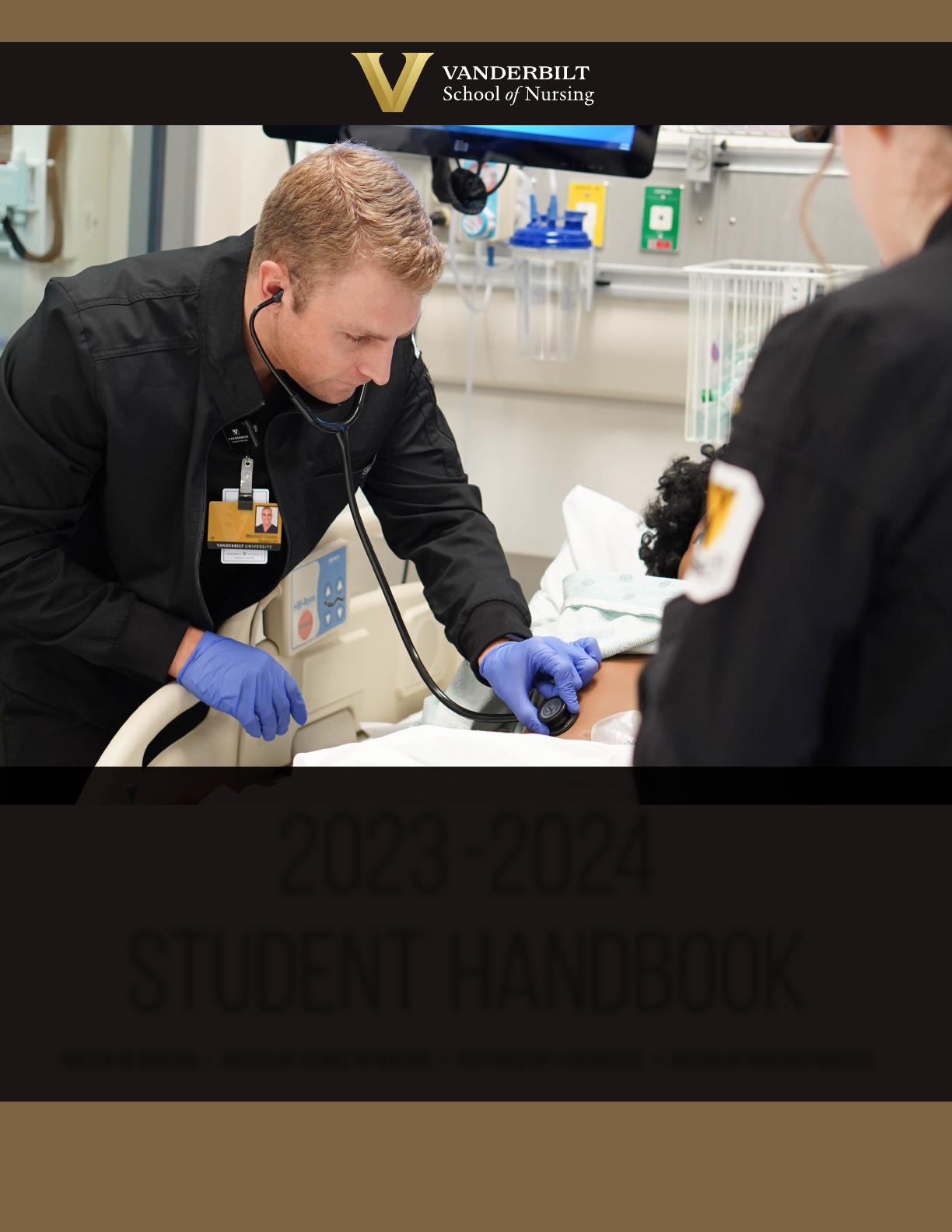
2023 -2024
Student Handbook
MASTER OF NURSING • MASTER OF SCIENCE IN NURSING • POST MASTER’S CERTIFICATE • DOCTOR OF NURSING PRACTICE
Vanderbilt University School of Nursing | Nashville, Tennessee
Contents
Letter from the Dean .................................................................................................................................. 9
Academic Calendar: MN, MSN and DNP Programs ................................................................................... 10
About the School ...................................................................................................................................... 13
Accreditation ........................................................................................................................................... 13
Commission on Collegiate Nursing Education ..................................................................................... 13
Accreditation Commission for Midwifery Education (ACME) ................................................................ 13
Southern Association of Colleges and Schools Commission on Colleges .......................................... 13
Tennessee Board of Nursing ............................................................................................................... 13
U.S. Department of Education ............................................................................................................. 14
Equity, Diversity, and Inclusion ................................................................................................................. 14
VUSN Diversity, Inclusion, and Anti-racism Statement .......................................................................... 14
History ..................................................................................................................................................... 15
Mission Statement ................................................................................................................................... 15
Vision ....................................................................................................................................................... 15
Core Values .............................................................................................................................................. 15
Skills and Simulation Lab ......................................................................................................................... 15
Academic Support ................................................................................................................................... 17
Academic Support Service for Students ................................................................................................... 17
Senior Associate Dean for Academics ................................................................................................ 17
Senior Associate Dean for Informatics ................................................................................................ 17
Assistant Dean for Academics and Associate Dean for Equity, Diversity, and Inclusion .................... 18
Assistant Dean for Academics, Advanced Nursing Practice ............................................................... 18
Assistant Dean for Academics, Generalist Nursing Practice ............................................................... 18
Assistant De
an for Academics, Doctoral Nursing Practice ................................................................. 19
Assistant Dean for Student Affairs ...................................................................................................... 19
Associate Dean for Strategic Enrollment ............................................................................................ 20
Academic Coaching Services .............................................................................................................. 20
Faculty Advisers ................................................................................................................................... 21
Assistant University Registrar and Director of Nursing Student Records, Office of Enrollment Services
............................................................................................................................................................ 21
Program Coordinator Nursing Student Records, Office of Enrollment Services .................................... 22
Director, Financial Aid .......................................................................................................................... 22
CLINICAL PLACEMENT ............................................................................................................................ 23
Assistant Dean for Clinical Placement ................................................................................................. 23
1
VUSN MSN, POST-MASTER’S CERTIFICATE, and DNP Student Handbook 2023-2024
COMPUTING SERVICES ............................................................................................................................ 25
Computing-Related Information .......................................................................................................... 25
VUSN Information Technology Resources ............................................................................................ 27
Remote Proctor .................................................................................................................................... 27
Resources for Distance-Access Students ............................................................................................. 28
VUSN LOCATION OF ADMINISTRATIVE OFFICES ..................................................................................... 28
General Information for All Nursing Students ........................................................................................... 30
CHANGE OF ADDRESS AND TELEPHONE NUMBER .................................................................................. 30
COMMUNICATING WITH THE SCHOOL OF NURSING ............................................................................... 30
Contacting a member of the faculty ..................................................................................................... 30
Emergency Phone Calls ........................................................................................................................ 30
Faculty/Staff Mailboxes ....................................................................................................................... 31
Official University Communications ..................................................................................................... 31
Voice Mail ............................................................................................................................................ 31
CONTINUING STUDENT REQUIREMENTS ................................................................................................. 31
NEW STUDENT REQUIREMENTS ............................................................................................................... 34
EXPOSURE TO CONTAGIONS OR HEALTH EMERGENCIES ........................................................................ 39
Blood and Body Fluids .......................................................................................................................... 39
Respiratory and Other Non-Bloodborne Pathogens (such as TB, lice, meningitis, measles, COVID-19,
and others) .......................................................................................................................................... 41
Occupational Exposure Charges .......................................................................................................... 41
In The Event Of A Serious Health Concern Or An Emergency ................................................................ 42
FORMS FOR ENROLLMENT CHANGES ...................................................................................................... 42
LICENSURE AND CERTIFICATION ............................................................................................................. 42
Registered Nurse (RN) Licensure ......................................................................................................... 42
Out of State RN Licensure .................................................................................................................... 43
National Certification ........................................................................................................................... 43
LOST AND FOUND .................................................................................................................................... 45
REGISTRATION......................................................................................................................................... 45
Registration Hold ................................................................................................................................. 45
How to Register ................................................................................................................................... 45
Late Regi
stration .................................................................................................................................. 45
Dropping a Class .................................................................................................................................. 45
Grading Basis ....................................................................................................................................... 45
Enrolling in a Variable Credit Class ...................................................................................................... 46
Viewing Your Schedule ......................................................................................................................... 46
2
VUSN MSN, POST-MASTER’S CERTIFICATE, and DNP Student Handbook 2023-2024
ROOM RESERVATIONS ............................................................................................................................. 46
STUDENT MEDICAL OR INJURY OCCURRENCES GUIDELINES .................................................................. 46
Responding to Student Health Events and Injuries ............................................................................... 46
STUDENT ORGANIZATIONS AND AFFINITY GROUPS ............................................................................... 48
VUSN Student Organizations and Affinity Groups ................................................................................ 48
STUDENT VOLUNTEER WORK .................................................................................................................. 48
TRADITIONS: COMPOSITES, GRADUATION, INVESTITURE, AND PINNING ................................................ 48
Class Picture – Composite MN, MSN, and DNP .................................................................................... 48
Graduation, Investiture, and Pinning at VUSN ....................................................................................... 49
Graduation and Commencement .......................................................................................................... 49
Investiture ............................................................................................................................................ 49
Pinning Ceremony ................................................................................................................................ 49
Vanderbilt University Resources ............................................................................................................... 50
CAMPUS SECURITY .................................................................................................................................. 50
Vanderbilt University Public Safety ................................................................................................ 50
AlertVU ............................................................................................................................................... 50
Emergency Phones .......................................................................................................................... 50
Operation ID ...................................................................................................................................... 51
VandySafe ......................................................................................................................................... 51
Walking Escort Service .................................................................................................................... 51
CENTER FOR SPIRITUAL AND RELIGIOUS LIFE ......................................................................................... 51
CENTER FOR STUDENT WELLBEING ........................................................................................................ 51
DISABILITY, DISCRIMINATION, AND GRIEVANCES ................................................................................... 52
EQUITY, DIVERSITY, AND INCLUSION OFFICE .......................................................................................... 52
LIBRARIES ................................................................................................................................................ 52
NEWS, PUBLICATIONS, AND MEDIA ......................................................................................................... 53
Vanderbilt Nurse Magazine ............................................................................................................. 53
The VUSN Newsletter ...................................................................................................................... 53
ORIGAMI RISK - VUSN INCIDENT REPORTING .......................................................................................... 54
PARKING, VEHICLE REGISTRATION, AND ALTERNATIVE TRANSPORTATION .......................................... 55
PROJECT SAFE ........................................................................................................................................ 55
SARR
ATT STUDENT CENTER .................................................................................................................... 55
STUDENT ACCESS SERVICES ................................................................................................................... 56
Reasonable Accommodation Request Process .......................................................................... 56
Accommodations ............................................................................................................................. 56
Documentation Guidelines .............................................................................................................. 57
3
VUSN MSN, POST-MASTER’S CERTIFICATE, and DNP Student Handbook 2023-2024
Admissions Information .................................................................................................................. 57
Temporary Support Services .......................................................................................................... 57
STUDENT CARE COORDINATION (SCC) .................................................................................................... 57
STUDENT CARE NETWORK ....................................................................................................................... 58
STUDENT HEALTH SERVICES ................................................................................................................... 58
TITLE IX AND SEXUAL MISCONDUCT ....................................................................................................... 59
UNIVERSITY COUNSELING CENTER ......................................................................................................... 59
VANDERBILT CARD SERVICES ................................................................................................................. 60
VANDERBILT UNIVERSITY RESOURCES .................................................................................................... 60
Student Services .................................................................................................................................. 60
VUSN Academic Policies/Regulations...................................................................................................... 62
ATTENDANCE AND ABSENCE POLICY ..................................................................................................... 62
AUDITING COURSES ................................................................................................................................. 62
CHANGE OF COURSE ............................................................................................................................... 63
Change of Clinical Placement Site: ...................................................................................................... 63
CORE TECHNICAL AND PERFORMANCE STANDARDS .............................................................................. 66
CREDIT HOURS TO CLOCK HOURS RATIO ................................................................................................ 67
GRADING SYSTEM ................................................................................................................................... 68
Academic Standing: ............................................................................................................................. 69
REGULATIONS: APPEAL PROCESS FOR MN, MSN, OR DNP SAAP COMMITTEE PROBATION / DISMISSAL
DECISIONS ............................................................................................................................................... 73
COMPLAINT PROCESS ............................................................................................................................. 75
LEAVE OF ABSENCE POLICY .................................................................................................................... 77
Policy Overview .................................................................................................................................... 77
Leave of Absence Re-Entry ................................................................................................................... 78
MEDICAL LEAVE OF ABSENCE POLICY .................................................................................................... 78
Medical Leave of Absence Re-Entry: .................................................................................................... 79
MEETINGS WITH FACULTY AND ADMINISTRATORS ................................................................................ 79
TRANSFER OF CREDIT .............................................................................................................................. 79
Policy ................................................................................................................................................... 79
Honor Code .............................................................................................................................................. 81
STATEME
NT OF THE HONOR CODE ......................................................................................................... 81
HONOR CODE APPLIED TO PREPARATION OF PAPERS ............................................................................ 82
HONOR CODE APPLIED TO TESTS, EXAMINATIONS, AND OTHER EXERCISES ......................................... 83
THE HONOR CODE APPLICATION TO GROUP WORK ................................................................................ 83
Tips for Success .................................................................................................................................. 83
4
VUSN MSN, POST-MASTER’S CERTIFICATE, and DNP Student Handbook 2023-2024
RESPONSIBILITY OF THE INDIVIDUAL STUDENT ...................................................................................... 84
If nursing students have reason to suspect that a breach of the Honor Code has been committed, they
must take one of these actions: ........................................................................................................... 84
Honor Council .......................................................................................................................................... 85
Honor Council School of Nursing Bylaws ................................................................................................. 85
Article I – Name ................................................................................................................................... 85
Article II – Purpose .............................................................................................................................. 85
Article III – Jurisdiction ........................................................................................................................ 85
Article IV – Membership, Elections, and Vacancies .............................................................................. 85
Article V – Duties of Officers and Members ......................................................................................... 85
Article VI – Meetings ........................................................................................................................... 87
Article VII – Honor Council Adviser ...................................................................................................... 87
Article VIII – Violations ........................................................................................................................ 87
Article IX – Hearing .............................................................................................................................. 88
Article X – Penalties ............................................................................................................................ 89
Article XI – Appeals ............................................................................................................................. 89
Article XII – Amendments .................................................................................................................... 89
PROCEDURES OF THE VANDERBILT SCHOOL OF NURSING HONOR COUNCIL ......................................... 90
INVESTIGATION ....................................................................................................................................... 90
HEARINGS ................................................................................................................................................ 91
Attendance at the Hearing by the Accused Student.............................................................................. 92
Withdrawal from the University before the Hearing .............................................................................. 92
Order of Events for Hearing .................................................................................................................. 92
PENALTIES FOR A HONOR CODE VIOLATION ........................................................................................... 93
APPEAL
PROCESS .................................................................................................................................... 94
After the Hearing .................................................................................................................................. 94
WITHDRAWAL FROM THE UNIVERSITY BEFORE THE HEARING............................................................ 95
VUSN: Other Guidelines, Policies, and Procedures ................................................................................... 96
ALCOHOL, CONTROLLED SUBSTANCE, AND SMOKING POLICY ............................................................... 96
ANIMALS ................................................................................................................................................. 96
ARTIFICIAL INTELLIGENCE (AI) ................................................................................................................ 96
CHILDREN IN THE SCHOOL ...................................................................................................................... 97
CODE FOR NURSES .................................................................................................................................. 97
CONDUCT POLICY .................................................................................................................................... 97
COVID-19 ................................................................................................................................................. 98
About COVID-19 and Clinical Placement .............................................................................................. 98
5
VUSN MSN, POST-MASTER’S CERTIFICATE, and DNP Student Handbook 2023-2024
DRESS CODE ............................................................................................................................................ 98
Classroom Dress Guideline .................................................................................................................. 98
General Clinical Requirements ............................................................................................................. 98
PreSpecialty Clinical Experiences ........................................................................................................ 98
Psych/Mental Health Clinical-Additional Guidelines ............................................................................. 99
Community Health Clinical-Additional Guidelines ................................................................................. 99
Specialty Clinical .................................................................................................................................. 99
EDUCATIONAL RESOURCES AND MATERIALS PROTECTION .................................................................... 99
INCLEMENT WEATHER POLICY .............................................................................................................. 100
Key Definitions: .................................................................................................................................. 100
Faculty/Staff Communications: During inclement weather event or other adverse events impacting
normal operations faculty/staff are updated via the following communication modes: ..................... 101
Procedure: ......................................................................................................................................... 101
Cancellation/Delay of Start Time for Classes: .................................................................................... 101
Student Notification Instructions for Cancellation/Delay of start time for classes: ............................ 101
NET ETIQUETTE STATEMENT ................................................................................................................ 101
Respect and Courtesy ........................................................................................................................ 102
Participation and Collaboration .......................................................................................................... 102
Presentation of Self ........................................................................................................................... 102
SOCIAL MEDIA POLICY .......................................................................................................................... 103
Policy ................................................................................................................................................. 103
Definitions ......................................................................................................................................... 103
Procedure/Specific Information ......................................................................................................... 103
Guidelines for Online Professional or Personal Activity ..................................................................... 103
STUDENT RECORDS – FAMILY EDUCATIONAL RIGHTS AND PRIVACY ACT (FERPA) ............................. 105
VUSN: Doctor of Nursing Practice (DNP) Program ................................................................................. 106
DNP PROGRAM GOALS .......................................................................................................................... 106
DNP ENTRY TYPES................................................................................................................................. 107
Entry to the DNP Advanced Clinical Practice Track with an MSN Degree in Advanced Nursing Practice
.......................................................................................................................................................... 107
Entry to
the DNP Advanced Systems Track: ....................................................................................... 107
Entry to DNP Executive Leadership Track: .......................................................................................... 108
Entry with MSN Adding Post-Master’s Certificate ............................................................................... 109
Entry to BSN to DNP Track ................................................................................................................. 109
Seamless Entry to Post Master's DNP ................................................................................................ 109
DNP PROGRAM ADMINISTRATION ......................................................................................................... 110
6
VUSN MSN, POST-MASTER’S CERTIFICATE, and DNP Student Handbook 2023-2024
DNP DEGREE REQUIREMENTS ................................................................................................................ 110
DNP Advanced Clinical Practice Track, Advanced Systems Practice Track, and Executive Leadership
Track. ................................................................................................................................................. 110
PRACTICE HOURS .................................................................................................................................. 111
Intensive Sessions ............................................................................................................................. 112
2023-24 Intensive Dates ..................................................................................................................... 112
Doctor of Nursing Practice (DNP) Program Curriculum Plans ................................................................ 113
DNP Curriculum Plans - Students Admitted Fall 2023, Advanced Clinical Practice & Advanced Systems
Practice Tracks and Executive Leadership Track ............................................................................... 113
DNP 5 and 6 Semester Curriculum Plan – Students Admitted Prior to Fall 2023 ................................ 115
BSN Entry to DNP Advanced Clinical Practice Tracks – Students Admitted Fall 2023, AGACNP and
FNP/ENP ............................................................................................................................................ 118
BSN Entry to DNP Curriculum Plan – Students Admitted Prior to Fall 2023, AGACNP and FNP/ENP .. 120
VUSN: Master of Nursing Practice (MN) Program .................................................................................. 123
ENTRY INTO MN PROGRAM ................................................................................................................... 123
PROGRAM OVERVIEW ............................................................................................................................ 123
PROGRAM OUTCOMES ........................................................................................................................... 124
Master of Nursing (MN) Program Curriculum Plan ................................................................................. 125
MN to PMC and MN to DNP+PMC Curriculum Plans by Specialty .......................................................... 126
VUSN: Master of Science in Nursing (MSN) Program ............................................................................. 137
ENTRY INTO MSN PROGRAM ................................................................................................................. 137
MSN PreSpecialty .............................................................................................................................. 137
BSN to MSN ..................................................................................................................................... 137
TRANSITIONAL OBJECTIVES ................................................................................................................. 137
MSN PROGRAM GOALS .......................................................................................................................... 138
Dual MSN/MTS, MSN/MDiv Programs ............................................................................................... 138
Post-Master’s Certificate ................................................................................................................... 138
Program of Studies for Post-Master's Certificates ............................................................................. 139
Area of Specialty ................................................................................................................................ 139
Master of Science in Nursing (MSN) Program Curriculum Plans ............................................................ 141
ADULT-GERONTOLOGY ACUTE CARE NURSE PRACTITIONER (AGACNP) ........................................... 141
ADULT-GERONTOLOGY PRIMARY CARE NURSE PRACTITIONER (AGPCNP) ....................................... 144
EMERGENCY NURSE PRACTITIONER .................................................................................................. 147
FAMILY
NURSE PRACTITIONER (FNP) ................................................................................................ 150
NURSE EDUCATOR (NE) ..................................................................................................................... 153
NURSING INFORMATICS (NI) ............................................................................................................. 154
7
VUSN MSN, POST-MASTER’S CERTIFICATE, and DNP Student Handbook 2023-2024
NEONATAL NURSE PRACTITIONER (NNP) ......................................................................................... 155
NURSING AND HEALTH CARE LEADERSHIP (NHCL) .......................................................................... 158
NURSE-MIDWIFERY (NM) ................................................................................................................... 159
NURSE-MIDWIFERY/FAMILY NURSE PRACTITIONER DUAL FOCUS (NM/FNP) ................................... 162
PSYCHIATRIC-MENTAL HEALTH NURSE PRACTITIONER (Lifespan) (PMHNP) .................................. 164
PEDIATRIC NURSE PRACTITIONER - ACUTE CARE (PNP-AC) ............................................................. 167
PEDIACTRIC NURSE PRACTITIONER - PRIMARY CARE (PNPPC) ........................................................ 170
WOMEN’S HEALTH GENDER-RELATED NURSE PRACTITIONER (WHGRNP) ........................................ 173
WOMEN'S HEALTH GENDER-RELATED NURSE PRACTITIONER/ADULT GERONTOLOGY PRIMARY CARE
NURSE PRACTITIONER (WHGRNP/AGPCNP) ..................................................................................... 176
PRESPECIALTY LEVEL ....................................................................................................................... 178
8
VUSN MSN, POST-MASTER’S CERTIFICATE, and DNP Student Handbook 2023-2024
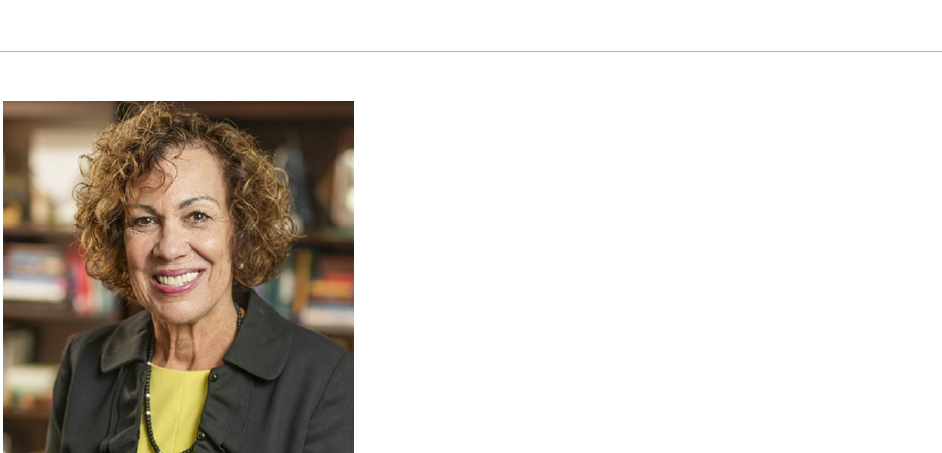
Letter from the Dean
Dear Students:
It is with great pleasure that I welcome you to
Vanderbilt University School of Nursing. This is the
start of a new time in your life and perhaps even the
start of your nursing career. I look forward to greeting
all of you with excitement and a strong sense of
purpose and optimism.
Whether you are a new or continuing student, you are
an important part of our campus community. Your
student experience at Vanderbilt will be filled with
many diverse and exciting experiences for both
professional and personal growth. Opportunities for advanced practice nurses and
registered nurses are changing faster than ever before, and you—our graduates—will be
leaders and changemakers in increasing access, expanding quality and decreasing
costs for patients and systems.
Please familiarize yourself with this handbook, as it will introduce you to our policies,
procedures and resources. As a VUSN student, you are responsible for your interactions
with the school and the greater Vanderbilt community: this handbook will be your guide.
I encourage you to read and understand the information in it, especially our codes of
conduct.
Again, welcome to VUSN during this transformational time for nursing, health care and
higher education, and congratulations on taking one more step towards achieving your
career goals.
Pamela R. Jeffries PhD, RN, FAAN, ANEF, FSSH
Dean and Valere Potter Distinguished Professor of Nursing
9
VUSN MSN, POST-MASTER’S CERTIFICATE, and DNP Student Handbook 2023-2024
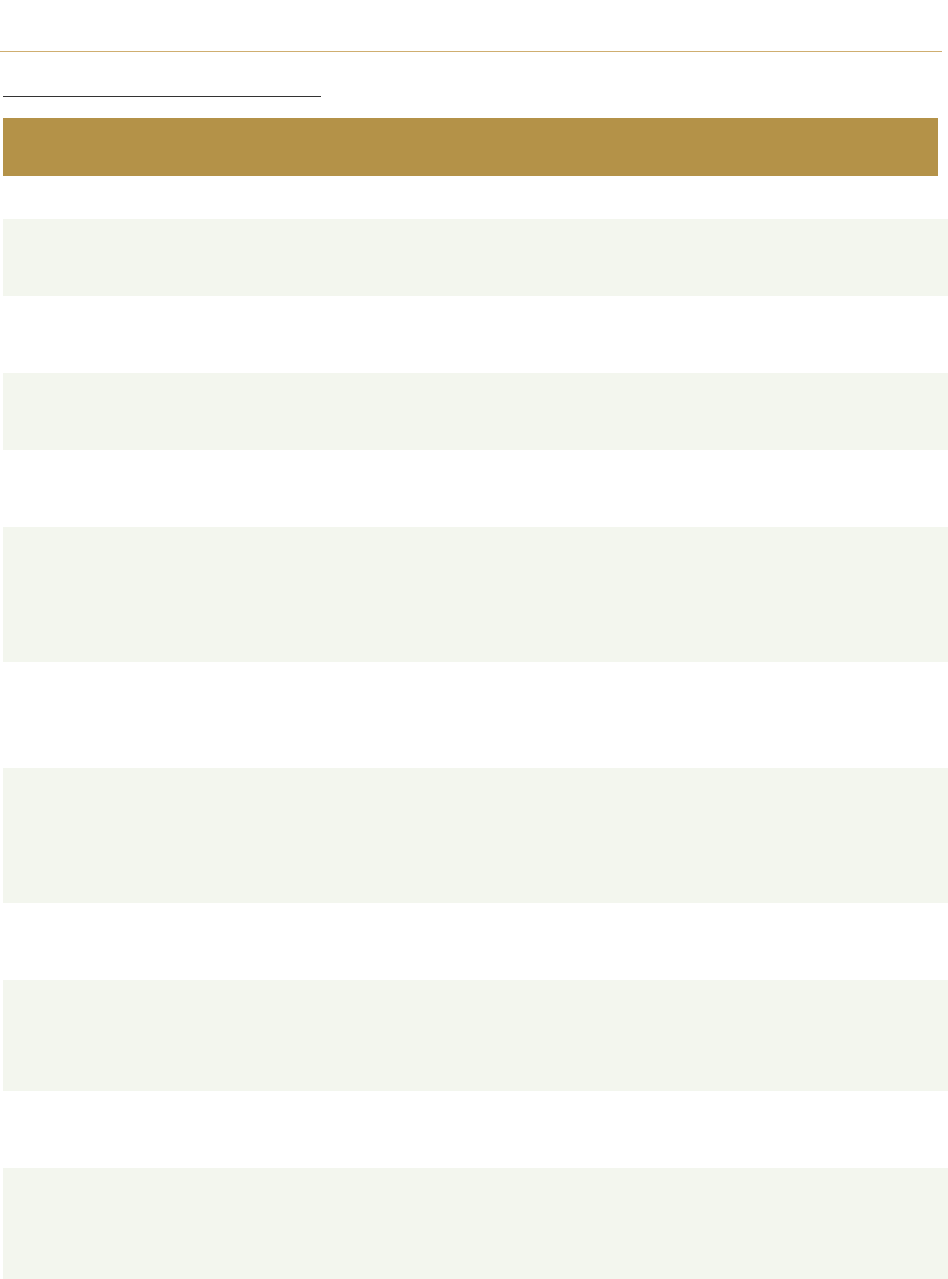
Academic Calendar: MN, MSN and DNP Programs
Click for PhD academic calendar
FALL 2023
Date
Event
August 16-17, 2023 MSN PreSpecialty Level New Student Orientation
August 18, 2023 MSN PreSpecialty Level Classes Begin
August 21-25, 2023 PhD Orientation and Intensive (subject to change)
August 21, 2023 MN Classes Begin
August 21, 2023 MSN Specialty Level and Post Master's Certificate Classes Begin for select
specialties * Important: Please check your specialty class schedule for
specific information on start dates for required classes.
August 23, 2023 MSN Specialty Level and Post Master's Certificate Orientations (BSN and
MSN entry)
August 24, 2023 MSN Specialty Level and Post Master's Certificate Classes Begin for select
specialties * Important: Please check your specialty class schedule for
specific information on start dates for required classes.
August 28-30, 2023 DNP Orientation and Intensive
September 1, 2023
End of Student Change Period
(See https://www.vanderbilt.edu/stuaccts/graduate/withdrawal-
schedule.php for tuition refund schedule)
September 4, 2023 Labor Day - no VUSN Classes
October 6, 2023
Last day to withdraw with a "W"
(See https://www.vanderbilt.edu/stuaccts/graduate/withdrawal-
schedule.php for tuition refund schedule)
10
VUSN MSN, POST-MASTER’S CERTIFICATE, and DNP Student Handbook 2023-2024
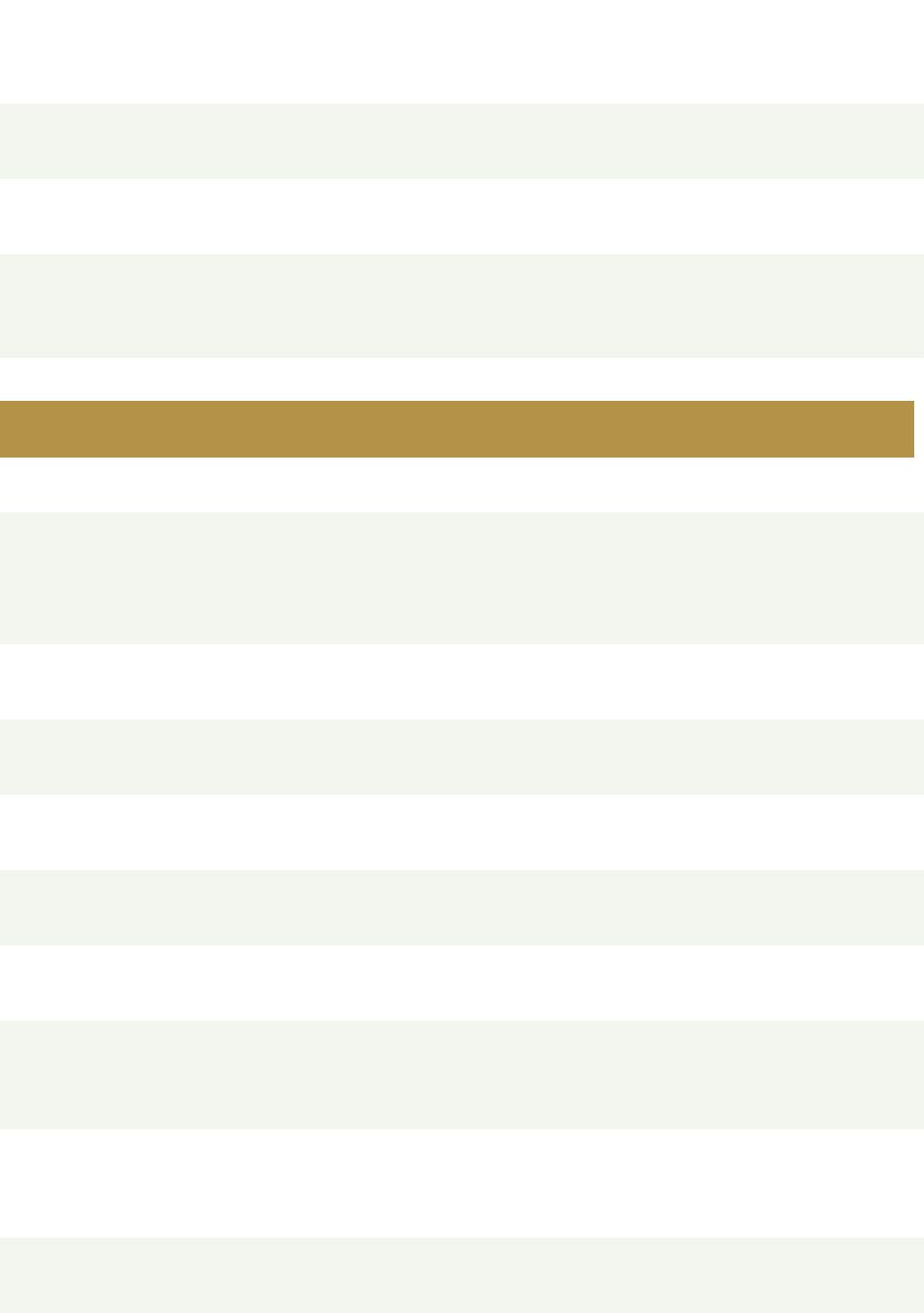
November 18-26,
2023
Thanksgiving Break
December 8, 2023 Last Day of Class/Fall Semester
December 8, 2023 December Pinning Ceremony
December 16,
2023
Degrees conferred
S
SPRING 2024
2024
Date
Event
January 3, 2024 First day of Spring semester for MN, PreSpecialty and Specialty Level MSN.
* Important: Please check your specialty class schedule for specific
information on start dates for required classes.
January 4-5, 2024 MN New Student Orientation
January 8, 2024 MN First Semester Classes Begin
January 8-11, 2024 DNP Intensive
January 8-11, 2024 PhD Intensive (subject to change)
January 15, 2024 MLK Holiday - no VUSN Classes
January 19, 2024
End of Student Change Period
(See https://www.vanderbilt.edu/stuaccts/graduate/withdrawal-
schedule.php for tuition refund schedule)
February 21, 2024
Last day to withdraw with a "W"
(See https://www.vanderbilt.edu/stuaccts/graduate/withdrawal-
schedule.php for tuition refund schedule)
March 9-17, 2024 Spring Break
11
VUSN MSN, POST-MASTER’S CERTIFICATE, and DNP Student Handbook 2023-2024
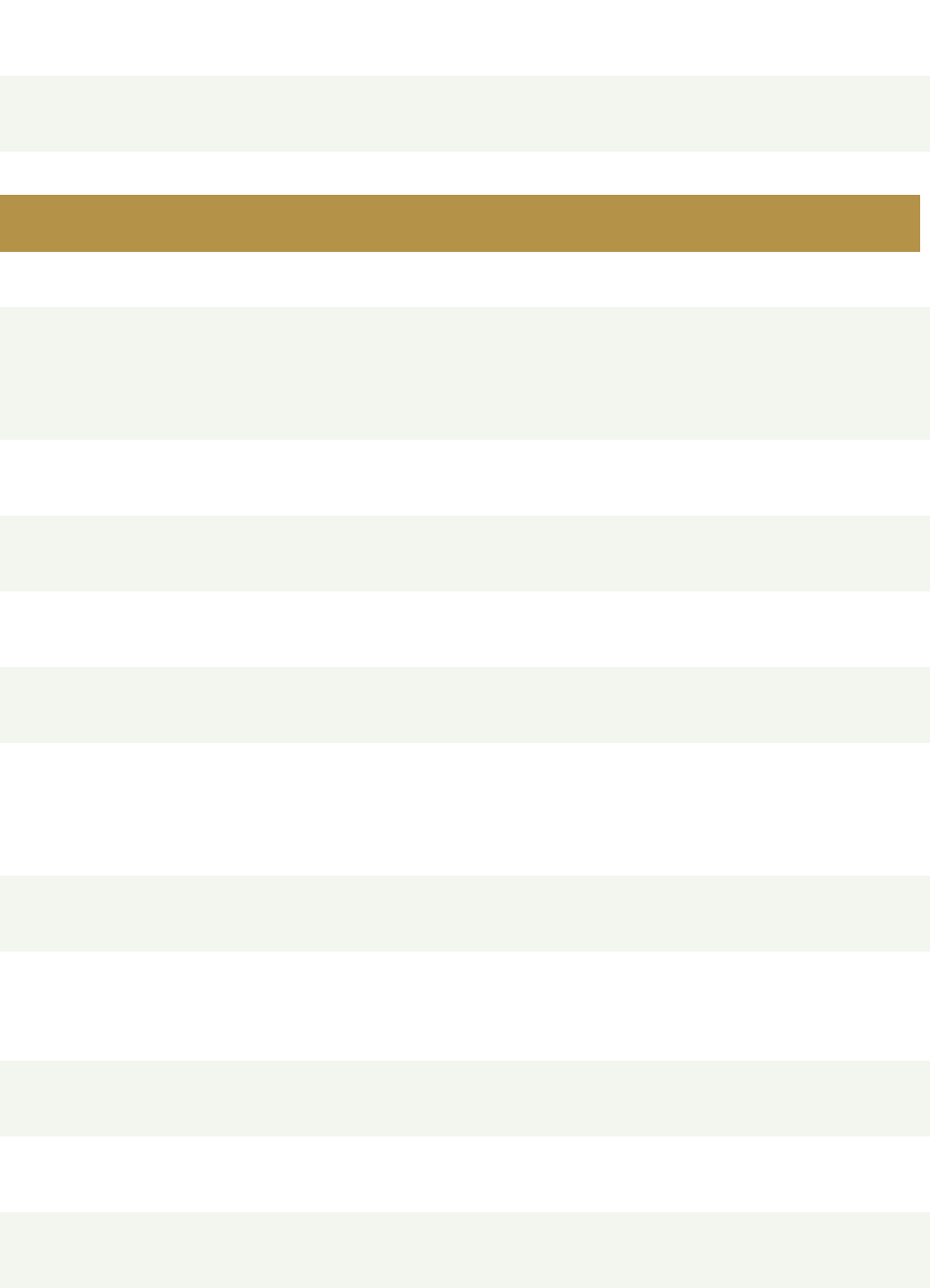
April 19, 2024 Last Day of Class/Spring Semester
TBD Degrees conferred
SUMMER 2024
MMER 2024
Date
Event
April 29, 2024 First Day of Summer Semester for PreSpecialty, MN and MSN Specialty
Level * Important: Please check your specialty class schedule for specific
information on start dates for required classes.
TBD May Pinning Ceremony and Reception
TBD Commencement (may move from Friday, May 10 to Saturday, May 11)
May 6-10, 2023 PhD Intensive (tentative)
May 13-16, 2024 DNP Intensive
May 16, 2024 End of Student Change Period (See
https://www.vanderbilt.edu/stuaccts/graduate/withdrawal-
schedule.phpfor tuition refund schedule)
May 27, 2024 Memorial Day Holiday - no VUSN Classes
June 7, 2024
Last day to withdraw with a "W"
(See https://www.vanderbilt.edu/stuaccts/graduate/withdrawal-
schedule.php for tuition refund schedule)
July 4, 2024 Independence Day Holiday - No VUSN Classes
August 2, 2024 Last Day of Class/Summer Semester
TBD August Pinning Ceremony
12
VUSN MSN, POST-MASTER’S CERTIFICATE, and DNP Student Handbook 2023-2024

About the School
Accreditation
Commission on Collegiate Nursing Education
*This section was amended on March 27, 2024
The master's Master’s of Science in Nursing, Post-Master’s Certificate and Doctor of Nursing
Practice programs at Vanderbilt University School of Nursing are accredited by the Commission on
Collegiate Nursing Education (CCNE). The Master of Nursing program is currently undergoing initial
accreditation in accordance with CCNE requirements.
C
ommission on Collegiate Nursing Education
655 K Street NW, Suite 750
Washington, DC 20001
Phone: 202.887.6791
Website: https://www.aacnnursing.org/CCNE
Vanderbilt School of Nursing was a charter member of the Association of Collegiate Schools of
Nursing which later was incorporated into the National League for Nursing (NLN).
Midwifery Programs
The nurse-midwifery program is accredited by the Accreditation Commission for Midwifery
Education (ACME).
Accreditation Commission for Midwifery Education (ACME)
c/o American College of Nurse-Midwives
8403 Colesville Rd., Ste. 1230
Silver Spring, MD 20910
Phone: 240.485.1800
Website: https://www.midwife.org/acme
Southern Association of Colleges and Schools Commission on Colleges
Vanderbilt University is accredited by the Southern Association of Colleges and Schools
Commission on Colleges (SACSCOC) to award bachelor's, master's, professional, and doctorate
degrees. Vanderbilt University also may offer credentials such as certificates and diplomas at
approved degree levels. Questions about the accreditation of Vanderbilt University may be directed
in writing to the Southern Association of Colleges and Schools Commission on Colleges at 1866
Southern Lane, Decatur, GA 30033-4097, by calling (404) 679-4500, or by using information
available on SACSCOC's website (www.sacscoc.org).
Tennessee Board of Nursing
The programs offered by VUSN are fully approved by the Tennessee Board of Nursing.
13
VUSN MSN, POST-M
ASTER’S CERTIFICATE, and DNP Student Handbook 2023-2024

State of Tennes
see Department of Health
Bureau of Health Licensure and Regulation
Division of Health-Related Boards
665 Mainstream Drive, 2
nd
Floor
Nashville, TN 37243
Phone: 615.532.5166
Website: http://tn.gov/health
U.S. Department of Education
400 Maryland Avenue, SW
Washington, D.C. 20202
Phone: 1.800.872.5327
Website: https://www.ed.gov/
Equity, Diversity, and Inclusion
Equity, diversity, and inclusion are integral components of Vanderbilt University School of
Nursing’s purpose to promote excellence and innovation in education, practice, and
research. The overarching goal of the VUSN diversity and inclusion strategic plan is “to
transform diversity and inclusion within VUSN by enhancing the cultural climate across
academics, faculty practice, research, and informatics among faculty, staff, and students.”
VUSN’s diversity and inclusivity statement reflects the school’s commitment to equity, diversity,
and inclusion.
VUSN Diversity, Inclusion, and Anti-racism Statement
At Vanderbilt University School of Nursing (VUSN), we are intentional about and assume
accountability for fostering advancement and respect for equity, diversity, and inclusion for all
students, faculty, and staff. We support our efforts with respect for the inherent dignity, worth,
and unique attributes of every person. To bring to life our vision of inclusive excellence, we seek
to recruit, admit, hire, retain, promote, and support diverse and underrepresented groups of
students, staff, and faculty. We value social justice and human rights. We embrace the plurality
of humanity that composes our community including, but not limited to, age, race, ethnic origin,
gender identity, sexual orientation, and religion. We reject racism of any kind, be it systemic,
institutional, or individual. We acknowledge the painful histories related to racism even within
the nursing discipline, including education, practice, and research. We pledge to not let an unjust
past continue to determine the future. We will enact practices which promote anti-racism and
social justice across all entities within VUSN. We affirm the inherent worth of each individual in
order to protect, promote, and optimize the health and abilities of all people. As educators of
advanced practice nurses, nurse scholars, nurse leaders, and nurse faculty, we accept the
responsibility to foster and graduate highly educated, culturally sensitive health care
professionals who mirror the diverse populations they serve.
14
VUSN MSN, POST-MASTER’S CERTIFICATE, and DNP Student Handbook 2023-2024
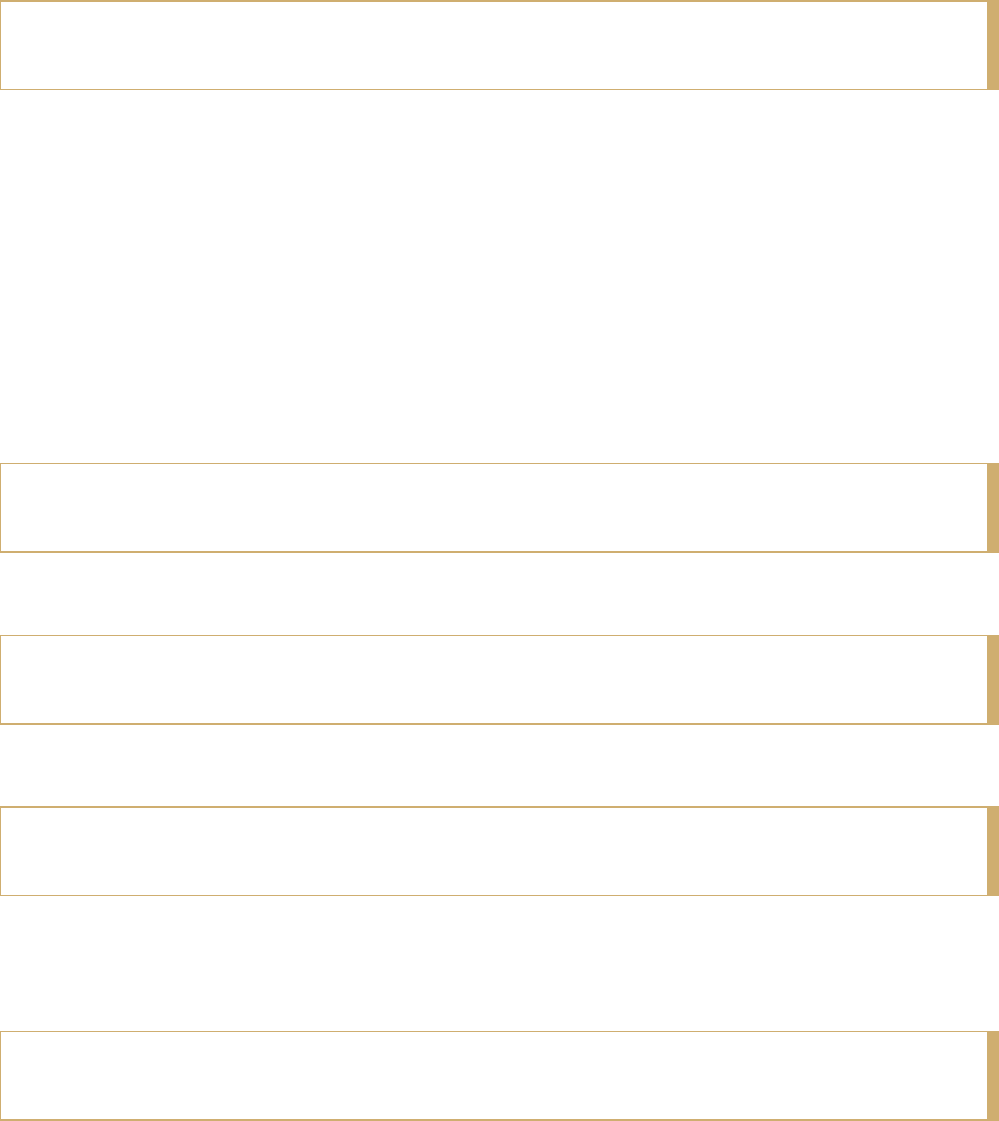
History
The Vanderbilt University School of Nursing opened in 1908, offering a three-year diploma
program in nursing. The first Bachelor of Science degree was awarded in 1936, and the first
master’s degree in nursing in 1958. The School of Nursing was one of the nation's first nursing
programs to incorporate nursing into a liberal arts degree. Having phased out its undergraduate
degree program in 1989, the School offers a curriculum that enables PreSpecialty students
(those from diverse backgrounds and with bachelor degrees) to move into the master’s level of
study and prepare for careers in advanced practice nursing. The inaugural cohort for the
school's new entry into nursing generalist program, Master of Nursing, matriculated in January
2023. This professional degree will result in a registered nurse prepared to meet the complex
community and acute health needs. “U.S. News and World Report” (2024) ranked the Vanderbilt
School of Nursing #6 for its master’s program and #13 for its DNP program in the Best Nursing
Schools in the country. (Website: https://www.usnews.com/best-graduate-schools/top-nursing-
schools/vanderbilt-university-33271)
Mission Statement
Vanderbilt University School of Nursing advances nursing education, health equity, and well-
being through scientific discovery, innovation, evidence-based care and lifelong learning.
Vision
Vanderbilt University School of Nursing will be the global leader in the transformation of health
care and the nursing profession.
Core Values
• Excellence
• Kindness/civility
• Inclusivity
• Integrity/trust
Skills and Simulation Lab
The Skills and Simulation Lab is located on the 3
rd
Floor of the School of Nursing building. VUSN
houses a center for achieving and advancing skills in nursing science in a student-forward
environment. From the acquisition of tactical skills to the application of progressing clinical
reasoning, students are able to explore in a setting that is safe to grow and develop their nursing
foundations. This space allows for students to be exposed to a variety of challenges in current
healthcare settings through high-fidelity simulation and augmented or virtual reality
environments. Students have the opportunity to test clinical reasoning and tactile skills that may
15
VUSN MSN, POST-MASTER’S CERTIFICATE, and DNP Student Handbook 2023-2024
not be exper
ienced during their intensive training. From foundation refinement to specialty-
specific competency building, the lab is a robust learning environment.
Opened in January 2019, the space consists of 13 bays equipped with the latest technology in
simulation capture, advanced manikin simulators, and a variety of skill task trainers. Scenarios
are brought to life by faculty working behind the scenes in “control rooms” who manage the
variables consistent with diagnostic patterns for the application of knowledge, reasoning and
skills. Each simulation session has three primary parts: pre-brief, scenario, and debrief. During
pre-brief, students are prepped with learning objectives, scenario back story, and general
participant expectations. With the help of suspended disbelief, the scenario and environment
allow for the students to care for a person in the clinical setting. The scenario may be recorded
or streamed to students in classrooms for observation. At the end of the scenario, participants
gather for a debriefing of the event. This allows for student-led deeper learning, discussion, and
reflection.
Simulation is a team sport, as is healthcare. The current simulation team consists of simulation
nurses, informatics innovation researcher, simulation nurse informaticist, and a lab director. The
team is guided by the standards set forth by the International Nursing Association for Clinical
Simulation and Learning and the Society for Simulation in Healthcare. The team is dedicated to
advancing the mission, vision, and values of the school and its students.
16
VUSN MSN, POST-MASTER’S CERTIFICATE, and DNP Student Handbook 2023-2024

Academic Support
Academic Support Service for Students
Senior Associate Dean for Academics
Mavis Schorn, PhD, APRN, CNM, CNE, FACNM, FNAP, FAAN, is available to
assist students who have special curriculum needs or those who are
experiencing academic difficulty. Prior to scheduling an appointment with
the Senior Associate Dean, students are encouraged to attempt to resolve
the issue through consultation with their assigned faculty advisers.
Responsibilities of the Senior Associate Dean for Academic Affairs include:
1. Notification to students of academic actions – probation, dismissals
2. Approval of leaves of absence
3. Planning of course schedules each semester
4. Responsibility for catalog submission
5. Serving as a resource to students and faculty in academic matters
Office Location: 278 School of Nursing
Email: mavis.schorn@vanderbilt.edu
Administrative Associate: Carolyn Schettler, Senior Administrative Officer (SON 277)
Appointments with Dr. Schorn can be scheduled by contacting Carolyn Schettler at
615.343.3241 or carolyn.schettler@vanderbilt.edu.
Senior Associate Dean for Informatics
Patricia Sengstack, DNP, RN-BC, CPHIMS, FAAN, is responsible for
technology integration throughout the academic, practice, and research
settings. The staff from the Frist Nursing Informatics Center will work with
students on a daily basis to address their technology needs.
Office Location: 260 Frist Hall
Email: patricia.r.sengstack@vanderbilt.edu
Administrative Associate: Christy Carrigg, FNIC Program Manager (FH 258)
Appointments with Dr. Sengstack can be scheduled by contacting Christy Carrigg at
615.322.4110 or [email protected].
17
VUSN MSN, POST-MASTER’S CERTIFICATE, and DNP Student Handbook 2023-2024

Assistant Dean for Academics and Associate Dean for Equity, Diversity, and Inclusion
Rolanda Johnson, PhD, MSN, RN, assists with academic planning, program
review, development, and implementation of VUSN policies relative to
academic affairs. She also assists students who have special curriculum
needs or those who are experiencing academic difficulty. As Associate
Dean for Equity, Diversity, and Inclusion, Dr. Johnson is responsible for the
oversight of diversity and inclusion initiatives within VUSN. These include
but are not limited to the evaluation of the learning environment and
collaboration with the admissions office to continue to promote a more diverse and inclusive
VUSN community.
Office Location: 275 School of Nursing
Email: rolanda.johnson@vanderbilt.edu
Administrative Associate: Beth Sims, Administrative Manager, Equity, Diversity, and Inclusion
(SON 276)
Appointments with Dr. Johnson can be scheduled by contacting Beth Sims at 615.322.2515
Assistant Dean for Academics, Advanced Nursing Practice
Brian Widmar, PhD, RN, ACNP-BC, CCRN, CNE, FAANP, FCCM, assists with
academic planning, program review, development, and implementation of
VUSN policies relative to advanced practice nursing education. He also
assists students who have special curriculum needs or those who are
experiencing academic difficulty.
Office Location: 310 Godchaux Hall
Email: [email protected]
Phone: 615.875.8799
Administrative Associate: Keith Wade, Senior Program Manager, Academic Support (GH 304)
Appointments with Dr. Widmar can be scheduled by contacting Keith Wade at 615.322.7398
Assistant Dean for Academics, Generalist Nursing Practice
Mary A. Jessee, PhD, RN, assists with academic planning, program review,
development, and implementation of VUSN policies relative to generalist
nursing education. She also assists students who have special curriculum
needs or those who are experiencing academic difficulty.
18
VUSN MSN, POST-MASTER’S CERTIFICATE, and DNP Student Handbook 2023-2024

Office Lo
cation: 544 School of Nursing
Email: [email protected]
Phone: 615.343.1629
Administrative Associate: Mia Wells, Program Manager (SON 542)
Appointments with Dr. Jessee can be scheduled by contacting Mia Wells at 615.343.6745
or mia.s.wells@vanderbilt.edu.
Assistant Dean for Academics, Doctoral Nursing Practice
Terri L. Allison, DNP, ACNP-BC, FAANP, assists with academic planning,
program review, development, and implementation of VUSN policies relative
to nursing practice doctorate education. She also assists students who
have special curriculum needs or those who are experiencing academic
difficulty.
Office Location: 223 Godchaux Hall
Email: terri.allison@vanderbilt.edu
Phone: 615.343.7732
Administrative Associate: Pam Pettis, Program Manager (GH 223)
Appointments with Dr. Allison can be scheduled by contacting Pam Pettis at 615.343.8419
or pam.pettis@vanderbilt.edu.
Responsibilities of the Assistant Deans for Academics include:
1. Long-range academic planning, program review, development and implementation of
academic policies
2. Monitor academic progression of students and assist with academic coaching
3. Collaboration with the VUSN Diversity and Inclusion Committee regarding VUSN diversity
initiatives and activities for faculty, staff, and students
4. Development and oversight of the VUSN diversity and inclusion strategic plan
5. Foster alignment of VUSN diversity and inclusion goals with those of Vanderbilt University
Assistant Dean for Student Affairs
Feylyn M. Lewis, PhD, serves as a resource to students concerning
nonacademic matters. She is available to assist students with a variety of
activities and issues related to their student experience. Dr. Lewis serves as
a resource to refer students to appropriate services available on the
Vanderbilt Campus. The Assistant Dean for Student Affairs also serves as
the adviser to the Graduate Nursing Council and all other student
organizations.
Responsibilities of the Assistant Dean for Student Affairs include:
1. Advising students concerning non-academic matters
2. Referring students to appropriate campus resources (University Counseling Center, Student
Health, Equal Opportunity, Affirmative Action, and Disability Services Department, Faculty
Adviser, Course Faculty, Academic Dean)
3. Serving as adviser to School of Nursing student organizations
19
VUSN MSN, POST-MASTER’S CERTIFICATE, and DNP Student Handbook 2023-2024

4. Coordina
ting programs and special events for students
Office Location: 179 School of Nursing
Email: feylyn.m.lewis@vanderbilt.edu
Phone: 615.343.3334 (You may leave a message by voicemail 24 hours a day.)
Administrative Associate: Allie Noote, Associate Director, Student Affairs (SON 172)
Appointments with Dr. Lewis can be scheduled by contacting Allie Noote at 615.322.2814
or allie.noote@vanderbilt.edu.
Associate Dean for Strategic Enrollment
Ernie Rushing, PhD, MBA, assists with the recruitment planning and
oversight of VUSN admissions and financial aid, and serves as a liaison
between the School of Nursing and the University Registrar’s Office.
Responsibilities of the Associate Dean for Strategic Enrollment include:
1. Identifying prospective students
2. Overseeing the recruitment process from initial inquiry to enrollment
Office Location: 176 School of Nursing
Email: [email protected]
Appointments with Dr. Rushing can be scheduled by contacting him at 615.322.3800
or ernie.rushing@vanderbilt.edu.
Academic Coaching Services
Rolanda Johnson, PhD, MSN, RN, serves as additional faculty resources for
students who need supplemental academic support. Dr. Johnson is
available to provide assistance with study, test taking, and writing skills.
Students who experience academic difficulty should contact the course
faculty and Dr. Johnson as soon as possible to initiate a plan for
improvement. Please visit our website for additional information:
https://nursing.vanderbilt.edu/students/current/enhancement/index.php.
Office Location: 275 School of Nursing
Email: [email protected]
Administrative Associate: Beth Sims, Administrative Manager, Equity, Diversity, and Inclusion
(SON 276)
Appointments with Dr. Johnson can be scheduled by contacting Beth Sims at 615.322.2515
or beth.si
20
VUSN MSN, POST-MASTER’S CERTIFICATE, and DNP Student Handbook 2023-2024

Faculty Advisers
Advising is an integral part of the student experience at Vanderbilt. Far from being a passive
exercise, advising is a collaborative process in which students are expected to assume primary
responsibility for their academic planning while advisers provide expertise and support with the
planning effort.
Each student will be assigned a faculty adviser who will assist with planning a program of study
and will serve as a resource to students for academic matters, such as advice concerning any
difficulty with courses, testing, or paper writing. The adviser should be contacted when the
student is experiencing problems in maintaining an acceptable GPA. The Senior Associate Dean
for Academics serves as adviser to special students.
Responsibilities of Advisers include:
1. Planning program of study with assigned students
2. Assuring that students meet graduation requirements
3. Serving as a resource to students for problem-solving related to academic progress such as
difficulties with testing, paper writing, or clinical decision-making
4. Initiating meetings to discuss a student's plan for success if the student receives a mid-term
deficiency or is placed on probation
5. Making recommendations to the Senior Associate Dean for Academics if a student needs a
leave of absence or wishes to withdraw
6. Referring students to appropriate campus resources (Academic Coaching Services, Equal
Opportunity, Affirmative Action, and Disability Services Department, Counseling Center,
Student Health Services, Senior Associate Dean for Academics)
Assistant University Registrar and Director of Nursing Student Records, Office of Enrollment
Services
Sara Donahoe, M. Ed, serves as the primary enrollment officer for the
school. She is the primary point of contact for issues related to student
academic records and registration and coordinates the change in specialty
process. You should contact her if you discover any errors or irregularities
with the academic record you see in YES (http://yes.vanderbilt.edu),
including your major, expected graduation term, degree audit, or adviser.
She also serves as a liaison between the School of Nursing and the
University Registrar’s Office. Please visit our web site for more information: https://nursing.
vanderbilt.edu/students/current/enrollment/. Enrollment related approval forms are available
online at https://nursing.vanderbilt.edu/students/current/enrollment/student_forms.php.
Office Location: 173 School of Nursing
Email: [email protected] or vusn-studentrecords@vanderbilt.edu
Appointments with Ms. Donahoe can be scheduled by calling 615.343.3411 or by e-mail.
21
VUSN MSN, POST-MASTER’S CERTIFICATE, and DNP Student Handbook 2023-2024

Program Coordinator Nursing Student Records, Office of Enrollment Services
Terry Walker serves as the assistant to the Assistant University Registrar
and Director of Nursing Student Records, Sara Donahoe. She is available to
assist with issues related to education/enrollment verification forms and
letters, transcripts, document notarization, and any enrollment issues.
Responsibilities of the Enrollment Services Office include:
1. Maintaining student academic records (Grades, Leaves of Absence, Withdrawals)
2. Notifying students regarding registration procedures and deadlines
3. Verifying student enrollment and graduation
4. Notarizing documents
5. Notifying course faculty and advisers of change in student status
6. Entering course schedule into student record system
Office Location: 173 School of Nursing
Email: [email protected] or vusn-studentrecord[email protected]
You may contact Ms. Walker by calling 615.875.1118 or by email.
Director, Financial Aid
Kristie Futrell, M. Ed, is available to assist students who need to discuss
financial aid opportunities. She is the point of contact for issues related to
the cost for the program, sources of funding, student loan processing, and
general financial aid questions.
Office Location: 180 School of Nursing
Email: [email protected]
Appointments with Ms. Futrell can be scheduled by calling 615.322.8986 or by e-mail.
22
VUSN MSN, POST-MASTER’S CERTIFICATE, and DNP Student Handbook 2023-2024
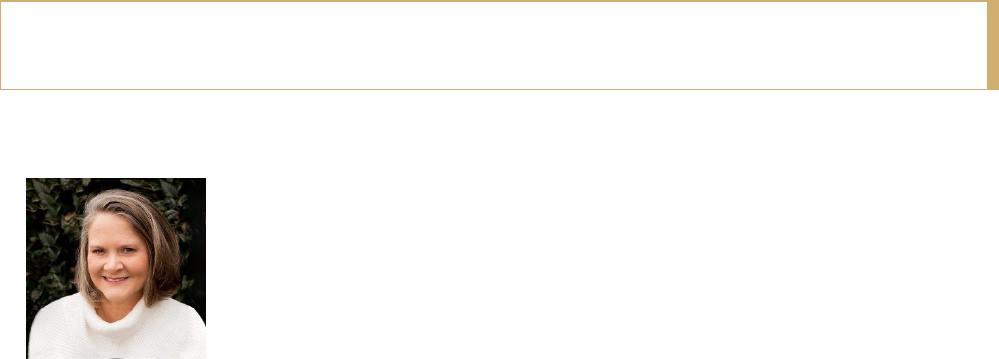
CLINICAL PLACEMENT
Assistant Dean for Clinical Placement
Melissa Carro and the Clinical Placement Office staff work with faculty to
support students in securing appropriate clinical rotations during their time
at VUSN. The staff are also responsible for negotiating affiliation
agreements between agencies and Vanderbilt and ensuring students have
met all the necessary requirements before beginning their rotations. More
information about Clinical Placement is available at https:/nursing.vander
bilt.edu/clinicalplacement/index.php.
Office Locations for the Clinical Placement Staff: 281-285 School of Nursing
The Clinical Placement Office works collaboratively with faculty, program directors, and
students to ensure all students have a productive clinical experience. Faculty evaluate both
clinical sites and preceptors to verify that clinical experiences are consistent with course and
certification requirements as well as with Vanderbilt's mission. Due to regulatory requirements
or a lack of available and appropriate preceptors, VUSN may not be able to accommodate
clinical placements in all areas of the country. Please discuss your preferences with your
specialty faculty to be sure you understand all possible options.
MN and PreSpecialty (BA/BS in non-nursing field) Year Rotations
During their MN program or PreSpecialty year of the MSN program, students will be placed in
group clinical experiences. These group experiences may be in a hospital or community setting
in the Greater Middle Tennessee area (MTA). Where an alternate site assignment is possible,
such change may result in a delay in clinical progression.
VUSN cannot guarantee students will be able to complete clinical rotations unless all agency
requirements are met. Once a clinical placement site assignment is made, students are
expected to attend clinical at the assigned site, and where an alternate site assignment is
possible such change may result in a delay in clinical progression.
Specialty Year MSN - Placements within the Greater Middle Tennessee Area
For students admitted as MTA (Greater Middle Tennessee Area) students, the Clinical
Placement Office works with the specialty faculty to secure clinical sites. Clinical sites located
within a 150-mile radius from the School of Nursing are considered to be within this area. As a
result, students may have rotations in Kentucky, Alabama, and East or West Tennessee,
depending on the appropriateness of the site. Faculty take into consideration a number of
factors in assigning students to sites, including home address, specialty needs, and clinical
interests.
Given the large number of health profession students in the area and the competition for sites,
agencies and providers have asked that a school representative coordinate all Greater Middle
Tennessee area VUSN placements. Therefore, students are not to reach out to local sites to
arrange their own placements. If you identify a possible local placement, please contact your
specialty director or course coordinator first; they will work with the Clinical Placement Office
staff to see if a placement is possible.
23
VUSN MSN, POST-MASTER’S CERTIFICATE, and DNP Student Handbook 2023-2024
Specialt
y Year MSN - Placements outside the Greater Middle Tennessee Area (OMTA)
For students admitted as OMTA (outside the Greater Middle Tennessee Area), students, faculty,
and the clinical placement staff work collaboratively to locate OMTA sites. Students are
encouraged to develop a list of possible sites, as they often have a better knowledge of the area
and can use personal networks and connections to identify a potential rotation. Clinical faculty
and clinical placement staff will meet regularly with students to evaluate progress in identifying
possible clinical sites and to brainstorm potential placements.
Faculty and clinical placement staff can provide guidance on which geographic areas may be
easier or more difficult to find sites, based on past experience. To assist in search efforts, the
Clinical Placement Office can research the geographic area of interest and share information on
agencies and practices where VUSN either has an existing relationship or where a previous
student has precepted. In addition, the Clinical Placement Office coordinates with the VUSN
Alumni Relations Office to share information on alumni in the area who might be able to assist.
Once the student has a secured agreement from a preceptor for a rotation, the student must
submit information through the clinical placement system, Exxat. This enables the faculty to vet
the preceptor in accordance with accreditation requirements, and ensures the potential clinical
experience is appropriate and meets both the specialty requirements and the student’s
educational needs.
Once the faculty has vetted the preceptor, the Clinical Placement Office ensures all appropriate
agreements are in place and all agency requirements are met before a student may begin their
rotation. Vanderbilt requires an affiliation agreement (contract) with all sites where a student
will obtain experience. This includes the practice site as well as any ancillary sites, such as
hospitals, surgery centers, and nursing homes, or outside agencies that employ preceptors,
such as TeamHealth. A student may not go with the preceptor to a site where the school does
not have an active affiliation agreement. Even when Vanderbilt has an agreement with the site,
the Clinical Placement office must confirm it is still valid.
Students are strongly encouraged to plan ahead. Given the competition for clinical placements
in some parts of the country, securing a preceptor and negotiating and finalizing the necessary
agreements can take several months, or more. In rare cases, Vanderbilt is unable to come to an
agreement with an agency, or a particular area may not have an appropriate site or preceptor
available; the clinical placement staff communicates on a regular basis with the faculty to allow
sufficient time for a student to secure another placement, if necessary. If an alternate
placement is offered to the student but the student declines it, a letter of declination must be
signed, and VUSN is under no obligation to find another site.
Faculty must approve any secondary sites for the student’s clinical experience to ensure that
the sites are necessary or appropriate to the student’s clinical objectives. VUSN limits the
number of sites and contracts per student. Due to the large number of placements each term,
faculty review requests for rotations for a minimal number of hours (typically less than 80) on a
case-by-case basis. If approved, the Clinical Placement Office will then begin the contract
process.
Clinical Requirements
All requirements for enrollment must be completed and on file at the time of enrollment and
must be kept current during the entire program of study. Clinical preceptors and/or agencies
may require drug screening, fingerprinting, additional criminal background checks, or other
requirements specific to that site. The Clinical Placement Office will notify students of any
additional requirements associated with their rotation. Costs associated with these processes
are the responsibility of the student.
24
VUSN MSN, POST-MASTER’S CERTIFICATE, and DNP Student Handbook 2023-2024

VUSN ca
nnot guarantee students will be able to complete clinical rotations unless all agency
requirements are met. Once a clinical placement site assignment is made, students are
expected to attend clinical at the assigned site. VUSN is under no obligation to honor a
student's request for an alternate site, and where an alternate site assignment is possible, such
change may result in a delay in clinical progression.
Students may not begin their clinical rotations until they have met all the site requirements and
have received official confirmation from their faculty and the Clinical Placement Office that they
are cleared to start. This will come in the form of a notification through the Exxat system.
Clinicals at the specialty level of the MSN program require an active and unencumbered RN
license, valid for the state in which the student is doing the rotation. Depending on the clinical
placement location, students may be required to obtain additional state licenses. Due to
regulatory requirements or a lack of available preceptors, VUSN cannot accommodate clinical
placements in all areas of the country.
COVID-19 as a Clinical Requirement
The overwhelming majority of clinical placement sites require either documentation of a
completed series of COVID-19 vaccinations or (in some cases) an approved exemption before
allowing students to rotate at their facilities. Students are strongly encouraged to have the
COVID-19 vaccine in anticipation of this requirement. VUSN will not assign clinical placement
sites based on an individual student's preference about COVID-19 vaccination, and VUSN will
not reassign a student to a different site because of a student's preference about COVID-19
vaccination.
Transportation and Lodging
Students are responsible for their lodging and transportation to and from all clinical rotations.
Practice sites are chosen for their ability to provide experiences consistent with the program
requirements, the school's mission, and individual student objectives. MSN and PMC students
admitted for MTA clinical placement should be prepared to travel up to 150 miles one-way from
the nursing school.
COMPUTING SERVICES
Computing-Related Information
Audiovisual Viewing and Additional Interactive Learning Tools
We request that you bring your own headphones, if you are going to use any audio resources
within the lab, and always use headphones when viewing videos if others are in the room or in
adjacent rooms. Students enrolled in VUSN courses may watch class lectures streamed on the
web in the lab; however, course coordinators determine access policies for these resources.
Brightspace
Brightspace is a web-based course management system used at Vanderbilt University. It allows
students to access course-related materials, such as course syllabi, assignments, handouts,
slide presentations, and lectures, via the Internet. Brightspace can be accessed from https://
brightspace.vanderbilt.edu/d2l/home or via Quick Links to Brightspace on all VUSN web pages.
Use your VUnetID to access this system.
25
VUSN MSN, POST-MASTER’S CERTIFICATE, and DNP Student Handbook 2023-2024

VUSN Test
ing Lab
The VUSN testing lab is located in Room 240A Frist Hall. It contains eight computers that are
dedicated to web-based testing. This lab is closely supervised and should remain quiet at all
times. The Vanderbilt University honor code is strictly observed in VUSN computer labs.
Outlook Access and Help
Outlook Web Access is the e-mail system used by the School of Nursing students and should be
accessed using your Vanderbilt email address. You may
contact VUSNIT.Support@vanderbilt.edu for support.
VUnetID
Your VUnetID identifies you as a member of the Vanderbilt community, allowing you to access
services on the Vanderbilt University computer network (VUnet). You may also be granted a
VUMC ID if you have clinical rotations in the Vanderbilt University Medical Center. It will be a
different ID and e-password which is not used for academic work. The following essential
services require a VUnetID and associated password:
• Outlook - the School of Nursing e-mail system
• Brightspace - the web-based course management system that allows instructors to post
course-related information for students online in a secure environment
• YES (Your Enrollment Services) - single login for student services
• VU network and Internet access
• VUSN computer-lab printer card readers that allow user specified printing via VUnetID and
password or Commodore Card swipe
All enrolled students will be assigned a VUnetID and obtain and manage their VUnetID via a
process outlined at https://nursing.vanderbilt.edu/tools/email_vunetid.php#vunetid
. Students
keep their VUnetID for as long as they are affiliated with Vanderbilt University. (VUnetID account
holders should never share their VUnetID passwords with anyone else.) If you receive a VUMC
ID, it expires on a yearly basis and if needed will have to be extended for each additional
required year with a request from the student.
VUSN Technology Overview Page
The Technology Overview web page http://www.nursing.vanderbilt.edu/tools/techinfo.html has
links to a number of important resources for students. From there you will be able to access
the Tech Knowledge Base (https://nursing.vanderbilt.edu/knowledge-base/) , where you will
find information about configuring your computer and setting up necessary accounts.
Wireless Internet at VUSN
Your laptops, tablets, and phones can wirelessly connect to the Internet anywhere within the
VUSN complex. Students who use the VU wireless systems will be responsible for installing
critical software patches on all of their wireless devices.
Vanderbilt University is part of eduroam, a global Wi-Fi service enabling VU students to obtain
secure and fast internet connectivity while on Vanderbilt campus as well as other participating
institutions using your VUnetID and e-password. For more information, please visit http://wifi.
vanderbilt.edu/.
Please remember that these are university resources for university-related activities. Please
refrain from using wireless resources for the transfer of patient information, due to security
reasons, and for downloading large personal files which limits availability to others.
26
VUSN MSN, POST-MASTER’S CERTIFICATE, and DNP Student Handbook 2023-2024

VUSN Information Technology Resources
Student Computer Lab – 240 Frist Hall
Hours: Monday-Thursday 7:00 a.m. – 8:00 p.m.
Friday 7:00 a.m. – 6:00 p.m.
Saturday-Sunday 1:00 p.m. – 5:00 p.m.
Due to holidays, and occasional classes scheduled to meet in the lab, exceptions to the regular
schedule may occur. Notice of such changes will be posted in the lab and published on the
VUSN web site at https://nursing.vanderbilt.edu/informatics/pdf/computerlabschedule.pdf.
Support Services Staff
For a list of the various tech support services offered at VUSN, such as classroom support,
building support, VUSN computers, Brightspace, IT, and Remote Proctor support, go to the
Support Services Directory located at this link: https://nursing.vanderbilt.edu/tools/
support_directory.php.
Student Computer Lab
The VUSN student computer lab is equipped with 27 Dell Precision 3420 workstations, two
multi-function printer/scanner/copier, and two additional stand-alone scanners. Use of VUSN
labs is restricted to VUSN students, staff, and faculty. Word processing has the lowest priority in
all VUSN computer labs; online testing has the highest priority. Laser printing of school-related
materials may be purchased on a Commodore Card. Please go to this link for more information
about the cost of printing in black and white, color, and letter or legal-size pages. https://vuprint.
vanderbilt.edu/how-much-does-vuprint-cost/. (As a courtesy to fellow students, when the
computer labs are busy, please limit printing to no more prints than are immediately necessary.
Graphics-intensive files can cause long delays at the shared printers.)
Each Dell computer in the lab has an Intel i7-7700 3.6GHz processor, 8 GB RAM, a 1TB hard
drive, a 24” ViewSonic flat panel monitor, USB access for a personal thumb drive, and Windows
11 Enterprise. Each also has the latest version of Microsoft Office (Access, Excel, PowerPoint,
and Word) installed. All lab PCs are on the VUSN network and are connected to two multi-
function (with duplexing option) devices. The computers can access resources in the Medical
Center and university libraries. All computers on the network have direct access to VUnet
Services (Vanderbilt University’s central computing services) and full Internet connectivity.
The Frist Hall labs in 240 and 240C contain an HP color scanner with a multi-page feeder and
text-scanning software. Assistance from VUSN IT personnel regarding the use of lab hardware
and software is available. Workshops on the use of specific instructional software may become
available from time to time. Watch for notices in the labs and in e-mail messages from VUSN IT.
Remote Proctor
Remote Proctor from Software Secure Inc. (https://www.psionline.com/) is an online exam
proctoring technology that enables online and distance learning students to take proctored
exams from the comfort and convenience of their own home or office.
The process identifies a student and records video, audio, and screen capture throughout the
student’s exam, which is simultaneously communicated to SSI’s restricted-access secure
servers. The video, audio, and screen capture are used for the purpose of ensuring academic
integrity during the testing process. The purpose of this technology is to better comply with
evolving accreditation standards. The remote proctor policy can be accessed
at https://nursing.vanderbilt.edu/knowledge-base/knowledgebase/remote-proctor-testing-
27
VUSN MSN, POST-MASTER’S CERTIFICATE, and DNP Student Handbook 2023-2024
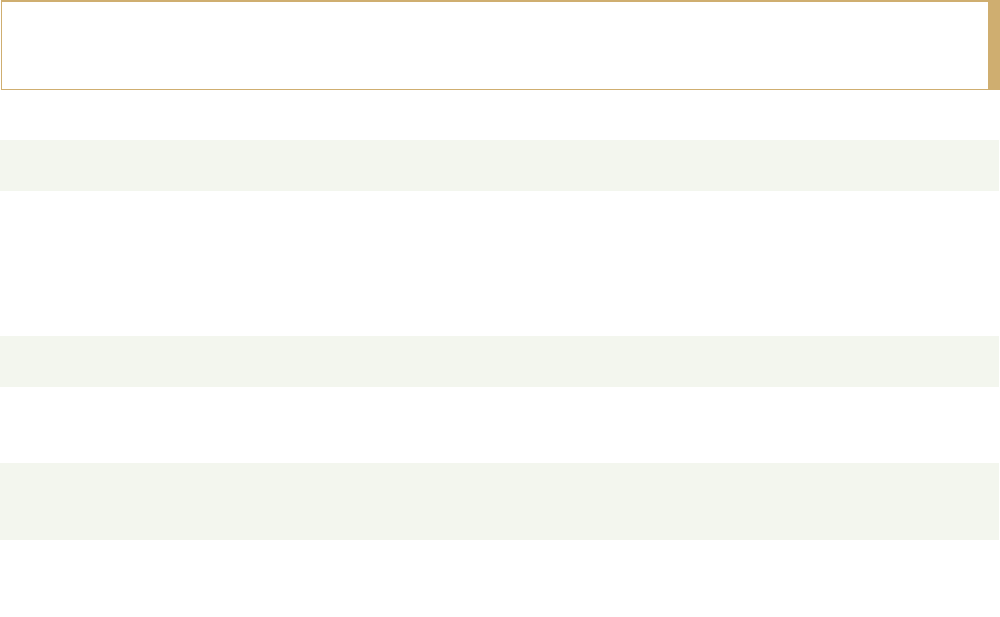
policy/
. Each student is responsible for reading and following this policy during examinations
and reviews.
Resources for Distance-Access Students
Some students are enrolled in courses that do not require all class content to be delivered in a
face-to-face traditional classroom environment. Instead, the content is delivered in a modified
learning format via the following: (1) courses offered in concentrated blocks of time on campus
(approximately 5 days around a weekend, three times per semester), (2) online conferencing,
and (3) digital video and distributed learning methods that allow for continued faculty contact
between sessions. In addition, clinical placement may be arranged outside the Middle
Tennessee area, provided a suitable agency and preceptor are available.
Distance-access students use the same type of student accounts as mentioned previously. The
primary difference is that instead of attending a class session in a traditional classroom
environment, these students view class presentations via digital video delivered via the Internet.
This viewing can take place as the session is being taught (called synchronous delivery) or via
audio or video files that are captured for later use (called asynchronous delivery). These files
are typically large and require faster Internet connections for smooth delivery. We require all
students to have high-speed Internet access, such as the services offered by cable companies
(Comcast, Charter, Time-Warner, etc.). For reference purposes, video is archived and may be
available via streaming in the media library only.
Requirements for Student Home Computer and Other Resources:
For detailed information about your home computer and other technology resources, go to the
Technology Overview page located at this link: https://nursing.vanderbilt.edu/tools/techover
view.php#recommendations.
VUSN LOCATION OF ADMINISTRATIVE OFFICES
Dean of the School of Nursing
Pamela Jeffries
112 Godchaux
Senior Associate Dean for Academics
Mavis Schorn
278 School of Nursing
Senior Associate Dean for Research,
Postdoctoral Fellowship Director
Interim: Ruth Kleinpell
(Until Jan. 31, 2024)
Mariann Piano
(Effective Feb.1, 2024)
407 Godchaux Hall
415 Godchaux Hall
Senior Associate Dean for Informatics
Patricia Sengstack
260 Frist Hall
Senior Associate Dean for Administration
and Operations
Becky Keck
105 Godchaux Hall
Associate Dean for Equity, Diversity, and
Inclusion
Rolanda Johnson
275 School of Nursing
Associate Dean for Clinical and
Community Partnerships
April Kapu
214 Godchaux Hall
28
VUSN MSN, POST-MASTER’S CERTIFICATE, and DNP Student Handbook 2023-2024
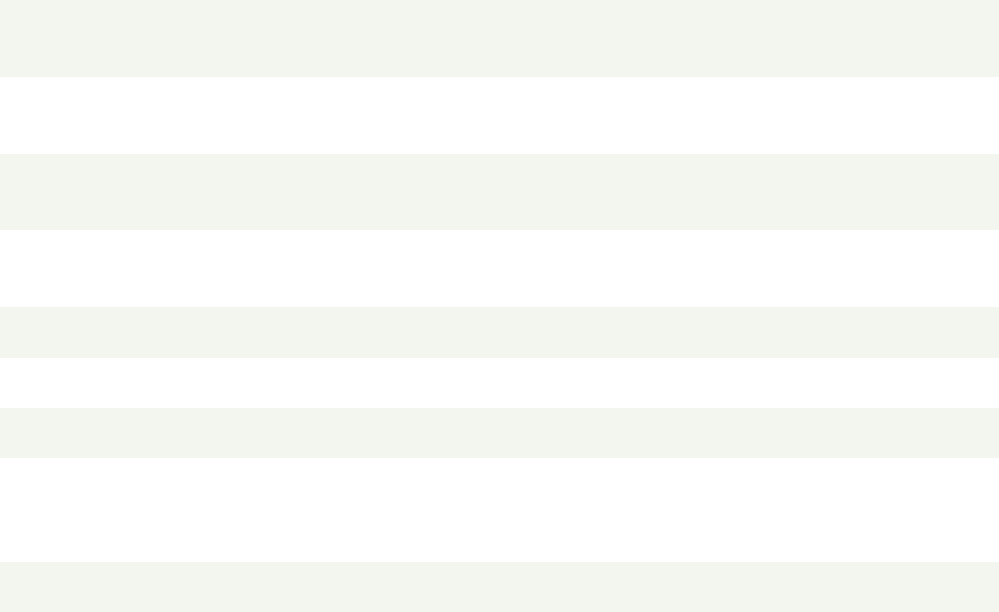
Assistant Dean for Academics, Advanced
Nursing Practice
Brian Widmar
310 Godchaux Hall
Assistant Dean for Academics, Generalist
Nursing Practice
Mary Jessee
544 School of Nursing
Assistant Dean for Academics, Doctoral
Nursing Practice
Terri Allison
224 Godchaux Hall
Assistant Dean for PhD in Nursing
Science
Angela McNelis
524 Godchaux Hall
Associate Dean for Strategic Enrollment
Ernie Rushing
176 School of Nursing
Assistant Dean for Student Affairs
Feylyn Lewis
179 School of Nursing
Assistant Dean of Clinical Placement
Melissa Carro
282 School of Nursing
Assistant University Registrar and
Director of Nursing Student Records in
the Office of Enrollment Services
Sara Donahoe
173 School of Nursing
Director of Student Financial Services
Kristie Futrell
180 School of Nursing
29
VUSN MSN, POST-MASTER’S CERTIFICATE, and DNP Student Handbook 2023-2024
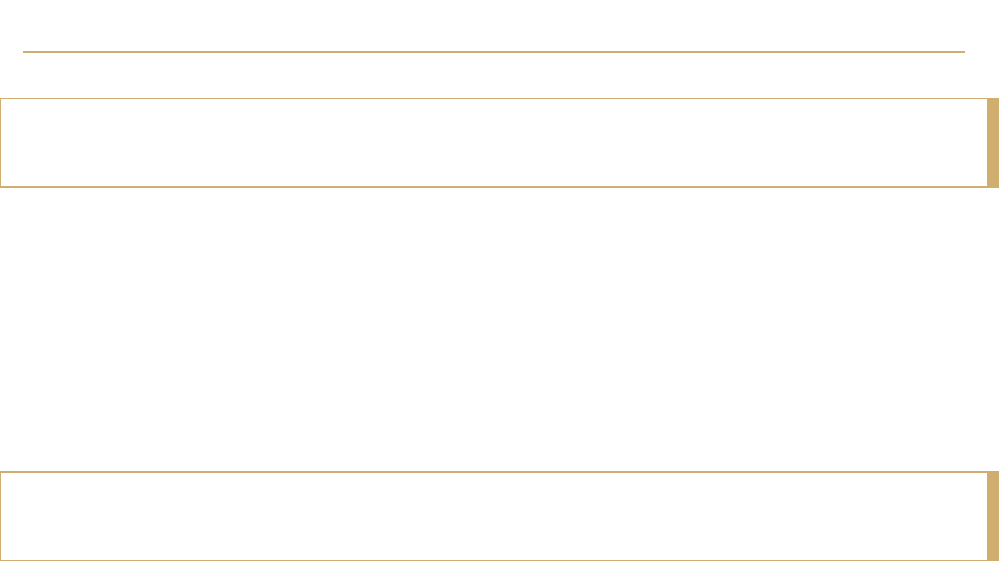
General Information for All Nursing Students
CHANGE OF ADDRESS AND TELEPHONE NUMBER
It is a student’s responsibility to keep address and other directory information current. Enrolled
students may report address changes, emergency contact information, and missing person
contact information via the web by logging into YES (Your Enrollment
Services) https://yes.vanderbilt.edu and clicking on the Address Change link.
Students who are on a Leave of Absence and degree candidates returning for Commencement
activities should keep the Assistant University Registrar and Director of Nursing Student
Records, Sara Donahoe, informed of the current mailing address and telephone number.
COMMUNICATING WITH THE SCHOOL OF NURSING
Contacting a member of the faculty
VUSN promotes a culture of mutual respect, including professional and timely communication.
Students are expected to check email and Brightspace announcements regularly, and may
expect timely communication and feedback from VUSN faculty. Students who have course-
related questions should contact course faculty via email. Emails will be returned during regular
business hours, and students are encouraged to follow up with faculty if a response is not
received within two business days. Under most circumstances, grades and feedback on
assignments will be returned within 2 weeks of the due date. If these guidelines cannot be met,
faculty will communicate an alternate plan with the student.
Students are encouraged to stay in close contact with their faculty advisers and individual
faculty. The faculty are available to help with concerns relating to course content, examinations,
and writing assignments. Faculty are eager to be of assistance to students but are also involved
in teaching, research, and practice. Therefore, it is important that students make an
appointment to see a faculty member. We suggest that email or voice mail is used to arrange a
time to see a faculty member. Unless it is an emergency, faculty will typically respond to
messages within two business days.
Emergency Phone Calls
Please remember to give families, day cares, and babysitters your schedule each semester so
that they will know where you are each day and a phone number where you can be reached. If
there is an emergency and a family member tries to call you by calling the School of Nursing
receptionist, she will have to make several internal calls to find out your schedule and determine
whether you are in class or in clinical, and potentially several more calls to reach you if you are
at your clinical site. All these calls can take time which is not advisable in an emergency. It is of
utmost importance that you be diligent in informing caregivers where you are each day of the
week.
30
VUSN MSN, POST-MASTER’S CERTIFICATE, and DNP Student Handbook 2023-2024

Faculty/Staff Mailboxes
Mailboxes for faculty and staff are in the mailroom directly across from the elevator on the first
floor of the School of Nursing building in room 182.
Official University Communications
Certain federal statutes require that information be delivered to each student. Vanderbilt
delivers much of this information via email. Official electronic notifications, including those
required by statutes, those required by University policy, and instructions from University
officials, will be sent to students’ Vanderbilt email addresses: (user.name@vanderbilt.edu).
Students are required to be familiar with the contents of official University notifications, and to
respond to instructions and other official correspondence requiring a response. Some
messages will include links to the YES Communications Tool, which is a secure channel for
official communication of a confidential nature.
The University makes every effort to avoid inundating students with nonessential email (often
called “spam”) and maintains separate lists from which students may unsubscribe for
announcements of general interest.
Students will most easily reach faculty and staff by email. Emails will be returned during regular
business hours, and students are encouraged to follow up with faculty if a response is not
received within two business days.
Voice Mail
Most faculty and staff are on the Vanderbilt Voice Mail System. If the person you are trying to
contact does not answer the phone after five rings, the voice mail system will automatically pick
up your call, and you can leave a message 24 hours a day.
CONTINUING STUDENT REQUIREMENTS
Background Check Required for Readmission: Students returning from a break in enrollment
must complete a new background check prior to registration. Instructions to complete a new
background check are provided on the Current MN/MSN/Post Master's Certificate/DNP Student
Requirements webpage: https://nursing.vanderbilt.edu/clinicalplacement/currentstudents.php.
A new background check is not required for students returning from a VUSN approved
deferment or LOA. However, returning students must submit up-to-date documentation to their
VUSN compliance portal requirements prior to registration.
Disclosure of offenses post-background check completion: Current full and part-time, MN,
MSN, Post-Master’s Certificate, and DNP students are required to immediately report to their
academic director and the Senior Associate Dean for Academics any arrest, criminal charge, or
conviction occurring after their background check has been completed. Required disclosure
also includes but is not limited to allegations, investigations, and/or disciplinary action from any
licensing board or agency included under the Nationwide Health Care Fraud and Abuse scan;
Office of Inspector General (OIG), General Services Administration (GSA), FDA Debarment
Check, Office of Regulatory Affairs (ORA), Office of Research Integrity (ORI), and Medicare and
Medicaid Sanctions.
31
VUSN MSN, POST-MASTER’S CERTIFICATE, and DNP Student Handbook 2023-2024
Maintainin
g Health Insurance, TB Testing, Annual Flu Vaccination, Training, Licensing, and
Certification Requirements: While enrolled, continuing full and part-time MN, MSN, Post-
Master’s Certificate, and DNP students are required to update the following date-dependent
documentation in their VUSN compliance portal before the requirement's due/renewal date. The
student may be required to pay a fee to maintain their VUSN compliance portal.
Please note: Students who fail to maintain their VUSN compliance portal requirements with
up-to-date documentation will not be allowed to begin/continue clinical course work and/or
register for additional courses.
VUSN Requirements to Maintain for Registration:
1. All students are required to be covered by health insurance either through the
University’s student health insurance plan (SHIP) https://www.vanderbilt.edu/stuaccts/
insurance/health-insurance.php or by another policy while enrolled (monthly issued
insurance is not acceptable). Clinical sites require students to have health insurance to
cover any illness or injury that they may incur during the clinical training experience.
Students who wish to be covered by a personal policy must complete a waiver EACH
YEAR to decline the University’s student insurance plan (SHIP). To decline SHIP, the
student must submit a waiver with proof of coverage at https://www.vumc.org/student-
health/student-health-insurance by August 1 for the academic year. Students returning
from an LOA for spring must complete a waiver by January 1 and summer returns must
complete a waiver by June 1. If a waiver is not completed by the appropriate date, the
student is automatically billed and enrolled in the University’s SHIP.
Students must maintain current documentation of health insurance coverage through
their VUSN compliance portal. Documentation of the University’s SHIP can be
downloaded each academic year, during the first two-weeks of August
at: https://www.vumc.org/student-health/student-health-insurance. Students who
change providers during enrollment must provide current documentation of their
coverage by contacting the VUSN Compliance Officer at: lisa.boyer@vanderbilt.edu or
call (615) 343-3294.
2. All continuing students are required to submit an annual tuberculin skin test (PPD) or
blood test (IGRA= QFT-Plus, QFT-GIT and T-Spot). If the student has been consecutively
enrolled and a clear chest x-ray was submitted to the VUSN compliance portal in the
year(s) prior, complete the Annual Post-Chest X-ray TB Questionnaire (https://nursing.
vanderbilt.edu/clinicalplacement/pdf/tbscreening_questionnaire.pdf), to confirm the
absence of symptoms (health care provider signature required).
a. If the test is positive, medical evaluation and documentation of a clear chest x-
ray (lab report OR physician verification of results) are required. If there is
evidence of a positive chest x- ray and/or symptoms of TB, the student must
notify their Program Director and follow up with a medical evaluation and if
needed, treatment.
3. Current American Heart Association (AHA) Basic Life Support (BLS) CPR certification is
required by all entry levels and specialties. BLS provided by the AHA is the only BLS
card accepted. Providers other than the AHA cannot be accepted, even if the course
"follows AHA guidelines."
4. In addition to the AHA BLS, additional CPR certifications are required by the following
specialties: AHA Pediatric Advanced Life Support (PALS) is required by PNP-AC and
ENP. AHA Advanced Cardiac Life Support (ACLS) is required by AGACNP and ENP. NNP
specialty requires the Neonatal Resuscitation Program (NRP) certification. Advanced
Trauma Life Support (ATLS) -or- Trauma Nurse Core Course (TNCC) -or- Advanced
Trauma Care for Nurses (ATCN), required by ENP. Other specialties may require
additional CPR certifications at specific stages of enrollment.
32
VUSN MSN, POST-MASTER’S CERTIFICATE, and DNP Student Handbook 2023-2024
5. HIPAA an
d OSHA safety training is required annually by academic year through
BrightSpace (VUnetID required). Instructions to complete the online training are available
under the requirement’s drop-down in the VUSN Compliance portal. Additional training
may be required for particular clinical sites.
6. Copy of an unencumbered Registered Nurse’s license in the state(s) where you
reside/work and will be doing clinical training (if applicable). In addition, DNP students
who are an NP, CNM or CRNA are required to submit an unencumbered Advance
Practice Registered Nurse (APRN) designation in their state of residence and states of
clinical practice and hold national board certification in their area of specialty as
appropriate.
7. Influenza: Annual flu vaccination is required or student must obtain an approved
exemption through Vanderbilt University’s Student Health Center by submitting a request
by October 1
st
, prior to each flu season at, https://www.vumc.org/student-
health/influenza-vaccinations-students. Medical provider documentation of a
contraindication to the seasonal influenza vaccine is required for exemption approval.
(Note: Minor side effects, such as low-grade fever, cold symptoms, or muscle aches, are
not considered a medical contraindication to the influenza vaccine.)
8. In addition, students unable to receive an annual flu vaccination must also obtain an
approved exemption (per site specifications) prior to placement at each clinical,
observation or project site.
About COVID-19
The overwhelming majority of clinical placement sites require either documentation of a
completed series of COVID-19 vaccinations or (in some cases) an approved exemption before
allowing students to rotate at their facilities. Students are strongly encouraged to have the
COVID-19 vaccine in anticipation of this requirement. VUSN will not assign clinical placement
sites based on an individual student’s preference about COVID-19 vaccination, nor will VUSN
reassign a student to a different site because of a student’s COVID-19 vaccination preference.
VUSN cannot guarantee students will be able to complete clinical rotations unless all agency
requirements are met. You may not begin your clinical rotations until you have met all the site
requirements and have received confirmation from your faculty and the Clinical Placement
office that you are cleared to start.
Clearing the Continuing Student, VUSN Student Requirements Hold for Registration: The
continuing student must maintain up-to-date documentation through their VUSN compliance
portal by submitting the documentation specified under the requirement's drop-down. The
readmitted student must have satisfactory completion of a new background check in addition
to maintaining up-to-date documentation through their VUSN compliance portal. The VUSN
Student Requirements Hold in Your Enrollment Services (YES) account is automatically cleared
(allow 10-business days) when all requirements applicable to the student's specialty show as
'Approved'/'Complete' in their VUSN compliance portal.
Additional Clinical Site Requirements and Restrictions: Additional immunizations, titers, TB
testing, drug screening, and/or additional background checks may be required by some clinical,
observation and project sites. Once enrolled, the student may complete immunizations, titers
and TB testing at Student Health (https://www.vumc.org/student-health/welcome). A student
who plans to use Student Health should call (615) 322-2427 to schedule an appointment. The
student should bring a copy of their VU Nursing Immunization and TB Testing form and any
required documentation to the appointment. Students are responsible for all charges incurred in
order to meet clinical site requirements.
33
VUSN MSN, POST-MASTER’S CERTIFICATE, and DNP Student Handbook 2023-2024

Due to c
ertain restrictions, VUSN is not able to accommodate clinical placements in all
locations.
Accidents/Injury/Illnesses: Students are responsible for the costs of tests, treatment, and
follow-up care for any accidents, injury, or illnesses that occur while enrolled as students at
VUSN. Students are not entitled to worker’s compensation benefits.
NEW STUDENT REQUIREMENTS
Special Students, who are only enrolled in one course and are not seeking a degree from the
School of Nursing, are not required to complete a background check or the new student
compliance requirements unless they apply and are admitted to VUSN.
Background Check Requirement: Upon acceptance, all full- and part-time students admitted to
a MN, MSN, Post-Master’s Certificate or DNP program must complete a background check as
part of their VUSN compliance portal requirements. Instructions to complete the VUSN
requirements are available under the New Student Compliance Requirements section of the
VUSN Admitted Student webpage (https://nursing.vanderbilt.edu/students/admitted/index.php)
by student entry type.
Enrollment is contingent upon satisfactory evaluation of the results of the background check.
Background Check Required for Readmission: Students returning from a break in enrollment
must complete a new background check. Instructions to complete a new background check
are provided on the Current MN/MSN/Post Master's Certificate/DNP Student Requirements
webpage: https://nursing.vanderbilt.edu/clinicalplacement/currentstudents.php.
A new background check is not required for students returning from a VUSN approved
deferment or LOA. However, all returning students must submit up-to-date documentation to
their VUSN compliance portal requirements prior to registration.
Disclosure of offenses post-background check completion: Current full- and part-time MN,
MSN, Post-Master’s Certificate, and DNP students are required to immediately report to their
faculty adviser and the senior associate dean for academics any arrest, criminal charge or
conviction occurring after their background checks have been completed. Required disclosure
also includes but is not limited to allegations, investigations and/or disciplinary action from any
licensing board or Abuse scan: Office of Inspector General (OIG), General Services
Administrations (GSA), FDA Debarment Check, Office of Regulatory Affairs (ORA), Office of
Research Integrity (ORI), and Medicare and Medicaid Sanctions.
New Student Compliance Requirements: The State of Tennessee requires certain
immunizations for all students (including distance graduate and professional students) prior to
registration. The University’s Immunization Hold on registration is automatically cleared from
Your Enrollment Services (YES) account (allow 10-business days) after the student has
satisfactorily met the state-mandated requirements through the Student Health Portal.
In addi
tion, all full- and part-time MN, MSN, Post-Master's Certificate, and DNP students are
required to meet the VUSN requirements for registration through the VUSN compliance portal.
The VUSN Student Requirements Hold on registration is automatically cleared from Your
Enrollment Services (YES) account (allow 10-business days) after all requirements applicable to
34
VUSN MSN, POST-MASTER’S CERTIFICATE, and DNP Student Handbook 2023-2024
the stud
ent’s entry type and/or specialty show as 'Approved'/'Complete' in their VUSN
compliance portal.
Students should use the process indicated on the VUSN Admitted Student
webpage (https://nursing.vanderbilt.edu/students/admitted/index.php) under New Student
Compliance Requirements to meet the state mandated and VUSN student requirements for
registration.
Please note: If the new student fails to provide acceptable documentation of requirements,
she/he will not be allowed to attend orientation and/or classes.
How to Meet the VUSN New Student Compliance Requirements: The student must complete
all requirements applicable to their entry type and/or specialty in the VUSN compliance portal.
Instructions to complete the VUSN immunization, testing and certification requirements are
provided on the VUSN Admitted Student webpage (https://nursing.vanderbilt.edu/students
/admitted/index.php) by entry type. Select the New Student Compliance Requirements drop-
down.
Newly admitted students will use the Exxat platform to complete the VUSN background check
and submit the immunization, certification and licensing documentation required prior to
registration. Exxat provides students, faculty, and staff with one platform to access clinical site
information, contractual agreements, clearance requirements and the ability to document
clinical hours and proficiencies through all phases of the student's clinical experience. Students
must submit the immunizations testing, training, certifications and licensure documentation
required for their entry type and/or specialty, as outlined under their Exxat Compliance portal
requirements. The documentation submitted to the requirements must be approved prior to
registration. (July 1 for fall and December 1 for spring.) The student must select the drop-down
for each requirement in their VUSN compliance portal to view instructions and download
required forms. The file submitted to each requirement must frame only the student's original
document(s) and all dates and information must be clear and readable.
Complete the VU Nursing Immunization and TB Testing Form (https://nursing.vanderbilt.edu/
clinicalplacement/pdf/health_questionnaire.pdf) to meet the requirements listed below.
Documentation of previously completed immunizations, titers and TB testing must be from the
following sources for approval: official medical, state, county, or international immunization
records (English required).
Non-RN entries (Newly admitted PreSpecialty and MN Program students) must also complete a
drug screen prior to registration as part of their VUSN compliance portal requirements.
VUSN Immunization/Titer, TB Testing, CPR Certification, Health Insurance, Licensure, and
Certification Requirements for Registration:
1. Physical examination within six months of acceptance to the program, authenticated by
a physician, an APRN, PA, or a DO documenting evidence of the student’s ability to carry
out assignments in a nursing school program. Use the VU Nursing Immunization and TB
Testing form at (https://nursing.vanderbilt.edu/clinicalplacement/pdf/health_question
naire.pdf). (Also, downloadable from the requirement’s drop-down in your VUSN
compliance portal.)
2. Measles, Mumps, Rubella: Two (2) MMR vaccinations given at least 28-days apart OR if
no vaccination records available, lab evidence of immunity (positive titer results) for
each Measles (Rubeola), Mumps, and Rubella. At least one of two MMR booster
35
VUSN MSN, POST-MASTER’S CERTIFICATE, and DNP Student Handbook 2023-2024
vaccin
ations are required prior to registration following a negative or equivocal titer
result.
3. Varicella: Two varicella vaccines given at least 28 days apart OR if no vaccination
records available, lab evidence of varicella immunity (positive titer). At least one of two
Varicella booster vaccinations is required prior to registration following a negative or
equivocal titer result.
4. Hepatitis B: A Hepatitis B vaccination series completed following the guidelines for
dosing intervals published by the Centers for Disease Control and Prevention (CDC) OR if
no vaccination records available, lab evidence of immunity (positive anti-HBs or HBsAb
surface antibody). The student must provide complete documentation of a full Hepatitis
B vaccination series or a positive titer result prior to participation in observation or
clinical.
5. Tetanus-Diphtheria-Pertussis (Tdap): Documentation of vaccination within last ten years.
(DTP/DTaP and Td/TD vaccines do not meet this requirement.)
6. All newly admitted students are required to submit a tuberculin blood test (IGRA=QFT-
Plus, QFT-GIT, and T-Spot) completed within 3-months of program start.
• If reading(s) is/are negative, repeat one- PPD or TB blood test annually.
• If positive, medical evaluation and documentation of a clear chest x-ray completed
within 6-months of program start (lab report OR physician verification of results
required). If there is evidence of a positive chest x-ray and/or symptoms of TB, the
student must notify their Program Director and follow up with a medical evaluation
and if needed, treatment. For each consecutive year of enrollment after completing a
chest x-ray, the Annual Post-Chest X-ray TB Questionnaire https://nursing.vanderbilt
.edu/clinicalplacement/pdf/tbscreening_questionnaire.pdf, must be completed and
signed by a health care provider.
7. Influenza: Annual flu vaccination is required or the student must obtain an approved
exemption through Vanderbilt University’s Student Health Center by submitting a request
by October 1st, prior to each flu season at, (https://www.vumc.org/student-
health/influenza- vaccinations-students). Medical provider documentation of a
contraindication to the seasonal influenza vaccine is required for exemption approval.
(Note: Minor side effects, such as low-grade fever, cold symptoms, or muscle aches, are
not considered to be a medical contraindication to the influenza vaccine). In addition,
students unable to receive an annual flu vaccination must also obtain an approved
exemption (per site specifications) prior to placement at each clinical, observation or
project site.
8. All students are required to be covered by health insurance either through the
University’s student health insurance plan (SHIP) or by another policy while enrolled
(monthly issued insurance is not acceptable). Clinical sites require students to have
health insurance to cover any illness or injury that they may incur during the clinical
training experience. Students who wish to be covered by a personal policy must
complete a waiver EACH YEAR to decline the University’s student insurance plan (SHIP).
To decline SHIP, the student must submit a waiver with proof of coverage at:
(https://www.vumc.org/student-health/student-health-insurance) by January 1 for
spring admits, June 1 for summer admits and August 1 for fall admits. If a waiver is not
completed by the appropriate date, the student is automatically billed and enrolled in the
University’s SHIP. Newly admitted VUSN students must also submit documentation to
their VUSN compliance portal of either the University’s SHIP coverage (proof available
the first two-weeks of August at: https://www.vumc.org/student-health/student-health-
insurance or of their personal health insurance once the SHIP has successfully been
waived with a copy (front & back) of their insurance card or a letter verifying coverage.
More information on the University’s SHIP is provided at https://www.vumc.org/student-
health/student-health-insurance.
36
VUSN MSN, POST-MASTER’S CERTIFICATE, and DNP Student Handbook 2023-2024
9. Curren
t American Heart Association (AHA) Basic Life Support (BLS) CPR Certification is
required by all entry levels and specialties. BLS provided by the AHA is the only BLS
card accepted. Providers other than the AHA cannot be accepted, even if the course
"follows AHA guidelines."
10. In addition to the AHA BLS, additional CPR certifications are required by the following
specialties: AHA Pediatric Advanced Life Support (PALS) is required by PNP-AC and
ENP. AHA Advanced Cardiac Life Support (ACLS) is required by AGACNP and ENP. NNP
specialty requires the Neonatal Resuscitation Program (NRP) certification. Advanced
Trauma Life Support (ATLS) -or- Trauma Nurse Core Course (TNCC) -or- Advanced
Trauma Care for Nurses (ATCN), required by ENP. Other specialties may require
additional CPR certifications at specific stages of enrollment.
11. Copy of an unencumbered Registered Nurse’s license in the state(s) where you
reside/work and will be doing clinical training (if applicable). In addition, DNP students
who are an NP, CNM or CRNA are required to submit an unencumbered Advance
Practice Registered Nurse (APRN) designation in their state of residence and states of
clinical practice and hold national board certification in their area of specialty as
appropriate.
12. HIPAA and OSHA safety training is required annually by academic year through
BrightSpace (VUnetID required). Instructions to complete the online training are available
under the requirement’s drop-down in the Exxat Compliance portal. Additional training
may be required for particular clinical sites.
13. Honor Code and Plagiarism Tutorial. Read letter regarding plagiarism from the Senior
Associate Dean for Academics (https://nursing.vanderbilt.edu/students/admitted/pdf/
plagiarism.pdf) and follow instructions under the requirement’s drop-down in the Exxat
Compliance portal to complete the latest version of a tutorial developed by Indiana
University Bloomington.
About COVID-19
The overwhelming majority of clinical placement sites require either documentation of a
completed series of COVID-19 vaccinations or (in some cases) an approved exemption before
allowing students to rotate at their facilities. Students are strongly encouraged to have the
COVID-19 vaccine in anticipation of this requirement. VUSN will not assign clinical placement
sites based on an individual student’s preference about COVID-19 vaccination, nor will VUSN
reassign a student to a different site because of a student’s COVID-19 vaccination preference.
VUSN cannot guarantee students will be able to complete clinical rotations unless all agency
requirements are met. You may not begin your clinical rotations until you have met all the site
requirements and have received confirmation from your faculty and the Clinical Placement
office that you are cleared to start.
Clearing the VUSN Student Requirements Hold for Registration: The newly admitted student
must satisfactorily complete all of the requirements with a July 1st Due Date in the Exxat
Compliance portal. Additionally, students admitted to the PreSpecialty and MN programs (non-
RN) must satisfactorily complete a drug screen through their Exxat compliance portal. Once the
requirements for the student’s entry type and/or specialty are satisfactorily completed, the
VUSN Student Requirements Hold is automatically cleared from Your Enrollment Services (YES)
account (allow 10-business days).
Additional Clinical Site Requirements and Restrictions: Additional immunizations, titers,
TB testing, drug screening, and/or additional background checks may be required by some
clinical, observation and project sites. Once enrolled, the student may complete immunizations,
titers and TB testing at Student Health (https://www.vumc.org/student-health/welcome). A
37
VUSN MSN, POST-MASTER’S CERTIFICATE, and DNP Student Handbook 2023-2024
student wh
o plans to use Student Health should call (615) 322- 2427 to schedule an
appointment. The student should bring a copy of the VU Nursing Immunization and TB Testing
form (https://nursing.vanderbilt.edu/clinicalplacement/pdf/health_questionnaire.pdf) and any
required documentation to the appointment. Students are responsible for all charges incurred in
order to meet clinical site requirements. Due to certain restrictions, VUSN is not able to
accommodate clinical placements in all locations.
Accidents/Injury/Illnesses: Students are responsible for the costs of tests, treatment,
and follow-up care for any accidents, injury, or illnesses that occur while enrolled as students
at VUSN. Students are not entitled to worker’s compensation benefits.
How to Meet the State-Mandated Immunization Requirements for New Students at Vanderbilt
University: Follow instructions on the Vanderbilt Student Health Center’s Immunization
Requirements webpage (https://www.vumc.org/student-health/immunization-requirements-
new-students) to enter dates and submit documentation of the following state-mandated
requirements through the Vanderbilt Student Health Immunization Portal (https://vanderbilt.
studenthealthportal.com/Account/Logon?ReturnUrl=%2f). Acceptable forms of documentation
include; official state/county immunizations, official signed or certified medical records, Yellow
Book/immunization card from country of origin (English required), or the VU Nursing
Immunization and TB Testing form (https://nursing.vanderbilt.edu/clinicalplacement
/pdf/health_questionnaire.pdf) completed and signed by a health care provider.
Vanderbilt University’s State-Mandated Immunization and/or Titer Requirements for
Registration:
1. Measles, Mumps, Rubella: Two (2) MMR vaccinations given at least 28-days apart OR if
no vaccination records available, lab evidence of immunity (positive titer results) for
each Measles (Rubeola), Mumps, and Rubella. At least one of two MMR booster
vaccinations are required prior to registration following a negative or equivocal titer
result.
2. Varicella: Two varicella vaccines given at least 28 days apart OR if no vaccination
records available, lab evidence of varicella immunity (positive titer). At least one of two
Varicella booster vaccinations is required prior to registration following a negative or
equivocal titer result.
3. Hepatitis B: A Hepatitis B vaccination series completed following the guidelines for
dosing intervals published by the Centers for Disease Control and Prevention (CDC) OR if
no vaccination records available, lab evidence of immunity (positive anti-HBs or HBsAb
surface antibody). The student must provide complete documentation of a full Hepatitis
B vaccination series or a positive titer result prior to participation in observation or
clinical.
4. Tetanus-Diphtheria-Pertussis (Tdap): Documentation of vaccination within last ten years.
(DTP/DTaP and Td/TD vaccines do not meet this requirement.)
5. All newly admitted students are required to submit a tuberculin blood test (IGRA= QFT-
Plus, QFT-GIT and T-Spot) completed within 3-months of program start.
• If reading(s) is/are negative, repeat one- PPD or TB blood test annually.
• If positive, medical evaluation and documentation of a clear chest x-ray completed
within 6-months of program start (lab report OR physician verification of results
required). If there is evidence of a positive chest x-ray and/or symptoms of TB, the
student must notify their Program Director and follow up with a medical evaluation
and if needed, treatment. For each consecutive year of enrollment after completing
a chest x-ray, the Annual Post-Chest X-ray TB Questionnaire (https://nursing.
38
VUSN MSN, POST-MASTER’S CERTIFICATE, and DNP Student Handbook 2023-2024

vanderbi
lt.edu/clinicalplacement/pdf/tbscreening_questionnaire.pdf), must be
completed and signed by a health care provider.
6. Influenza: Annual flu vaccination is required or student must obtain an approved
exemption through Vanderbilt University’s Student Health Center by submitting a request
by October 1st, prior to each flu season at: https://www.vumc.org/student-
health/influenza-vaccinations-students. Medical provider documentation of a
contraindication to the seasonal influenza vaccine is required for exemption approval.
(Note: Minor side effects, such as low-grade fever, cold symptoms, or muscle aches, are
not considered to be a medical contraindication to the influenza vaccine).
In addition, students unable to receive an annual flu vaccination must also obtain an
approved exemption (per site specifications) prior to placement at each clinical,
observation or project site.
7. All students are required to be covered by health insurance either through the
University’s student health insurance plan (SHIP) or by another policy while enrolled
(monthly issued insurance is not acceptable). Clinical sites require students to have
health insurance to cover any illness or injury that they may incur during the clinical
training experience.
Students who wish to be covered by a personal policy must complete a waiver EACH
YEAR to decline the University’s student insurance plan (SHIP). To decline SHIP, the
student must submit a waiver with proof of coverage at: https://www.vumc.org/student-
health/student-health-insurance by January 1 for spring admits, June 1 for summer
admits, and August 1 for fall admits. If a waiver is not completed by the appropriate
date, the student is automatically billed and enrolled in the University’s SHIP.
Newly admitted VUSN students must also submit documentation to their VUSN
compliance portal of either the University’s SHIP coverage (proof available the first two-
weeks of August at: https://www.vumc.org/student-health/student-health-insurance or
of their personal health insurance once the SHIP has successfully been waived with a
copy (front & back) of their insurance card or a letter verifying coverage. More
information on the University’s SHIP is provided at: https://www.vumc.org/student-
health/student-health-insurance.
Clearing the State-Mandated, VU Immunization Requirement Hold for Registration: The
University’s Immunization Hold is automatically cleared from Your Enrollment Services (YES)
account when a message of compliance is received through your Student Health Immunization
Portal (allow 10-business days).
EXPOSURE TO CONTAGIONS OR HEALTH EMERGENCIES
Blood and Body Fluids
If a student has an exposure to blood or body fluids (i.e., a needle stick, splash to eyes or mouth,
or contact with non-intact skin) during a clinical rotation, these are the steps that should be
taken.
1. Immediate Student Actions Following Exposure
• Wash the exposed area immediately with soap and water.
• Flush eyes or mouth with tap water for 15 minutes.
• Remove contacts immediately if eyes are exposed.
39
VUSN MSN, POST-MASTER’S CERTIFICATE, and DNP Student Handbook 2023-2024
• Obtain the name, medical record number, and location of the patient source of the
exposure. You will give this important information to the Occupational Health Service
practitioner at the clinical agency.
• Notify your clinical supervisor and clinical course coordinator immediately.
• File a report in the Origami Risk Management System.
(https://www.vanderbilt.edu/riskmanagement/) and click on “Report a University
Occurrence” on the right Quick Links.
• Notify Feylyn Lewis, Assistant Dean for Student Affairs
at feylyn.m.lewis@vanderbilt.edu or by phone at 615.343.3334 or Allie Noote,
Associate Director at [email protected] or by phone at 615.322.2814.
2. Important Notification and Documentation Procedure
When On Campus:
• Report in person immediately to the Vanderbilt Occupational Health Clinic (OHC)
Monday-Friday, 7:30 a.m. - 5:30 p.m., 6th Floor, Suite 640 of the Medical Arts Building
(MAB).
• When the Vanderbilt Occupational Health Clinic is closed, report immediately to the
Vanderbilt Adult Emergency Department for the initial assessment and treatment.
Notify OHC by calling 615.936.0955 to report the exposure. This phone is answered
24 hours a day, 7 days a week.
• All exposed students will be referred to the OHC for further evaluation and/or
treatment on the next OHC business day. No appointment is necessary.
• Notify your clinical supervisor and clinical course coordinator immediately.
• File a report in the Origami Risk Management System.
(https://www.vanderbilt.edu/riskmanagement/) and click on “Report a University
Occurrence” on the right Quick Links.
• Notify Feylyn Lewis, Assistant Dean for Student Affairs
at feylyn.m.lewis@vanderbilt.edu or by phone at 615.343.3334 or Allie Noote,
Associate Director at [email protected] or by phone at 615.322.2814.
Assessment and Treatment of Your Exposure
The Occupational Health Service and/or the Vanderbilt Adult Emergency Department will:
• Document, assess and treat your exposure.
• Order screening tests from the source (patient) for Hepatitis B, Hepatitis C, HIV and, if
appropriate, other labs as needed.
• Occupational Health will follow-up on all lab studies, advise you of the results and
provide recommendations for any further treatment.
When Off Campus:
• Should an exposure occur off campus, follow the agency/facility protocol for OSHA
blood borne pathogen emergency treatment.
• Immediately contact the Vanderbilt Occupational Health Clinic at 615.936.0955 for
further instructions and follow-up care. This phone is answered 24 hours a day, 7
days a week.
• Notify your clinical supervisor and clinical course coordinator immediately.
• File a report in the Origami Risk Management System.
(https://www.vanderbilt.edu/riskmanagement/) and click on “Report a University
Occurrence” on the right Quick Links.
40
VUSN MSN, POST-MASTER’S CERTIFICATE, and DNP Student Handbook 2023-2024
• Notify Feylyn Lewis, Assistant Dean for Student Affairs
at feylyn.m.lewis@vanderbilt.edu or by phone at 615.343.3334 or Allie Noote,
Associate Director at [email protected] or by phone at 615.322.2814.
Respiratory and Other Non-Bloodborne Pathogens (such as TB, lice, meningitis, measles, COVID-
19, and others)
When On Campus:
• Report to Vanderbilt Student Health for an assessment or guidance. Monday-Friday
8:00 a.m. - 4:30 p.m., Saturday, 8:30 a.m. - 12:00 p.m. 615.322.2427.
• Notify your clinical supervisor and clinical course coordinator immediately.
• File a report in the Origami Risk Management System. (https://www.vanderbilt
.edu/riskmanagement/) and click on “Report a University Occurrence” on the right
Quick Links.
• Notify Feylyn Lewis, Assistant Dean for Student Affairs at feylyn.m.lewis@vanderbilt.
edu or by phone at 615.343.3334 or Allie Noote, Associate Director
at [email protected] or by phone at 615.322.2814.
Assessment and Treatment of Your Exposure
Student Health will:
• Document, assess and treat your exposure.
• Order screening tests from the source (patient) for Hepatitis B, Hepatitis C, HIV and, if
appropriate, other labs as needed.
• Student Health will follow-up on all lab studies, advise you of the results and provide
recommendations for any further treatment.
When Off Campus:
• Student should call Vanderbilt Student Health to speak with a provider at
615.322.2427. This phone is answered 24 hours a day, 7 days a week.
• Notify your clinical supervisor and clinical course coordinator immediately.
• File a report in the Origami Risk Management System.
(https://www.vanderbilt.edu/riskmanagement/) and click on “Report a University
Occurrence” on the right Quick Links.
• Notify Feylyn Lewis, Assistant Dean for Student Affairs at feylyn.m.lewis@vanderbilt.
edu or by phone at 615.343.3334 or Allie Noote, Associate Director
at [email protected] or by phone at 615.322.2814.
Occupational Exposure Charges
• If charges are incurred from Occupational Health or a hospital other than Vanderbilt,
students should allow their personal health insurance to be billed. Students are not
eligible for worker’s compensation.
• The Vanderbilt School of Nursing will pay for any charges that are not covered by
insurance. Invoices for remaining balances should be sent to the Assistant Dean for
Student Affairs for payment.
• Students should not pay the invoices directly.
41
VUSN MSN, POST-MASTER’S CERTIFICATE, and DNP Student Handbook 2023-2024

• Notify Feylyn Lewis, Assistant Dean for Student Affairs at feylyn.m.lewis@vanderbilt.
edu or by phone at 615.343.3334 or Allie Noote, Associate Director
at [email protected] or by phone at 615.322.2814.
In The Event Of A Serious Health Concern Or An Emergency
For life-threatening emergency call 911 immediately.
• For non-life-threatening health situations, report to Vanderbilt Student Health for an
assessment or guidance. Monday-Friday 8:00 a.m. - 4:30 p.m., Saturday, 8:30 a.m. -
12:00 p.m. 615.322.2427. If closed, report to the Vanderbilt Adult Emergency
Department for the initial assessment and treatment.
• Notify Feylyn Lewis, Assistant Dean for Student Affairs at feylyn.m.lewis@vanderbilt.
edu or by phone at 615.343.3334 or Allie Noote, Associate Director
at [email protected] or by phone at 615.322.2814.
FORMS FOR ENROLLMENT CHANGES
Vanderbilt University School of Nursing forms may be found on the VUSN Web site at https://
nursing.vanderbilt.edu/students/current/enrollment/student_forms.php.
LICENSURE AND CERTIFICATION
Registered Nurse (RN) Licensure
Students are eligible to apply to the National Council on Licensure Examination (NCLEX-RN®) to
become a Registered Nurse (RN) upon meeting the requirements specified by the Tennessee
State Board of Nursing and upon recommendation by the faculty and the Dean. The following
requirements must be met: (a) completion of the PreSpecialty portion of the curriculum; (b)
good academic standing (semester and cumulative grade point average of 3.0 or above); and
(c) no final course grade below a B-, and no Incomplete grades. Students who are ineligible to
take the NCLEX-RN® after completing the appropriate sequence of courses will not be allowed
to enroll for specialty-level courses. For more information go to TN Board of Nursing (https://
www.tn.gov/health/health-program-areas/health-professional-boards/nursing-board/nursing-
board/about.html).
Students who are not Registered Nurses are required to take examinations to prepare for the
NCLEX-RN®. An assessment test is administered to students during the last semester of the
PreSpecialty level.
Students who are not successful on the first attempt at the NCLEX-RN® are subject to
withdrawal from specialty level courses with a clinical component. The student cannot attend
clinical practica until the RN license is obtained. The program of study for full-time students will
be altered because of a delay in being able to participate in clinical courses. Additional
semester(s) will be required to complete clinical courses.
Reporting NCLEX-RN® results: Students must notify their Specialty Director and Assistant Dean
for Academics, Generalist Nursing Practice of their NCLEX-RN® results within 48 hours of
receiving results (pass or fail). A copy of their RN License must be submitted to their VUSN
42
VUSN MSN, POST-MASTER’S CERTIFICATE, and DNP Student Handbook 2023-2024
complianc
e portal. Students who fail the NCLEX-RN® will not be allowed to participate in any
specialty-level clinical courses until after they have successfully passed the NCLEX-
RN®. Failure to notify the Specialty Director and Assistant Dean for Academics, Generalist
Nursing Practice of failure of the NCLEX-RN® within 48 hours of receiving results will result in
immediate dismissal from the school. Students who fail must make an appointment with the
Senior Associate Dean for Academics or Assistant Director for Prelicensure Nursing Academics
and must submit a plan of study for preparation for the NCLEX-RN® second attempt.
Preparation for the NCLEX-RN® includes but is not limited to:
1. NCLEX-RN® style exam questions and strategies for success are incorporated
throughout the curriculum.
2. All students will complete the NCLEX-RN® Review Course at the end of semester three.
3. All students will complete a cumulative curriculum assessment exam. Students not
achieving the benchmark score on the assessment exam are considered high-risk for
not passing the NCLEX-RN® on the first attempt. For these students, individualized
counseling and study plan development will occur based on personal learning
preferences, content strengths and weaknesses, and confidence taking standardized
exams.
Students who have test anxiety when taking standardized exams are encouraged to schedule
an appointment with the University Counseling Center for evaluation and planning well before
taking the NCLEX-RN®.
The PreSpecialty curriculum engages students with the theoretical knowledge and practical
experience necessary for success on the NCLEX-RN®. However, it is each student’s
responsibility to determine their mastery of the information and appropriately prepare to take
the NCLEX-RN®.
Each spring, a mandatory session is held by the Assistant Director for Prelicensure Nursing
Academics for students who anticipate taking the NCLEX-RN® during the fall semester. This
session reviews student eligibility for taking the NCLEX-RN®, advises students regarding
preparation, and provides students with all necessary forms for registering for NCLEX-RN®.
The NCLEX-RN® is administered locally in Nashville at the Pearson Professional Center,
Riverview Office Bldg., 545 Mainstream Drive, Suite 410, Nashville, TN 37228; Phone
615.255.8672. The NCLEX-RN® may also be taken at an official testing center in any state.
Out of State RN Licensure
It is recommended that all students receive their initial RN licensure in Tennessee; however, if a
student's primary state of residence is one of the compact states, the applicant must apply for
licensure by exam in their home state. If a student is from a non-compact state, they can apply
for licensure by exam in TN and would be issued a single state license. Students wishing to
obtain an RN license in a state other than Tennessee will need to consult the State Board of
Nursing in that state for specific application requirements. Applying in a state other than
Tennessee may prolong the application approval process.
National Certification
Graduates of the MSN and Post-Master’s Certificate programs are encouraged to become
certified in their specialty and should consult their specialty directors for details. Certification is
offered through several professional nursing organizations. Graduates of each specialty are
43
VUSN MSN, POST-MASTER’S CERTIFICATE, and DNP Student Handbook 2023-2024
eligib
le to sit for the certification exams specific to their specialty. For more information, please
visit the web site specific to your specialty:
Adult-Gerontology Acute Care Nurse Practitioner
• American Nurses Credentialing Center (ANCC) https://nursingworld.org/ancc/
• American Association of Critical Care Nurses (AACN) https://www.aacn.org/
certification/get-certified/acnpc-ag
Adult-Gerontology Primary Care Nurse Practitioner
• American Nurses Credentialing Center (ANCC) https://nursingworld.org/ancc/
• American Association of Nurse Practitioners (AANP) https://www.aanp.org/
Emergency Nurse Practitioner
• American Association of Nurse Practitioners (AANP) https://www.aanp.org/
Family Nurse Practitioner
• American Nurses Credentialing Center (ANCC) https://nursingworld.org/ancc/
• American Association of Nurse Practitioners (AANP) https://www.aanp.org/
* Informatics
• American Nurses Credentialing Center (ANCC) https://nursingworld.org/ancc/
* Healthcare Leadership
• National Center for Healthcare Leadership (NCHL) https://www.nchl.org/
Neonatal Nurse Practitioner
• The National Certification Corporation (NCC) http://www.nccwebsite.org/
Nurse-Midwifery
• American Midwifery Certification Board (AMCB) http://www.amcbmidwife.org/
Pediatric Acute Care Nurse Practitioner
• The Pediatric Nursing Certification Board (PNCB) http://www.pncb.org/ptistore
/control/exams/ac/ac_role
Pediatric Primary Care Nurse Practitioner
• The Pediatric Nursing Certification Board (PNCB) http://www.pncb.org/ptistore
/control/exams/ac/ac_role
Psychiatric-Mental Health Nurse Practitioner (Family)
• American Nurses Credentialing Center (ANCC) https://nursingworld.org/ancc/
Women's Health Nurse Practitioner
• The National Certification Corporation (NCC) http://www.nccwebsite.org/
* Graduates of the Nursing and Health Care Leadership and Nursing Informatics specialties are
not required to obtain Advanced Practice Registered Nurse licensure.
44
VUSN MSN, POST-MASTER’S CERTIFICATE, and DNP Student Handbook 2023-2024

LOST AND FOUND
Please see the School of Nursing receptionist in the Colleen Conway-Welch Atrium if you lost a
belonging.
REGISTRATION
Each semester, at a time specified in the calendar, all students are required to confer with their
academic advisers and register for courses for the next semester. Registration for classes is
done by computer on Your Enrollment Services (YES). Students should check carefully with their
academic advisers concerning progress toward completing degree requirements and to make
necessary revisions in their program of studies. The School of Nursing requires continuous
registration of all degree candidates. Responsibility to maintain registration rests with the
student. To retain student status, the student must register each fall, spring, and summer
semester or secure an approved leave of absence. Students who are registered for zero hours in
order to satisfy requirements for an incomplete grade are considered degree candidates.
Students registering for zero hours for the express purpose of completing an incomplete grade
are charged $200 plus applicable fees.
Registration Hold
Students will have an adviser registration hold each semester. This hold will be released by the
faculty adviser after consultation with the student and adviser review of the classes in their
advisees’ enrollment cart.
How to Register
Please see the Office of Enrollment Services webpage (https://nursing.vanderbilt.edu/students
/current/enrollment/) for detailed instructions on how to register for courses.
Late Registration
Students may register for classes until the 5th day of class (exact date is based on degree,
program, and course start). Late registration must be approved by VUSN administration.
Dropping a Class
To drop a class, the student must be within an open enrollment period. If not, contact the
Assistant University Registrar and Director of Nursing Student Records, Sara Donahoe,
at sara.a.donahoe@vanderbilt.edu. To drop a class, simply click the red minus sign next to the
class you wish to drop. The system will ask “are you sure you want to drop this class?” Choose
yes or no. Once the system has dropped you from the class, it will no longer show in the
enrolled classes list. To see the dropped class, select the dropped filter checkbox at the upper
right of your screen, and the dropped class will appear on this list.
Grading Basis
If the student wishes to take a course Pass/Fail, it is necessary to consult the instructor and
then contact the school registrar.
45
VUSN MSN, POST-MASTER’S CERTIFICATE, and DNP Student Handbook 2023-2024

Enrolling in a Variable Credit Class
To edit the hours of a variable credit class, use the same blue notebook icon to the right of the
class. Use the hours dropdown to select the number of hours.
Viewing Your Schedule
To view your schedule, select “schedule” in your navigation bar.
Catalog Search: The catalog search is a digitized and searchable copy of all university courses
including credit hours and course descriptions.
ROOM RESERVATIONS
Students may reserve space for meetings in Godchaux Hall, the Annex, School of Nursing, and
Frist Hall by contacting Ellen Smogur via e-mail at ellen.smogur@vanderbilt.edu or at
615.322.4400.
STUDENT MEDICAL OR INJURY OCCURRENCES GUIDELINES
Responding to Student Health Events and Injuries
Vanderbilt University School of Nursing (VUSN) is committed to the health, wellness, and safety
of all students. The following protocols were developed to provide students with guidance for
responding to VUSN student medical events and injury (or near miss) occurrences on campus.
These events include but are not limited to seizure, loss of consciousness, displaying at risk
mental or physical health concerns, allergic reaction, slips, trips, and falls. The safety and health
of the student and others should be the priority in all responding actions.
Minor Medical Events and Injuries
Step 1: Assess and Refer
In the event a student experiences a minor medical event or non-life-threatening injury, and is
not at risk to self or others, the student observer or first student present should contact
Vanderbilt University Police Department (VUPD) at (615) 322-2753. VUPD can assess the
occurrence and determine appropriate next steps. VUPD will likely transport the student to the
Student Health Center (SHC) for minor medical events and injury occurrences. The SHC is often
able to see students within a few hours. If the student experiences a health event or injury that
cannot wait for a scheduled same day appointment, the student may be evaluated at the SHC’s
Acute Care Clinic.
The student observer or first student present should confirm the student’s emergency contact
information and obtain consent for VUSN personnel to contact the emergency contact, if
necessary. If there is more than one student present, one person should be designated to
confirm this information. It is also helpful to verify that the student has a mobile device and that
it is in their possession for follow up communications, as applicable.
46
VUSN MSN, POST-MASTER’S CERTIFICATE, and DNP Student Handbook 2023-2024
Facult
y, staff, students, and student workers should NOT transport the student in their personal
vehicles. Student peers are discouraged from accompanying the student, as peers should
remain engaged in academic instruction.
Step 2: Complete Report to the Risk Management Office
The student observer or first student present, must complete an Origami Report to notify the
Office of Risk and Insurance Management of the occurrence. The reporting system is used to
report any risk, professional liability, or safety occurrence, observed by or involving a VUSN
student, staff, or faculty member. The report can be found at https://www.vanderbilt.edu
/riskmanagement/.
Step 3: Notify the VUSN Office for Student Affairs
The student observer or first student present should notify the Office for Student Affairs and the
Office for Academics via email at feylyn.m.lewis@vanderbilt.edu, allie.noote@vanderbilt.edu,
and mavis.schorn@vanderbilt.edu. The Office for Student Affairs will contact the student’s
emergency contact and provide updates as they become available. The Office will also notify
the student’s academic director of the occurrence and provide a Dean’s Notification to excuse
the student from academic obligations while undergoing medical treatment.
Significant Medical Events and Serious Injuries
Step 1:
In the event a student finds a student peer unable to breathe normally, appearing to struggle to
breathe, unconscious (or has been unconscious), or unresponsive, basic life support should be
initiated. An Automated External Defibrillator is in the Godchaux Hall Nursing Annex lobby,
adjacent to the restrooms.
If it is suspected that a student has experienced a significant injury (such as a broken bone or
head injury), the student should not attempt to move the student and make the area as safe as
possible. They should immediately call 9-1-1 and request an ambulance for safe transport of the
student to the Emergency Department. If possible, the student should confirm the student
peer’s emergency contact information and obtain verbal consent for VUSN personnel to contact
the emergency contact. If there is more than one student present, one person should be
designated to confirm this information. It is also helpful to verify that the student has a mobile
device and that it is in their possession for follow up communications.
Faculty, staff, students, and student workers should NOT transport the student in their personal
vehicles. Student peers are discouraged from accompanying the student, as peers should
remain engaged in academic instruction.
Step 2:
The student observer or first student present must complete an Origami Report to notify the
Office of Risk and Insurance Management of the occurrence. The reporting system is used to
report any risk, professional liability, or safety occurrence observed by or involving a VUSN
student, staff, or faculty member. The report can be found at https://www.vanderbilt.edu
/riskmanagement/.
47
VUSN MSN, POST-MASTER’S CERTIFICATE, and DNP Student Handbook 2023-2024

Step 3:
The s
tudent observer or first student present should notify the Office for Student Affairs and the
Office for Academics via email at feylyn.m.lewis@vanderbilt.edu, allie.noote@vanderbilt.edu,
and mavis.schorn@vanderbilt.edu. The Office for Student Affairs will contact the student’s
emergency contact and provide updates as they become available. The Office will also notify
the student’s academic director of the occurrence and provide a Dean’s Notification to excuse
the student from academic obligations while undergoing medical treatment.
STUDENT ORGANIZATIONS AND AFFINITY GROUPS
Vanderbilt University School of Nursing offers a variety of student nurse organizations. For
more information, go to the following webpages.
VUSN Student Organizations and Affinity Groups
The following links will provide you with overviews of student groups, contact information, and
more.
https://nursing.vanderbilt.edu/students/admitted/studentgroups.php
https://nursing.vanderbilt.edu/advantage/organizations/
STUDENT VOLUNTEER WORK
Opportunities outside of Vanderbilt may arise for students to volunteer in the community. These
opportunities will give you hands-on experience. Please be advised that volunteer participation
at activities not affiliated with or endorsed by Vanderbilt University is at your personal discretion
and risk.
TRADITIONS: COMPOSITES, GRADUATION, INVESTITURE, AND
PINNING
Class Picture – Composite MN, MSN, and DNP
Students who intend to graduate from an academic degree program in August, December, or
May of the current academic year will be eligible to have their pictures taken for the master
composite which hangs in either the Nursing Annex or Godchaux Hall.
A photographer will be on campus between mid-November and January to take individual
photographs. A notice via e-mail will be sent advising you when and where to sign up. The cost
is approximately $27.00 (subject to change) for your picture proofs and an 11 x 14 copy of the
master composite. It is important that every effort is made to schedule an appointment when
the photographers are on campus, as makeups are difficult and costly. You will have the
opportunity to purchase additional photographs if you wish. Regalia will be provided for the
48
VUSN MSN, POST-MASTER’S CERTIFICATE, and DNP Student Handbook 2023-2024
purpose. Fo
r additional information, contact Dr. Feylyn Lewis in 179 School of Nursing or by
calling 615.343.3334.
Graduation, Investiture, and Pinning at VUSN
The Dean of the School of Nursing purchases an official School of Nursing pin for each MN and
MSN graduate and a pin guard for each DNP graduate. MN pins will be awarded in May. MSN
pins and DNP pin guards will be awarded in May, August, and December at the pinning
ceremonies. Students who complete the DNP program in August or December have the option
to attend the May pinning if they will be traveling to campus for commencement.
Students completing the Post-Master’s Certificate do earn academic credit that is reflected on a
VUSN transcript, but they do not receive an academic degree or a Vanderbilt University School
of Nursing pin. The pin is presented only to those students who complete a MN or MSN at
VUSN, and the pin guard is presented only to those students who complete a DNP at VUSN.
Graduation and Commencement
To participate in the Commencement Ceremony, degree candidates must have satisfactorily
completed all curriculum requirements, have passed all prescribed examinations, and be free of
all indebtedness to the University. The University holds its annual Commencement Ceremony on
the 2
nd
Friday in May at the end of the spring semester. A student completing MN, MSN, or DNP
degree requirements will officially graduate at the close of the semester in which the degree is
earned with the graduation date recorded on the student’s permanent record. Graduations are
posted on diplomas three times per year: May, August, and December. Students who graduate
at the close of summer semester (August) or the fall semester (December) join spring
graduates in the next graduation ceremony (May). Those unable to participate may receive their
diplomas by mail.
Investiture
The School of Nursing Investiture Ceremony immediately follows the University
Commencement Ceremony in May. It is at Investiture that each graduate is adorned or
"invested" with the academic hood signifying completion of the master’s degree. A reception for
all the graduates and their families and friends follows the Investiture ceremony. Specific
instructions concerning Commencement and Investiture are mailed to August, December, and
May graduates during the month of March.
Graduates will receive information from both the School of Nursing and the University
Commencement Office. For further information regarding Commencement and Investiture,
contact Dr. Feylyn Lewis, room 179, School of Nursing 615.343.3334 or the Commencement
Office at http://www.vanderbilt.edu/commencement/.
Pinning Ceremony
At the end of each semester, students who complete their academic requirements are invited to
attend a pinning ceremony. MN and MSN graduates receive a VUSN pin, DNP graduates receive
a pin guard and students who complete a Post-Master’s Certificate receive a framed certificate.
DNP + Post-Master’s Certificate graduates attend Pinning at the end of their DNP program of
study and receive their pin guard and certificate concurrently.
49
VUSN MSN, POST-MASTER’S CERTIFICATE, and DNP Student Handbook 2023-2024
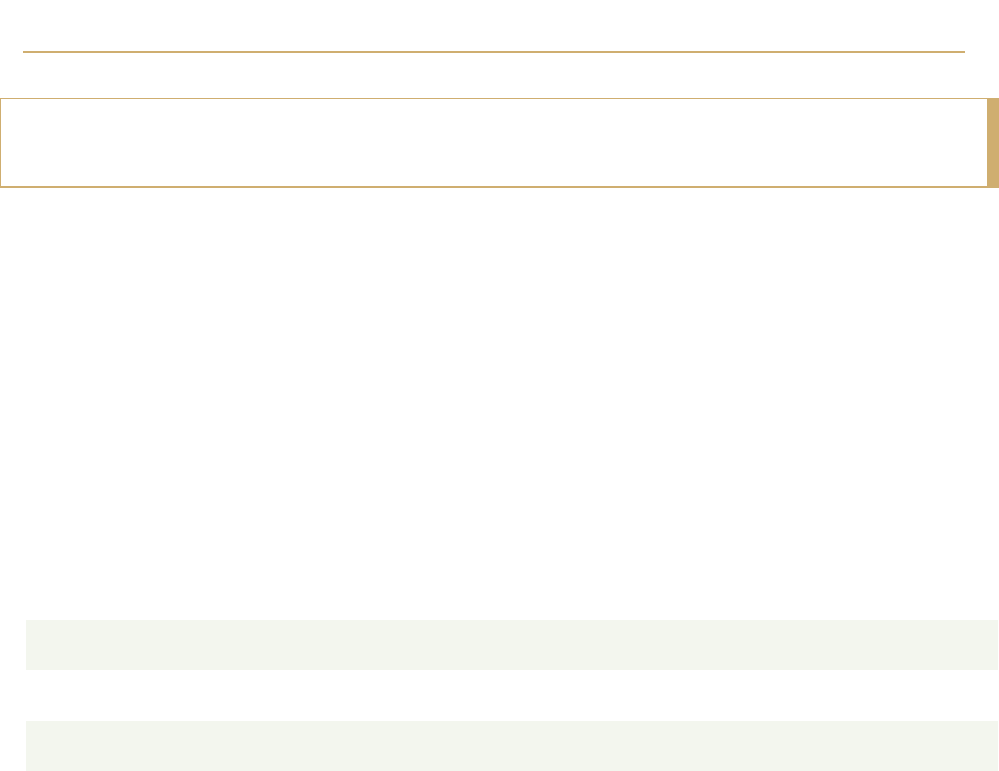
Vanderbilt University Resources
CAMPUS SECURITY
Vanderbilt University Public Safety
http://publicsafety.vanderbilt.edu/
https://www.vanderbilt.edu/families/safety-and-emergency-preparedness/
Vanderbilt University Public Safety (VUPS), 615.322.2745, is a professional law enforcement
agency dedicated to the protection and security of Vanderbilt University and its diverse
community. VUPS provides several services and programs to members of the Vanderbilt
Community.
Information on available program and services, along with crime statistics, is available
at https://publicsafety.vanderbilt.edu/.
Emergency Number
911 or 615.421.1911
Lost and Found
615.343.5371
Non-Emergency
615.322.2745 (2-2745 from campus extension)
Walking Escorts
615.322.2745
AlertVU
AlertVU delivers emergency messages to students, via Vanderbilt email accounts and other user
selected delivery points, in the event an imminent threat, such as a tornado or an active
aggressor, is possible in the Vanderbilt community. Keep your contact information up to date in
YES (Your Enrollment Services) to receive AlertVU notifications.
More details about AlertVU are provided at this link: alertvu.vanderbilt.edu. Detailed instructions
on how to update information in YES is provided here. https://alertvu.vanderbilt.edu/NEW_
Student_Instructions_URO_edits.pdf
Emergency Phones
Emergency telephones (Blue Light Phones) are located throughout the University campus,
Medical Center, and One Hundred Oaks.
Each phone has an emergency button that when pressed automatically dials the VUPS Dispatch
Center. An open line on any emergency phone will activate a priority response from an officer.
An officer will be sent to check on the user of the phone, even if nothing is communicated to the
dispatcher. Cooperation is essential to help us maintain the integrity of the emergency phone
system. These phones should be used only for actual or perceived emergency situations.
50
VUSN MSN, POST-MASTER’S CERTIFICATE, and DNP Student Handbook 2023-2024

An emerge
ncy response can also be received by dialing 911 from any campus phone. Cell
phone users can use 615.421.1911 to summon an emergency response on campus. Cell phone
users should dial 911 for off campus emergencies. All callers should be prepared to state their
location.
Operation ID
VUPS provides additional services including property registration (for bikes, laptops, etc.), lost
and found, weapons safekeeping, and submit a Crime Tip. Additional information on security
measures and crime statistics for Vanderbilt is available from the VUPS, 111 28
th
Avenue South,
Nashville, TN 37212.
VandySafe
VandySafe ( https://police.vanderbilt.edu/services/vandysafe.php ) is a free mobile safety
application for iOS and Android smartphones. The app allows users to connect directly from
their cell phones to the Vanderbilt University Public Safety via voice call, SMS text, or iReport. In
the event of an emergency situation, you can hit the GET HELP button, which will give you the
options to call VUPS, text VUPS, or call 911. When you select to either call or text VUPS,
Communications Officers will be able to see your GPS location when enabled on your phone.
These options allow VUPS to provide quick and professional service to its community even
when the user is unable to give their location.
VandySafe also allows you to request a safety escort from VUPS, view information about Vandy
Vans, assign a contact to monitor your safety at your request, view VUPS emergency guides,
and make an iReport. Use iReport to submit crime tips and report crimes, including text, photos,
and/or videos. You can even send VUPS information anonymously.
Walking Escort Service
Vanderbilt University Police Safety provides walking escorts to students, faculty, and staff
walking to and from any locations on campus during the nighttime hours. The telephone
number to call for a walking escort is 615.322.2745.
CENTER FOR SPIRITUAL AND RELIGIOUS LIFE
The Center for Spiritual and Religious Life functions in educational, spiritual, religious, and
ceremonial capacities, providing individual spiritual/ pastoral counseling, a bereavement
support group, weekly religious services, spiritual study, interfaith dialogue, programs that are
religious/spiritual and interdisciplinary, and venues for meditation, prayer, and reflection. For a
complete listing of campus religious groups, resources, services, and programming
opportunities, visit www.vanderbilt.edu/religiouslife.
CENTER FOR STUDENT WELLBEING
The Center for Student Wellbeing helps students thrive within the Vanderbilt community. There
are multiple resources and services available to students that support personal development,
academic success, and lifelong wellbeing practices that use a holistic framework. More
information can be found on their website at: (https://www.vanderbilt.edu/healthydores/).
51
VUSN MSN, POST-MASTER’S CERTIFICATE, and DNP Student Handbook 2023-2024
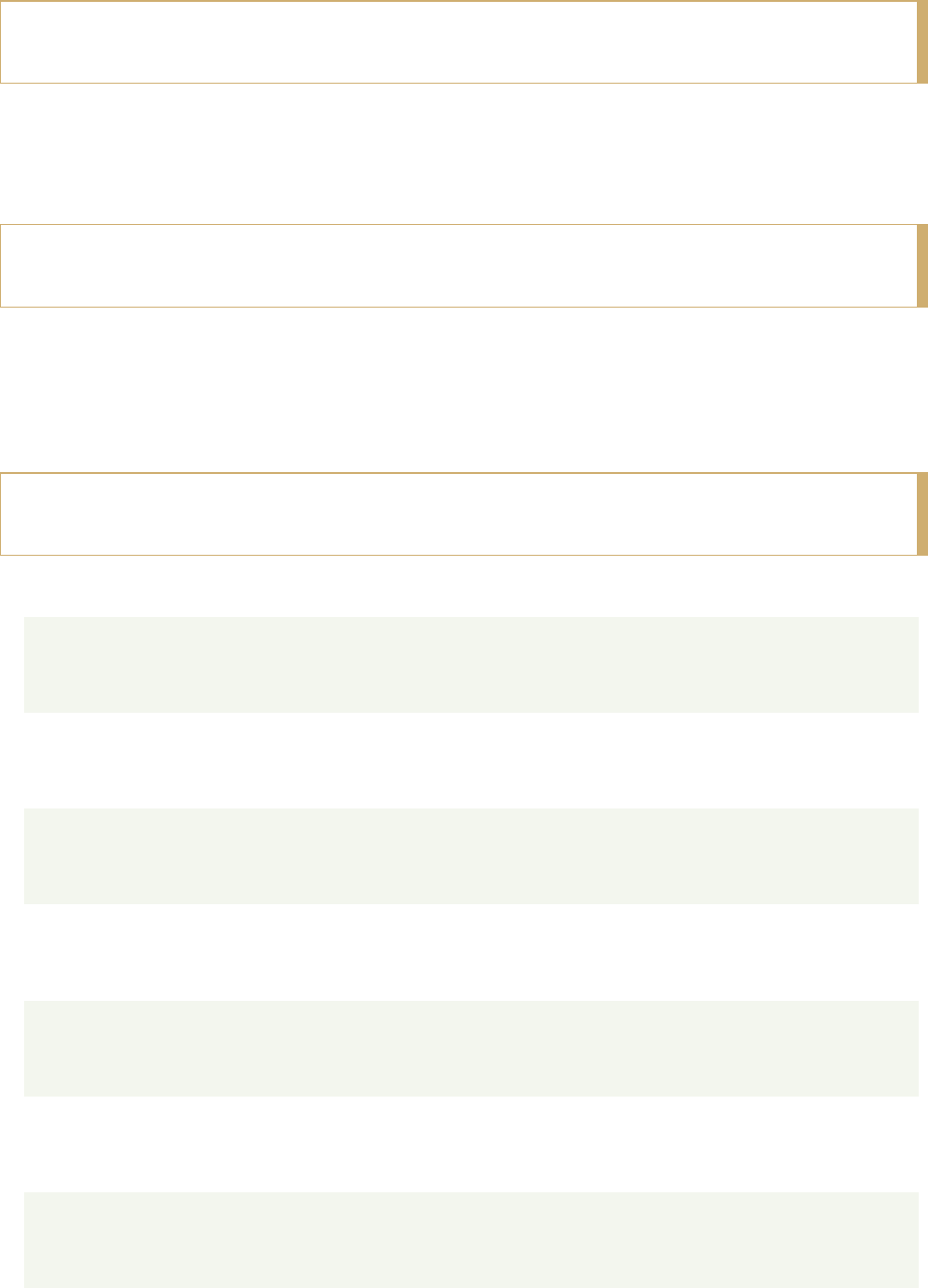
DISABILITY, DISCRIMINATION, AND GRIEVANCES
If at any time a student feels they have been discriminated against due to their disability, they
should contact Title IX and Student Discrimination (https://www.vanderbilt.edu/title-ix/). If a
student needs to file a grievance with Student Access (SA), they can complete the process
listed on the SA home page (https://www.vanderbilt.edu/student-access/).
EQUITY, DIVERSITY, AND INCLUSION OFFICE
The Office for Equity, Diversity, and Inclusion is responsible for advocating for institutional
change, working with university stakeholders to set goals and institutionalize accountability, and
ensuring that equity, diversity, and inclusion efforts are coordinated throughout the university.
For more information, visit https://www.vanderbilt.edu/equity-diversity-
inclusion/ or https://nursing.vanderbilt.edu/about/diversity/.
LIBRARIES
Library
Location
Phone
Biomedical
Eskind Biomedical Library
2209 Garland Avenue
Nashville, TN 37232-8340
615.936.1410
Arts & Sciences
Central Library
419 21st Avenue South
Nashville, TN 37203-2427
615.322.2800
Divinity
Divinity Library
419 21st Avenue South
Nashville, TN 37203-2427
615.322.2865
Education
Peabody Library
230 Appleton PIace
Nashville, TN 37203
615.322.8098
Law
Alyne Queener Massey Law Library
131 21st Avenue South
Nashville, TN 37203
615.322.2568
Management
Walker Management Library
401 21st Avenue South
Nashville, TN 37203
615.322.2970
Music
Anne Potter Wilson Music Library
2400 Blakemore Avenue
Nashville, TN 37212
615.322.7695
52
VUSN MSN, POST-MASTER’S CERTIFICATE, and DNP Student Handbook 2023-2024
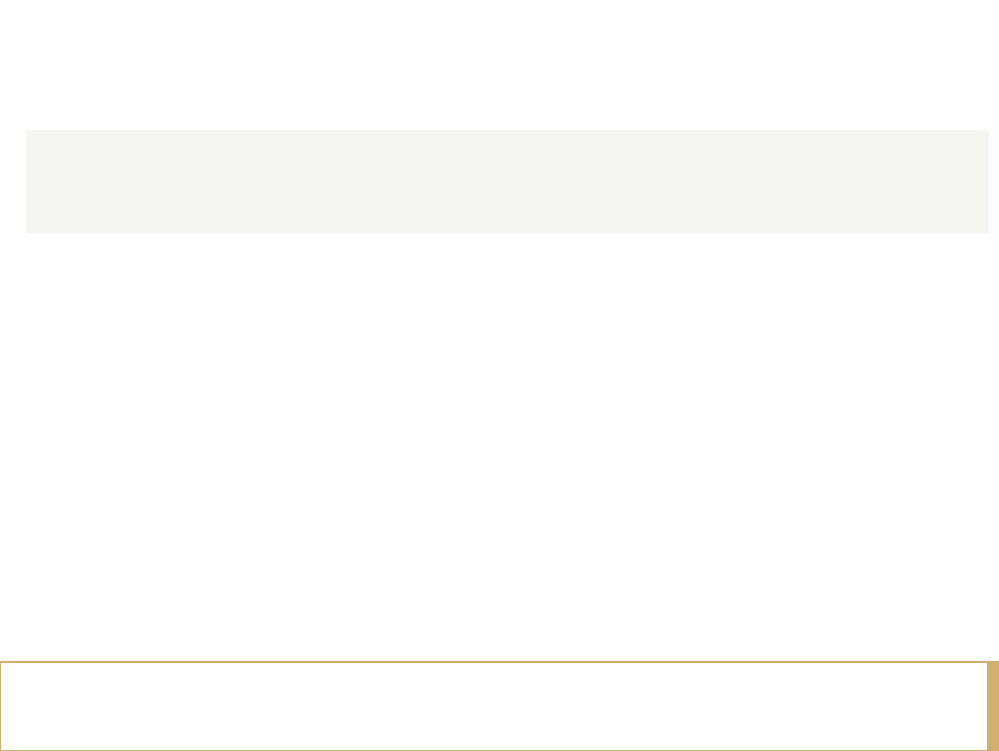
Science &
Engineering
Sarah Shannon Stevenson Science &
Engineering Library
419 21st Avenue South
Nashville, TN 37203-2427
615.322.2775
Special Collections
and University
Archives
419 21st Avenue South
Nashville, TN 3720
615.322.2807
The Annette and Irwin Eskind Family Biomedical Library and Learning Center supports the
education, research, and patient care mission of Vanderbilt University and the Vanderbilt
University Medical Center. The library is open 7 days a week, with a current VU badge required
during restricted hours. For more information, visit www.library.vanderbilt.edu/biomedical
/about/. Other nearby libraries for study space are the Science & Engineering Library, and the
Central Library. For more information, visit www.library.vanderbilt.edu.
The holdings of the Jean and Alexander Heard Libraries system of nine libraries are represented
in the electronic catalog accessible from the library web pages. There you will find a host of
electronic databases and e-journals available across all of the disciplines of the university, with
many specialized medical and scientific resources. Searches may be done within the libraries or
from any computer (on or off campus) with internet access. Licensed databases can be
accessed from off-campus via the University’s proxy server. Interlibrary loan makes it possible
to obtain materials not owned or licensed locally.
NEWS, PUBLICATIONS, AND MEDIA
Detailed information about the various publications, websites, and videos produced by
Vanderbilt University Division of Communications can be found at the Communications and
Marketing website. (https://www.vanderbilt.edu/communications/media.php)
Vanderbilt University School of Nursing publishes the following magazine and newsletter.
Vanderbilt Nurse Magazine
This bi-annual magazine is published by the Vanderbilt University School of Nursing in
cooperation with the Office of Alumni Publications. Its purpose is to inform alumni, students,
parents, faculty, and friends of the institution about programs, activities, and issues of interest.
The most recent copy can be found at https://nursing.vanderbilt.edu/news/vanderbilt-nurse-
magazine/.
The VUSN Newsletter
The Office of Student Affairs prepares a weekly electronic newsletter that offers a listing of
VUSN events, lectures, scholarships, job opportunities, and general items of interest for our
nursing students.
53
VUSN MSN, POST-MASTER’S CERTIFICATE, and DNP Student Handbook 2023-2024

ORIGAMI RISK - VUSN INCIDENT REPORTING
The Origami reporting system is used to report any risk, professional liability or safety
occurrence, observed by or involving a Vanderbilt University School of Nursing student, staff, or
faculty member. Any type of incident may be reported including but not limited to risk
management issues such as clinical related occurrences, student injury or near miss when in a
clinical setting, bullying, incivility, and discrimination. There are other VUSN and VU resources
available to resolve concerns related to programs of study and courses. Additional resources
are listed in the VUSN Student Handbook section entitled VUSN: Academic Policies.
All reports entered into Origami Risk will be reviewed within a 48-hour period by VU risk
management personnel and certain reports will trigger notification to additional departments,
for example, Student Access Services, Equal Opportunity and Access, or Title IX. An aggregate
report of VUSN incidents will be provided to Dean Pamela Jeffries.
It is important that all students, staff, and faculty feel safe reporting any incident they desire
without fearing retribution. It is the goal of the University to encourage reporting to best respond
to perceived and actual risk occurrences. The VU Risk Management Office is available by
at https://www.vanderbilt.edu/riskmanagement/PhoneList.php.
To Enter the Origami Risk System
• Go to https://www.vanderbilt.edu/riskmanagement/ and click on “Report a University
Occurrence” on the right Quick Links.
• The system does not require sign in.
• Any anonymous report may limit the ability for follow up if additional information is
needed.
To Complete a VUSN Incident
• From the Welcome Page, select “Submit a New VU Incident.” The first incident page will
ask a series of questions designed to direct you to the appropriate type of report.
• If reporting an adverse occurrence or outcome in a clinical setting (patient), if there was an
injury, select yes “Are you reporting an injury or illness…” and follow the prompts for
selecting Employee or Non-Employee.
• If the reporter (student) experienced an injury or exposure in a clinical setting, select “yes”
for injury. Faculty and Staff of VU will report work related injury (worker’s compensation)
by selecting the checkbox “yes” for VU employee injury.
• On the Injury Incident Detail page, under “Specific Incident Type”, there is an option to
select “VUSN Incident". And in the injury type, multiple options including
– Maternal/Childbirth (where applicable).
• If reporting an incident involving no bodily injury risk, select “No” and then select "YES" for
“Did something else happen”. This will show the “other” incident type and then select the
box.
•
Please enter a complete description of the event. This helps the Risk Management team assess
and respond.
54
VUSN MSN, POST-MASTER’S CERTIFICATE, and DNP Student Handbook 2023-2024

PARKING, VEHICLE REGISTRATION, AND ALTERNATIVE
TRANSPORTATION
Parking space on campus is limited. All motor vehicles operated on campus at any time by
students, faculty, or staff must be registered with VUPS Parking Services located at 111 28th
Avenue South in the 2800 Building. Registration can be completed online and a fee is charged.
Parking regulations are published annually and are strictly enforced. Bicycles should be
registered with Vanderbilt University Police Department. More information is available
at www.vanderbilt.edu/parking.
All graduate and professional students can ride to and from the Vanderbilt campus free of
charge on Nashville’s Metropolitan Transit Authority buses or commuter train. To use this
service, a valid student ID card is required for boarding the bus or train. For more details go
to https://www.vanderbilt.edu/movevu/transportation-options/.
PROJECT SAFE
Project Safe partners with students, faculty, and staff to create a campus culture that rejects
sexual violence and serves as a resource for all members of the Vanderbilt community. Part of
the Office of the Dean of Students, Project Safe provides support to survivors of sexual
harassment and intimate partner violence and engages the campus community in bystander
intervention efforts and sexual misconduct prevention.
Project Safe offers bystander intervention training, an online prevention education module, and
a variety of programs and presentations on consent, healthy relationships, sexual harassment
and assault, dating/domestic violence, and stalking prevention. A 24-hour support hotline
answered by Project Safe’s victim resource specialists is available at 615.322.SAFE (7233).
Project Safe staff are available at the Project Safe Center in the Cumberland House on West
Side Row, Monday through Friday, 8:00 a.m. to 5:00 p.m. For more information, please call
615.322.SAFE (7233) or visit www.vanderbilt.edu/projectsafe.
SARRATT STUDENT CENTER
The Sarratt Student Center offers a wide variety of activities for students. Programs include
exhibits in the Sarratt Gallery, films in the Sarratt Cinema, art studios, the Overcup Oak
restaurant and pub, and conference and meeting rooms available by reservation.
Hours of Operation:
Monday – Friday: 7am-9pm
Weekends: 8am-9pm
Students have 24/7 card access during all other hours. (Hours subject to change during the
summer and academic breaks.)
55
VUSN MSN, POST-MASTER’S CERTIFICATE, and DNP Student Handbook 2023-2024

The Sarratt S
tudent Center sponsors many other events and activities throughout the year that
enrich the cultural life of the University. The student-run Vanderbilt Programming Board offers
various activities. The Sarratt Box Office, located on the first floor of Sarratt Student Center,
sells tickets for most campus events and is a Ticketmaster outlet. Ticketmaster Box Office
hours are 10:00 a.m. to 7:00 p.m. Monday – Saturday (hours are limited during breaks and the
summer) and payment methods include cash, Commodore Card, Visa, and MasterCard. Tickets
to most Vanderbilt events are significantly discounted for undergraduate and graduate
students. Call the Sarratt Box Office at 615.343.3361 for information regarding upcoming
events. For more information, go to https://www.vanderbilt.edu/studentcenters/explore/virtual-
tour/.
STUDENT ACCESS SERVICES
Vanderbilt University strives to provide an accessible environment for all students; however,
some barriers may arise for students with disabilities. If students anticipate needing a
reasonable accommodation, they should visit Student Access (SA) (https://www.vanderbilt.
edu/student-access/) and create an online profile via the Commodore Access Portal. Please
note, only students who have accepted their admittance to Vanderbilt are able to request
through the portal. On average, the process takes 5-10 business days; the process will be
delayed if the student provides insufficient information. Detailed information regarding the
process and information needed is below. Students may also visit the SA webpage (https:
//www.vanderbilt.edu/student-access/) or email us at stu[email protected]. We are
located at 2301 Vanderbilt Place, Sarratt Building, suite 216, and open 8:00 am – 5:00 pm
Monday – Friday.
Reasonable Accommodation Request Process
To request reasonable accommodations, students should submit their request via the
Commodore Access Portal on the SA webpage (https://www.vanderbilt.edu/student-access/).
The portal will guide the student in completing the connection form (demographic information,
accommodation request(s), and previous accommodation history) and request supporting
documentation, if necessary. An access specialist will then review the connection form and
documentation. Once reviewed, the access specialist will follow-up with the student to either
request more information or request an orientation meeting. The orientation meeting usually
lasts an hour and introduces the student to the SA team and reviews student responsibilities
and procedures. During the meeting, the access specialist will also show the student how to
request an accommodation letter through the Commodore Access Portal. The letter will be sent
electronically to the instructors of the students’ choosing. The student must log in and send the
letters each semester.
Reasonable accommodation arrangements are not retroactive. For example, if a student
chooses not to submit their accommodation letter to the instructor, and then later changes their
mind, the accommodation will not be implemented until the letter has been sent to, and
discussed with, the instructor.
Accommodations
Student Access provides a wide range of reasonable accommodations to students with
disabilities at Vanderbilt University. Accommodations are determined on an individual, case-by-
case basis. Examples of accommodations include, but are not limited to, extra time on exams,
technology for note-taking, priority registration, and alternate format class materials. In addition
56
VUSN MSN, POST-MASTER’S CERTIFICATE, and DNP Student Handbook 2023-2024

to acade
mic accommodations, Student Access also provides housing, dining, and
transportation accommodations.
Documentation Guidelines
Student Access provides reasonable accommodations based on the functional limitations a
student experiences due to their disability and the barriers presented in the educational
environment. Documentation varies based on diagnosis, medical professional, and disability
type. Student Access requests that documentation submitted contain diagnostic information
(such as date of original and most recent diagnosis, severity, and treatment, if appropriate) and
the functional limitations, or how this diagnosis affects the student in a specific environment.
Reasonable accommodations are determined individually, and on a case-by-case basis.
Documentation should adequately verify the nature and extent of the disability in accordance
with current professional standards and techniques. If the nexus is not made between the
accommodation and the limitation, SA will request additional documentation from the student.
All documentation should be on letterhead and signed by the diagnosing professional.
Note: An Individual Education Plan (IEP) or 504 Plan from high school may show a history of
accommodations; however, it does not typically provide the needed information such as
diagnosis and functional limitations.
Admissions Information
All applicants go through the same admission review process and are admitted based on the
quality of their academic record. As there is no separate admission process for applicants with
disabilities, students with disabilities are competitively admitted to Vanderbilt University every
year.
Federal law prohibits making preadmissions inquiry about disabilities. If a student believes,
however, that some aspect of their academic record was affected by their disability, they may
choose to share that with the Admissions Office. Information regarding disabilities, voluntarily
given or inadvertently received, will not adversely affect any admission decision.
Temporary Support Services
Vanderbilt students who experience impairments that will temporarily restrict them on campus
(broken bone, concussion, adjustment disorders, etc.), can contact Student Access (https:
//www.vanderbilt.edu/student-access/). Depending on the nature of the impairment, the
student may be referred to their dean or may be asked to provide verifying documentation (if the
disability is not easily visible).
STUDENT CARE COORDINATION (SCC)
Student Care Coordination is committed to supporting undergraduate, graduate, and
professional students in successfully navigating life events related to academic stress and/or
medical, mental health, and/or other personal concerns that may interfere with a student’s
ability to achieve their academic and personal goals. This team of Care Coordinators is the
central and first point of contact for students to help identify needs and determine the most
appropriate resources in Vanderbilt’s Student Care Network and in the Nashville community to
address concerns. Student Care Coordinators work collaboratively with students to develop a
student success plan, share education about and facilitate connections to appropriate on and
off-campus resources, and provide accountability through supportive follow-up meetings. Our
57
VUSN MSN, POST-MASTER’S CERTIFICATE, and DNP Student Handbook 2023-2024

goal is for
students to have the right support, in the right place, at the right time. In addition,
Student Care Coordination coordinates support for students returning from medical leaves of
absence. Though staff typically have a background in mental health services, it is important to
understand that work with a Student Care Coordinator is not counseling or therapy.
Many students face challenges during their educational experiences and each situation is
unique. Student Care Coordination is the first step to determine where to go for the most
appropriate support for your needs. Students are encouraged to visit www.vanderbilt.
edu/carecoordination to complete an initial assessment and schedule an appointment to meet
with a Student Care Coordinator. Students may also call 615.343.WELL (9355) or drop in to see
a Student Care Coordinator, Monday-Friday 8 a.m. to 5 p.m. Student Care Coordination is
located in Rand Hall, suite 305, and can be reached via email at studentcar[email protected] .
STUDENT CARE NETWORK
The Student Care Network is the holistic network of services and resources available to
Vanderbilt University students pertaining to health and wellness. As an online resource portal,
the Student Care Network website allows students to identify and access the services that best
meet their needs. Resources are included for undergraduate, graduate, and professional
students, as well as postdoctoral fellows. In addition to housing health and wellness resources,
the website also contains detailed information about student health insurance and campus
health and wellness initiatives. The Student Care Network is available to students to support
their wellbeing and their care. www.vanderbilt.edu/studentcarenetwork.
STUDENT HEALTH SERVICES
The Student Health Center provides primary care services for students and is staffed by
physicians, nurse practitioners, nurses, and lab technicians. The Student Health Center provides
services similar to those provided in a private physician’s office or HMO, including routine
medical care, specialty care (e.g. nutrition and sports medicine), and some routine lab tests.
Most of the services students receive at the Student Health Center are pre-paid, but those
services that are not are the responsibility of students to coordinate with their health insurance.
The Student Health Center is open Monday through Friday from 8:00 a.m. to 4:30 p.m. Students
can schedule an appointment by calling 615.322.2427 or go online to www.vumc.org/student-
health/online-appointments. Students with urgent problems will be seen on a same-day basis.
They will be given an appointment that day, or “worked in” on a first-come, first-served basis if
no appointments are available.
Emergency consultations services (615.322.2427) are available 24-hours a day, 7 days a week
from on-call professionals. For more detailed information on the services available at the
Student Health Center and information on other health related topics, please visit the Student
Health Center web site at https://www.vumc.org/student-health/welcome.
58
VUSN MSN, POST-MASTER’S CERTIFICATE, and DNP Student Handbook 2023-2024

TITLE IX AND SEXUAL MISCONDUCT
Vanderbilt prohibits all forms of sexual misconduct, including sexual harassment, sexual
assault, interpersonal violence, and stalking. The University will take prompt and effective action
to address all allegations of sexual misconduct and harassment.
Vanderbilt encourages anyone who has witnessed, experienced, or has information about
possible sexual harassment or sexual misconduct to report (https://vanderbilt.guardian
conduct.com/incident-reporting/new) the conduct to the Title IX Office (https://www.
vanderbilt.edu/title-ix/). If in a position to do so, persons may take action to prevent or stop
such actions, including direct intervention when it is safe and reasonable to do so. If involved in
an emergency situation or to report a crime, contact the Vanderbilt University Police Department
(VUPD) at Emergency- 911 or 615.421.1911. VUPD's Non-Emergency number is 615.322.2745.
Vanderbilt's Sexual Misconduct Policy can be found here (https://www.vanderbilt.edu/title-
ix/2023-24_Sexual_Misconduct_Policy.pdf), and its Formal Grievance Protocol can be
found here (https://www.vanderbilt.edu/title-ix/2023-24_Formal_Grievance_Protocol.pdf).
Student Discrimination
Vanderbilt University is committed to encouraging and sustaining a learning and work
community that is free from prohibited discrimination, harassment, and retaliation. In
compliance with federal law, including the provisions of Title VI and Title VII of the Civil Rights
Act of 1964, Title IX of the Education Amendment of 1972, Sections 503 and 504 of the
Rehabilitation Act of 1973, the Americans with Disabilities Act (ADA) of 1990, the ADA
Amendments Act of 2008, Executive Order 11246, the Vietnam Era Veterans Readjustment
Assistance Act of 1974 as amended by the Jobs for Veterans Act, and the Uniformed Services
Employment and Reemployment Rights Act, as amended, and the Genetic Information
Nondiscrimination Act of 2008, Vanderbilt University does not discriminate against individuals
on the basis of their race, sex, sexual orientation, gender identity, religion, color, national or
ethnic origin, age, disability, military service, covered veterans status, or genetic information in
its administration of educational policies, programs, or activities; admissions policies;
scholarship and loan programs; athletic or other University-administered programs; or
employment. In addition, the University does not discriminate against individuals on the basis of
their gender expression.
UNIVERSITY COUNSELING CENTER
As a key component of Vanderbilt’s Student Care Network, the University Counseling Center
(UCC) provides mental health assessment, support, and treatment for all students enrolled at
Vanderbilt, including undergraduate, graduate, and professional students.
Highly skilled and multi-disciplinary teams of professionals offer crisis intervention, substance
abuse counseling, short-term individual counseling, group therapy, biofeedback, ADHD and
learning disorder assessments, and psychiatric assessment and pharmacologic treatment.
Treatment plans are tailored to each individual’s unique background and needs. UCC
professionals support the University’s mission of fostering inclusive excellence through cultural
awareness and competence. In addition to regular hours and evening/weekend crisis response,
59
VUSN MSN, POST-MASTER’S CERTIFICATE, and DNP Student Handbook 2023-2024

the UC
C offers various satellite services (https://www.vanderbilt.edu/ucc/group-therapy-
workshops/) ranging from drop-in consultations to workshops.
• To access UCC services, visit Student Care Coordination’s website
at vanderbilt.edu/carecoordination or call the SCC at 615.343.WELL (9355).
• For immediate crisis support during the day, please call 615.322.2571 or drop in during
crisis care hours (M-F, 10am to 4pm).
• For immediate crisis support after business hours and on weekends, please call
615.322.2571 and press option #2 to speak with an on-call counselor.
VANDERBILT CARD SERVICES
The Commodore Card Office, located at 184 Sarratt Student Center, produces and distributes
student ID cards. There is no charge for a new card – just a replacement. Students may add
funds to their Commodore Card to pay for printing, campus dining, and vending machine goods.
New students will receive an email with instructions on how to submit a photo to be used for
the Commodore Card. The photo will be uploaded to YES in August – so prior to this time you
should not expect to view your photo online. For information regarding photo submission
visit http://www.vanderbilt.edu/cardservices/photo_submit.php.
VANDERBILT UNIVERSITY RESOURCES
Vanderbilt University provides multiple resources for students and this information is located
under the Student Services Enrollment Bulletin: https://www.vanderbilt.edu/enrollment
bulletin/student-services/.
Student Services
Bishop Joseph Johnson Black Cultural Center
Bookstore
Career Advising
Center for Student Wellbeing
Center for Teaching
Child and Family Center
Commencement
Commodore Card
Course and Teaching Evaluations
Dining on Campus
Emergency Preparedness
English Language Center
Equal Opportunity and Access Office
Global Education Office
Graduate Student Council
International Student and Scholar Services
Libraries
Margaret Cuninggim Women’s Center
Office of Active Citizenship and Service
60
VUSN MSN, POST-MASTER’S CERTIFICATE, and DNP Student Handbook 2023-2024
Office of E
quity, Diversity, and Inclusion
Office of LGBTQI Life
Office of Student Leadership Development
Office of the University Chaplain and Religious Life
Office of the University Registrar
Parking and Vehicle Registration
Project Safe Center
Recreation and Wellness Center
Schulman Center for Jewish Life
Social Justice and Identity
Student Access Services Office
Student Employment
Student Health
Title IX Office
Transition Programs
Tutoring Center
University Counseling Center
Vanderbilt University Information Technology
Vanderbilt University Police Department
Writing Studio
61
VUSN MSN, POST-MASTER’S CERTIFICATE, and DNP Student Handbook 2023-2024

VUSN Academic Policies/Regulations
The following academic policies apply to all VUSN students. Academic regulations can be found
in the VUSN Catalog at this link,
https://www.vanderbilt.edu/catalogs/kuali/nursing.php#
/content/60b6677adc4e73001c6709cf.
ATTENDANCE AND ABSENCE POLICY
Students are expected to attend/participate in all courses regardless of program delivery
format. The Brightspace Learning Management System serves as the record of student
participation, attendance, and engagement with course materials in the online course
environment. For face-to-face classes, student participation during in-class academic activities
verifies attendance. Course instructors may set specific policies about attendance and
absences from their courses. The School of Nursing does not distinguish types of absences. An
instructor is under no obligation to accommodate students who are absent or who miss
academic work without prior notification and makeup arrangements.
Accommodation for observance of a religious holiday will be allowed but should be requested
prior to the holiday. Students will be given the appropriate accommodation to complete the
work missed within a reasonable time after their absence. Students are responsible for the
academic consequences of absences from class, laboratory, simulation, or clinical.
A student whose lack of attendance has led to academic jeopardy is subject to the academic
policies of VUSN. For tuition refund purposes, the last day of attendance is determined by
review of the Brightspace Learning Management System for active participation and/or
participation in a face-to-face class.
In the event of illness influencing a student’s ability to participate in class or meet course
requirements, communication with faculty is essential. A student who has been treated at the
Student Health Center for a serious illness or injury may give the Student Health Center
permission to notify the Assistant Dean for Student Affairs. A variety of options may be
indicated including a Medical Leave of Absence.
AUDITING COURSES
Enrolled students may wish to audit courses in the School of Nursing for which they will receive
no credit. A student must register to audit courses. Students auditing courses are subject to the
following conditions:
1. The consent of the instructor must be obtained.
2. The instructor sets the conditions under which a course may be audited. Failure to meet
those conditions is justification for withdrawal of the audit designation.
3. Auditing students can observe and listen during class. Online material is available for
review.
62
VUSN MSN, POST-MASTER’S CERTIFICATE, and DNP Student Handbook 2023-2024

4. Auditin
g students are not allowed to participate in class. This includes, but is not limited
to, asking questions of the professor during or after class about the course, participating
in group discussions (in class or online), or access to tests or other assessment materials.
5. Audits carry no credit and may not be applied toward the completion of an academic
degree.
CHANGE OF COURSE
Change of Clinical Placement Site:
Policy
Clinical sites are chosen for their ability to provide students with clinical experiences consistent
with course requirements and the mission of the school. The Clinical Placement Office works
collaboratively with faculty, academic directors, and students to ensure all students have a
productive clinical experience. Due to regulatory requirements or availability of preceptors,
VUSN may not be able to accommodate specialty-level clinical placements in all areas of the
country. VUSN will secure an appropriate clinical site but cannot guarantee that it will be in the
location preferred by a student.
Some specialty-level clinical courses offer clinical placement sites outside of a 150-mile radius
of the School of Nursing. These sites are referred to as located outside of middle Tennessee
area (or OMTA) and require that students indicate their preferred state. At the time of
application, prospective students indicate whether they are requesting an OMTA or MTA
(middle Tennessee area) clinical placement.
Any change to MTA or OMTA status must be approved by the specialty faculty. Due to the
competition for local placements, it is rare that students are allowed to switch to within the 150-
mile radius (MTA status) if they have been admitted as located outside the Middle Tennessee
area (OMTA status).
Steps
To request a change from MTA to OMTA or vice versa, the student is expected to:
• First discuss the request for a change with the specialty director and clinical faculty.
• If approved, complete a change in status form https://nursing.vanderbilt.edu/students
/current/pdf/status.pdf.
• The student’s clinical placement site is then updated in the student registration system
and the clinical placement system. System changes typically occur within 48-72 hours.
If a student should have questions or concerns related to a clinical placement site, the student
should contact the specialty clinical placement faculty coordinator and specialty director.
Change of Enrollment Status (e.g., Full-time vs Part-time):
A student may change the status of enrollment based on the following conditions.
• The enrollment status requested is available in the student’s plan of study.
• The proposed change must be approved by the applicable Academic Director or Assistant
Dean.
63
VUSN MSN, POST-MASTER’S CERTIFICATE, and DNP Student Handbook 2023-2024
Steps
To
request a change of status, the student is expected to complete the following steps:
• Meet with their faculty adviser and/or Academic Director of Assistant Dean.
• Submit a Change of Status Form to the Academic Director or Assistant
Dean. https://nursing.vanderbilt.edu/students/current/pdf/status.pdf
• If the request is approved, the signed form is forwarded through other administrative
channels for signatures.
• The student’s status is updated by the Office of Enrollment Services.
Change in Program of Studies for NM/FNP MSN Students
Students admitted to the NM/FNP program have an option to complete MSN degree
requirements at the end of December and change their program of study to progress
seamlessly into the FNP Post-Master's certificate.
By November 1, the student must:
1. Contact Kristie Futrell, Director of Financial Services, to investigate how, or if, the aid/loan
package will change.
a. MSN scholarships cannot be used for Post-Master's study.
b. Federal loans can be applied to Post-Master's study.
2. Notify NM and FNP Specialty Directors of the intent to take this option.
3. Two forms must be completed:
a. Complete the Change of Specialty Form to drop FNP and complete the MSN in
December and complete the FNP program as a Postmaster Certificate Form
at https://nursing.vanderbilt.edu/students/current/pdf/status.pdf.
b. Complete the Quick Admit Form. Contact the VUSN registrar
at sara.a.donahoe@vanderbilt.edu to obtain this form.
4. Register for spring classes by November 30th.
5. Implications for Commencement, Investiture & Pinning Ceremonies
a. Pinning - Student completing the MSN in NM and continuing in FNP in a PMC program
of study:
i. Will be invited to attend the December Pinning with other December MSN
graduates.
ii. Will be invited to attend May Pinning ceremony to receive the FNP Postmaster
Certificate.
iii. May defer attending pinning until May and receive both the pin and certificate
concurrently.
b. Investiture and Commencement ceremonies: MSN graduates are listed in the official
Commencement program within the specialty completed. Completion of a specialty in
the Postmaster's Certificate program, in this case FNP, will not be listed in the
Commencement program.
Change of Specialty (MSN/PMC)
Students are admitted to specific specialties in the MSN and PMC programs. Requests for a
change in specialty are evaluated on a case-by-case basis, and a change in specialty is not
guaranteed.
64
VUSN MSN, POST-MASTER’S CERTIFICATE, and DNP Student Handbook 2023-2024
Steps
1. No
requests are considered until at least one semester of coursework is completed, and
final grades have been received.
2. A student interested in requesting a change in specialty should contact the Assistant
University Registrar, room 173, School of Nursing, 461 21
st
Ave South, Nashville, TN
37240 for the required form.
3. After February 1, the student notifies the current specialty director that a change is
requested and schedules an appointment to discuss the reasons for requesting a change.
The student must obtain the current academic director’s signature and retain a copy of
the form to be used in step 4.
4. By March 1, schedule an appointment with the appropriate academic director to discuss
career goals and obtain a signature confirming the discussion.
5. By March 1, submit signed form & documents listed below to the Assistant University
Registrar, room 173, School of Nursing, 461 21
st
Ave South, Nashville, TN 37240.
Required Documents
• Revised statement of purpose for the newly requested specialty.
• If applicable, indicate preference for clinical. If so, give city/state of the desired distance
clinical site.
• If no full-time space is available, indicate your willingness to change to part-time status or
take a leave of absence.
• Submit an updated letter of reference from a VUSN clinical instructor in an area closely
related to the requested specialty. Either a narrative letter or recommendation form
provided by the Assistant University Registrar is acceptable.
• Submit all the documents in one packet.
• Every effort will be made to notify students by April 1 regarding whether the requested
change has been approved.
Dual Specialty Students
• A meeting and signatures of both academic directors are required to add or drop one of
the specialties or to change from a single specialty to a dual specialty.
Dropping a Course
Policy
• The first five class days of the semester are allocated for necessary changes of courses.
• Courses may be dropped without entry in the final record within the student change period.
• Dropping a course may affect the sequencing of the program of study and may change the
student’s expected date of completion of the course work.
• Discussion with the academic dean or director is recommended prior to dropping a
course.
65
VUSN MSN, POST-MASTER’S CERTIFICATE, and DNP Student Handbook 2023-2024

Withdra
wing from a Course:
Policy Overview
• After the five day drop period, students may withdraw from a course and receive the grade
W (withdrawal) prior to completing half of the course and consistent with the date
published in the School of Nursing Calendar.
• Grade regulations for withdrawal from courses taken at Vanderbilt University but outside
the School of Nursing, will be determined by the applicable school.
• Discussion with the academic dean or director is recommended prior to withdrawing from
a course.
Student Withdrawal from the School of Nursing
A student may voluntarily withdraw from VUSN after completing the Student Withdrawal from
the University Form (https://nursing.vanderbilt.edu/students/current/forms.php). Once a
student withdraws, the student is not permitted to attend classes or use school services.
Course withdrawal policies may apply. A student may withdraw and receive the grade W
(Withdrawal) in accordance with the date published in the School of Nursing calendar. A student
may withdraw from Vanderbilt University after the published date in the School of Nursing
calendar or after the courses are half completed. However, the student will receive a grade of F
(Failing) in all enrolled courses except in extenuating circumstances. If the student withdraws,
they may be considered for readmission by completing the application process. If the student
withdraws after courses are completed (with final grades pending or posted) the Student
Admission and Academic Affairs Progression (SAAP) committee will still review the completed
semester and applicable academic action will apply.
CORE TECHNICAL AND PERFORMANCE STANDARDS
VUSN fosters an environment of inclusivity, diversity, equity, and access. Core standards are not
intended to deter those for whom a reasonable accommodation will support program
completion. All applicants and enrolled students are evaluated using the same criteria and
standards. Essential eligibility requirements for participation and completion by students in the
nursing program include the following core intellectual, physical, and emotional capabilities:
1. Intellectual Skills: Cognitive abilities to learn effectively, think critically, assess, analyze
and synthesize complex information, solve problems, and attain clinical and academic
judgment.
2. Interpersonal Skills: Interpersonal abilities sufficient to appropriately interact and
collaborate with individuals, families, and groups from a variety of social, emotional,
cultural, and intellectual backgrounds.
3. Communication: Verbal, non-verbal, and written abilities sufficient for effective, accurate,
and clear communication in English, and remote technology formats.
4. Motor skills: Gross motor, fine motor, and functional physical abilities sufficient to
provide therapeutic nursing interventions that are safe and effective and that maintain
safety and security standards.
5. Sensory Skills: Auditory, visual, olfactory, and tactile abilities sufficient to monitor, assess,
and respond to health needs.
66
VUSN MSN, POST-MASTER’S CERTIFICATE, and DNP Student Handbook 2023-2024

6. Judgme
nt: Mental and behavioral abilities to demonstrate good judgment in decision-
making to maintain safety and security of patients and to behave professionally, maturely,
and sensitively with patients, staff, students, supervisors, and faculty.
7. Affective: Emotional stability with the capacity for adaptability and accountability in
changing environments.
While technological compensation can be made for some limitations in certain areas, all
students enrolled in the MN, MSN, DNP degrees, or post-master’s certificate program must
satisfactorily demonstrate these capabilities and achievement of competencies in a reasonably
independent manner as determined by faculty across the didactic, laboratory, seminar, and
clinical practice courses throughout their program of study. Reliance on intermediaries is not
allowed. Concerns about core technical and performance standards should be directed to the
Assistant Dean for Student Affairs or the Senior Associate Dean for Academics.
To promote student and patient safety, students are required to inform the Office for Student
Affairs if there are changes in health status that may affect the student's ability to
demonstrate these competencies (with or without a reasonable accommodation based on
disability). If a student experiences a change in health status, a medical clearance may be
required as determined on a case-by-case basis, along with reconsideration of core
intellectual, physical, and emotional capabilities.
CREDIT HOURS TO CLOCK HOURS RATIO
Applied Science Laboratory. Student activity within a group under faculty supervision in a
special room with special equipment for the purpose of gaining new skills (one credit hour for
two hours’ activity per week—1:2).
Clinical Conference. Individual or group interaction with a faculty member about specific clinical
experiences which is part of clinical experience or practicum (no separate credit).
Clinical Experience. Student practice supervised by faculty in an approved clinical agency or
simulated patient care setting in conjunction with didactic course content (one credit hour for
five hours’ activity per week—1:5).
Clinical Independent Study. Indirect supervision of a student in specialized clinical practice
which is not part of a regular course (one credit hour for five hours’ activity per week—1:5).
Didactic. Instruction primarily by faculty presentation offered in any format including face-to-
face and online (one-hour credit for one hour’s activity per week—1:1). VUSN documents these
activities through the class schedule or syllabus assuring that students are meeting the
minimum credit-hour requirement.
Non-Clinical Independent Study. Indirect supervision of a student’s reading, writing, or research
which is not part of a regular course (credit varies according to type of activity).
Advanced Practice Practicum. A separate clinical course in which knowledge, theories and
concepts of nursing, and other disciplines are applied to the patient/client. When the student is
in the clinical area, supervision may be by a faculty approved preceptor. The faculty will meet
with the student at regular intervals to review their clinical progression. The amount of
67
VUSN MSN, POST-MASTER’S CERTIFICATE, and DNP Student Handbook 2023-2024
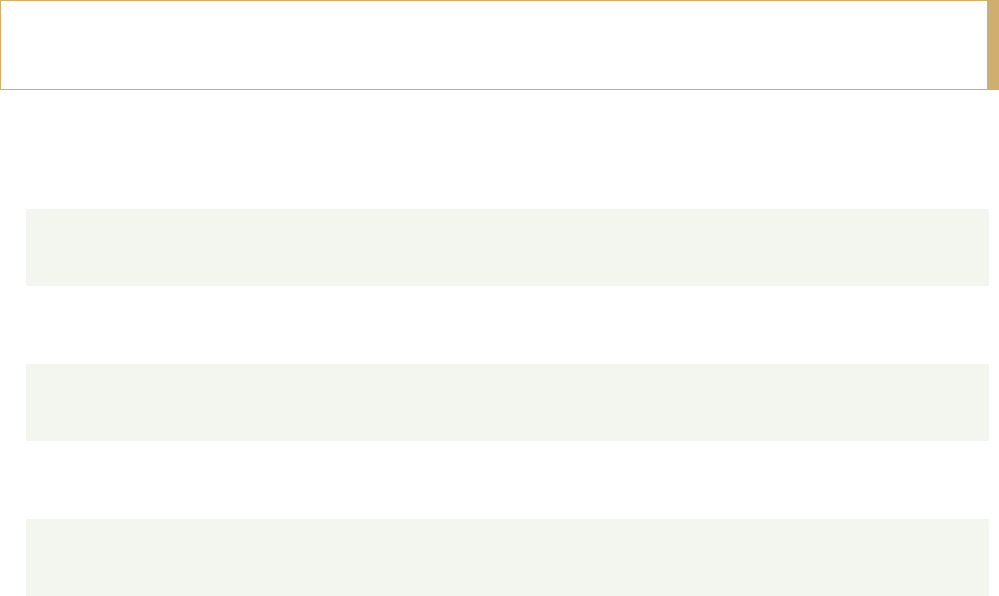
supervi
sion will vary depending upon the clinical setting and the level of learning. The faculty
member is responsible for assessing student learning and progress toward meeting the clinical
objectives (one credit hour for five hours’ activity per week—1:5).
DNP Practice Hours. Practice hours are designed to demonstrate synthesis of expanded
knowledge acquired within the DNP curriculum. For doctoral level courses, one credit hour
reflects nine hours of activity per week – 1:9. Practice hours are not substantiated by the
students’ expertise in the health-care system demonstrated prior to the DNP program nor by
time spent working on classroom assignments. The practice hours signify the capability of the
student to meet The Essentials: Core Competencies For Professional Nursing Education,
Advanced Level (AACN, 2021). A minimum of 500 practice hours are required to demonstrate
achievement of advanced level competencies. Students may complete practice hours at their
site of employment as an advanced practice nurse, health system leader, or nurse informaticist.
Students enrolled in advanced practice specialty clinical experiences (PMC, BSN to DNP) fulfill
clinical requirements at one credit hour for five hours’ activity per week—1:5.
Preceptorship. A separate clinical course which provides an opportunity for the student to
assume the advanced practice role in a relatively independent experience. The preceptor will
assist the student in implementing the specific objectives and learning experiences and will
review the student’s progress with the faculty member responsible for evaluation in the course.
The faculty member will assign a final grade based upon achievement of the competencies and
course objectives, input from preceptor, and student self-evaluation (one-hour credit for five
hours’ activity per week—1:5).
Seminar. A small group of students engaged in original problem solving under the guidance of a
faculty member who interacts with them on a regular basis for reports, discussion, and planning
(one credit hour for two hours’ activity per week—1:2).
GRADING SYSTEM
All work is graded by letters, interpreted as follows:
Letter Grade
Numerical Equivalent
Quality Points
A+
97-100
4
A
93-96
4
A-
90-92
3.7
B+
87-89
3.3
B
83-86
3
68
VUSN MSN, POST-MASTER’S CERTIFICATE, and DNP Student Handbook 2023-2024
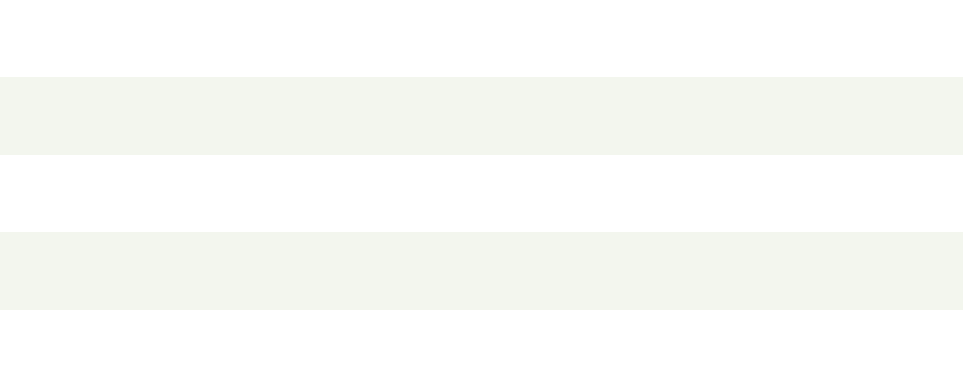
B-
80-82
2.7
C+
77-79
2.3
C
73-76
2
C-
70-72
1.7
F
69 or below
0
All letter grades are counted in the computation of grade point averages, including courses
taken outside of the required plan of study. F grades are counted in the computation of grade
point average unless the same course is repeated at Vanderbilt University and completed with a
passing grade. The F grade is maintained on the transcript, but only the most current grade is
calculated in the GPA.
Academic Standing:
All enrolled students are required to maintain good academic standing. Good academic
standing is defined as all of the following:
• a semester GPA of 3.0 or higher;
• a cumulative GPA of 3.0 or higher;
• all grades B- or higher; and
• all grades Satisfactory.
Academic standing may also be altered by failure to maintain up-to-date documentation of
student enrollment requirements (e.g., license, health requirements) or by unlawful conduct
during enrollment.
Please note that students who receive federal student financial aid may be required to meet
different or additional requirements of “satisfactory academic progress” for financial aid
purposes. For more information, please see https://www.vanderbilt.edu/enrollment
bulletin/financial-information/satisfactory-academic- progress-standards/.
Certification in Post-Master's DNP Program
D
NP students who are APRNs must be certified in their APRN specialty prior to enrolling in the
DNP project course series. Nursing Healthcare Leadership and Nursing Informatics specialties
do not require certification.
C
linical Course Grades
• Clinical performance must be at the passing or satisfactory level regardless of grades
e
arned on other course assignments within the same clinical course. If a clinical
69
VUSN MSN, POST-MASTER’S CERTIFICATE, and DNP Student Handbook 2023-2024
*This section was amended on February 27, 2024, to add information regarding Pass/Fail Courses.
*Clinical courses and independent study courses taken as Pass/Fail will
not be calculated in the grade point average.
performa
nce is evaluated as failing or unsatisfactory, the overall course grade will be
failing regardless of other course assignment grades.
• A student who has not satisfactorily completed a clinical course for a period of more than
two semesters must successfully complete a one-credit hour clinical independent study to
ensure clinical competence and readiness before being permitted re-entry into the direct-
care clinical environment.
• The requirement for the one-credit hour clinical independent study does not apply to
students enrolled in non-clinical programs/specialties (e.g. Nursing and Healthcare
Leadership or Nursing Informatics specialties).
Incomplete Course Grade
Temporary Incomplete
An incomplete grade noted as an “I” is a temporary grade for a student who meets the following
criteria:
• Requires more time to complete required course work after a course ends. It is not to be
used for correction of unsatisfactory course performance.
• Demonstrates ongoing and timely communication during the course with the course
coordinator.
• Obtains approval from the course coordinator for an incomplete grade (see steps below).
Petitions for an incomplete course grade must be submitted to the course coordinator
before grades are due for the semester.
• An extension of the incomplete contract may be approved in rare circumstances.
• An incomplete grade in a prerequisite course may result in a change of progression. All
course requirements must be submitted for grading no later than the end of the next
enrolled semester or the grade will automatically be converted to an F. (If a Leave of
Absence is taken in the following semester, the grade of "I" must be removed by the end of
the next enrolled semester.)
Steps
To petition for an incomplete grade, the student must complete the following steps:
1. Submit a petition (written request) that: (a) Presents the unforeseen and/or extenuating
circumstances that have prevented them from completing course work on time to the
course coordinator, and (b) Demonstrates to the course coordinator that a substantial
portion of the course and the course work have been completed and of passing quality.
Whether to grant a request is at the discretion of the course coordinator.
2. If an incomplete grade is approved, confer with the course coordinator to determine an
agreed upon date to complete all course work and submit the Contract for Incomplete
Grade to the Office of Enrollment Services. The form is located
at: http://nursing.vanderbilt.edu/students/current/enrollment/student_forms.php.A student
must submit all course assignments by the contract expiration date or obtain approval for
an extension with the course coordinator. Extensions may be approved in extenuating
circumstances.
3. Once the course is completed, the course coordinator calculates the final grade and
completes the electronic Change of Grade to replace the “I” with the final course grade.
Permanent Incomplete
70
VUSN MSN, POST-MASTER’S CERTIFICATE, and DNP Student Handbook 2023-2024
A Perman
ent Incomplete (PI) grade may be assigned at the school's discretion. The
circumstances that allow for a PI are if the student:
• withdraws from the university,
• withdraws from their current degree program (or specialty) and the course is not required
in the new program (or specialty), or
• is dismissed from the program and the temporary incomplete course grade contract is still
active.
Incomplete Grade in Clinical Courses
A student receiving a grade of an I in a clinical course must register for zero hours of NURS
5999 Clinical Continuation if the student is not enrolled in any other courses. Tuition is charged
at a rate of $200. Additional university fees may apply.
Pass/Fail or Satisfactory/Unsatisfactory Grades:
The grades Pass/Fail and Satisfactory/Unsatisfactory are not counted toward grade point
averages. They are considered in academic performance and progression. A "Fail" or
"Unsatisfactory" grade is considered the same as a grade less than a B- for the purposes of
academic policies.
Repeat Coursework
Students must earn a B– or higher or Satisfactory/Pass grade in all required courses (including
elective courses required within a program of study). If a grade of less than a B- or a grade of
Unsatisfactory/Fail is earned, the course must be repeated.
• Only one nursing course may be repeated one time. A student may only register for the
same course twice. If the course is not successfully completed after the second
registration, a third registration is not permitted (and the student is subject to dismissal
from the program). Course withdrawals count in the number of times a student may
register for a course.
• Only the most recent grade counts in calculation of the grade point average.
• If a grade less than a B- is earned in a required elective course and another (different)
elective course is taken to replace a required elective, the grade of the initial elective will
continue to average in the GPA.
• A course taken at VUSN may not be repeated outside VUSN for credit toward the degree.
• Due to the sequential nature of nursing courses, repeating a course may necessitate
dropping to a part-time program of study.
• Courses taken for a letter grade may not be repeated on a pass/fail basis, nor may a grade
indicating withdrawal or incomplete work be counted in place of a letter grade.
• Students may not repeat a course for credit if already successfully completed during the
current academic program.
Late Submissions:
Course assignments must be turned in by the date specified by the syllabus or instructor. The
grade for work not done in compliance with this policy is a zero unless an extension has been
granted in advance. Commonly five points per day will be deducted for work submitted after the
71
VUSN MSN, POST-MASTER’S CERTIFICATE, and DNP Student Handbook 2023-2024

assigne
d due date, but the deduction depends on the assignment, course syllabus, and decision
between the faculty and student.
The student must present a petition for a course assignment extension to the course
coordinator or instructor at least one day before the work is due, and the petition must be
endorsed by the instructor. The course coordinator or instructor will deny or approve the
request. If approved, the course coordinator/instructor and student negotiate a revised due
date.
Probation/Dismissal:
The academic performance of students is reviewed by the MSN and DNP Student Admission
and Academic Affairs (SAAA) committees at the end of each semester. Academic performance
of students in the Master of Nursing (MN) or a Postmaster’s Certificate (PMC) specialty will be
reviewed by the MSN SAAA committee. Academic performance of students completing a BSN
to DNP, or a PMC during a DNP program of study, will be reviewed by the DNP SAAA committee.
The committee, on the recommendation of the student’s instructors, academic director, and/or
academic adviser, promotes only those students who have demonstrated personal,
professional, and intellectual achievement consistent with faculty expectations at the student’s
particular stage of professional development. If a student is deficient in a major area, the
committee will review the student’s total program performance.
Students will be placed on probation if:
• A semester GPA is under 3.0.
• For DNP students only: a grade of Unsatisfactory or a grade less than a B- is earned,
regardless of the semester or cumulative GPA.
Additional guidelines:
• For MN, MSN, and PMC students: if a grade of Unsatisfactory, Fail, or a grade less than a
B- is earned, but at least a 3.0 semester and cumulative GPA is maintained, the course
must be repeated (refer to good academic standing policy) but the requirement to repeat
the course will not result in probation.
• A student may be placed on probation only once during the entire program of study.
Students will be dismissed if:
• Previously placed on probation and the student’s record warrants another probation. A
student may be placed on probation only once during their entire program of study.
• A second course grade (such as a repeat course or a second course) is an Unsatisfactory,
Fail, or less than a B-.
• Unsatisfactory progress toward the degree is being made and improvement is judged
unlikely.
When a student is placed on probation or dismissed, letters are sent to the student, the
student’s adviser, and the academic dean or director. If a student cannot improve their grade
point average to at least a 3.0 the following semester because the needed course cannot be
repeated in the following semester, the student will be continued on probation until the course is
repeated.
72
VUSN MSN, POST-MASTER’S CERTIFICATE, and DNP Student Handbook 2023-2024

Time Limi
t for Completion of Program
Degree requirements must be satisfied within a specified time regardless of full- or part-time
status and including leaves of absence. Please see the VUSN Catalog https://www.vanderbilt
.edu/catalogs/kuali/nursing.php#/content/60b6677adc4e73001c6709cf for details.
REGULATIONS: APPEAL PROCESS FOR MN, MSN, OR DNP SAAP
COMMITTEE PROBATION / DISMISSAL DECISIONS
Grounds for Appeal:
Any VUSN student who has been subject to academic action (i.e., probation or dismissal) by the
Student Admissions and Academic Progression (SAAP) Committee may petition for a review of
the determination based on at least one of the following grounds:
• The academic action was not applied according to the published academic policies.
• There was insufficient information to support the determination of the SAAP Committee.
• New information that was not reasonably available for the initial presentation to the SAAP
Committee has been made available, and the introduction of which may affect the
Committee’s determination.
Steps for Submission of an Appeal:
1. A petition for appeal, written and signed by the petitioner, must be submitted via an e-mail
to the Senior Associate Dean for Academics. The petition for appeal must be received no
later than 1700 on the tenth (10th) calendar day following the date that the petitioner was
formally notified of the SAAP Committee determination. Written petitions should not
exceed five (5) double-spaced pages with one (1) inch margins and twelve (12) point font.
A maximum of 3 attachments may be included.
The petition for appeal must include all the following:
• A statement of the grounds for appeal.
• A supporting statement of explanation.
• Copies of all evidence, specific to the appeal, the petitioner desires to be reviewed.
2. Upon receipt of the petition, the Senior Associate Dean for Academics will notify the
SAAP Committee Chair of the petition.
3. The Senior Associate Dean for Academics will designate an appellate reviewer who has
served as a past chair or previous member of SAAP and is not currently serving on the
SAAP Committee. The Senior Associate Dean will send the following documents to the
appellate reviewer: a copy of the petition and supporting documents submitted by the
petitioner, relevant portions of the VUSN Catalog and Student Handbook, and the
petitioner’s VUSN academic record.
4. The appellate reviewer’s consideration of the appeal will be conducted in accordance
with the standards of review and must be based only on the petitioner’s written statement
of the grounds for appeal, the petitioner’s supporting explanation, evidence submitted by
the petitioner, the VUSN academic policies, and the petitioner’s academic record at
73
VUSN MSN, POST-MASTER’S CERTIFICATE, and DNP Student Handbook 2023-2024

VUSN. Aca
demic policy changes that were implemented after the SAAP Committee
decision cannot be considered in the appeal. The appellate reviewer will conduct a review
in a timely manner to determine whether the petition sets forth a basis sufficient to
provide the review sought by the petitioner.
5. Following the completion of the review process, the appellate reviewer sends
their written decision to the Senior Associate Dean for Academics.
• If the reviewer determines one of the three grounds for appeal was met, the reviewer
will remand the case back to the SAAP Committee for additional consideration.
• If the reviewer finds insufficient evidence for appeal, the reviewer will affirm the
findings of the SAAP Committee.
6. Upon receiving the response from the appellate reviewer, the Senior Associate Dean for
Academics notifies the petitioner and the SAAP Chair of the appellate reviewer’s decision
and rationale for the decision.
• If the appellate reviewer remands the case back to the SAAP Committee, the SAAP
Chair will present the case to the SAAP Committee for additional review and decision.
The SAAP Chair will provide the Committee’s decision to the Senior Associate Dean
for Academics. The Senior Associate Dean will notify the petitioner of the decision.
• If the appellate reviewer affirms the SAAP Committee decision, no further action is
taken.
7. If the petitioner is unsatisfied with the decision rendered by the appellate reviewer or the
SAAP Committee, the petitioner may initiate an appeal process by submitting a written
and signed petition to the Dean of the School of Nursing using the same ground(s) for
appeal. The petition for appeal must be received no later than 1700 the tenth (10th)
calendar day following the date that the petitioner is formally notified of the
determination of the appellate review or SAAP Committee review (depending on which
decision is being appealed).
Readmission:
• An individual who has previously withdrawn or been dismissed may apply for
readmission after at least one semester post withdrawal or dismissal. The individual
applying for readmission must complete a new online application available
at https://apply.vanderbilt.edu/apply/. An individual reapplying for readmission should
address the reason(s) that they left Vanderbilt and present a plan specifying the changes
that they made in order to ensure academic success.
• The MN, MSN, or DNP Student Admissions and Academic Progression (SAAP)
Committee will consider an application for readmission on presentation of substantial
evidence of a responsible and successful period of work or study post dismissal.
o There is no guarantee that a student will be readmitted. Readmission will depend on
(a) evaluation of the likelihood of the applicant’s successful performance in
succeeding work; (b) the strength of the application; and (c) available program
space.
o If the applicant had an academic performance that led to the withdrawal or dismissal
and is offered re-admission, the individual will be readmitted on academic probation.
74
VUSN MSN, POST-MASTER’S CERTIFICATE, and DNP Student Handbook 2023-2024

o If additional course(s) have been completed since the applicant was last enrolled at
VUSN, the applicant must provide an official transcript of all completed course(s).
Readmitted students must complete a new background check.
Progression Requirements:
• Most required MN, MSN, PMC, and DNP nursing courses are sequential, and a student
who fails to pass such a course cannot progress in the nursing curriculum until the
course has been successfully completed. This means that a student may not be
permitted to take any other coursework until the course has been successfully
completed.
• Students must hold an active Tennessee nursing license or an unencumbered registered
nurse’s license in the state where the student is completing specialty clinical training.
Change in Level
PreSpecialty: To progress from the MSN generalist component to the MSN specialty nursing
component, students who entered with a degree in a field other than nursing must:
• Complete all required courses with grades B– or higher.
• Earn at least a 3.0 cumulative grade point average for the PreSpecialty component of the
MSN (and a 3.0 by the end of the MSN).
• Must pass the NCLEX-RN® exam before taking specialty level clinical courses and no
later than the end of the second semester of the specialty curriculum (whether full- or
part-time).
Specialty students who do not pass the NCLEX-RN® exam by the end of the second semester
of the specialty must take a Leave of Absence (LOA). The student can return after passing the
NCLEX-RN® exam and in accordance with the LOA policy.
COMPLAINT PROCESS
One of the goals of VUSN is to provide an environment that promotes learning and fair
treatment. Situations may arise where a student (or former student) believes they have not been
given fair treatment or has a complaint about the performance, action, or inaction of a member
of the staff or faculty affecting the student during the period of their enrollment.
Faculty and staff members welcome the opportunity to work with a student or former student
who has a concern or complaint.
Complaints addressed under this VUSN Complaint Process may be categorized as being:
1) grade-related; or 2) non-grade related complaints, in each case that are not addressed
through other processes at the University. Students should refer to the University Student
Handbook (https://www.vanderbilt.edu/student_handbook/university-policies-and-
regulations/#complaint-and-grievance-procedures) for a list of decisions and student concerns
that are not addressed under this VUSN Complaint Process because they may be addressed
through other processes at the University.
75
VUSN MSN, POST-MASTER’S CERTIFICATE, and DNP Student Handbook 2023-2024
Early i
dentification and communication often result in timely and effective resolution. School of
Nursing resources, such as the student’s faculty advisor, academic director, Academic
Assistant Deans, Assistant Dean for Student Affairs, Associate Dean for Strategic Enrollment or
Assistant Dean for Equity, Diversity, and Inclusion are available to discuss student concerns or
refer students to the appropriate school or university resource(s). Students may also choose to
report complaints in the Origami reporting system electronically; refer to the "Origami Reporting
System" section in the VUSN Student Handbook (https://nursing.vanderbilt.edu/students
/current/handbook/university_resources.php#origami) for more information.
When a complaint is not addressed through other University processes, students who decide to
proceed with a complaint within VUSN should follow the complaint process described below.
At no point during any process should the student fear any form of retaliation. If a possible
concern related to safety or retaliation arises, the student may submit an oral or written
complaint directly to the Office of the Senior Associate Dean for Academics.
Steps
1. In most cases, students should direct complaints to the person or persons whose
actions or inactions have given rise to the complaint. The complaint may be
communicated verbally or in writing (including via email). Written documents should not
exceed five (5) double-spaced pages with one (1) inch margins and twelve (12) point
font and may include a maximum of three (3) attachments.
2. Timeline for initiating a complaint:
o Grade-related academic complaints must be initiated within 10 calendar days of the
date the grade in question is posted.
o Non-grade related complaints must be submitted no later than 90 days after the
event occurred or 10 calendar days after the last day of semester in which the event
occurred, whichever is later.
3. The person or persons notified of the complaint should make every effort to resolve the
problem fairly and promptly (usually within 30 calendar days) and will issue a written
decision to the student.
4. If the student’s complaint cannot be resolved, the student may request further review of
the complaint through the next appropriate level of academic or administrative
leadership. A graphic representation of academic or administrative leadership
progression within VUSN is depicted in Figures 1 and 2. A request to appeal the
complaint to the next academic or administrative leadership person should be submitted
in writing (email is acceptable) within 10 calendar days of the decision. The request for
review should not exceed five (5) double-spaced pages with one (1) inch margins and
twelve (12) point font and may include attachments (such as the original complaint and
associated documentation). The VUSN administrator will request any relevant
documentation from the previous process. The administrator should make every effort
to resolve the issue fairly and promptly (usually within 30 calendar days) and will issue a
written decision to the student.
5. If the student timely seeks further review, Step 4 may be repeated at each successive
academic or administrative leadership level within VUSN (see Figures 1 and 2). At each
level, the relevant administrator will confirm that the student has exhausted the previous
process steps before reviewing the complaint. If the complaint ultimately is escalated to
the Provost, the decision of the Provost is final except for complaints that are subject to
the University Grievance Procedure https://www.vanderbilt.edu/student_handbook/
university-policies-and-regulations/#complaint-and-grievance-procedures described in
the University Student Handbook (https://www.vanderbilt.edu/student_handbook/).
76
VUSN MSN, POST-MASTER’S CERTIFICATE, and DNP Student Handbook 2023-2024
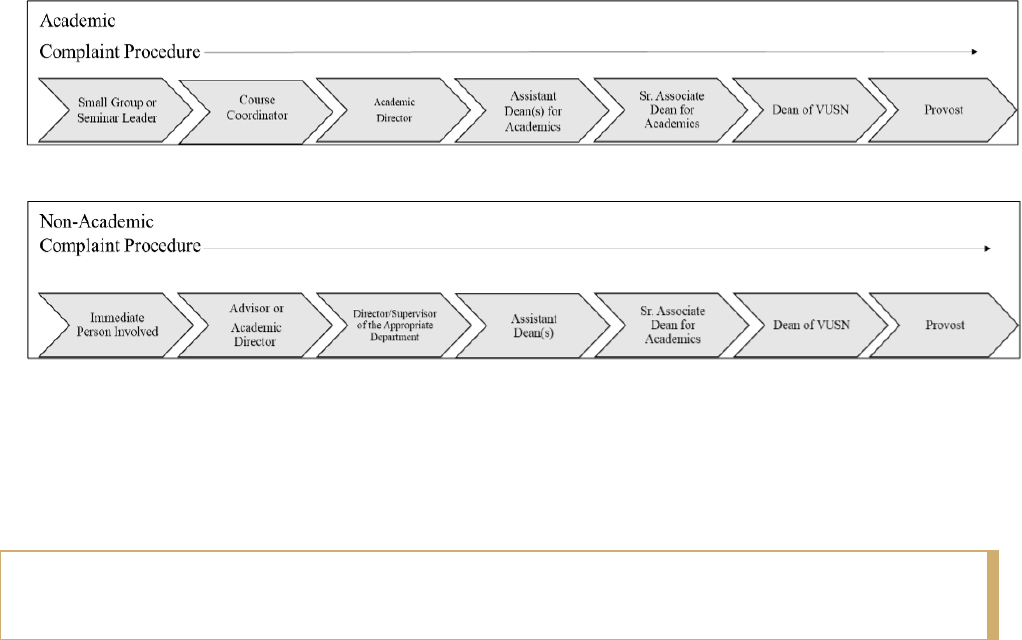
Figure 1.
Grade-Related Academic Complaints
Figure 2. Non-grade Academic Complaint Process
A student or former student who believes that they have not received appropriate redress
through the VUSN Complaint Process may file a grievance with the Office of the Chancellor on
certain grounds set out in the University’s Student Grievance Procedure. Refer to the University
Student Handbook (https://www.vanderbilt.edu/student_handbook/) for details about that
procedure.
LEAVE OF ABSENCE POLICY
A student may request to take a leave of absence (LOA) from their course of study if they have
completed one semester of their program of study and are in good academic standing.
Policy Overview
• A LOA can only be requested after successful completion of one semester of coursework
and the student must be in good academic standing.
• A LOA is granted for a minimum of one semester. The total length of time on leave may
not exceed three semesters during the entire plan of study. Approved LOA semesters can
be sequential or non-sequential.
• A LOA is approved by the Academic Director and the Senior Associate Dean for
Academics.
• Time spent on a LOA is included in the total time taken to complete the degree.
• Students in any VUSN academic program must take a LOA if they are not enrolled in
coursework during a semester. The only exception is during the ASN-MSN curriculum.
(There is no coursework during the summer until specialty courses begin. These summers
do not require a LOA.)
• Students who have not satisfactorily completed a course with a clinical component for
more than two semesters must take a 1-credit-hour clinical independent study when the
student returns from LOA in order to ensure clinical competence. The requirement for the
one-credit hour independent study does not apply to students enrolled in the Nursing and
Healthcare Leadership, Nursing Education, Nursing Informatics specialties or the DNP
Program.
77
VUSN MSN, POST-MASTER’S CERTIFICATE, and DNP Student Handbook 2023-2024

• A student on a LOA is required to notify the VUSN Office of Enrollment Services of plans to
return to school.
• Students who do not comply with the LOA policy may be administratively withdrawn from
Vanderbilt University School of Nursing.
Steps
To request a LOA, a student is expected to complete the following steps:
• Contact the Academic Director and the Director of Student Financial Services to discuss
implications of taking a LOA.
• Submit a Leave of Absence Form to the Academic
Director. https://nursing.vanderbilt.edu/students/current/pdf/leave.pdf
Leave of Absence Re-Entry
To inform VUSN of readiness to return, the following steps must be completed:
• At least sixty days prior to a LOA re-entry, the student contacts the Academic Director to
determine or verify the remaining course-of-study.
• The Academic Director e-mails the student and the Office of Enrollment Services about the
remaining course-of-study.
• The student updates all school compliance requirements with the VUSN Compliance
Officer. https://nursing.vanderbilt.edu/clinicalplacement/currentstudents.php
• The student clears all account holds and registers for classes.
• The student contacts the Director of Financial Services as needed.
MEDICAL LEAVE OF ABSENCE POLICY
Students may experience life situations, or medical, and/or psychological conditions that
significantly interfere with their academic and personal success. A medical leave of absence is
intended to provide students with the opportunity to fully attend to their health and wellbeing,
away from the stress associated with campus and academic life. A student who is temporarily
unable to continue their course-of-study due to a medical reason may request a medical leave
of absence (MLOA) from VUSN.
Steps
In addition to the LOA process, the following steps are required for a MLOA approval:
• Dean of Students MLOA process. https://www.vanderbilt.edu/carecoordination/sample-
page/medical-leave-of-absence/
• The Senior Associate Dean for Academics approves the MLOA request and forwards the
signed form to the student, the Office of Student Care Coordination, and the Academic
Director.
• The Office of Student Care Coordination acknowledges the student’s approval for a MLOA.
78
VUSN MSN, POST-MASTER’S CERTIFICATE, and DNP Student Handbook 2023-2024

Medical Leave of Absence Re-Entry:
In addition to the LOA re-entry, students on a MLOA are expected to complete the steps outlined
at the following VU website: https://www.vanderbilt.edu/carecoordination/sample-
page/medical-leave-of-absence/.
MEETINGS WITH FACULTY AND ADMINISTRATORS
Faculty and administration welcome the opportunity to meet and discuss academic practices
and progress with students. To maintain focus on the student’s academic experience, third
parties such as spouses, partners, parents, family members, friends, or other students typically
will not be allowed to attend. No audio or video recordings of these meetings are allowed.
Students may be permitted to have an academic adviser or the Assistant Dean for Student
Affairs present when the meetings are a part of the University’s Student Accountability process,
the Honor Council process, or under the Sexual Misconduct and Intimate Partner Violence
policy, subject to the parameters and expectations outlined in the applicable policies.
• For questions related to requests for educational records, please refer to the “Student
Records” section of the catalog.
• Any exceptions to policies set out in the VUSN catalog which are related to a medical
condition/disability should be directed to the university’s Student Access Services office
as a request for a reasonable accommodation: https://www.vanderbilt.edu/student-
access/.
TRANSFER OF CREDIT
Policy
A student who seeks transfer credit must submit the request to the Assistant University
Registrar/Director of Nursing Student Records at least six weeks before the course for which
the transfer credit would replace begins. Courses are evaluated for transfer credit only after the
student has been admitted to a degree or certificate program. Transfer credit is granted on a
course-by-course basis, approved for a maximum of six credit hours and considered only for
courses in which the student earned a B- or higher. If VUSN grants transfer credit, only the credit
hour value, and not the grade, will be posted to the student’s Vanderbilt transcript.
Transfer credit is evaluated based on VUSN course equivalent content (for required courses),
credit allotment, and satisfactory completion. The faculty course coordinator and the academic
director of the student’s program approve transfer credit.
Courses completed to satisfy degree requirements in a previous program of study cannot be
used to satisfy degree requirements for the current MN, MSN, PMC, or DNP program.
For transfer credit, the course work must be:
• Completed within the last five years
• Prior to enrollment at VUSN
• At the same academic level (equivalent master’s or equivalent doctoral level), and
79
VUSN MSN, POST-MASTER’S CERTIFICATE, and DNP Student Handbook 2023-2024
• From a regionally accredited institution or from an ACEN- or CCNE-accredited institution
Steps
For transfer credit to be awarded, the following steps must occur:
1. The student e-mails the Assistant University Registrar/Director of Nursing Student
Records all the following:
• Signed and completed petition indicating the information is truthful and
accurate. https://nursing.vanderbilt.edu/students/current/pdf/transfercredit.pdf
• Course syllabus (must include course content) from the semester and year enrolled.
• Official transcript showing the final course grade of a B- or higher.
2. The Office of Enrollment Services will petition the faculty who coordinates the VUSN
equivalent course for the petitioned credit and oversee the remainder of this process.
3. Following review of the evaluation process, the Office of Enrollment Services will e-mail the
student the petition form and add the course credit to the student’s VUSN transcript, if
approved.
80
VUSN MSN, POST-MASTER’S CERTIFICATE, and DNP Student Handbook 2023-2024

Honor Code
STATEMENT OF THE HONOR CODE
“Vanderbilt University students pursue all academic endeavors with integrity. They conduct
themselves honorably, professionally and respectfully in all realms of their studies in order to
promote and secure an atmosphere of dignity and trust. The keystone of our honor system is
self-regulation, which requires cooperation and support from each member of the University
community.”
The Vanderbilt Honor System was instituted in 1875 when the first final examinations were
administered by the University. Dean Madison Sarratt summarized the system as follows, “Let
every individual who contemplates entering Vanderbilt University ask himself/herself/theirself
first this important question: ‘Am I strong enough to give my word of honor and then live up to it
in spite of every temptation that may arise?’”
The purpose of the Honor Code is to preserve and promote academic integrity. Ideally, a
student’s personal integrity is presumed to be sufficient assurance that in academic matters
one does one’s own work without unauthorized help from any other source. The Undergraduate
Honor Council and the Graduate and Professional School Honor Councils are organizations that
seek to preserve the integrity of the Honor Code at Vanderbilt University. Each council aims to
secure justice for any student under suspicion of dishonesty, to vindicate his/her/their name if
innocent and, if guilty, to protect the honor and standing of the remaining students.
The Honor Code is only one of the elements provided to Vanderbilt students to aid in the
development of creative thinking, intellectual maturity, and personal accountability, with respect
for honesty, integrity, and truth. The goal of the Honor System is to have all students leave
Vanderbilt not only as graduates, but also as citizens of integrity.
All nursing students are required to acquaint themselves with the provisions of the Honor Code
through the information in the School of Nursing VUSN Student Handbook. (https://nursing.
vanderbilt.edu/students/current/pdf/handbook.pdf)
Nursing students are subject to the jurisdiction of the Honor Council of the School of Nursing.
Students are responsible for obtaining from their professors an explanation of the freedom they
may exercise in collaboration with other students or in use of outside sources, including:
• The student’s own work prepared and submitted for another course;
• Assignments that permit students to discuss the assignment or to collaborate, including
during group study sessions;
• All limitations placed on take-home examinations, including use of class or outside
materials or discussion with classmates;
• Use of examinations or other materials from previous sections of the class; and
• Use of Internet or other electronic resources, including proper attribution.
In the event that a student does not obtain a clear explanation of the application of the Honor
Code from an instructor in any class, the student must assume that the Honor Council will
81
VUSN MSN, POST-MASTER’S CERTIFICATE, and DNP Student Handbook 2023-2024

follow th
e strictest interpretation of the Honor Code with respect to that class. Ignorance of the
Honor Code is not a valid excuse for violating it.
All VUSN students will be required to electronically acknowledge the information provided
regarding the Honor Code and to electronically sign to affirm personal commitment to honor
academic integrity at VUSN.
Cheating, plagiarizing, or otherwise falsifying results of study is prohibited. Giving and/or
receiving unauthorized aid on an assignment are prohibited by the honor code. This includes
use of texts, papers, computer programs, or other class work prepared by commercial or
noncommercial agents and submitted as a student's own work. Any actions to circumvent or
avoid the remote proctoring system are unauthorized. The Honor Code applies not only to
examinations, but also to all work handed in (including drafts), such as papers, reports,
solutions to problems, tapes, films, recordings, and computer programs. The System also
applies to any act that is fraudulent or intended to mislead the instructor, including falsifying
records of attendance for class, for events for which attendance is required or for which class
credit is given, or for internships or other work service. Work in all courses – including those
that involve, in whole or in part, online learning – is subject to the provisions of the Honor Code.
Nursing students are expected to become familiar with the VUSN Student Handbook (https://
nursing.vanderbilt.edu/students/current/pdf/handbook.pdf), available online prior to the
beginning of fall semester classes, which contains the constitution and bylaws of the Honor
Council. Staff in the Office of Student Accountability, Community Standards, and Academic
Integrity handle all non-academic misconduct issues.
Faculty may issue a personal warning to the student suspected of academic dishonesty;
however, the option of warning the student personally is open to the faculty member only in the
event of a minor suspicion and/or if sufficient evidence of misconduct is not available. The
flagrancy of the violation determines which course of action the faculty member is expected to
follow. Refer to Faculty Manual: https://www.vanderbilt.edu/faculty-manual/part-iii-university-
principles-and-policies/ch9-honor-system/.
HONOR CODE APPLIED TO PREPARATION OF PAPERS
Nursing students should refer to the Undergraduate Student Handbook (https://www.vanderbilt
.edu/student_handbook/the-honor-system/#the-honor-code-applied-to-preparation-of-papers)
for detailed explanation of what constitutes plagiarism and proper citation. Material found on
websites or other Internet sources can–and should be–cited. Students should consult a
citation manual or the course instructor for the appropriate format. For further information
about citation styles, refer to the Jean and Alexander Heard Library’s online guide to
Plagiarism,
Citation, Copyright, and Fair Use. (https://researchguides.library.vanderbilt.edu/c.php?g=68598
&p=444290)
All nursing students are required to provide documentation of satisfactory completion of the
Plagiarism Tutorial as part of new student requirements.
Any student who is uncertain about the application of the plagiarism and citation rules should
consult the instructor. A student who plagiarizes out of ignorance is still guilty of an Honor Code
violation.
82
VUSN MSN, POST-MASTER’S CERTIFICATE, and DNP Student Handbook 2023-2024

HONOR CODE APPLIED TO TESTS, EXAMINATIONS, AND OTHER
EXERCISES
Students are on their honor not to ask for or give information pertaining to any portion of an
examination before or after they have taken it, in such a way as to gain or give an advantage
over other students.
The pledge whether handwritten or acknowledged electronically signifies that the work
submitted is the student’s own and that it has been completed in accordance with the
requirements of the course as specified by the instructor. In addition, each student and faculty
member are expected to establish a clear understanding of the requirements in each course.
Any student uncertain about the application of the pledge to a particular course requirement
should always consult the instructor. Any work handed in for credit, however, is considered
“pledged” unless otherwise stated by the instructor.
THE HONOR CODE APPLICATION TO GROUP WORK
• Students are responsible for any work submitted in their names for the fulfillment of a
course, program, or assignment.
• Students should obtain permission from their instructors before collaborating on any
assignment with a classmate.
• Students should ask their instructors if a tutor or other individual may help with any
assignment.
• All group members are responsible for the data and the content of labs, reports,
assignments, and projects.
• The guidelines for appropriate collaboration and task division pertaining to group work
vary among classes and instructors. It is therefore the student’s responsibility to obtain a
clear understanding of appropriate collaboration from the instructor.
Tips for Success
• Students should read course syllabi and follow all policies, guidelines, or instructions
outlined therein.
• Students should make sure that they are aware of any guidelines or restrictions on specific
class assignments or examinations.
• Students should get any instructions and assignments from the instructor if they miss a
class.
• Students should ask their instructors before collaborating on any assignment with a
classmate.
• Students should ask their instructors if a tutor or other individual may help with any
assignment.
• When unsure whether or not to cite a phrase or fact, students should cite.
83
VUSN MSN, POST-MASTER’S CERTIFICATE, and DNP Student Handbook 2023-2024

• Students should ask their instructors or consult a citation manual to learn how to cite
online sources.
• If an instructor tells students not to use outside sources, students should not - nor should
they take the instruction as an excuse not to cite sources if they are used.
• Students should ask their instructors before sharing lab reports, results, or other data with
classmates or a lab partner.
• Students should ask their instructors before reviewing tests administered for the same
course in a previous semester.
• Students should not turn in an assignment from a previous course without the permission
of both instructors involved.
• Students should not assume that whatever they are doing is permissible. If a student
cannot say with complete certainty that any particular conduct is permissible, they need to
consult the course instructor.
• If permitted by the instructor, students should check over group members’ work before it is
submitted, including labs, data, and other reports.
• Students should keep copies of original data used for group projects and assignments.
• When in doubt, ask the instructor.
RESPONSIBILITY OF THE INDIVIDUAL STUDENT
Without the support and cooperation of the entire student body, the Honor Code will not work.
Students must insist on the absolute integrity of themselves and their fellow students. It is the
obligation of every student who suspects an Honor Code violation to act in one of the following
ways; determining the choice of action by the flagrancy and/or certainty of the violation.
If nursing students have reason to suspect that a breach of the Honor Code has been committed,
they must take one of these actions:
1. Issue a personal warning to the suspected student.
2. Inform the instructor in the course of the suspicions and identify, if possible, the
person(s) suspected.
3. Report the incident to the School of Nursing Honor Council Faculty Adviser.
84
VUSN MSN, POST-MASTER’S CERTIFICATE, and DNP Student Handbook 2023-2024

Honor Council
Honor Council School of Nursing Bylaws
Article I – Name
The name of the Council shall be the Honor Council of the School of Nursing of Vanderbilt
University.
Article II – Purpose
The Council is an organization of students that seeks to preserve the integrity of the Honor
Code at the School of Nursing at Vanderbilt University. The Honor Council aims to secure justice
for any student under suspicion of dishonesty, to vindicate the student’s name if dishonesty is
not proved, and to protect the honor and standing of the remaining students by imposing
penalties as shall be set forth in the bylaws if dishonesty is proved. It proposes to do this in
accordance with the procedures, rules, and organization hereinafter set forth.
Article III – Jurisdiction
Nursing students (MN, MSN, post-master’s certificate, DNP and non-degree seeking students
enrolled in a nursing course) are subject to the jurisdiction of the Honor Council of the School of
Nursing.
Article IV – Membership, Elections, and Vacancies
Membership on the Nursing Honor Council consists of at least four (4) PreSpecialty students,
four (4) Masters level Specialty students, one (1) Masters of Nursing student, and one (1)
Doctor of Nursing Practice program student. The Honor Council shall consist of a minimum of
eighteen (18) members and a maximum of forty (40).
The Honor Council solicits members through a self-nomination process.
All members of the Honor Council shall serve a term of one (1) calendar year beginning
September and ending in August. Honor Council members must be students in good academic
standing as defined in the VUSN Student Handbook (https://nursing.vanderbilt.edu/students
/current/pdf/handbook.pdf) and may be called for duty at any time during their term.
In the event of a membership of less than eighteen (18), another call for self-nominations will be
made.
Article V – Duties of Officers and Members
The Council shall elect the following officers:
1. President
2. Vice President
3. Recording Secretary
85
VUSN MSN, POST-MASTER’S CERTIFICATE, and DNP Student Handbook 2023-2024

The duties of t
he president shall include:
1. Presiding at all meetings of the Council;
2. Consulting with the Honor Council adviser to determine whether to notify Student
Accountability, Community Standards and Academic Integrity (SACSAI) to appoint an
Investigator;
3. Determining (in consultation with the Honor Council adviser) whether a hearing will be
held based on the investigative report;
4. Appointing a member of the Honor Council to serve as presiding officer at the hearing in
the event the president is unable to attend the hearing;
5. Working with the Honor Council adviser(s) to prepare an annual report following guidance
provided by the SACSAI;
6. Performing all duties common to the office.
The duties of the vice president shall include:
1. Serving as the president when the president is unable to perform their duties;
2. Arranging for the hearing of any student accused;
3. Summoning the accused and witnesses in all hearings and all persons coming before the
Council in conjunction with the Honor Council adviser;
4. Notifying members of all hearings and meetings;
5. Performing all duties common to the office.
The duties of the recording secretary shall include:
1. Keeping full minutes of all meetings and hearings and placing them in Honor Council
electronic archive;
2. Swearing in material witnesses during a hearing;
3. Preparing a summary of the proceedings immediately following a hearing. If the recording
secretary is not present at the hearing, a member of the hearing panel will be appointed to
serve in this capacity;
4. Sending Honor Council decision letters. If the recording secretary is not present at the
hearing, a member of the hearing panel will be appointed to serve in this capacity;
5. Keeping a roster of Honor Council members and placing in Honor Council electronic
archive;
6. Updating the Honor Council web page. (
https://nursing.vanderbilt.edu/students/current
/honorcouncil.php)
The duties of all members of the Honor Council shall include:
1. Attending all meetings and hearings as requested;
2. Maintaining confidentiality of all Honor Council matters;
3. At least five (5) members will agree to serve in the role of student advisers. Names of
student advisers will be posted on the Vanderbilt School of Nursing Honor Council
website.
The duties of the student adviser:
Every accused student will have the option to select a student adviser from the Vanderbilt
University School of Nursing Honor Council. A list of all possible student advisers will be on the
Honor Council website (https://nursing.vanderbilt.edu/students/current/honorcouncil.php) .
The student adviser may serve during the investigation and hearing. The accused may also
86
VUSN MSN, POST-MASTER’S CERTIFICATE, and DNP Student Handbook 2023-2024
select a
n adviser from the Vanderbilt University community: faculty, staff, or student. However,
persons related to the accused or who have formal legal training are not eligible to serve as
advisers.
The student adviser may accompany (either in person or remotely) the accused student to
investigative meetings and the hearing. The adviser will refer the accused student to the VUSN
Student Handbook (https://nursing.vanderbilt.edu/students/current/pdf/handbook.pdf) for
procedures of the Honor Council regarding investigations, hearings, and the possible penalties.
In addition, an adviser may confer with the accused during the investigation and a hearing but
may not speak directly with Honor Council members on the panel during the hearing. The
student adviser does not participate in the deliberations and does not vote.
Discretion and Disqualification of Council Members:
1. During the investigation and throughout the entire course of the Honor Council’s
proceedings, Honor Council members may not express an opinion concerning the offense
to witnesses, the accused, or members of the community at large.
2. Honor Council members and investigators may not participate in cases where their
relationship with the accused, the accuser, or a material witness raises a reasonable
inference of prejudice on their part. Examples of such relationships include close
friendship, kinship, organizational affiliation, or evidence of past prejudice.
3. Honor Council members are not allowed to serve as character witnesses in any cases.
Article VI – Meetings
One (1) organization meeting of the Honor Council shall be held within one (1) month after
conclusion of the self-nomination process. The President may call special meetings at any time.
Article VII – Honor Council Adviser
At least one (1) faculty member appointed by the Senior Associate Dean for Academic
Programs will serve as honor council adviser to the Honor Council. The honor council adviser
will attend every hearing. The honor council adviser may ask questions and participate in
discussions but does not have a vote in the outcome. At year-end, the Honor Council officers,
and the honor council adviser may meet to review and discuss the cases that have been
decided that year. The honor council adviser works with the president to prepare an annual
report following guidance provided by SACSAI.
Article VIII – Violations
The Honor Code at Vanderbilt specifically prohibits actions deemed as breaches of the mutual
trust for which the honor system stands. Violations of the Honor Code are cause for disciplinary
actions imposed by the Honor Council.
A suspected violation of the Honor Code must be reported to the Honor Council after the
student or instructor becomes aware of the suspected violation. The suspected violation should
be reported using the SACSAI's online portal. (https://cm.maxient.com/reportingform.php?
VanderbiltUniv&layout_id=5)
Possible violations include but are not limited to the following:
1. Giving and/or receiving unauthorized aid on an assignment, report, paper, exercise such as
simulation, problem, test, examination, tape, film, recordings or computer program
submitted by a student to meet course requirements. Such aid includes the use of
unauthorized aids which may include crib sheets, answer keys, discarded computer
87
VUSN MSN, POST-MASTER’S CERTIFICATE, and DNP Student Handbook 2023-2024
progra
ms, the aid of another person, copying from another student’s work, unauthorized
use of books/notes/outside materials during “closed book” exams,
soliciting/giving/receiving unauthorized aid orally or in writing, or any other similar action
that is contrary to the principles of academic honesty. This includes use of texts, papers,
computer programs, or other class work prepared by commercial or noncommercial
agents and submitted as a student's own work. Any actions to circumvent or avoid the
remote proctoring system are unauthorized.
2. Plagiarism on an assigned paper, theme, report, care plan, clinical documentation, or other
material submitted to meet course requirements. Plagiarism is defined as the act of
incorporating into one’s own work the work of another without indicating that source. A
full description of plagiarism can be found in the Vanderbilt University Student Handbook.
(https://www.vanderbilt.edu/student_handbook/the-honor-system/#the-honor-code-
applied-to-preparation-of-papers)
3. Failure to report a known or suspected violation of the Honor Code in the manner
prescribed in the individual student responsibility section of the Vanderbilt University
Student Handbook. (https://www.vanderbilt.edu/student_handbook/the-honor-
system/#responsibility-of-the-individual-student)
4. Any action designed to deceive a member of the faculty, a staff member, or a fellow
student regarding principles contained in the Honor Code.
5. Submission of work prepared for another course without the specific prior authorization of
the instructors in both courses.
6. Falsification of results of study and/or research.
7. Any falsification of class records or other materials submitted to demonstrate compliance
with course requirements or to obtain class credit, including falsifying records of class or
clinical attendance, attendance at required events or events for which credit is given, or
attendance or hours spent at internships or other work service.
8. Altering a grade on a previously graded examination or test.
Article IX – Hearing
Hearings will be conducted in a manner congruent with the procedures of the Vanderbilt
University School of Nursing Honor Council as published in the Student Handbook.
A suspected violation of the Honor Code must be reported to the Honor Council after the
student or instructor becomes aware of the suspected violation. The president or the Honor
Council adviser will notify the accused of the charges and that an investigation is being
conducted.
A quorum shall exist when six (6) of the representatives on Honor Council attend the hearing
either virtually or in person.
Persons related to the accused or who have formal legal training are not eligible to serve on the
Hearing Panel. A member may also exclude themselves from serving on the Hearing Panel
related to a conflict of interest. The president and/or the Presiding Officer has the ability to
exclude someone from the Hearing Panel if a conflict of interest is identified.
The hearing will be conducted in private, and all members of the Honor Council will be required
to preserve the confidentiality of the proceedings in all cases.
Within forty-eight (48) hours following the conclusion of a hearing, the recording secretary will
inform in writing the decision to the following parties: (a) the accused student, (b) the accuser if
they are a faculty member or administrator, (c) the Dean of the School of Nursing, (d) the Senior
Associate Dean for Academic programs, (e) staff in the Office of University Registrar, (f)
88
VUSN MSN, POST-MASTER’S CERTIFICATE, and DNP Student Handbook 2023-2024
Director
of Student Accountability, Community Standards and Academic Integrity, (g) the
University Registrar, and (h) other relevant University personnel. A copy of the notice must also
be kept in the electronic files of the Honor Council.
Article X – Penalties
If the accused is found guilty, a penalty will be determined by the Honor Council consistent with
the following: the flagrancy of the violation, the degree of premeditation, the truthfulness of the
accused throughout the investigation and the hearing, and any mitigating circumstances that
may enter the case. These three factors are ranked on a scale of low, medium low, medium,
medium high, or high.
The specific penalty chosen is limited to one of the following alternatives:
1. The presumptive penalty for a first offense is failure in the course. A vote of two-thirds of
the members of the Hearing Panel will be required to administer this penalty. A grade of
“F” will be administered automatically to the student’s record. The course may be
repeated; however, course offerings will not be altered.
2. At the discretion of the Hearing Panel, a first offense penalty can be reduced to failure of
the work involved. The work may not be repeated.
3. The minimum penalty for a second offense is failure in the course and suspension for no
less than a semester; furthermore, depending upon the severity of the violation, the penalty
may be suspension for multiple semesters or expulsion.
• Suspension from the School of Nursing graduate program. If the penalty of
suspension is assigned before the end of the seventh week in a 14-week semester,
the suspension goes into effect immediately. If the suspension occurs after the
seventh week of the semester, the suspension will begin at the start of the next
semester. The Council may use its own discretion in setting the dates of the
suspension. The penalty of a multiple semester suspension requires a vote of two-
thirds of the members of the Hearing Panel.
4. In the case of a student convicted of providing false information at an Honor Council
hearing or to an Honor Council investigator in either verbal or written form, that student
may be suspended for up to three semesters from the end of the semester in which he or
she was convicted. A vote of two-thirds of the members of the Hearing Committee is
required to impose this penalty.
5. Expulsion must be approved by a vote of at least five of the six panel members. (Note that
for a third offense, a vote of guilty by five of the six panelists automatically imposes a
penalty of expulsion.)
Article XI – Appeals
Appeals of decisions made by the Honor Council must follow the procedure outlined by
the University Appellate Review Board. (https://www.vanderbilt.edu/student_handbook/student-
conduct/#appeals-and-the-appellate-review-board)
Article XII – Amendments
Amendments to the Honor Council bylaws may be adopted by the approval vote of two-thirds of
the members of the Honor Council.
89
VUSN MSN, POST-MASTER’S CERTIFICATE, and DNP Student Handbook 2023-2024

PROCEDURES OF THE VANDERBILT SCHOOL OF NURSING
HONOR COUNCIL
Proceedings of the Honor Council – investigations, interviews with potential witnesses, and
hearings may be recorded by Vanderbilt University. Recordings not authorized by the Honor
Council adviser, the Honor Council officers hearing a case, the Dean of Students, or the Dean’s
designee are prohibited.
INVESTIGATION
• When an alleged violation of the Honor Code is reported, a member of SACSAI will be
assigned to investigate the incident.
• The assigned investigator will interview the accuser and collect any available information
or documentation related to the alleged violation.
• The accused will be notified via e-mail that a report has been filed, and will be asked to
schedule a meeting. The accused is required to respond to the investigator's inquiries
within seven business days. The Honor Council may send a notice to the Office of the
University Registrar to enter an Incomplete and add a notation to the accused’s academic
record stating "Honor Council Investigation Pending," if the accused is not compliant or if
the investigation or hearing will continue beyond the end of the semester (i.e., becomes a
“holdover case”).
• The accused student will have the option to select a Student Adviser from the Vanderbilt
University School of Nursing Honor Council. A list of all possible student advisers will be
made available on the Honor Council website, and a student adviser may be selected from
it during the investigation. The accused student may also select a student adviser from the
Vanderbilt University community: faculty, staff, or student. However, persons related to the
accused student or who have formal legal training are not eligible to serve as student
advisers and may not participate in the hearing. A Student Adviser may accompany (either
in person or remotely) the accused student to investigative meetings and the hearing and
refer the accused student to the Vanderbilt University School of Nursing Student
Handbook. The Student Handbook contains the procedures of the Honor Council regarding
investigations, hearings, and the penalties that may be assigned. In addition, a student
adviser may confer with the accused student during the investigation and a hearing but
may not speak directly with Honor Council members on the panel during the hearing. The
accused student may separately obtain professional legal representation, advice, and
counsel. However, an attorney may not participate in or be present during an Honor
Council interview or hearing. The Honor Council is a student tribunal untrained in the law.
An attorney representing an accused may work directly with the Office of the General
Counsel.
• The investigator will meet with the accused student in the first meeting to present the
accused with a written Statement of Charges that includes the specific charge(s), a brief
description of the alleged violation, and an explanation of the possible consequences if the
accused student is found guilty of a breach of the Vanderbilt Honor Code. The accused
has the option to wait for a period following the presentation of the Statement of Charges.
The accused student should not be able to review the evidence against the student until
the student is prepared to give a formal statement to the investigator. During the first
90
VUSN MSN, POST-MASTER’S CERTIFICATE, and DNP Student Handbook 2023-2024

meeting
, the accused student will also be informed of the procedures that will be followed.
The accused student may choose not to make any statement at the time of the first
meeting or defer making a statement to an agreed upon time prior to the hearing. The
investigator will ask the accused to sign the Statement of Charges indicating that student
understands the charges, possible penalties if found guilty, the procedures to be followed,
and that the student will or will not move forward with a statement at the first meeting.
Signing the Statement of Charges does not imply or acknowledge guilt.
• During the meeting where the accused student will make a statement, the investigator will
ask the accused student to give an account of the events surrounding the alleged
violation. The accused student may also provide relevant documentation or information to
support the student’s account of events. The accused student will ultimately be asked to
enter a plea of guilty or not guilty prior to the hearing.
• The accused student is required to notify the investigator of any material witness(es)
before the hearing has been scheduled so that the investigator may contact the
witness(es) and prepare a statement for inclusion in the investigative report. No material
witness will be allowed to testify at the hearing unless the witness has previously given a
statement to the investigator. Given the nature of University judicial proceedings (including
the proceedings of University Honor Councils), the testimony of, and information derived
from, experts, such as the reports of handwriting experts, are not admissible and will not
be considered, except in rare circumstances. In those rare cases, determinations as to the
admissibility of testimony of or evidence derived from an expert will be made in the sole
discretion of the Director of Student Accountability, Community Standards and Academic
Integrity. The Honor Council president may appoint a faculty member as an expert witness.
Under no circumstances, however, will the use of polygraph examinations be permitted.
• The investigator will assemble the relevant evidence and testimony in a concise, logical
report. The investigator will provide the investigative report to the president of the Honor
Council, who with the Council Advisor, will determine whether sufficient evidence exists to
warrant a hearing by the Council. If the president determines that a hearing is necessary,
the president will also determine whether the charges will be heard by a full panel or a
small panel.
• At least twenty-four (24) hours before the hearing, the accused student will be presented
with a copy of the investigator’s report via Vanderbilt email so that the student may
comment at the hearing on any corrections or clarifications the accused student feels are
necessary or appropriate.
HEARINGS
If after an investigation the Honor Council president and Honor Council advisor determine that
there is sufficient evidence to warrant a formal hearing, the president will send official
notification to the accused that a hearing will be scheduled. The vice president will arrange any
details necessary for conducting the hearing, including reserving rooms where the witness(es)
and the accused may be placed during the hearing. The vice president will also inform the
members of the hearing panel, accused, and the witness(es) as to the date, place, and time of
the hearing. The hearing should not be held earlier than seventy-two (72) hours after the
investigator has met initially with the accused unless an earlier time is agreed to by the
accused.
Hearings may be conducted with participants gathered in a location on campus, online or in a
hybrid of in person and online participation.
91
VUSN MSN, POST-MASTER’S CERTIFICATE, and DNP Student Handbook 2023-2024

Attendance at the Hearing by the Accused Student
All students, including the accused student, are required to cooperate with investigations and at
hearings conducted by the Honor Council. In the event an accused student refuses to
participate in or cooperate with an Honor Council investigation or hearing, the hearing may take
place without the participation of the accused student. All reasonable efforts will be made to
inform the accused student of the time and place of the hearing and the findings of the
proceeding. In addition, the accused student may inform the Honor Council that the accused
student will not attend the hearing and submit a written statement regarding the charges prior
to the hearing date.
Withdrawal from the University before the Hearing
If an accused student who has been reported for a suspected violation of the Honor Code
withdraws from the University before a hearing has been conducted, the fact will be recorded by
the Honor Council. A letter will be sent-to all parties stating that the student is suspected of an
Honor Code violation, that an investigation has been or will be conducted, and that a hearing
may be held.
The accused may respond in one of three ways: 1) participate in the hearing either in person or
by video conference, 2) waive the right to give testimony personally (thereby acknowledging that
the hearing may proceed in his/her/their absence), or 3) waive the right to appear and send a
written, signed statement to be presented on his/her/their behalf at the hearing. Failure by the
accused to respond will be considered a waiver of the right to appear.
During the time prior to the hearing, a notation will be placed on the academic record of the
accused stating that an Honor Council case is pending. A letter will also be sent to the Office of
the University Registrar, the dean of the school in which the accused was enrolled, and other
relevant University personnel indicating that an Honor Council case is pending. If the accused
attempts to re-enroll before the case is heard, the Registrar will notify the president of the Honor
Council. The case must be resolved before the accused may re-enroll.
A six (6) member-hearing panel (consisting of a presiding officer and five (5) Council members)
will hear the evidence in the case. The Honor Council adviser will also be present and may ask
questions and participate in the discussion, but the Honor Council adviser does not have a vote
in the outcome. For training purposes, faculty or student observers may be allowed to be
present but may not speak or take part in the proceedings.
Order of Events for Hearing
1. Presentation of the investigative report.
a. The investigator is sworn in by the recording secretary (or designee).
b. The investigative report is presented: the interviews with the accuser, the accused
student, and the witnesses are reported briefly and impartially; the material evidence
is presented and explained without opinion.
c. The Honor Council may question the investigator. At no time does the investigator
express an opinion as to whether the accused is guilty or not guilty.
2. Testimony. The accused student(s) (if in attendance) and the accuser(s) are allowed to be
present during the presentation of all testimony. If witnesses are to testify in person, by
written attestation or virtually, they will appear separately and await their appearances
alone. When called, each (except for the character witness) is sworn in by the recording
secretary.
92
VUSN MSN, POST-MASTER’S CERTIFICATE, and DNP Student Handbook 2023-2024

a. Accuser
. If the accuser testifies, the presiding officer will invite a general account of
the events in question. The Honor Council may then direct its questions to the
accuser. The investigator may question the accuser, after the Honor Council has
concluded its questioning, to clarify points that may have been obscured. The
accused may also direct questions to the accuser, after the Honor Council and the
investigator have concluded their questioning. In the case of the accuser’s absence,
the Honor Council will proceed to the testimony of the witness(es).
b. Material Witnesses. First, the presiding officer invites a general account of the
events in question. The Honor Council may then direct its questions to the
witness(es). The investigator may question material witnesses, after the Honor
Council has concluded its questioning, to clarify points that may have been
obscured. The accuser and the accused may also direct questions to the material
witnesses after the Honor Council has concluded their questioning.
c. Accused Student. The presiding officer presents to the accused the charge(s) and
asks if the student is familiar with the charge(s), the evidence, and the possible
penalties if found guilty. The accused student enters a plea of guilty or not guilty. The
presiding officer asks the accused to give an account of the events in question. The
student adviser may confer with the accused during the hearing but may not speak
directly with Honor Council members on the panel during the hearing. After the
student testifies, the Honor Council may then direct its questions to the accused.
The investigator may question the accused, once the Honor Council has concluded
its questioning, to clarify points that may have been obscured. The accuser may
also direct questions to the accused, once the Honor Council and the investigator
have concluded their questioning.
PENALTIES FOR A HONOR CODE VIOLATION
When the Honor Council is satisfied that all pertinent testimony has been received, the accused
student, the student adviser, and the investigator leave the hearing room so that the panel may
deliberate. The panel will proceed to discuss and decide the question of guilt. The proof that a
person is guilty of a charge must satisfy a “preponderance-of-the-evidence” (or more likely-than-
not) standard. A majority of the six (6) members of the panel must vote “guilty” to find the
accused guilty.
1. If the accused is found guilty, the Honor Council determines a fitting penalty based upon:
a. The flagrancy of the violation,
b. Premeditation involved in the offense, and
c. The truthfulness of the accused throughout the investigation and the hearing.
2. These three (3) factors are ranked on a scale of low, medium low, medium, medium high,
or high. The specific penalty chosen is limited to one of the following alternatives:
a. The presumptive penalty for a first offense is failure in the course. A vote of two-
thirds of the members of the Hearing Panel will be required to administer this
penalty. A grade of “F” will be administered automatically to the student’s record.
The course may be repeated; however, course offerings will not be altered.
b. At the discretion of the Hearing Panel, a first offense penalty can be reduced to
failure of the work involved. The work may not be repeated.
93
VUSN MSN, POST-MASTER’S CERTIFICATE, and DNP Student Handbook 2023-2024

c. The mi
nimum penalty for a second offense is failure in the course and suspension
for no less than a semester; furthermore, depending upon the severity of the
violation, the penalty may be suspension for multiple semesters or expulsion.
i. Suspension from the School of Nursing graduate program. If the penalty of
suspension is assigned before the end of the seventh week in a 14-week
semester, the suspension goes into effect immediately. If the suspension
occurs after the seventh week of the semester, the suspension will begin at
the start of the next semester. The Council may use its own discretion in
setting the dates of the suspension. The penalty of a multiple semester
suspension requires a vote of two-thirds of the members of the Hearing
Panel.
d. In the case of a student convicted of providing false information at an Honor
Council hearing or to an Honor Council investigator in either verbal or written form,
that student may be suspended for up to three semesters from the end of the
semester in which he or she was convicted. A vote of two-thirds of the members of
the Hearing Committee is required to impose this penalty.
e. Expulsion must be approved by a vote of at least five of the six panel members.
(Note that for a third offense, a vote of guilty by five of the six panelists
automatically imposes a penalty of expulsion.)
3. The accused student will be notified of the outcome of the hearing the next day following
the hearing. The presiding officer will inform the accused about the right of appeal.
APPEAL PROCESS
Decisions of the Council are subject to appeal through the Appellate Review Board. Requests for
appeal must be submitted by the petitioning student using the online Petition for Appeal (https:
//cm.maxient.com/reportingform.php?VanderbiltUniv&layout_id=12) form by no later than 5pm
on the tenth (10
th
) calendar day following the date that the student is formally notified of the
determination of the Honor Council. Refer to Appellate Review Board. (https://www.vanderbilt.
edu/student_handbook/student-conduct/#appeals-and-the-appellate-review-board)
After the Hearing
• At the conclusion of the hearing, the presiding officer will gather all the material evidence,
investigative reports, notes, and other records of the investigation and hearing and place
them in the VUSN Honor Council’s electronic file.
• If the accused student is found guilty, written notice of the decision is sent to the following
parties: (a) the accused student, (b) the accuser if they are a faculty member or
administrator, (c) the Dean of the School of Nursing, (d) the Senior Associate Dean for
Academic programs, (e) staff in the Office of University Registrar, (f) Director of Student
Accountability, Community Standards and Academic Integrity, and (g) other relevant
University personnel. A copy of the notice must also be kept in the electronic files of the
Honor Council.
• Following a hearing, the recording secretary or another member of the hearing panel will
prepare a summary of the proceedings and place it in the Honor Council files.
• The accused student may file an appeal from a decision with the Appellate Review Board
but must do so within ten days of the date the student is formally notified of the panel’s
decision. Refer to the Appeals Process section for details.
94
VUSN MSN, POST-MASTER’S CERTIFICATE, and DNP Student Handbook 2023-2024
• The Honor Council adviser maintains records of Honor Council proceedings and
investigations in accordance with the University’s document retention policy. Records of
convictions and penalties will not be released outside the University absent a written
release from the convicted student or unless otherwise required by law in accordance with
the Family Education Rights and Privacy Act (FERPA). However, students should be aware
that they may be required to sign such a waiver when applying to graduate or professional
schools or in the course of any employment or governmental background check.
WITHDRAWAL FROM THE UNIVERSITY BEFORE THE HEARING
If a student who has been reported for a suspected violation of the Honor Code withdraws from
the University before a hearing has been conducted, the fact will be recorded by the Honor
Council. A letter will be sent to all parties stating that the student is suspected of an Honor Code
violation, that an investigation has been or will be conducted, and that a hearing may be held.
The accused may respond in one of three ways: participate in the hearing either in person or by
video conference, waive the right to give testimony personally (thereby acknowledging that the
hearing may proceed in his/her/their absence), or waive the right to appear and send a written,
signed statement to be presented on his/her/their behalf at the hearing. Failure by the accused
to respond will be considered a waiver of the right to appear.
During the time prior to the hearing, a notation will be placed on the academic record of the
accused stating that an Honor Council case is pending. A letter will also be sent to the Office of
the University Registrar, the Dean of the School of Nursing, the Senior Associate Dean for
Academics, and other relevant University personnel indicating that an Honor Council case is
pending. If the accused attempts to re-enroll before the case is heard, the Registrar will notify
the president of the Honor Council. The case must be resolved before the accused may re-
enroll.
95
VUSN MSN, POST-MASTER’S CERTIFICATE, and DNP Student Handbook 2023-2024

VUSN: Other Guidelines, Policies, and Procedures
ALCOHOL, CONTROLLED SUBSTANCE, AND SMOKING POLICY
Smoking is not permitted on any School of Nursing property. Students are not allowed to attend
class or clinical practice under the influence of alcohol or controlled substances. Students
suspected of using such substances will be asked to submit to voluntary breath, blood, or urine
screening as a condition of progression. Additional information concerning alcohol and
controlled substances can be found in the University Student
Handbook (https://www.vanderbilt.edu/student_handbook/alcoholic-beverage-and-controlled-
substances-policies/).
ANIMALS
Students are prohibited from keeping or providing for any animals on University property,
including in University residences. Students with disabilities may use service animals and
emotional support animals in accordance with the Americans with Disabilities Act of 1990, as
amended and related laws, rules and regulations, including the Fair Housing Act. Students
seeking approval for service animals or emotional support animals must comply with all
University procedural requirements and animal responsibility standards. Refer to the VU Student
Handbook (https://www.vanderbilt.edu/student_handbook/university-policies-and-
regulations/#assistance-animals) for the policy and other details. Visiting animals must be kept
outdoors and leashed. Students who violate this policy are subject to corrective action through
the University’s accountability process and will bear any associated costs in rooms where
animals are found in violation of this policy.
ARTIFICIAL INTELLIGENCE (AI)
Unless explicitly stated by the course faculty, the use of generative AI will be treated similarly to
assistance from another person. Students must not use generative AI tools to substantially
complete an assignment or exam. In cases where generative AI is used, students must disclose
its use. Course instructors have the discretion to regulate the use of generative AI tools in their
courses, which may include permitting or prohibiting specific uses. Such policies should be
clearly stated in the course syllabus and communicated to students. If there is any uncertainty
regarding the use of generative AI, students are encouraged to ask their instructors for
clarification.
96
VUSN MSN, POST-MASTER’S CERTIFICATE, and DNP Student Handbook 2023-2024

CHILDREN IN THE SCHOOL
Children are restricted from the School of Nursing except in unusual circumstances. Children
should not accompany students to the school unless under exceptional or emergency
circumstances. Any child brought to the school must be supervised at all times, by a parent or
guardian. If a child is disruptive, the responsible parent/guardian will be asked to remove the
child from the building. Children are not permitted in the IMC, skills lab, or computer labs.
Students must obtain permission from the Course Coordinator, appropriate faculty, or class
lecturer prior to bringing children to class.
CODE FOR NURSES
The School of Nursing adheres to the American Nurses Association Code for Nurses. Refer
to https://www.nursingworld.org/practice-policy/nursing-excellence/ethics/code-of-ethics-for-
nurses/ for more details.
If you have any questions regarding appropriate uses and disclosures of patient information,
contact the VUMC Privacy Office at 615.936.3594. Additional information on the HIPAA
regulations can be found at VUMC’s HIPAA Web site: https://www.vumc.org/information-
privacy-security/welcome . Contact the Privacy Office by phone at 615.936.3594 or via email
at privacy.office@vumc.org for any Privacy Office requests or concerns.
CONDUCT POLICY
Although the University values personal freedom, celebration, and recreation, the policies and
regulations that apply to student conduct at Vanderbilt are also informed by principles that
value the health, safety, and well-being of students and other members of the University
community, as well as their academic and personal success. The University’s goal in
establishing policies and holding students accountable for complying with them is to help
students understand how their choices can affect not only their immediate neighbors, but also
the University community as a whole.
Students and student organizations are expected to comply with all University policies, which
are derived from tradition and evolve with contemporary practice. Ignorance of a policy is not a
valid excuse for violating it. Grounds for corrective action cannot always be the subject of
precise statement; however, when commonly held standards of conduct are broken, students
must be held accountable if the University community is to be sustained.
The office of Student Accountability, Community Standards, and Academic Integrity (http:
//www.vanderbilt.edu/studentaccountability/) has original jurisdiction in all cases of
nonacademic misconduct involving undergraduate, graduate, and professional students.
Vanderbilt University School of Nursing students are under the jurisdiction of Vanderbilt
University Student Conduct Policies. Refer to
http://www.vanderbilt.edu/student_
handbook/student-conduct.
97
VUSN MSN, POST-MASTER’S CERTIFICATE, and DNP Student Handbook 2023-2024

COVID-19
For up to date health and safety protocols regarding COVID-19 please visit the Vanderbilt
University Health and Safety Protocols website at https://www.vanderbilt.edu/coronavirus/.
About COVID-19 and Clinical Placement
The overwhelming majority of clinical placement sites require either documentation of a
completed series of COVID-19 vaccinations or (in some cases) an approved exemption before
allowing students to rotate at their facilities. Students are strongly encouraged to have the
COVID-19 vaccine in anticipation of this requirement. VUSN will not assign clinical placement
sites based on an individual student’s preference about COVID-19 vaccination, nor will VUSN
reassign a student to a different site because of a student’s COVID-19 vaccination preference.
VUSN cannot guarantee students will be able to complete clinical rotations unless all agency
requirements are met. You may not begin your clinical rotations until you have met all the site
requirements and have received confirmation from your faculty and the Clinical Placement
Office that you are cleared to start.
DRESS CODE
Classroom Dress Guideline
• In class students may wear comfortable clothes, while the type and fit of clothing reflect
mindfulness and respect of community guest speakers, faculty, and peers.
• The specific classroom dress code is at the discretion of the individual faculty in creating a
professional environment.
• Student IDs will display given first and last names (no nicknames) and no titles.
General Clinical Requirements
• In all clinical settings (for orientation, patient assignments, or clinic visits) students will
wear professional dress (no jeans), closed toe shoes, lab coat with nursing patch sewn on
left shoulder, and identification badge clipped to the lapel or neck and NOT at the
waistline. Students are expected to be well groomed and in neat, clean attire at all times.
PreSpecialty Clinical Experiences
Students will wear black scrubs with nursing patch sewn on left shoulder, black, dark brown, or
white full leather, or non-canvas, full heeled shoes, black or white socks and identification
badge. A plain white or black short sleeved or ¾ length sleeve T-shirt may be worn under the
scrubs.
• Uniforms should be clean and pressed. Lab coats are worn over the uniform to and from
the unit but should not be worn during the clinical experience.
• Long hair must be off the collar.
• Fingernails should be short, clean, and without polish. Acrylic nails are not allowed.
• Only a single plain band ring, watch, and one small pair of stud earrings in the ear lobes
may be worn during client care.
98
VUSN MSN, POST-MASTER’S CERTIFICATE, and DNP Student Handbook 2023-2024

• All visible piercings other than in the earlobes should be removed.
• Minimize visible tattoos. Any tattoos that could be perceived as offensive should be
covered.
• If a student is outside the hospital or off the unit dressed in their uniform, a lab coat should
be worn.
• Uniforms should be worn to and from clinical only.
• If assigned to an institution outside VUMC, follow the dress code for that facility. If
conflicting guidelines are present, contact clinical faculty for direction.
Psych/Mental Health Clinical-Additional Guidelines
• Students will wear professional dress (no jeans), closed toe shoes, lab coat with nursing
patch sewn on left shoulder, and identification badge clipped to the lapel or neck and NOT
at the waistline.
• To ensure safety and comfort of students and patients in the psych clinical setting,
students must NOT wear high heels, open toed shoes, skirts or dresses, low cut shirts,
cropped pants, or scarfs or ties around the neck.
Community Health Clinical-Additional Guidelines
• The type of clothing and requirement of lab coat vary with each clinical site and instructor.
Specialty Clinical
• Requirements for type of clothing and lab coat are dependent on the specialty instructor
and/or course syllabus information and/or clinical site.
• A VU identification badge should be worn in the clinical setting at all times.
EDUCATIONAL RESOURCES AND MATERIALS PROTECTION
As a professional courtesy to the many who contribute expertise and effort to the creation of
educational resources and materials for VUSN courses, please follow this policy regarding the
appropriate use of materials as it relates to the course. Educational resources and materials
include instructional media, lectures, and handouts, some of which may include copyrighted
items.
• Students should ask permission of the course coordinator to record classroom
discussions, lectures, demonstrations, and/or simulations.
• Any recorded instructional media, whether provided by the school or recorded by the
student, and handouts should:
• Be used for educational purposes of the course only.
• Not be shared with students not enrolled in the course.
• Be deleted once the student graduates or otherwise ends the student relationship with
Vanderbilt University School of Nursing.
99
VUSN MSN, POST-MASTER’S CERTIFICATE, and DNP Student Handbook 2023-2024

INCLEMENT WEATHER POLICY
This policy is to provide uniformity for students, faculty, and staff regarding the
cancellation of classes due to inclement weather conditions or other adverse events
impacting normal operations of the School of Nursing.
Key Definitions:
Inclement Weather Event
The existence of hazardous weather conditions that pose a threat to life or property.
Yellow Alert Standby for Inclement Weather Announcement
Standby, prepare for inclement weather.
Orange Alert Inclement Weather Announcement
Inclement weather is in the area and has the potential to disrupt normal medical center
operations. The Emergency Operations Plan is activated and an Emergency Operations Center
(EOC) is opened to handle the event.
Thunderstorm Watch
An advisory issued by the National Weather Service when conditions are favorable for the
development or approach of severe thunderstorms on the Vanderbilt campus.
Thunderstorm Warning
An advisory issued by the National Weather Service when a severe thunderstorm (a storm with
winds in excess of 58 miles per hour or with ¾” or larger hail, or both) is indicated on radar.
Weather Advisory
An advisory is issued by the National Weather Service when hazardous weather is occurring,
imminent, or likely. Advisories are for less serious conditions than warnings that cause
significant inconvenience and if caution is not exercised, could lead to situations that may
threaten life or property.
Weather Warning
A warning is issued by the National Weather Service when a hazardous weather event is
occurring, imminent, or likely. A warning means weather conditions pose a threat to life or
property. People in the path of the storm need to take protective action.
Weather Watch
A watch is used when the risk of hazardous weather has increased significantly, but its
occurrence, location, or timing is still uncertain. It is intended to provide enough lead-time so
those who need to set their plans in motion can do so. A watch means hazardous weather is
possible. People should have a plan of action in case a storm threatens, and they should listen
for later information and possible warnings.
100
VUSN MSN, POST-MASTER’S CERTIFICATE, and DNP Student Handbook 2023-2024

Faculty/Staff Communications: During inclement weather event or other adverse events
impacting normal operations faculty/staff are updated via the following communication modes:
1. Overhead Announcements
2. E-mail system communication
3. E-mails from the Dean/Senior Associate Deans
4. Text alerts through AlertVU at http://emergency.vanderbilt.edu/alertvu/ (You must sign
up to receive alerts.)
Procedure:
Cancellation/Delay of Start Time for a Clinical Rotation:
1. The decision to cancel or delay the start time of a clinical rotation will be made by the
faculty member or preceptor responsible for the clinical.
2. Faculty will communicate with students the status of the clinical (as applicable) in one
of the following manners:
a. Voice mail message left on the faculty member’s phone or
b. Personal phone call to each student by the faculty member
c. Brightspace announcement
Cancellation/Delay of Start Time for Classes:
The decision to cancel or delay the start time for a class will be made by the faculty member
responsible for the class.
Canceled classes/clinicals will be rescheduled at the discretion of the faculty member
responsible for the course.
Student Notification Instructions for Cancellation/Delay of start time for classes:
Brightspace
Faculty will communicate instructions and/or cancellation of classes by:
1. Creating an Announcement posting in Brightspace
2. Sending an e-mail to students through the e-mail function in Brightspace
In the event of inclement weather, students are required to check the Brightspace site of each of
the classes they are enrolled. In the event the Brightspace system is not operational,
instructions regarding the cancellation of classes will be posted by the course instructors
through use of the Vanderbilt University voice-mail system.
NET ETIQUETTE STATEMENT
Net Etiquette describes professional communication and behaviors for online communication
and interaction including but not limited to email, discussion board postings, chats, wikis, and
blogs to ensure a forum for dynamic and engaged learning. The expectations for Net Etiquette
at VUSN may be described across 3 general areas: 1) Respect & Courtesy, 2) Participation &
Collaboration, and 3) Presentation of Self. An inability to uphold Net Etiquette expectations may
101
VUSN MSN, POST-MASTER’S CERTIFICATE, and DNP Student Handbook 2023-2024
have reperc
ussions related to Student Conduct. Refer to the VU Student Conduct Policy located
at https://www.vanderbilt.edu/studentaccountability/.
Respect and Courtesy
Teaching and learning processes work best with free and open exchange of ideas, yet in an
electronic setting, without the benefit of facial expressions, body language, or tonal cues,
miscommunication and misunderstanding may occur. Behaviors that demonstrate respect and
courtesy include:
• Respecting diversity of opinion
• Welcoming dissenting opinions and interpretation without judgmental comments
• Respecting personal privacy and the privacy of others
• Adhering to the academic honesty policy (http://www.vanderbilt.edu/student_hand
book/the-honor-system/)
• Creating and maintaining a culture of civility (http://www.vanderbilt.edu/student_
handbook/)
Participation and Collaboration
Active participation and collaboration in the online educational community enhances learning
outcomes. Behaviors that demonstrate participation and collaboration include:
• Preparing constructive, comprehensive, mindful responses to others
• Clarifying statements as necessary
• Discussing with faculty any discomfort with what someone else has written
• Completing and submitting group work in a timely fashion
• Preparing for discussions by reading all postings or communications before responding
• Sharing helpful information with all classmates
Presentation of Self
Conduct in the online setting is as important as face-to-face interaction. Communication and
social presence of an individual in a course contributes to the perception of their
professionalism and competency by others. Behaviors that result in the best presentation of
self include:
• Authentic, honest, and kind communication
• Use of formal, clear, concise, appropriate language
• Use of proper titles and preferred pronouns to address others unless otherwise directed
• Careful consideration before use of emoticons, humor, sarcasm or jokes, use judiciously
• Composition of written communication, discussion board posts, or other online
assignments offline, before posting
• Re-reading, proof-reading, and editing communications and discussion board postings
before uploading or sending
• Referencing and assigning appropriate credit to others’ work or posts
102
VUSN MSN, POST-MASTER’S CERTIFICATE, and DNP Student Handbook 2023-2024

SOCIAL MEDIA POLICY
Policy
Social media platforms allow VUSN students to engage in professional and personal
conversations. The goal of this policy is to protect both VUSN students as well as the School of
Nursing. The VUSN policy is a set of expected standards of conduct for all VUSN students.
Students are expected to respect themselves and others, to act responsibly, and to be
accountable for their actions. The Vanderbilt University student accountability system
addresses student violations of University policy through fair, consistent, and confidential
procedures. Any policy violation is subject to investigation by Vanderbilt University and may
result in disciplinary action.
Students are personally responsible for the content they publish on blogs, wikis, social
networks, forum boards, or any other form of user-generated media. Remember that content
contributed on all platforms becomes immediately searchable and can be immediately shared.
This content immediately leaves the contributing individual’s control forever and may be traced
back to the individual after long periods of time.
This policy is not intended for internet activities that do not associate or identify a student with
VUSN, do not use Vanderbilt email addresses, and are purely about personal matters.
Definitions
Social Media Platforms – Technology tools and online spaces for integrating and sharing user-
generated content in order to engage constituencies in conversations and allow them to
participate in content and community creation. Examples are Facebook, Twitter, Instagram,
LinkedIn, Tiktok, and YouTube.
Procedure/Specific Information
Because of the constantly evolving nature of social media platforms, these guidelines do not
attempt to name every current and emerging platform. Rather, they apply to those cited and any
other online platform available and emerging including social networking sites and sites with
user-generated content. Examples include but are not limited to the following:
1. YouTube
2. Facebook
3. Instagram
4. LinkedIn
5. Twitter
6. Blogs
7. Google docs or other shared workspace
Guidelines for Online Professional or Personal Activity
These guidelines apply to VUSN students who identify themselves with VUSN and/or use their
Vanderbilt email address in social media venues such as professional society blogs, LinkedIn,
Facebook, etc. for deliberate professional engagement or casual conversation.
103
VUSN MSN, POST-MASTER’S CERTIFICATE, and DNP Student Handbook 2023-2024

1. Follow th
e same nursing ethics, HIPAA, privacy and general civil behavior guidelines
cited in this policy including respecting copyrights and disclosures, and not revealing
proprietary financial, intellectual property, patient care or similar sensitive or private
content inclusive of the posting of client pictures.
a. Protect confidential information. While posting to friends, many of the sites are open
to anyone browsing or searching. Be mindful about what is published. Do not
disclose or use confidential information or that of any other person or agency.
Respect HIPAA regulations. Do not post any information about clinical rotations or
clients in any online forum or web page. A good rule of thumb is to ask if what is
posted on a social media site is okay to be on the front page of tomorrow’s
newspaper, credited to you.
2. If an individual identifies themselves as a VUSN student in any online forum and/or use
their Vanderbilt e-mail address, the student needs to ensure that it is clear that they are
not speaking for VUSN, and what they say is representative of their individual personal
views and opinions and not necessarily the views and opinions of VUSN.
3. VUSN students are mindful about how they present themselves in online networks. By
virtue of self-identifying as part of VUSN in such a network, students connect
themselves to, and reflect upon, VUSN faculty, staff, and even patients and donors.
a. Be mindful about how you present yourself. VUSN students are preparing for a
career providing services to the public. VUSN and future employers hold you to a
high standard of behavior. By identifying yourself as a VUSN student through
postings and personal web pages, you are connected to your colleagues, clinical
agencies, and even clients/patients. Ensure that content associated with you is
consistent with your professional goals. If you identify yourself as a VUSN student,
ensure your profile and related content is consistent with how you wish to present
yourself to colleagues, clients, and potential employers. Remember that all content
contributed on all platforms becomes immediately searchable and can be
immediately shared with everyone. This content immediately leaves the contributing
individual students control forever.
b. Respect others. VUSN is an organization whose students, faculty, staff, and clients
have a diverse set of customs, values, and points of view. Do not be afraid to be
yourself, but respect others. This includes not only the obvious (no ethnic slurs,
personal insults, obscenity, pornographic images, etc.) but also proper consideration
of privacy and of topics that may be considered objectionable or inflammatory –
such as politics and religion. Remember, what may be humorous to some, may be
offensive to others. Civility is an important component of online communication.
4. If someone or some group offers to pay a student for participating in an online forum in
their VUSN student role, offers advertising for pay and/or for endorsement, this could
constitute conflict of interest and VU policies and guidelines apply.
5. If someone from the media or press contacts students about posts made in online
forums that relates to VUSN in any way, students should alert their academic director
and contact the VUSN Director of Communications, Nancy Wise, (at 615.322.3894 or by
6. At the end of each course, students are provided an avenue to evaluate course
materials/faculty. Therefore, social media vehicles are considered inappropriate
locations to provide this feedback.
7. Vanderbilt University has a robust social media handbook. While some of its information
is geared to staff and faculty, the best practices section contains valuable information
that is applicable for all social media
users: https://social.vanderbilt.edu/handbook/best-practices.php.
104
VUSN MSN, POST-MASTER’S CERTIFICATE, and DNP Student Handbook 2023-2024

8. If you ha
ve questions about social media or how to respond to comments on your
account, please contact Nancy Wise, Director of Communications. She can offer insight,
support, and if necessary, connect you with Vanderbilt University’s web experts.
STUDENT RECORDS – FAMILY EDUCATIONAL RIGHTS AND
PRIVACY ACT (FERPA)
Vanderbilt University is committed to the protection and confidentiality of student education
records, adhering closely to the guidelines established by the Family Educational Rights and
Privacy Act.
The Family Educational Rights and Privacy Act (FERPA) is a federal law designed to protect the
privacy of education records, to establish the right of students to inspect and review their
education records, and to provide guidelines for the correction of inaccurate and misleading
data through informal and formal hearings.
Refer to the VU Registrar Office website for details: https://registrar.vanderbilt.edu/ferpa/.
105
VUSN MSN, POST-MASTER’S CERTIFICATE, and DNP Student Handbook 2023-2024

VUSN: Doctor of Nursing Practice (DNP) Program
The Doctor of Nursing Practice program prepares leaders in advanced nursing practice to bring
evidence-based knowledge into the practice arena, improve health care outcomes and
strengthen the leadership role in guiding complex care delivery and nursing education.
Increased complexity in health care, the explosion of knowledge and technology, and national
issues related to patient safety and quality improvement call for fundamental changes in the
education of all health care professionals. Redesigning care processes are indicated, with
information technology systems enhancing evidence-based decision making at both the macro-
and micro-system levels. Addressing the above challenges identified by the National Academy
of Medicine (formally Institute of Medicine [IOM]) and other national organizations, the
American Association of Colleges of Nursing (AACN) published a position paper in 2004
targeting the adoption of the DNP as the terminal degree for advanced nursing practice.
Advanced nursing practice is any form of nursing intervention that influences health care
outcomes for individuals or populations, including the direct care of individual patients,
management of care for specific populations, administration of nursing and health care
organizations, and the development and implementation of health care policy. VUSN has a long
history of educating advanced practice nurses at the master’s level in both direct and indirect
patient care, e.g., Nurse Practitioners, Certified Nurse-Midwives, Clinical Nurse Specialists,
Nursing Informatics Specialists, and Healthcare Leaders. Nurses prepared in practice doctorate
programs have a blend of clinical, organizational, economic, and leadership skills to enable
them to critique nursing and other clinical scientific findings and design programs of care
delivery that are locally acceptable, economically feasible, and have significant impact on health
care outcomes.
Dr. Terri Allison is the Assistant Dean for Academics, Doctoral Nursing Practice.
DNP PROGRAM GOALS
Central to the DNP curriculum is the application of evidence-based practice methods within
practice settings throughout the program of study. Evidence-based practice is classically
defined as the integration of best research evidence with practice expertise and patient values
to facilitate health care decision making. The goals of the DNP program are to prepare nurse
scholars to:
1. Assess, analyze, evaluate, and manage complex health environments serving diverse
populations to improve patient and population health outcomes;
2. Apply clinical scholarship and available evidence to make clinical and system decisions
incorporating professional values and ethical principles;
3. Support and improve patient care and health care systems through the use of clinical
practice models, health policy, informatics, and organizational leadership skills;
4. Advocate for clinical prevention, population health initiatives, and evidence-based health
policy through interprofessional and stakeholder collaboration.
All students are expected to meet the DNP program goals regardless of entry track. Students
demonstrate achievement of program goals via didactic assignments and documentation of
practice hours. BSN to DNP entry in an advanced nursing practice specialty and DNP plus post-
106
VUSN MSN, POST-MASTER’S CERTIFICATE, and DNP Student Handbook 2023-2024

master's c
ertificate entry students must also complete specialty-focused didactic and clinical
hours requirements.
Students enter the VUSN DNP program in one of the following categories:
DNP ENTRY TYPES
Entry to the DNP Advanced Clinical Practice Track with an MSN Degree in Advanced Nursing
Practice
For students who have completed an advanced clinical practice program, this entry requires
APRN certification as either a NP, CNM, CNS, or CRNA prior to enrolling in NURS 8101 or NURS
8105: DNP Integrative Application of Evidence-Based Practice.
Entry to the DNP Advanced Systems Track:
This track has three entry options:
1. Applicants with an MSN in health care leadership, nursing administration, or nursing
informatics may enter the Advanced Systems track or the Executive Leadership track
(see below). National certification in the area of specialty is preferred.
2. Applicants with a BSN and a master’s in a non-nursing, business- or health-related field
to the Advanced Systems track must be certified or eligible for certification in one of the
following:
• American Organization for Nursing Leadership (A.O.N.L.) Certified in Executive
Nursing Practice (C.E.N.P.). https://www.aonl.org/initiatives/cenp
• American Nurses Credentialing Center (A.N.C.C.) Nurse Executive (NE-BC).
https://www.nursingworld.org/our-certifications/nurse-executive
• American Nurses Credentialing Center Nurse Executive, Advanced (NEA-BC).
www.nursingworld.org/our-certifications/nurse-executive-advanced/
• Healthcare Information and Management Systems Society (HIMSS) Certified
Professional in Health Information & Management Systems (CPHIMS).
www.himss.org/resources-certification/cphims
• American Nurses Credentialing Center (A.N.C.C.) Informatics Nursing Certification
(R.N.-BC) and have three years of informatics experience, with two of those years in a
health care setting. https://www.nursingworld.org/our-certifications/informatics-
nurse/
• American College of Healthcare Executives (ACHE). Fellow of the American College
of Healthcare Executives (FACHE). ache.org/fache
Applicants may be awarded up to 500 clinical hours upon enrollment dependent on portfolio
review, systems practice experience, and national certification relevant to advanced systems
practice.
3. Applicants with a MSN or MN in Nursing Education to the Advanced Systems track must
complete additional MSN level courses in Nursing and Healthcare Leadership as part of
the DNP program and prior to enrollment in DNP courses, which lengthens the program
of studies. A gap analysis will be conducted to evaluate completion of graduate level
courses in Leadership, Finance, and Quality Improvement. The program length will be
based on the individual gap analysis. After completing the MSN level courses, the
student continues in DNP courses. Applicants with MSN or MN in Nursing Education to
107
VUSN MSN, POST-MASTER’S CERTIFICATE, and DNP Student Handbook 2023-2024
the adv
anced systems practice track must be certified or eligible for certification in one
of the following:
• American Organization for Nursing Leadership (A.O.N.L.) Certified in Executive
Nursing Practice (C.E.N.P.). https://www.aonl.org/initiatives/cenp
• American Nurses Credentialing Center (A.N.C.C.) Nurse Executive (NE-BC).
www.nursingworld.org/our-certifications/nurse-executive/
• American Nurses Credentialing Center Nurse Executive, Advanced (NEA-BC).
www.nursingworld.org/our-certifications/nurse-executive-advanced/
• Healthcare Information and Management Systems Society (HIMSS) Certified
Professional in Health Information & Management Systems (CPHIMS).
www.himss.org/resources-certification/cphims
• American Nurses Credentialing Center (A.N.C.C.) Informatics Nursing Certification
(R.N.-BC) and have three years of informatics experience, with two of those years in a
health care setting.
https://www.nursingworld.org/our-certifications/informatics-nurse/
• American College of Healthcare Executives (ACHE). Fellow of the American College
of Healthcare Executives (FACHE). ache.org/fache
Applicants may be awarded up to 500 clinical hours upon enrollment dependent on portfolio
review, prior MSN clinical hours, systems practice experience, and national certification relevant
to advanced systems practice.
Entry to DNP Executive Leadership Track:
This track has four entry options:
1. MSN in health care leadership or in nursing administration. Applicants may be awarded
up to 500 clinical hours upon enrollment dependent on portfolio review, prior MSN
clinical hours, systems practice experience, and national certification relevant to
executive leadership practice.
2. MSN in other advanced nursing practice specialties.
3. BSN with a master’s in a non-nursing, business- or health-related field (e.g. MBA, MPH,
MHA, MMHC). Applicants may be awarded up to 500 clinical hours upon enrollment
dependent on portfolio review, systems practice experience, and national certification
relevant to executive leadership practice.
4. MSN in Nursing Education: Applicants with an MSN or MN in Nursing Education must
complete additional MSN level courses in Nursing and Healthcare Leadership as part of
the DNP program and prior to enrollment in DNP courses, which lengthens the program
of studies. A gap analysis will be conducted to evaluate completion of graduate level
courses in Leadership, Finance, and Quality Improvement. The program length will be
based on the individual gap analysis. After completing the MSN level courses, the
student continues in DNP courses. Applicants may be awarded up to 500 clinical hours
upon enrollment dependent on portfolio review, prior MSN clinical hours, systems
practice experience, and national certification relevant to executive leadership practice.
Applicants to the Executive Leadership track must be certified or eligible for certification in one
of the following:
• American Organization for Nursing Leadership (A.O.N.L.) Certified in Executive Nursing
Practice (C.E.N.P.) https://www.aonl.org/initiatives/cenp
108
VUSN MSN, POST-MASTER’S CERTIFICATE, and DNP Student Handbook 2023-2024
• American Nurses Credentialing Center (A.N.C.C.) Nurse Executive (NE-BC) nursingworld.
org/our-certifications/nurse-executive/
• American Nurses Credentialing Center Nurse Executive, Advanced (NEA-BC) nursingworld
.org/our-certifications/nurse-executive-advanced/
• American College of Healthcare Executives (ACHE). Fellow of the American College of
Healthcare Executives (FACHE). ache.org/fache
Entry with MSN Adding Post-Master’s Certificate
Vanderbilt offers post-master's entry for advanced practice nurses who hold an MSN and wish
to pursue additional advanced practice specialty credential. Applicants to the Advanced Clinical
Practice track with an MSN or MN in majors such as nursing education or clinical nurse leader
must complete a Post-Master’s Certificate in an advanced clinical practice specialty (Nurse-
Midwifery or Nurse Practitioner) as part of the DNP program, which lengthens the program of
studies. The program length will be based on the individual portfolio review. After completing
the Post-Master’s Certificate portion, the student is eligible to take the national certification
exam in the selected specialty, if required by the specialty, and continue in DNP courses.
Applicants pursuing a new specialty should address their career goals for the new specialty as
part of the DNP statement of professional goals.
Entry to BSN to DNP Track
The BSN to DNP track is available for the following specialties: Adult-Gerontology Acute Care
Nurse Practitioner (AGACNP) or Family Nurse Practitioner/Emergency Nurse Practitioner
(FNP/ENP). The BSN entry to the DNP integrated program prepares students to provide an
advanced level of evidence-based care to acute and critical care patient populations (AGACNP)
or emergency care across the lifespan for all acuities (FNP/ENP). The program emphasizes the
implementation and evaluation of evidence, systems-level thinking, care quality and safety, and
the development of meaningful interventions that may improve outcomes of care for the
selected patient population. The program prepares students to serve as leaders in their area of
practice.
The BSN entry to the DNP program gives registered nurses with a Bachelor of Science in
Nursing degree the ability to earn a Doctorate of Nursing Practice degree in eight semesters,
without first obtaining a masters-level nursing degree. The BSN entry to DNP program requires
the completion of 68 (AGACNP) or 79 (FNP/ENP) semester credit hours. The program is
structured so that students complete nurse practitioner specialty and core DNP coursework
first, and then transition into DNP-specific practice courses. Students will be eligible to take the
specialty certification exam upon completion of the degree and will be doctoral-prepared adult-
gerontology acute care nurse practitioners or family nurse practitioner/emergency nurse
practitioners upon graduation. BSN entry to DNP students will complete a minimum of 1000
clinical/practice hours.
The DNP curriculum places great intellectual, psychological, motor, and sensory demands on
students. In accordance with Vanderbilt's non-discrimination policy, the DNP Student
Admissions and Academic Progression Committee (SAAP) is charged with making
individualized determinations of the ability of each candidate for admission to successfully
complete the degree requirements. Vanderbilt School of Nursing considers the Internet
communication link an essential learning resource for doctoral students. DNP students will be
required to have a home computer, printer, and Internet service provider that has high-speed,
broadband Internet access.
Seamless Entry to Post Master's DNP
109
VUSN MSN, POST-MASTER’S CERTIFICATE, and DNP Student Handbook 2023-2024
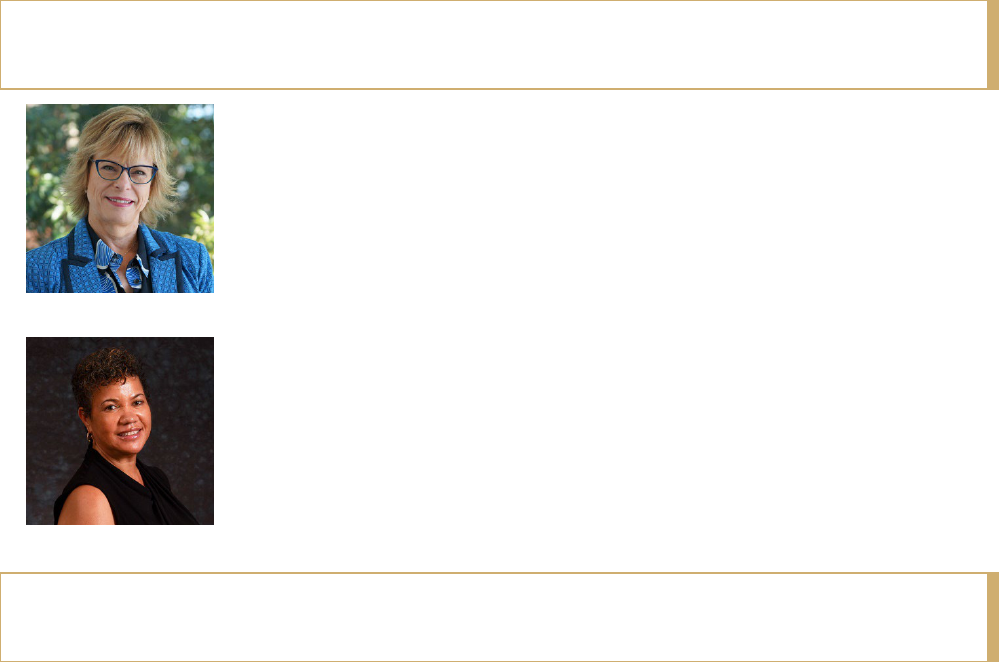
VUSN MSN
graduates may seamlessly progress to the DNP program with guaranteed
admission for up to two years after completion of the MSN degree.
DNP PROGRAM ADMINISTRATION
Assistant Dean for Academics, Doctoral Nursing Practice
Terri L. Allison, DNP, ACNP-BC, FAANP
Office Location: 224 Godchaux Hall
Appointments with Dr. Allison may be scheduled by calling 615.343.7732
or by e-mail at terri.allison@vanderbilt.edu.
DNP Senior Program Manager
Pam Pettis
Office Location: 223 Godchaux Hall
Telephone: 615.343.8419
DNP DEGREE REQUIREMENTS
DNP Advanced Clinical Practice Track, Advanced Systems Practice Track, and Executive
Leadership Track.
Three post-master’s entry tracks for the DNP degree are available. The curriculum includes 37
hours of required coursework and can be completed over five or six semesters. Courses are
delivered using a combination of formats with one on-site intensive experience each semester,
comprised of 3-4 days each, with the remainder of the coursework completed using distance
learning technologies. Requirements for the degree include successful completion of advanced
coursework to include a minimum of 500 hours of practice integration and the successful
completion of a project. All degree requirements must be completed within five years of
enrollment.
Course Load: The unit of measure of the student's work load is the semester hour. All
references to credit hours are semester hours. The normal full-time schedule is 6 hours per
semester. The student's status is defined as follows:
• Full time: Enrolled in 6 or more credit hours.
• Three-quarter time: Enrolled in 4 to 5 credit hours.
• Half time: Enrolled in 2 to 3 credit hours.
• Less than half-time: Enrolled in at least 1 hour.
110
VUSN MSN, POST-MASTER’S CERTIFICATE, and DNP Student Handbook 2023-2024

PRACTICE HOURS
VUSN DNP graduates are scholars expected to collaborate in complex health environments with
diverse populations, translate and apply evidence to clinical decision making; lead the
development, testing, and dissemination of care standards; and advocate for policy and
initiatives with stakeholders, to improve health outcomes. Informed by The Essentials of
Doctoral Education for Advanced Nursing Practice (AACN, 2006), and The Essentials: Core
Competencies for Professional Nursing Education (AACN, 2021), practice experiences are
designed to provide opportunities to expand on proficiency and mastery of APN or systems
competencies.
All VUSN DNP students are required during their course of study to complete a minimum of 500
DNP practice hours within their professional practice setting or in practice sites created through
collaborative partnerships with students, faculty and agencies.
1. Students entering the program with a MSN in an advanced nursing practice specialty
(APRN, leadership/administration, informatics) are required to complete 500 practice
hours, for a total minimum of 1000 post-baccalaureate hours.
2. Students entering the program with a BSN and a Master's in a non-nursing, business- or
health-related field or with a MSN or MN in Nursing Education to the Advanced Systems
or Executive Leadership track may be awarded up to 500 practice hours prior to
enrollment in DNP courses if certified by the American Association of Nursing
Leadership (AONL), the American Nurses Credentialing Center (ANCC), Healthcare
Information and Management Systems Society (HIMSS), or the American College of
Healthcare Executive (ACHE); and are required to complete 500 practice hours for a total
minimum of 1000 post-baccalaureate hours.
3. Students entering the program with a MSN and adding a post-master's certificate in a
nurse practitioner or nurse midwifery specialty are required to complete a minimum of
500 NP or NMW specialty direct patient care clinical hours and 500 DNP practice hours.
4. Students entering with a BSN to the DNP Advanced Clinical Practice track in a specialty
area are required to complete a minimum of 500 NP specialty direct patient care clinical
hours and 500 DNP practice hours for a total minimum of 1000 post-baccalaureate
hours.
Practice hours are designed to demonstrate synthesis of expanded knowledge acquired within
the DNP curriculum. The practice portion of the curriculum demonstrates the student's
capability to meet the core competencies of the DNP degree, and the advanced nursing practice
specialty, as appropriate. The practice hours are documented in the specialty-related clinical
hours (BSN to DNP, PMC) and the DNP Practice Hours Log.
Practical learning experiences are structured in a 4-credit Integrative Application course
completed over 3-4 semesters that includes course objectives for meeting overall program
outcomes. This course is taken over three or four semesters. Credit is awarded each term a
grade of Satisfactory is earned, for a maximum of four credits. The course provides the student
the opportunity to develop, propose, implement and defend the project, the hallmark of the
VUSN practice doctorate. Completion of the project demonstrates synthesis of the student’s
knowledge from curriculum courses and unique practice experiences, achievement of
competencies, and unique expertise in the student’s specified area of practice.
111
VUSN MSN, POST-MASTER’S CERTIFICATE, and DNP Student Handbook 2023-2024
The hours c
an be demonstrated through a variety of methods including:
• In-depth work/mentorship/collaboration with experts from nursing, as well as other
disciplines
• Student engagement within practice environments
• An opportunity to build and assimilate knowledge for advanced specialty practice at a high
level of complexity
• An opportunity for further synthesis and expansion of learning
• Experience in the context within which the final DNP project is completed
• An opportunity to integrate and synthesize The Essentials and specialty requirements
necessary to demonstrate competency in an area of specialized advanced nursing
practice.
Practice hours are self-reported and documented in the student’s DNP Practice Hours Log and
the specialty-related clinical hours log, as appropriate.
Intensive Sessions
All students are required to attend an on-campus intensive session at the beginning of each
semester. BSN to DNP students and DNP plus post master's certificate students are required to
attend on campus specialty blocks in addition to DNP intensives according to their individual
plan of study. Time on campus may vary depending on individual programs of study. Detailed
intensive schedules are distributed to students and made available on the VUSN Web site at
least 4 weeks prior to each intensive session. Attendance is required for successful completion
of the DNP program.
2023-24 Intensive Dates
• Fall: August 28-30, 2023 (Monday-Wednesday)
• Spring: January 8-11, 2024 (Monday-Thursday)
• Summer: May 13-16, 2024 (Monday-Thursday)
112
VUSN MSN, POST-MASTER’S CERTIFICATE, and DNP Student Handbook 2023-2024
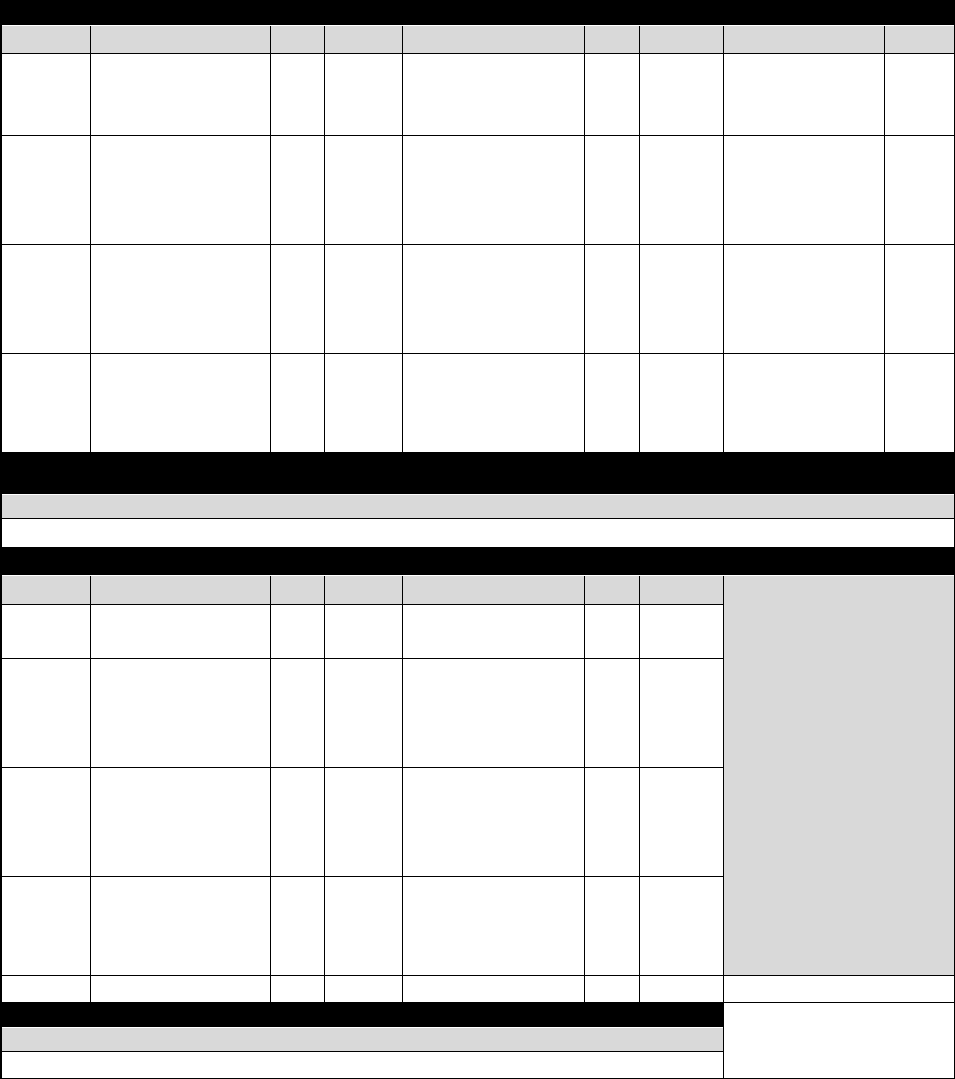
StudentsAdmittedFall2023
AdvancedClinicalPracticeandAdvancedSystemsPracticeTracks
FallYear1 SpringYear1 SummerYear1
Semester1 Cr Semester2 Cr Semester3 Cr
NURS
8212
Knowledgeand
IdentityforNursing
Practice
2
NURS
8222
Appraisalof
Evidencefor
NursingPractice
3
NURS
8232
Leadershipfor
Change
2
NURS
8214
Socialand
Structural
Influenceson
Health
3
NURS
8224
AnalysisofHealth
andSystems
Outcomes
2 NURS
8234
Advocacyfor
HealthEquity
3
NURS
8216
Professionalism,
Legal,Ethics
2
NURS
8226
AdvancedQuality
Improvementand
Safety
2 NURS
8236
Advanced
Evidence‐Based
Practice
2
NURS
8101
Integrative
Applicationof
Evidence‐Based
Practice
1
TotalSemesterCredits/Hours (7) TotalSemester
C
redits/Hours(7) TotalSemester
Credits/Hours
(8)
TotalCredits/Hours:22
FallYear2 SpringYear2
Semester4
Cr
Semester5
Cr
NURS
8238
Advanced
Informatics
1 NURS
8248
AdvancedHealth
Policy
2
NURS
8240
Economicsand
Finance
1 NURS
8250
Advanced
Leadership
2
NURS
8246
Advanced
PopulationHealth
andEpidemiology
2
NURS
8103
Integrative
Applicationof
Evidence‐Based
Practice
1
NURS
8102
Integrative
Applicationof
Evidence‐Based
Practice
2
Elective
1
2
Elective
1
2
TotalSemesterCredits/Hours (8) TotalSemesterCredits/Hours(7)
TotalCredits/Hours:15
TotalProgramCredits:37
1
Electivescanbetakenanysemester
VUSN: DNP Curriculum Plans
113
VUSN MSN, POST-MASTER’S CERTIFICATE, and DNP Student Handbook 2023-2024
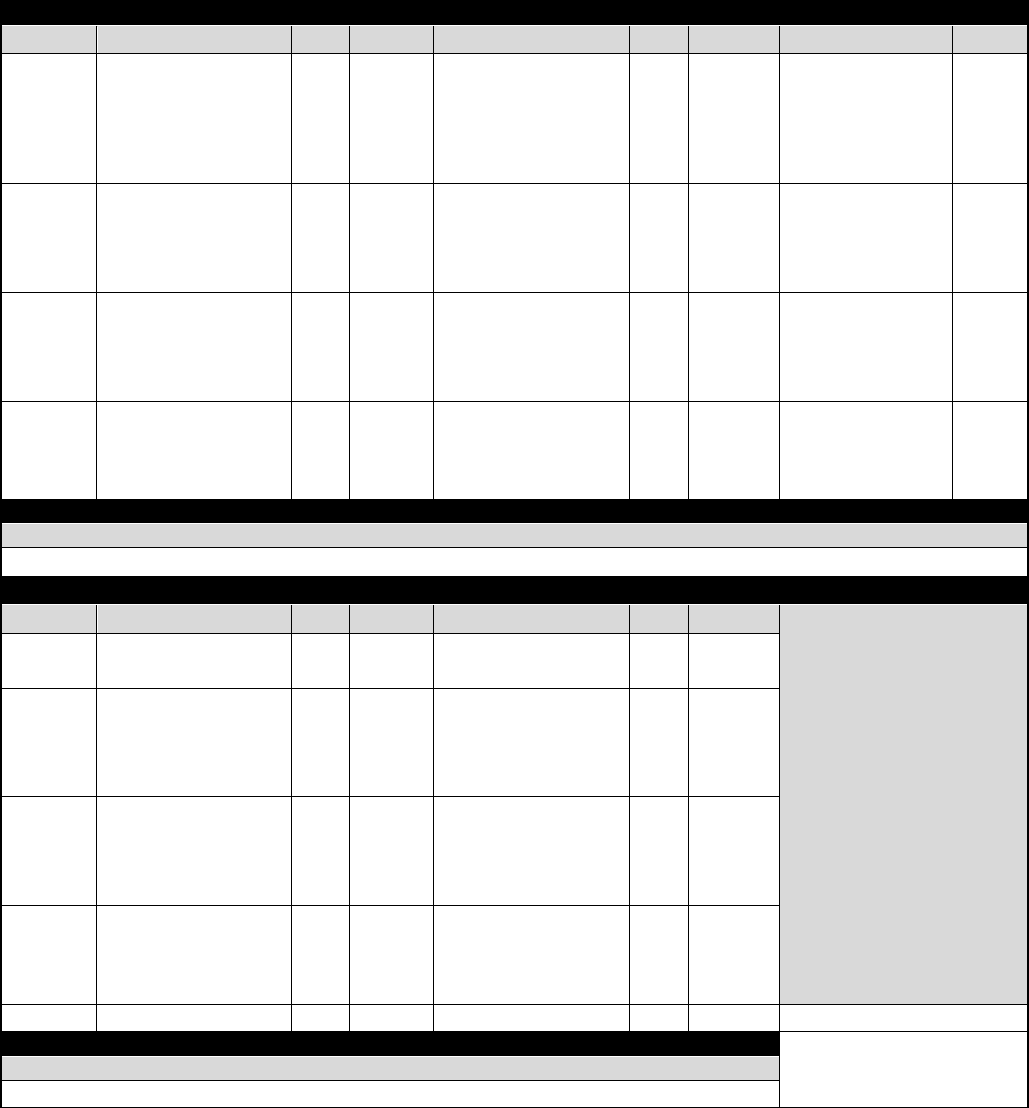
StudentsAdmittedFall2023
ExecutiveLeadershipTrack
FallYear1 SpringYear1 SummerYear1
Semester1 Cr Semester2 Cr Semester3 Cr
NURS8212
Knowledgeand
IdentityforNursing
Practice
2
NURS
8222
AppraisalofEvidence
forNursingPractice
3
NURS
8310
Systemsand
Complex
AdaptiveThinking
forNurse
Executives
2
NURS
8214
Socialand
Structural
Influenceson
Health
3
NURS
8224
AnalysisofHealth
andSystems
Outcomes
2 NURS
8234
Advocacyfor
HealthEquity
3
NURS8216 Professionalism,
Legal,Ethics
2
NURS
8226
AdvancedQuality
Improvementand
Safety
2 NURS
8236
Advanced
Evidence‐Based
Practice
2
NURS
8101
Integrative
Applicationof
Evidence‐Based
Practice
1
TotalSemesterCredits/Hours (7) TotalSemester
C
redits/Hours(7) TotalSemesterCredits/Hours (8)
TotalCredits/Hours:22
FallYear2 SpringYear2
Semester4
Cr
Semester5
Cr
NURS
8238
AdvancedInformatics
1 NURS
8248
AdvancedHealth
Policy
2
NURS
8320
NurseExecutive
Leadership
1 NURS
8318
Economicsand
Finance
2
NURS8246
AdvancedPopulation
Healthand
Epidemiology
2
NURS
8103
Integrative
Applicationof
Evidence‐Based
Practice
1
NURS8102
Integrative
Applicationof
Evidence‐Based
Practice
2
NURS
8069
LeanMethodology
orElective
1
(ifLean
certified)
2
Elective
1
2
TotalSemesterCredits/Hours (8) TotalSemesterCredits/Hours(7)
TotalCredits/Hours:15
TotalProgramCredits:37
1
Electivescanbetakenanysemester
114
VUSN MSN, POST-MASTER’S CERTIFICATE, and DNP Student Handbook 2023-2024
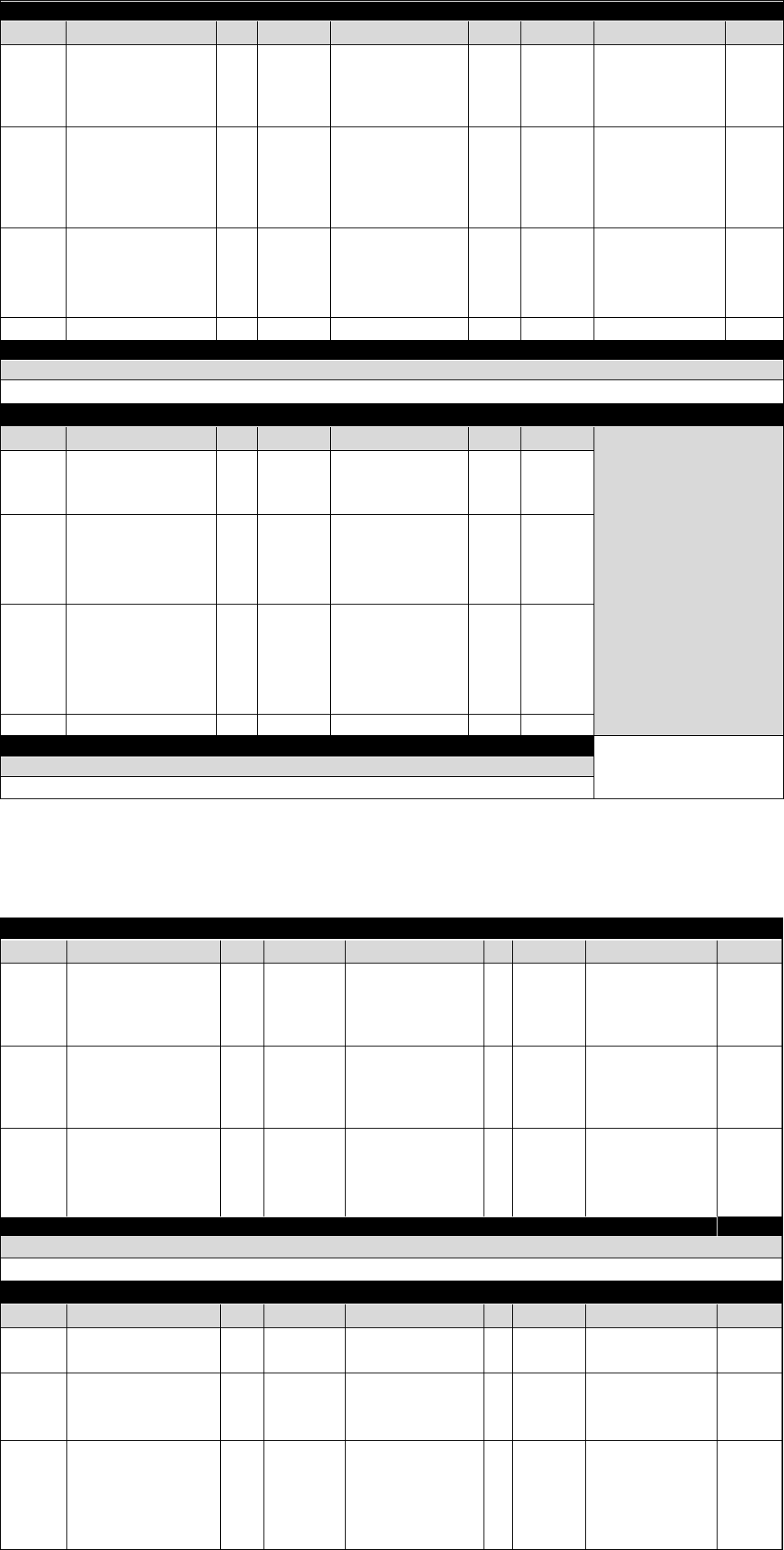
Fall Year 1
Spring Year 1
Summer Year 1
Semester 1
Cr
Semester 2
Cr
Semester 3
Cr
N8010
Evidence-Based
Practice
I: The
Nature of
Evidence
2
N8014
Statistics in Health
Sciences
3
N8024
Epidemiology
3
N8042
Quality
Improvement &
Patient Safety
3
N8022
Evidence-Based
Practice
II:
Evaluating and
Applying
Evidence
3 N8032
Health Care
Economics and
Finance
3
N8064
Scholarly Writing
1
N8105
1
Integrative
Application of
Evidence-Based
Practice
1
N8105
1
Integrative
Application of
Evidence-Based
Practice
1
Elective
2
2-3
Total Semester Credits/Hours
(6)
Total Semester Credits/Hours (7)
Total Semester Credits/Hours
(9-10)
Total Credits/Hours: 22-23
Fall Year 2
Spring Year 2
Semester 4
Cr
Semester 5
Cr
N8012
Informatics for
Scholarly
Practice
2
N8052
Health Policy
2
N8044
Management of
Organizations and
Systems
3
N8054
Legal and Ethical
Environment
3
N8105
1
Integrative
Application of
Evidence-Based
Practice
1
N8105
1
Integrative
Application
of Evidence-
Based
Practice
1
Elective
2
2-3
Total Semester Credits/Hours
(6)
Total Semester Credits/Hours (8-9)
Total Credits/Hours: 14-15
Total Program Credits: 36
1
N8105 is a cumulative course taken over four semesters. One credit is awarded each term a grade of Satisfactory
is earned, for a maximum of four credits
2
Electives may be taken any semester Revised 03/24/2022
6 Semester Plan
Fall Year 1
Spring Year 1
Summer Year 1
Semester 1
Cr
Semester 2
Cr
Semester 3
Cr
N8010
Evidence-Based
Practice I: The
Nature
of Evidence
2
N8014
Statistics in Health
Sciences
3
N8024
Epidemiology
3
N8042
Quality Improvement
&
Patient Safety
3
N8022
Evidence-Based
Practice
II:
Evaluating and
Applying Evidence
3
N8032
Health Care
Economics and
Finance
3
N8064
Scholarly Writing
1
N8105
1
Integrative
Application of
Evidence-Based
Practice
1
Total Semester Credits/Hours (6) Total Semester Credits/Hour (6) Total Semester Credits/Hours
(7)
Total Credits/Hours:
19
Fall Year 2
Spring Year 2
Summer Year 2
Semester 4
Cr
Semester 5
Cr
Semester 6
Cr
N8012
Informatics for
Scholarly Practice
2
N8052
Health Policy
2
Elective
2
2-3
N8044
Management of
Organizations and
Systems
3
N8054
Legal and
Ethical
Environment
3
Elective
2
2-3
N8105
1
Integrative
Application of
Evidence
-Based
Practice
1
N8105
1
Integrative
Application of
Evidence
-Based
Practice
1
N8105
1
Integrative
Application
of Evidence-
Based
Practice
1
5 Semester Plan
VUSN: DNP CURRICULUM PLANS
Students admitted prior to fall 2023
Students admitted prior to fall 2023
115
VUSN MSN, POST-MASTER’S CERTIFICATE, and DNP Student Handbook 2023-2024
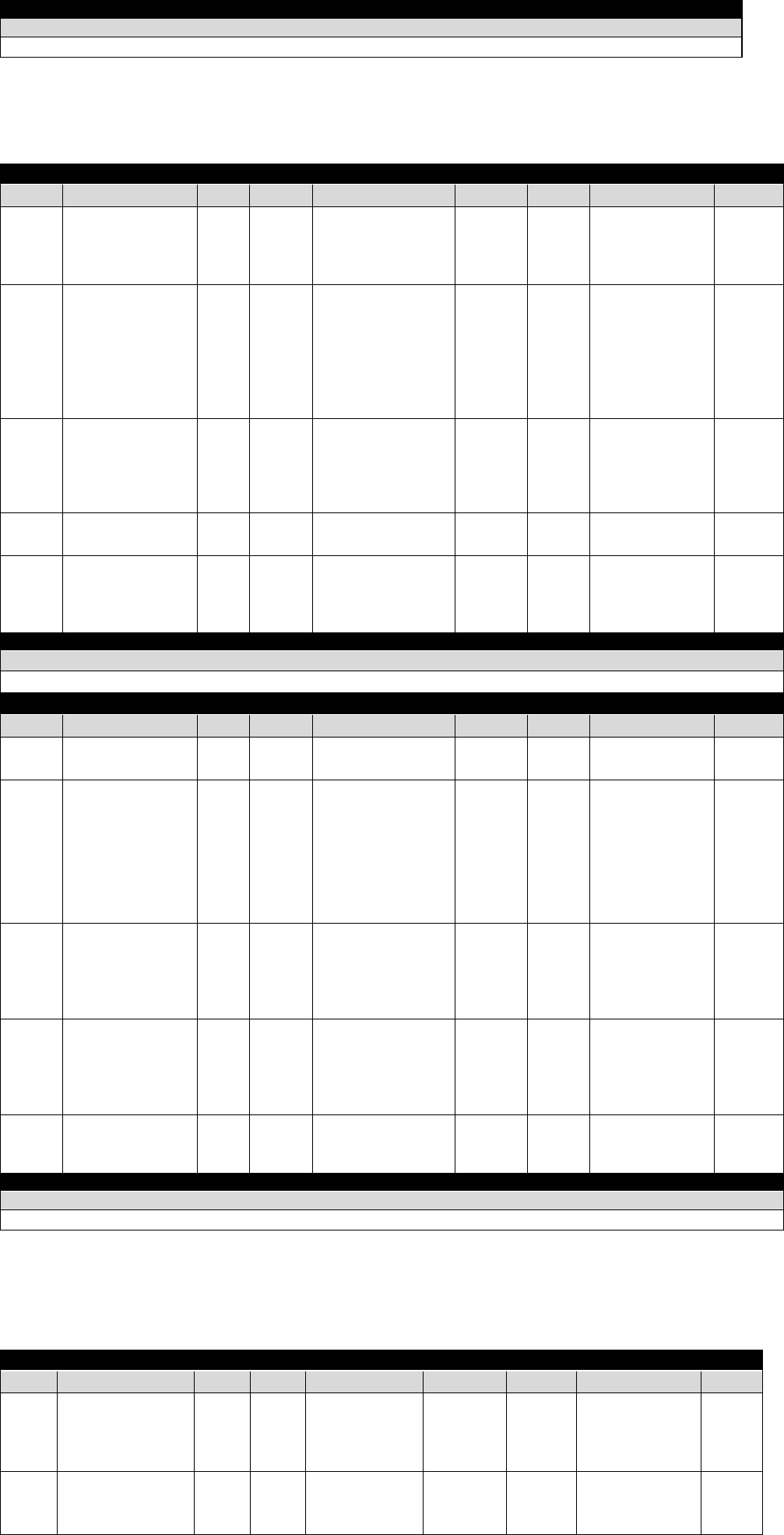
Total Semester Credits/Hours
(6)
Total Semester Credits/Hours (6)
Total Semester Credits/Hours
(5-7)
Total Credits/Hours: 17-19
Total Program Credits: 36
1
N8105 is a cumulative course taken over four semesters. One credit is awarded each term a grade of Satisfactory
is earned, for a maximum of four credits.
2
Electives may be taken any semester Revised 03/24/2022
5 Semester Plan - Executive Leadership
Fall Year 1
Spring Year 1
Summer Year 1
Semester 1
Cr
Semester 2
Cr
Semester 3
Cr
N8010
Evidence-Based
Practice I: The
Nature
of Evidence
2
N8014
Statistics in Health
Sciences
3
N8024
Epidemiology
3
N8042
Quality
Improvement &
Patient Safety
3
N8022
Evidence-Based
Practice
II: Evaluating
and
Applying Evidence
3
N8032 or
N8034
3
Healthcare
Economics and
Finance OR
Advanced
Healthcare
Economics and
Finance
3
N8064
Scholarly Writing
1
N8069
Lean Methodology in
Healthcare
May be taken Spring
Year 1 or Year 2
2
N8105
1
Integrative
Application of
Evidence-Based
Practice
1
Elective
2
May be taken if not
enrolled in N8069
2-3
N8105
1
Integrative
Application of
Evidence-Based
Practice
1
Total Semester Credits/Hours
(6)
Total Semester Credits/Hours (9)
Total Semester Credits/Hours
(7)
Total Credits/Hours:
22
Fall Year 2
Spring Year 2
Summer Year 2
Semester 4
Cr
Semester 5
Cr
N8012
Informatics for
Scholarly Practice
2
N8052
Health Policy
2
N8045
Evidence-Based
Leadership in
Healthcare
Organizations:
Creating
Sustainable Value
in Health Care
3
N8054
Legal and
Ethical
Environment
3
N8105
1
Integrative
Application
of Evidence-
Based
Practice
1
N8105
1
Integrative
Application of
Evidence-Based
Practice
1
N8069
Lean Methodology in
Healthcare
May be taken
Spring Year 1 or
Year 2
Elective
2
May be taken if
not enrolled in
N8069
2-3
Total Semester Credits/Hours
(6)
Total Semester Credits/Hours (8-9)
Total Credits/Hours: 14-15
Total Program Credits: 36
1
N8105 is a cumulative course taken over four semesters. One credit is awarded each term a grade of Satisfactory
is earned, for a maximum of four credits
2
Electives may be taken any semester
3
Choose N8032 or N8034 after discussion with course coordinator Revised 3/24/22
6 Semester Plan - Executive Leadership
Fall Year 1
Spring Year 1
Summer Year 1
Semester 1
Cr
Semester 2
Cr
Semester 3
Cr
N8010
Evidence-Based
Practice I: The
Nature
of Evidence
2
N8014
Statistics in
Health
Sciences
3
N8024
Epidemiology
3
N8042
Quality Improvement
&
Patient Safety
3
N8022
Evidence-Based
Practice II:
3
N8032
or
Healthcare
Economics and
Evaluating and
N8034
3
Fina
nce OR
3
Students admitted prior to fall 2023
Students admitted prior to fall 2023
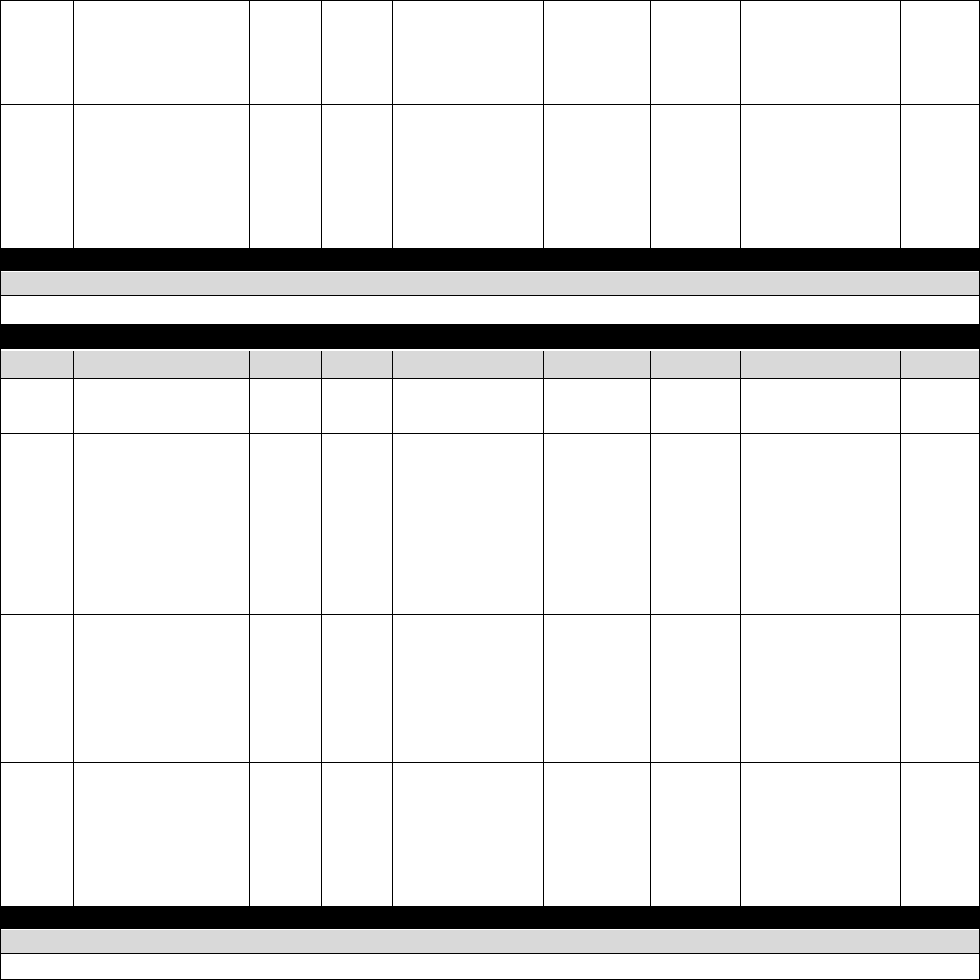
Applying
Evidence
May be
taken Year
1 or Year 2
Advanced
Healthcare
Economics and
Finance
N8064
Scholarly Writing
1
N8069
Lean Methodology
in Healthcare
May be taken
Spring Year 1 or
Year 2
2
N8105
1
Integrative
Application of
Evidence-Based
Practice
1
Total Semester Credits/Hours
(6)
Total Semester Credits/Hours (8)
Total Semester Credits/Hours
(7)
Total Credits/Hours:
21
Fall Year 2
Spring Year 2
Summer Year 2
Semester 4
Cr
Semester 5
Cr
Semester 6
Cr
N8012
Informatics for
Scholarly Practice
2
N8052
Health Policy
2
Elective
2
1-3
N8045
Evidence-Based
Leadership in
Healthcare
Organizations:
Creating Sustainable
Value in Health Care
3
N8054
Legal and
Ethical
Environm
ent
3
N8032
or N8034
3
Healthcare
Economics and
Finance OR
Advanced
Healthcare
Economics and
Finance
3
May be
taken
Year 1 or
Year 2
N8105
1
Integrative
Application of
Evidence-
Based
Practice
1
N8105
1
Integrative
Application of
Evidence-
Based
Practice
1
N8105
1
Integrative
Application
of
Evidence-
Based
Practice
1
N8069
Lean Methodology
in Healthcare
May be taken
Spring Year 1
or Year 2
2
Total Semester Credits/Hours
(6)
Total Semester Credits/Hours (6)
Total Semester Credits/Hours
(5-7)
Total Credits/Hours: 17-19
Total Program Credits: 36
1
N8105 is a cumulative course taken over four semesters. One credit is awarded each term a grade of Satisfactory
is earned, for a maximum of four credits
2
Electives may be taken any semester
3
Choose N8032 or N8034 after discussion with course coordinator
117
VUSN MSN, POST-MASTER’S CERTIFICATE, and DNP Student Handbook 2023-2024
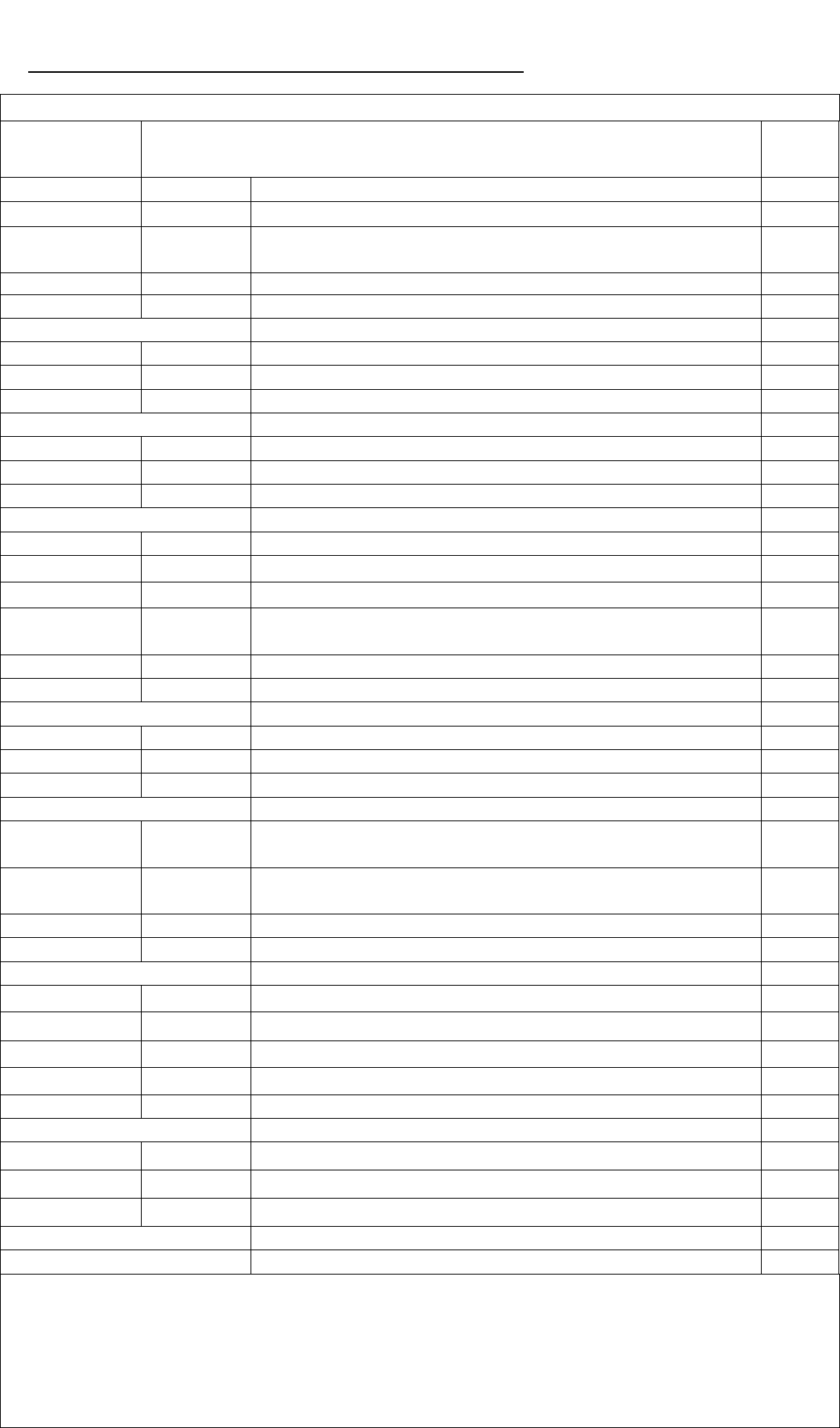
BSN ENTRY TO DNP ADVANCED CLINICAL PRACTICE TRACKS
Students Admitted Fall 2023
BSN Entry to Advanced Clinical Practice DNP: AGACNP Specialty
BSN Entry to DNP: AGACNP Curriculum Plan and Required Hours
Semester Course Number and Name
Credit
Hours
Fall Year 1
NURS 6022
Advanced Physiology and Pathophysiology
4
NURS 6024
Advanced Pharmacology
3
NURS 6045
Professional Formation 1: Roles and Contexts for Advanced
Nursing Practice
1
NURS 8212
Knowledge and Identity for Nursing Practice
2
NURS 8214
Social and Structural Influences on Health
3
Semester Total
13
Spring Year 1
NURS 8222
Appraisal of Evidence for Nursing Practice
3
NURS 8224
Analysis of Health and Systems Outcomes
2
NURS 8226
Advanced Quality Improvement and Safety
2
Semester Total
7
Summer Year 1
NURS 8232
Leadership for Change
2
NURS 8234
Advocacy for Health Equity
3
NURS 8236
Advanced Evidence-Based Practice
2
Semester Total
7
Fall Year 2
NURS 6013
Advanced Health Assessment
2
NURS 6014
Advanced Health Assessment Lab
1
NURS 6105
Advanced Clinical Reasoning for the AGACNP
1
NURS 6110
Advanced Diagnostic and Therapeutic Procedures in Acute and
Critical Care
1
NURS 6114
Collaborative Management in Adult-Gerontology Acute Care I
3
NURS 8216
Professionalism, Legal, Ethics
2
Semester Total
9
Spring Year 2
NURS 6115
Adult-Gerontology Acute Care Nurse Practitioner Practicum
2
4
NURS 6124
Collaborative Management in Adult-Gerontology Acute Care II
3
Elective 1 (specialty required)
1
2
Semester Total
9
Summer Year 2
NURS 6075
Professional Formation 4: Transition to Advanced Nursing
Practice
1
NURS 6134
Pathophysiology and Collaborative Management in Acute Care
for the Adult-Gerontology ACNP III
3
NURS 6195
Adult-Gerontology Acute Care Nurse Practitioner Preceptorship
2
4
NURS 8101
Integrative Application of Evidence-Based Practice
3
1
Semester Total
9
Fall Year 3
NURS 8085
BSN-DNP Practice Immersion
4
2
NURS 8238
Advanced Informatics
1
NURS 8240
Economics and Finance
1
NURS 8248
Advanced Population Health and Epidemiology
2
NURS 8102
Integrative Application of Evidence-Based Practice
3
2
Semester Total
8
Spring Year 3
NURS 8250
Advanced Health Policy
2
NURS 8246
Advanced Leadership
2
NURS 8103
Integrative Application of Evidence-Based Practice
3
1
Semester Total
5
Program Total
68
1
Elective 1 may be MSN or DNP level, as designated by the chosen specialty/foci. The elective may be 2 or 3 credits, but must be
at least 2 credits.
2
AGACNP requires 630 specialty clinical hours; 500 direct clinical practice hours are required for board examination eligibility;
specialty clinical hours are based upon a 1:5 ratio.
3
DNP requires a minimum of 1000 practice hours post BSN. BSN to DNP students complete a minimum of 500 practice hours.
DNP practice hours are based upon a 1:9 ratio.
4
This course is not required to meet the specialty requirements for certification. The course offers an opportunity for students to
obtain more in-depth clinical experience in an area of interest.
Approved 4/11/2023
118
VUSN MSN, POST-MASTER’S CERTIFICATE, and DNP Student Handbook 2023-2024
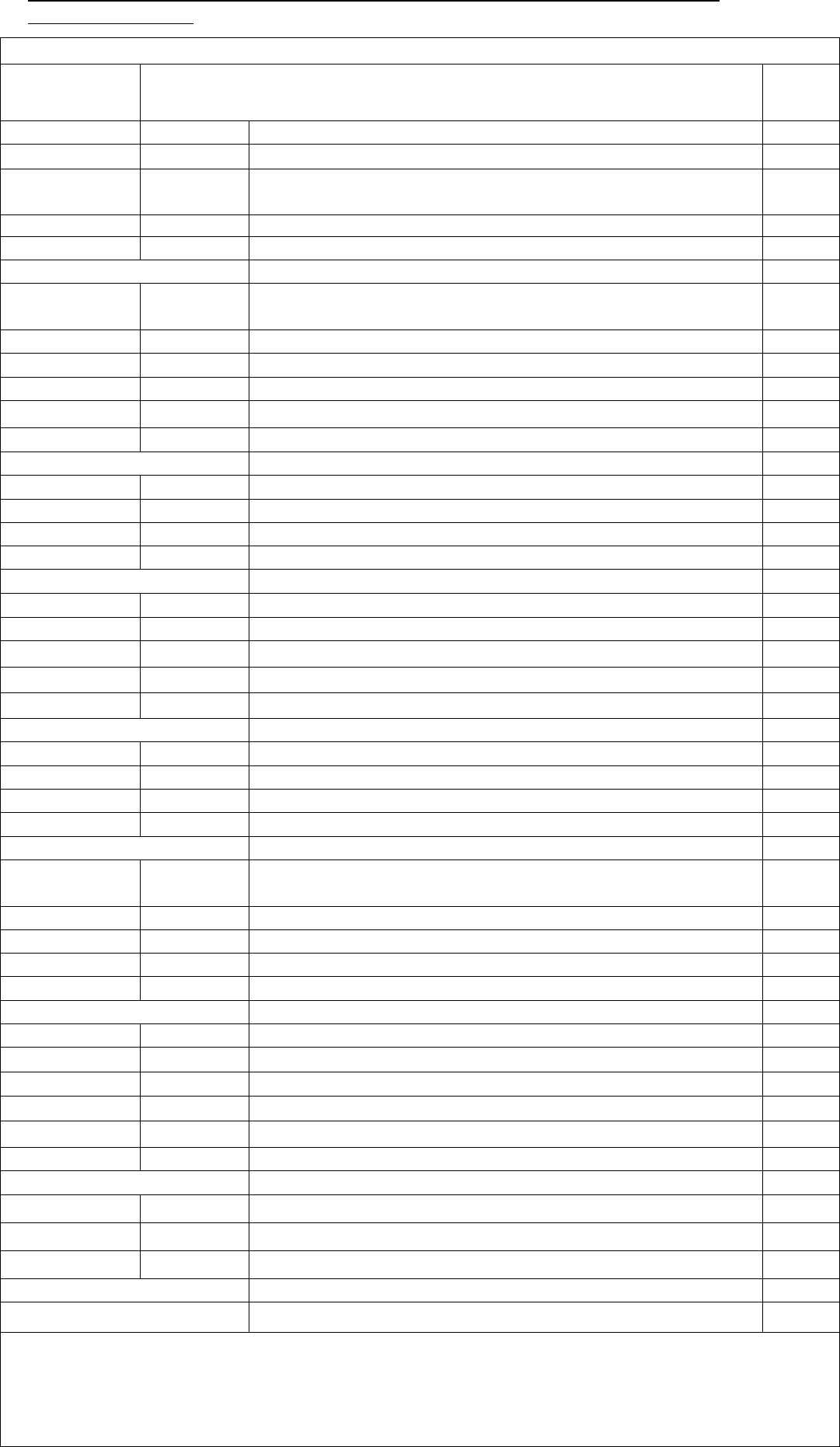
Students Admitted Fall 2023
BSN Entry to Advanced Clinical Practice DNP: Family Nurse Practitioner/Emergency Nurse
Practitioner Specialty
BSN Entry to DNP: FNP/ENP Curriculum Plan and Required Hours
Semester Course Number and Name
Credit
Hours
Fall Year 1
NURS 6022
Advanced Physiology and Pathophysiology
4
NURS 6024
Advanced Pharmacology
3
NURS 6045
Professional Formation 1: Roles and Contexts for Advanced
Nursing Practice
1
NURS 8212
Knowledge and Identity for Nursing Practice
2
NURS 8214
Social and Structural Influences on Health
3
Semester Total
13
Spring Year 1
NURS 6032
Advanced Practice Primary Care Nursing in Women’s & Gender-
Related Health
1
NURS 6310
Procedures in Primary, Urgent, and Emergency Care
1
NURS 6521
The Context of Primary Care
1
NURS 6532
Advanced Nursing Primary Care of the Elderly
1
NURS 8222
Appraisal of Evidence for Nursing Practice
3
NURS 8224
Social and Structural Influences on Health
2
Semester Total
9
Summer Year 1
NURS 6143
Point of Care Ultrasound
2
NURS 8232
Leadership for Change
2
NURS 8234
Advocacy for Health Equity
3
NURS 8236
Advanced Evidence-Based Practice
2
Semester Total
9
Fall Year 2
NURS 6013
Advanced Health Assessment
2
NURS 6014
Advanced Health Assessment Lab
1
NURS 6030
Advanced Nursing in Adult Primary Care
3
NURS 6305
Advanced Health Applications for the ENP
1
NURS 6595
Family NP Preceptorship
5
Semester Total
12
Spring Year 2
NURS 6036
Advanced Nursing in Primary Care Pediatrics
3
NURS 6301
Concepts in Advanced Emergency Nursing
3
NURS 6355
Practicum in Primary Care and Urgent Care
1
3
NURS 8226
Advanced Quality Improvement and Safety
2
Semester Total
11
Summer Year 2
NURS 6075
Professional Formation 4: Transition to Advanced Nursing
Practice
1
NURS 6361
Pathophysiology and Management Emergent and Critical Care
3
NURS 6365
Trauma, Emergency and Critical Care Clinical I
1
4
NURS 6395
Practicum in Emergency Care II
1
1
NURS 8101
Integrative Application of Evidence-Based Practice
2
1
Semester Total
10
Fall Year 3
NURS 8085
BSN-DNP Practice Immersion
3
2
NURS 8216
Professionalism, Legal, Ethics
2
NURS 8238
Advanced Informatics
1
NURS 8240
Economics and Finance
1
NURS 8246
Advanced Population Health and Epidemiology
2
NURS 8102
Integrative Application of Evidence-Based Practice
2
2
Semester Total
10
Spring Year 3
NURS 8250
Advanced Health Policy
2
NURS 8246
Advanced Leadership
2
NURS 8103
Integrative Application of Evidence-Based Practice
2
1
Semester Total
5
Program Total
79
1
FNP/ENP requires 630 specialty clinical hours; 500 direct clinical practice hours are required for board examination eligibility;
specialty clinical hours are based upon a 1:5 ratio.
2
DNP requires a minimum of 1000 practice hours post BSN (or 500 post-MSN). BSN to DNP students complete a minimum of 500
practice hours. DNP practice hours are based upon a 1:9 ratio.
3
This course is not required to meet the specialty requirements for certification. The course offers an opportunity for students to
obtain more in-depth clinical experience in an area of interest.
Approved 6/13/2023

BSN ENTRY TO DNP ADVANCED CLINICAL PRACTICE TRACKS
Students Admitted Prior to Fall 2023
BSN Entry to Advanced Clinical Practice DNP: AGACNP Specialty
BSN Entry to DNP: AGACNP Curriculum Plan and Required Hours
Semester Course Number and Name
Credit
Hours
Fall
Year 1
NURS 6045
Professional Formation 1: Roles and Contexts for Advanced
Nursing Practice
2
NURS 6102
Advanced Physiology and Pathophysiology
4
NURS 6103
Advanced Pharmacotherapeutics
3
NURS 6114
Pathophysiology and Collaborative Management in Acute Care for
the Adult-Gerontology ACNP I
3
NURS 8064
Scholarly Writing
1
Semester Total
13
Spring
Year 1
NURS 6124
Pathophysiology and Collaborative Management in Acute Care for
the Adult-Gerontology ACNP II
3
NURS 8014
Statistics in Health Sciences
3
NURS 8054
Legal and Ethical Environment
3
Semester Total
9
Summer
Year 1
NURS 6134
Pathophysiology and Collaborative Management in Acute Care for
the Adult-Gerontology ACNP III
3
NURS 8024
Epidemiology
3
NURS 8032
Health Care Economics and Finance
3
Semester Total
9
Fall
Year 2
NURS 6013
Advanced Health Assessment
2
NURS 6114
Advanced Health Assessment Lab
1
NURS 6105
Advanced Health Assessment Applications for the Adult-
Gerontology Acute Care Nurse Practitioner
1
NURS 6110
Advanced Diagnostic and Therapeutic Procedures in Acute and
Critical Care
1
NURS 8010
Evidence-Based Practice I: The Nature of Evidence
2
NURS 8042
Quality Improvement and Patient Safety
3
Semester Total
10
Spring
Year 2
NURS 6115
Adult-Gerontology Acute Care Nurse Practitioner Practicum
1
4
NURS 8022
Evidence-Based Practice II: Evaluating and Applying Evidence
3
NURS 8105
Integrative Application of Evidence-Based Practice
2,3
1
Elective 1 (specialty required)
4
2
Semester Total
10
Summer
Year 2
NURS 6075
Professional Formation 4: Transition to Advanced Nursing Practice
1
NURS 6195
Adult-Gerontology Acute Care Nurse Practitioner Preceptorship
4
NURS 8105
Integrative Application of Evidence-Based Practice
2,3
1
Semester Total
6
Fall
Year 3
NURS 8012
Informatics for Scholarly Practice
2
NURS 8105
Integrative Application of Evidence-Based Practice
2,3
1
NURS 8044
Management of Organizations and Systems
3
NURS 8085
BSN-DNP Practice Immersion
5
2
Semester Total
6
Spring
Year 3
NURS 8105
Integrative Application of Evidence-Based Practice
2,3
1
NURS 8052
Health Policy
2
Semester Total
3
Program Total
66
120
VUSN MSN, POST-MASTER’S CERTIFICATE, and DNP Student Handbook 2023-2024

1
AGACNP requires 630 specialty clinical hours; 500 direct clinical practice hours are required for board examination
eligibility; specialty clinical hours are based upon a 1:5 ratio
2
DNP requires a minimum of 1000 practice hours post BSN. BSN to DNP students complete a minimum of 500 practice
hours. DNP practice hours are based upon a 1:9 ratio.
3
N8105 is a cumulative course taken over four semesters. One credit is awarded each term a grade of Satisfactory is earned,
for a maximum of four credits
4
Elective 1 may be MSN or DNP level, as designated by the chosen specialty/foci. The elective may be 2 or 3 credits, but
must be at least 2 credits.
5
This course is not required to meet the specialty requirements for certification. The course offers an opportunity for
students to obtain more in-depth clinical experience in an area of interest.
Students Admitted Prior to Fall 2023
BSN Entry to Advanced Clinical Practice DNP: FNP/ENP Specialty
BSN ENTRY to DNP: FNP/ENP Curriculum Plan and Required Hours
Semester
Course Number and Name
Credit
Hours
Fall
Year 1
NURS 6010
Advanced Pathophysiology
3
NURS 6011
Advanced Health Assessment and Clinical Reasoning
2
NURS 6012
Advanced Health Assessment Lab
1
NURS 6020
Advanced Pharmacotherapeutics
3
NURS 6045
Professional Formation 1: Roles and Contexts for Advanced
Nursing Practice
2
NURS 8064
Scholarly Writing
1
Semester Total
12
Spring
Year 1
NURS 6032
Advanced Practice Primary Care Nursing in Women’s & Gender-
Related Health
1
NURS 6036
Advanced Practice Nursing in the Primary Care of the Child &
Adolescent
3
NURS 6521
The Context of Primary Care: FNP Domains and Core
Competencies for Practice
2
NURS 6532
Advanced Practice Nursing in the Primary Care of the Older Adult
1
NURS 8014
Statistics in Health Sciences
3
NURS 8054
Legal and Ethical Environment
3
Semester Total
13
Summer
Year 1
NURS 6143
Fundamentals of Point of Care Ultrasound for the Advanced
Practice Provider
2
NURS 8024
Epidemiology
3
NURS 8032
Health Care Economics and Finance
3
Semester Total
8
Fall
Year 2
NURS 6030
Advanced Practice Nursing in Primary Care of the Adult
3
NURS 6305
Advanced Health Assessment Applications for the Emergency
Nurse Practitioner
1
NURS 6595
Family Nurse Practitioner Preceptorship for Dual Specialty
5
NURS 8010
Evidence-Based Practice I: The Nature of Evidence
2
NURS 8042
Quality Improvement and Patient Safety
3
Semester Total
14
Spring
Year 2
NURS 6301
Concepts of Advanced Emergency Nursing
3
NURS 6355
Practicum in Primary & Urgent Care
1
(special Section)
3
NURS 8022
Evidence-Based Practice II: Evaluating and Applying Evidence
3
NURS 8105
Integrative Application of Evidence-Based Practice
2,3
1
Semester Total
11
Summer
Year 2
NURS 6361
Pathophysiology & Collaborative Management in Emergent and
Critical Care
3
NURS 6365
Trauma, Emergency & Critical Care Clinical I
1
3
NURS 6395
Practicum in Emergency Care II
1
1
NURS 8105
Integrative Application of Evidence-Based Practice
2,3
1
Semester Total
8
121
VUSN MSN, POST-MASTER’S CERTIFICATE, and DNP Student Handbook 2023-2024
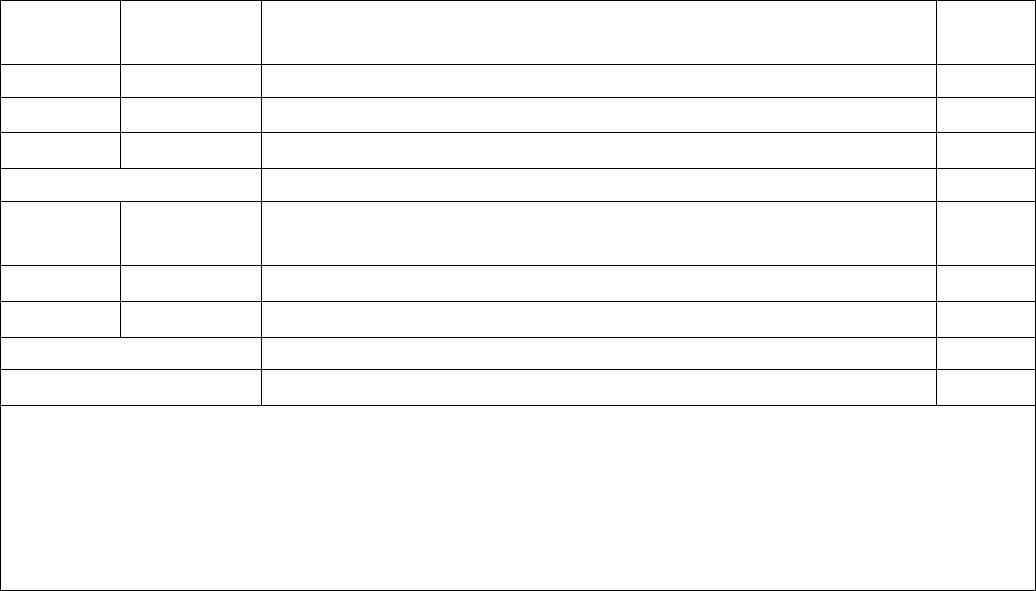
Fall
Year 3
NURS 8085
BSN-DNP Practice Immersion
4
2
NURS 8012
Informatics for Scholarly Practice
2
NURS 8044
Management of Organizations and Systems
3
NURS 8105
Integrative Application of Evidence-Based Practice
2,3
1
Semester Total
8
Spring
Year 3
NURS 8052
Health Policy
2
NURS 8105
Integrative Application of Evidence-Based Practice
2,3
1
Semester Total
3
Program Total
77
1
FNP/ENP requires 980 specialty clinical hours (MSN clinical hours are based upon a 1:5 ratio)
2
DNP requires a minimum of 1000 practice hours post BSN. BSN to DNP students complete a minimum of 500 practice
hours. DNP practice hours are based upon a 1:9 ratio.
3
N8105 is a cumulative course taken over four semesters. One credit is awarded each term a grade of Satisfactory is earned,
for a maximum of four credits
4
Course is not required to meet the specialty requirements for certification. Course offers an opportunity for students to
obtain more in-depth clinical experience in an area of interest.
122
VUSN MSN, POST-MASTER’S CERTIFICATE, and DNP Student Handbook 2023-2024
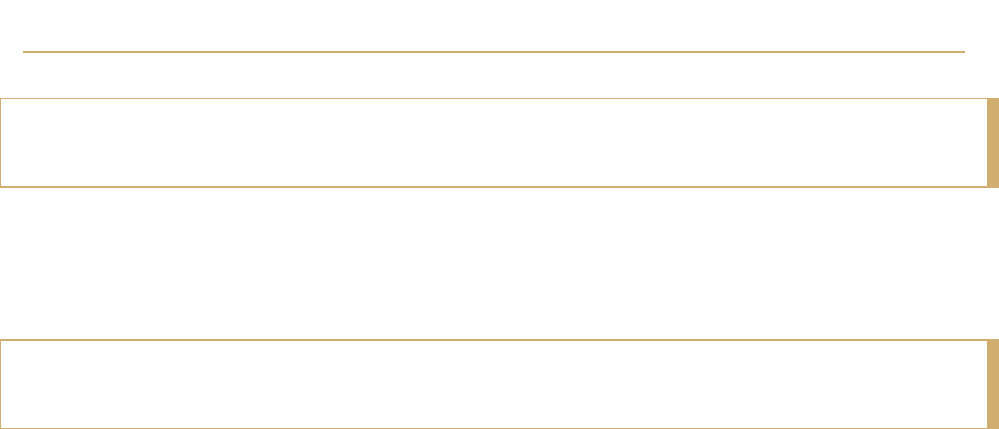
VUSN: Master of Nursing Practice (MN) Program
ENTRY INTO MN PROGRAM
Students enter the VUSN Master of Nursing Degree program as follows:
Students with an undergraduate or graduate degree in a field other than nursing may complete
the MN program in four semesters of full-time study.
PROGRAM OVERVIEW
*This section was amended on October 31, 2023 to add information for those wishing to pursue
advanced nursing education.
The Master of Nursing (MN) program is designed for individuals with an earned bachelor’s
degree in a field other than nursing who wish to enter the discipline as registered nurses. This
program prepares students as registered nurses well-prepared for delivery of high-quality,
comprehensive care with respect for individual uniqueness and within an evidenced-based
framework grounded in principles of sound clinical judgment. Graduates will demonstrate
advanced competency in health justice, nursing leadership, interprofessional teamwork, and
nursing informatics, as well as introductory clinical teaching competencies.
The curriculum consists of a total of 65 credit hours across 4 semesters, with 1300 clinical
hours across primary, post-acute care, acute and critical care, community-living, and community
agency practice settings. Innovative curricular design will foster active clinically-focused
learning and practice of key affective, cognitive, and psychomotor skills essential for safe,
quality nursing practice. High credit hours in three of the four semesters are strategically
structured with peer-engaged, faculty-facilitated active learning to foster application of core
concepts to exemplar clinical situations across the lifespan, minimizing lecture and reading.
The final semester focuses on synthesis of conceptual and clinical learning including
introductory clinical teaching and advanced competency in health justice, nursing leadership,
interprofessional teamwork, and nursing informatics. Students will also select a focus track for
this final semester that fosters additional competency in a population (pediatrics or adult
complex care) and an elective in introductory clinical teaching, global health, nursing
informatics and innovation, or advanced practice nursing.
In addition to preparing graduates for high-quality comprehensive care as Registered Nurses, it
also prepares graduates who would like to pursue advanced nursing education. Options at
VUSN include a Post-Masters Certificate (3 semesters for most) or a Doctorate in Nursing
Practice plus a Post-Masters Certificate (5 semesters for most). Curricular plans can be found
here (https://nursing.vanderbilt.edu/mn/curriculum.php).
123
VUSN MSN, POST-MASTER’S CERTIFICATE, and DNP Student Handbook 2023-2024
123
VUSN MSN, POST-MASTER’S CERTIFICATE, and DNP Student Handbook 2023-2024

PROGRAM OUTCOMES
On completion of the MN program, students will be able to:
1. Synthesize knowledge from nursing, the humanities, the biophysical and social sciences,
and current evidence to engage in professional nursing practice.
2. Promote health and prevent illness in diverse patient populations through targeted
education in multiple settings across transitions of care.
3. Provide safe, culturally responsive health care to individuals, families, communities, and
populations in diverse settings, through use of critical thinking, clinical reasoning, ethical
decision-making, and information management, both independently and in collaboration
with health care teams.
4. Demonstrate leadership in professional nursing practice through commitment to
reflective practice, accountability for nursing actions, patient advocacy, and evidence-
based practice.
5. Engage in improvement of the health care delivery system through inquiry and action
into socioeconomic, political, legal, and ethical issues affecting professional nursing
practice.
124
VUSN MSN, POST-MASTER’S CERTIFICATE, and DNP Student Handbook 2023-2024
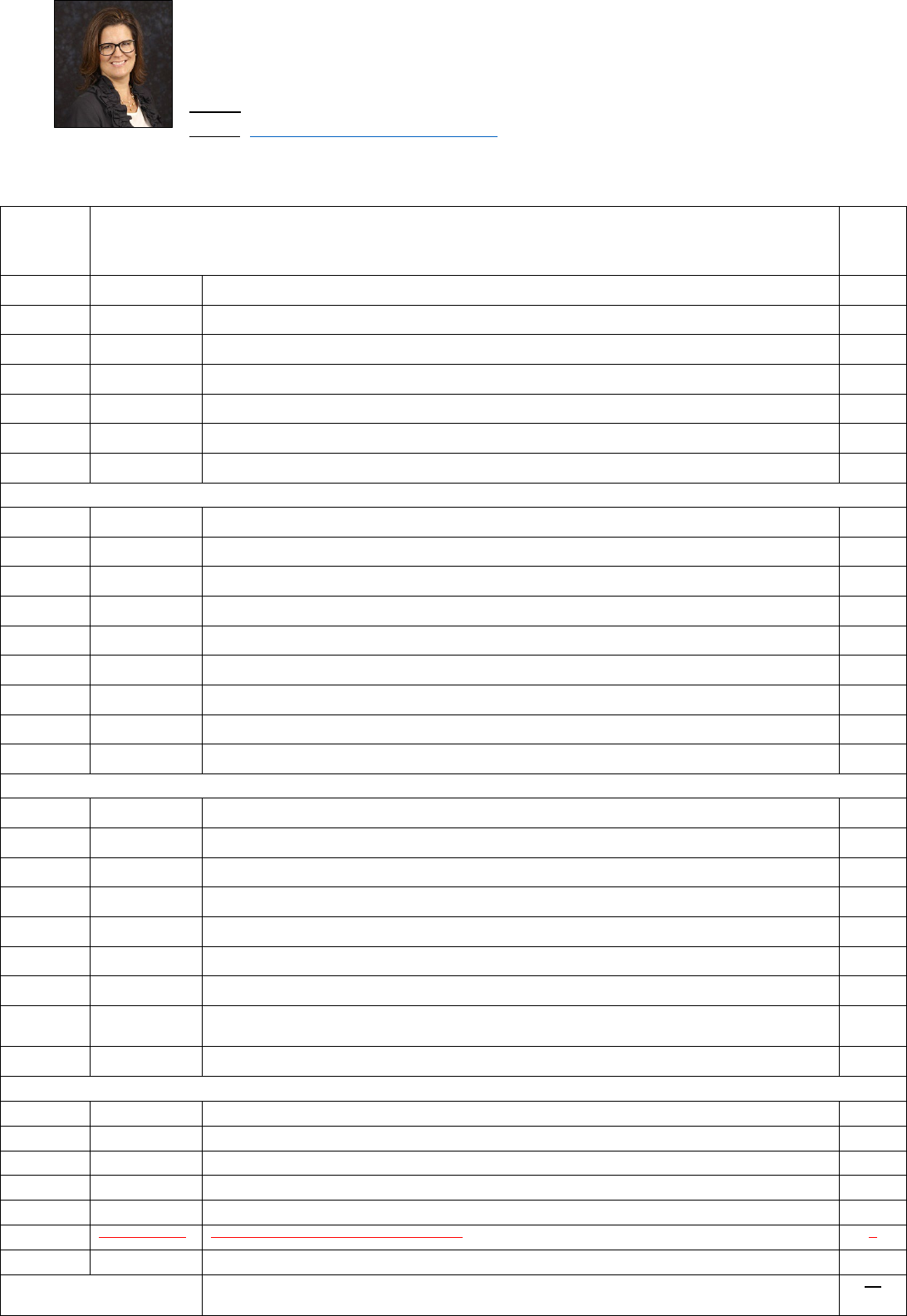
MASTER OF NURSING PROGRAM
Mary A. Jessee, PhD, RN
Assistant Dean for Academics, Generalist Nursing Practice
Director, Master of Nursing Program
544 School of Nursing
Phone: 615.343.1629
E-mail: mary.a.jessee@vanderbilt.edu
*Amendment to the spring 2 semester made effective October 16, 2023
Master of Nursing Program Curriculum Plan and Required Hours
Semester Course Number and Name
Credit
Hours
Spring 1
NURS 8212
Knowledge and Identity for Nursing Practice
2
NURS 6022
Physiology and Pathophysiology for Advanced Nursing Practice
4
NURS 5600
Pharmacotherapy for Nursing Practice
2
NURS 8214
Social and Structural Influences on Health
3
NURS 5610
Fundamentals of Clinical Practice
3
NURS 5615
Health Assessment and Nursing Intervention Lab
1
NURS 5625
Fundamental Nursing Care of Adults and Older Adults
2
Summer 1
NURS 8222
Appraisal of Evidence for Nursing Practice
3
NURS 5701
Human Experience of Health and Illness 1
5
NURS 5703
Pharmacotherapy for Populations 1
2
NURS 8224
Analysis of Health and Systems Outcomes
2
NURS 5735
Interprofessional Chronic Illness Management Practicum 1
1
NURS 5745
Community Engagement Practicum 1
0.5
NURS 5715
Mental Health Nursing Care of Individuals, Groups, and Families (weeks 7-12)
1
NURS 5725
Nursing Care of Children and Families (weeks 1-6)
1
NURS 5706
Clinical Reasoning and Judgment in Nursing Practice
1
Fall 1
NURS 8232
Leadership for Change
2
NURS 5801
Human Experience of Health and Illness 2
5
NURS 5803
Pharmacotherapy for Populations 2
2
NURS 8234
Advocacy for Health Equity
3
NURS 5835
Interprofessional Chronic Illness Management Practicum 2
1
NURS 5845
Community Engagement Practicum 2
0.5
NURS 5815
Nursing Care of Childbearing Families (weeks 1-5)
1
NURS 5825
Nursing Care of Adults and Older Adults with Acute Complex and Chronic Illness
(weeks 6-14)
2
NURS 5806
Advancing Clinical Reasoning and Judgment in Nursing Practice
1
Spring 2
NURS 5905
Nursing Care of Critically Ill Individuals
1
NURS 5915
Practicum for Transition to Nursing Practice
4
NURS 5935
Interprofessional Chronic Illness Management Practicum 3
1
NURS 5945
Community Engagement Practicum 3
1
NURS 5906
Complex Clinical Reasoning and Judgment in Nursing Practice
2
*NURS 5903
Advanced Generalist Role Integration (This course removed in spring 2 semester)
2
Elective/s
(Global health, clinical teaching, nursing informatics, or advanced practice nursing)
3
Program Total
65
63
125
VUSN MSN, POST-MASTER’S CERTIFICATE, and DNP Student Handbook 2023-2024
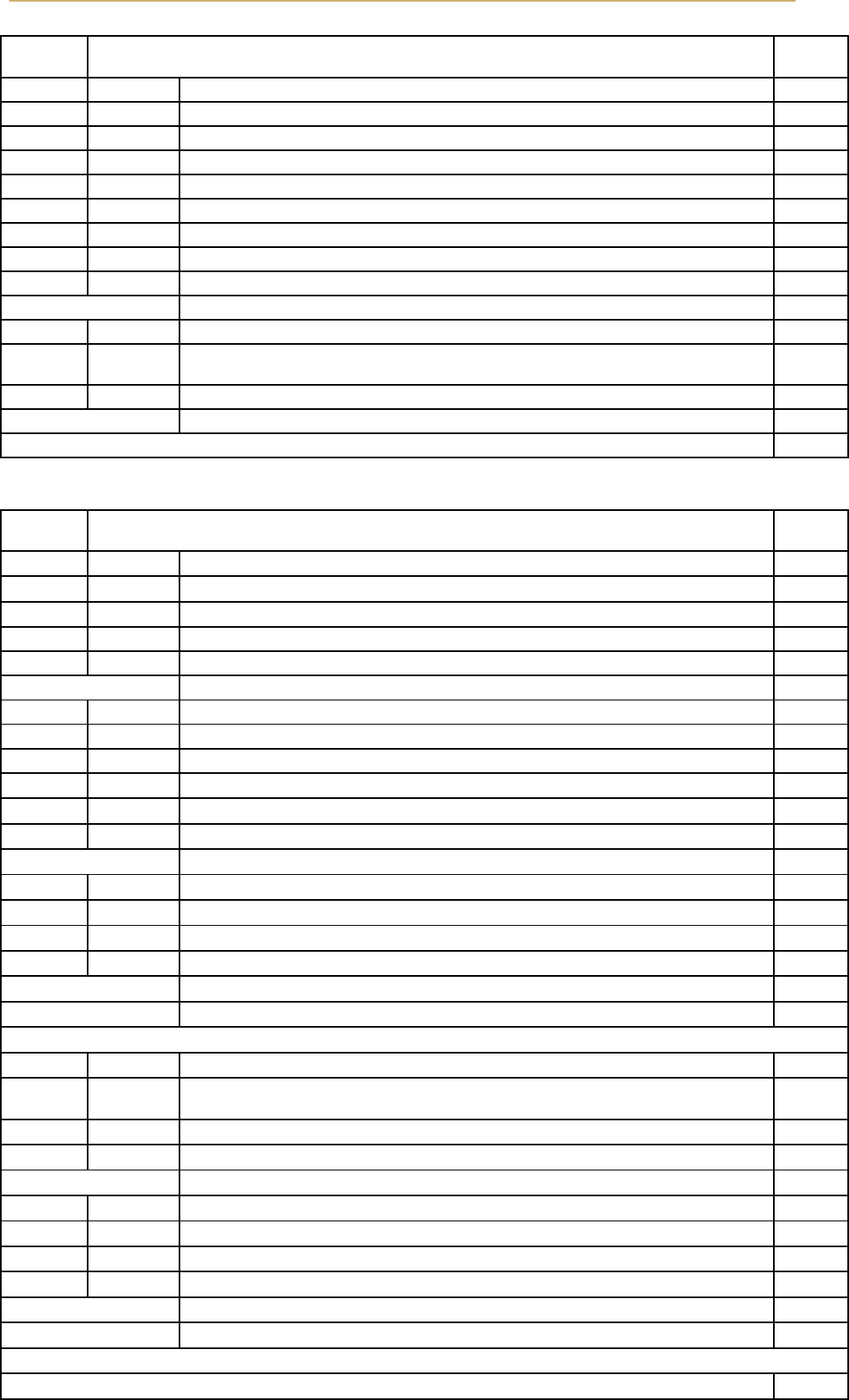
Semester
Credit
Hours
Fall NURS 6013 Advanced Health Assessment 2
NURS 6014 Advanced Health Assessment Lab 1
NURS 6105
Advanced Clinical Reasoning for the AGACNP 1
NURS 6110
Advanced Diagnostic and Therapeutic Procedures in Acute and Critical Care 1
NURS 6114
Collaborative Management in Adult-Gerontology Acute Care I
3
Semester Total 8
Spring NURS 6115 Adult-Gerontology Acute Care Nurse Practitioner Practicum 4
Elective
Elective
2
NURS 6124
Collaborative Management in Adult-Gerontology Acute Care II 3
Semester Total 9
Summer NURS 6075 Professional Formation 4: Transition to Advanced Nursing Practice 1
NURS 6134
Pathophysiology and Collaborative Management in Acute Care for the Adult-
Gerontology ACNP III
3
NURS 6195
Adult-Gerontology Acute Care Nurse Practitioner Preceptorship
4
Semester Total 8
25
Semester
Credit
Hours
Summer 1 NURS 8216 Professionalism, Legal, Ethics 2
NURS 8226
Advanced Quality Improvement & Safety 2
NURS 8236
Advanced Evidence-Based Practice 2
NURS 8238
Advanced Informatics 1
NURS 8246
Advanced Population Health/Epi 2
Semester Total 9
Fall 1 NURS 6013 Advanced Health Assessment 2
NURS 6014 Advanced Health Assessment Lab 1
NURS 6105
Advanced Clinical Reasoning for the AGACNP
1
NURS 6110
Advanced Diagnostic and Therapeutic Procedures in Acute and Critical Care 1
NURS 6114
Collaborative Management in Adult-Gerontology Acute Care I 3
NURS 8101
Integrative Application of Evidence-Based Practice 1
Semester Total 9
Spring 1 NURS 6115 Adult-Gerontology Acute Care Nurse Practitioner Practicum 4
Elective
Elective 2
NURS 6124
Collaborative Management in Adult-Gerontology Acute Care II 3
NURS 8102
Integrative Application of Evidence-Based Practice 2
Semester Total 11
Year 1 Total 29
Summer 2 NURS 6075 Professional Formation 4: Transition to Advanced Nursing Practice 1
NURS 6134
Pathophysiology and Collaborative Management in Acute Care for the Adult-
Gerontology ACNP III
3
NURS 6195
Adult-Gerontology Acute Care Nurse Practitioner Preceptorship 4
NURS 8103
Integrative Application of Evidence-Based Practice
4
1
Semester Total 9
Fall 2 TBD Clinical course (specialty or TBD) 2
NURS 8240 Economics and Finance 1
NURS 8248
Advanced Health Policy 2
NURS 8250
Advanced Leadership 2
Semester Total 7
Year 2 Total 16
45
AGACNP: MN to DNP + PMC Curriculum Plan (Note: Summer Start)
TOTAL HOURS
Course Number and Name
AGACNP: MN + PMC Curriculum Plan (Note: Fall Start)
TOTAL HOURS
Course Number and Name
MN to PMC and MN to DNP+PMC Curriculum Plans by Specialty
126
VUSN MSN, POST-MASTER’S CERTIFICATE, and DNP Student Handbook 2023-2024
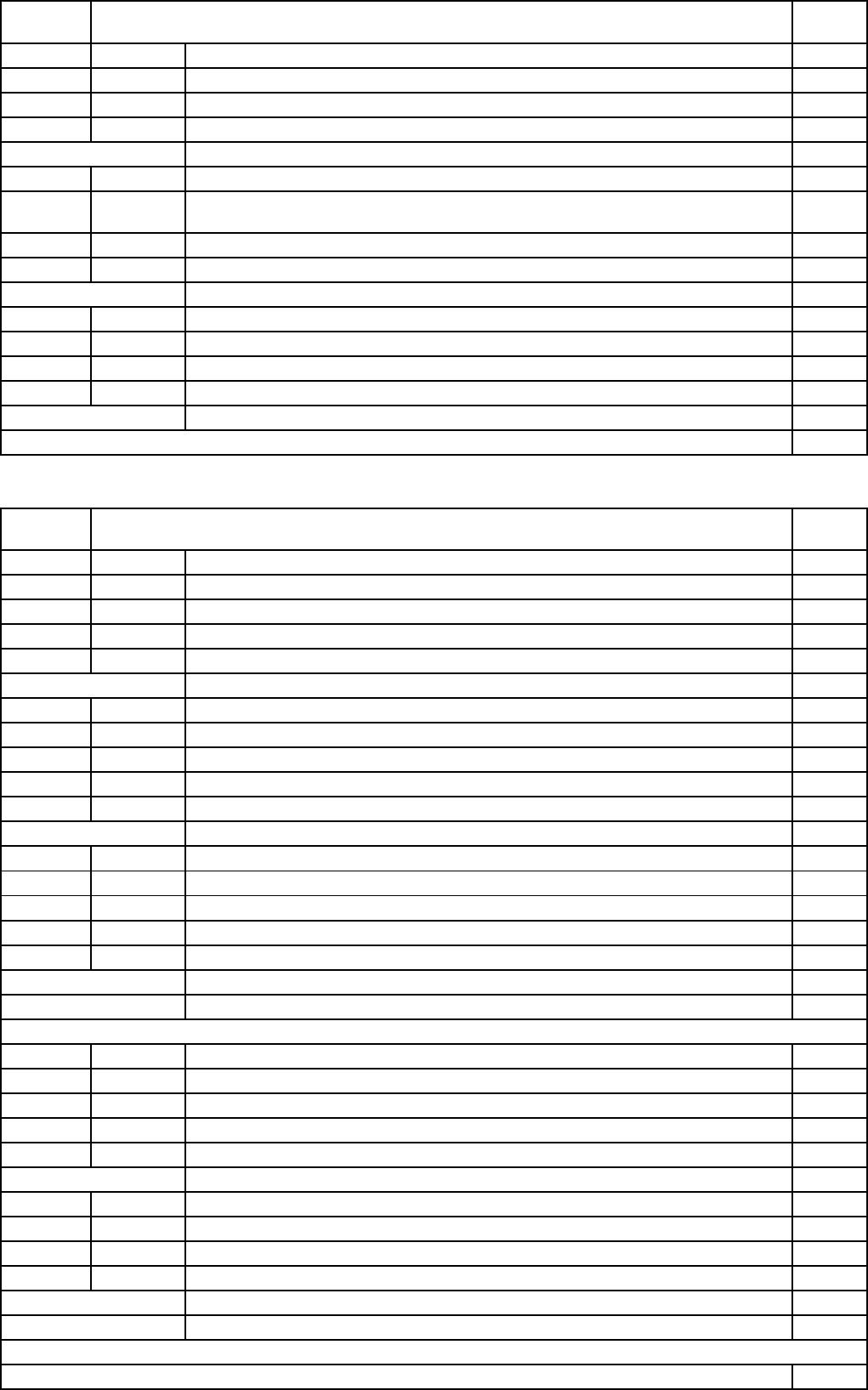
Semester
Credit
Hours
Fall NURS 6013 Advanced Health Assessment 2
NURS 6014 Advanced Health Assessment Lab 1
NURS 6205
Advanced Health Assessment Apps. for Adult-Gerontology Primary Care NP 1
NURS 6034
Adult-Gerontology Primary Care I 3
Semester Total 7
Spring NURS 6215 Adult-Gerontology Primary Care Nurse Practitioner Clinical I 4
NURS 6032
Advanced Practice Primary Care Nursing in Women’s & Gender-Related Health 1
NURS 6234
Adult-Gerontology Primary Care II 3
NURS 6236
Advanced Concepts in the Care of the Older Adult 2
Semester Total 10
Summer NURS 6075 Professional Formation 4: Transition to Advanced Nursing Practice 1
NURS 6031
Advanced Practice Nursing in Primary Care of the Adolescent 1
NURS 6231
Essential Procedures for the Primary Care Provider
2
NURS 6295
Adult-Gerontology Primary Care Nurse Practitioner Clinical II 4
Semester Total 8
25
Semester
Credit
Hours
Summer 1
NURS 8216 Professionalism, Legal, Ethics 2
NURS 8226
Advanced Quality Improvement & Safety
2
NURS 8236
Advanced Evidence-Based Practice 2
NURS 8238
Advanced Informatics 1
NURS 8246
Advanced Population Health/Epi
2
Semester Total 9
Fall 1 NURS 6013 Advanced Health Assessment 2
NURS 6014 Advanced Health Assessment Lab 1
NURS 6205
Advanced Health Assessment Apps. for Adult-Gerontology Primary Care NP
1
NURS 6034
Adult-Gerontology Primary Care I 3
NURS 8101
Integrative Application of Evidence-Based Practice
4
1
Semester Total 8
Spring 1
NURS 6215 Adult-Gerontology Primary Care Nurse Practitioner Clinical I 4
NURS 6032
Advanced Practice Primary Care Nursing in Women’s & Gender-Related Health 1
NURS 6234
Adult-Gerontology Primary Care II 3
NURS 6236
Advanced Concepts in the Care of the Older Adult 2
NURS 8102
Integrative Application of Evidence-Based Practice
4
2
Semester Total 12
Year 1 Total 29
Summer 2
NURS 6075 Professional Formation 4: Transition to Advanced Nursing Practice 1
NURS 6031
Advanced Practice Nursing in Primary Care of the Adolescent 1
NURS 6231
Essential Procedures for the Primary Care Provider 2
NURS 6295
Adult-Gerontology Primary Care Nurse Practitioner Clinical II 4
NURS 8103
Integrative Application of Evidence-Based Practice
4
1
Semester Total 9
Fall 2
TBD Clinical course (specialty or TBD) 2
NURS 8240 Economics and Finance 1
NURS 8248
Advanced Health Policy 2
NURS 8250
Advanced Leadership 2
Semester Total 7
Year 2 Total 16
45
TOTAL HOURS
AGPCNP: MN to DNP + PMC Curriculum Plan (Note: Summer Start)
Course Number and Name
AGPCNP: MN + PMC Curriculum Plan (Note: Fall Start)
Course Number and Name
TOTAL HOURS
127
VUSN MSN, POST-MASTER’S CERTIFICATE, and DNP Student Handbook 2023-2024
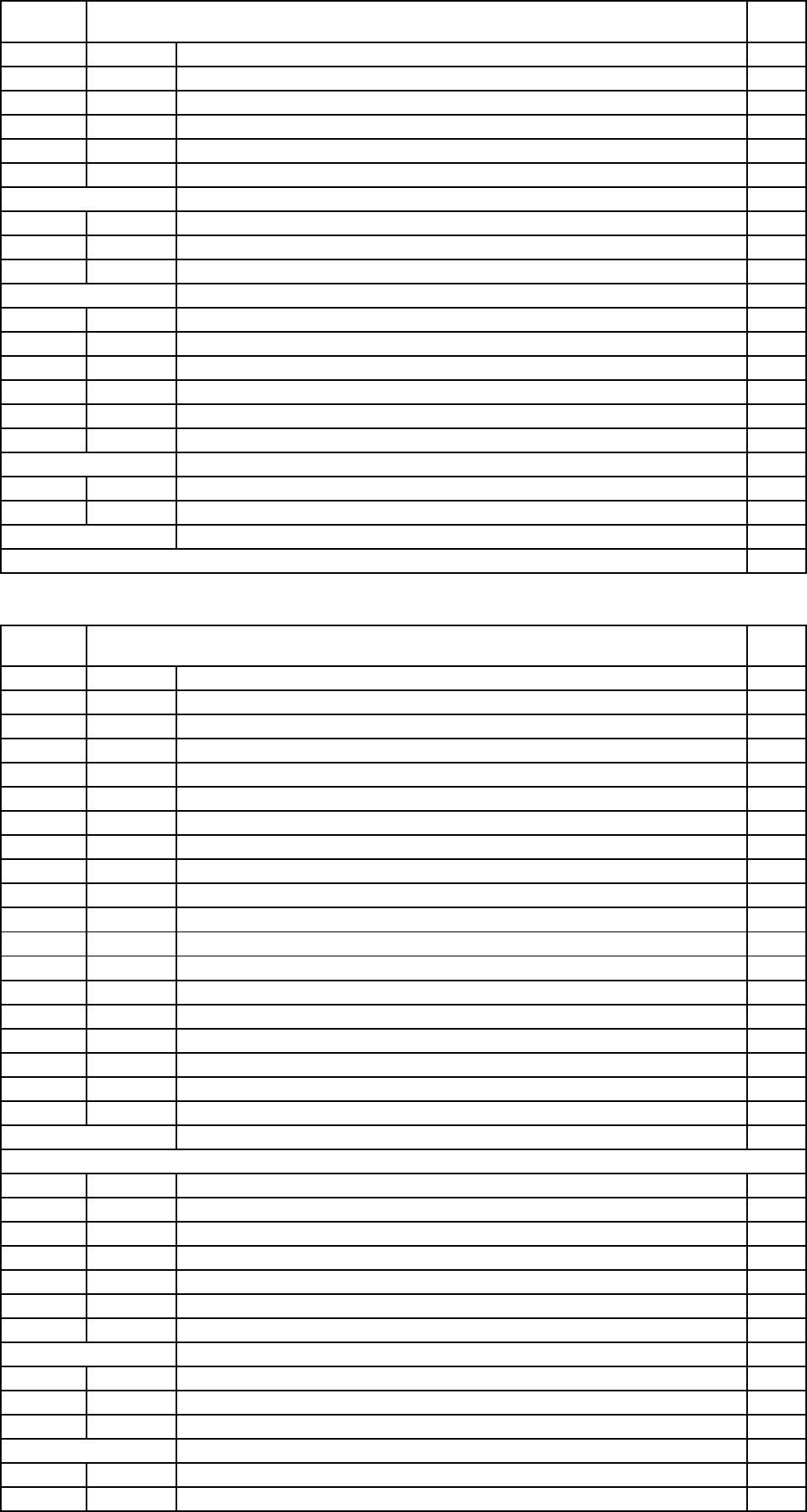
Semester
Credit
Hours
Fall 1 NURS 6013 Advanced Health Assessment 2
NURS 6014 Advanced Health Assessment Lab 1
NURS 6205 Advanced Health Assessment Apps. for Adult-Gerontology Primary Care NP 1
NURS 7305 Advanced Health Assessment Apps. for the WHGRNP 1
NURS 6034
Adult-Gerontology Primary Care I 3
NURS 7310 Women's & Gender-Related Health for Advanced Practice Nursing I 3
Semester Total 11
Spring 1 NURS 6215 Adult-Gerontology Primary Care Nurse Practitioner Clinical I 4
NURS 6234 Adult-Gerontology Primary Care II 3
NURS 7320 Women's & Gender-Related Health for Advanced Practice Nursing II 3
Semester Total
10
Summer 1 NURS 6075 Professional Formation 4: Transition to Advanced Nursing Practice 1
NURS 6031 Advanced Practice Nursing in Primary Care of the Adolescent 1
NURS 6231
Essential Procedures for the Primary Care Provider 2
NURS 6236 Advanced Concepts in the Care of the Older Adult 2
NURS 7315 Practicum in Women's & Gender-Related Health 4
NURS 7330
Women's & Gender-Related Health Issues 1
Semester Total 11
Fall 2 NURS 6295 Adult-Gerontology Primary Care Nurse Practitioner Clinical II 4
NURS 7395
Preceptorship in Women's & Gender-Related Health 5
Semester Total 9
41
Semester
Credit
Hours
Summer 1 NURS 8216 Professionalism, Legal, Ethics 2
NURS 8226 Advanced Quality Improvement & Safety 2
NURS 8236 Advanced Evidence-Based Practice 2
NURS 8238 Advanced Informatics 1
NURS 8246 Advanced Population Health/Epi 2
Semester Total 9
Fall 1 NURS 6013 Advanced Health Assessment 2
NURS 6014 Advanced Health Assessment Lab 1
NURS 6205 Advanced Health Assessment Apps. for Adult-Gerontology Primary Care NP 1
NURS 7305 Advanced Health Assessment Applications for the WHGRNP 1
NURS 6034 Adult Gerontology Primary Care I 3
NURS 7310 Women's & Gender-Related Health for Advanced Practice Nursing I 3
NURS 8101 Integrative Application of Evidence-Based Practice 1
Semester Total 12
Spring 1 NURS 7320 Women's & Gender-Related Health for Advanced Practice Nursing II 3
NURS 6234 Adult-Gerontology Primary Care II 3
NURS 6215 Adult-Gerontology Primary Care Nurse Practitioner Clinical I 4
NURS 8102 Integrative Application of Evidence-Based Practice 2
Semester Total 12
Year 1 Total 33
Summer 2 NURS 6075 Professional Formation 4: Transition to Advanced Nursing Practice 1
NURS 6031 Advanced Practice Nursing in Primary Care of the Adolescent 1
NURS 6231 Essential Procedures for the Primary Care Provider 2
NURS 6236 Advanced Concepts in the Care of the Older Adult 2
NURS 7330 Women's & Gender-Related Health Issues 1
NURS 7315 Practicum in Women's & Gender-Related Health 4
NURS 8103 Integrative Application of Evidence-Based Practice 1
Semester Total 12
Fall 2 NURS 6295 Adult-Gerontology Primary Care Nurse Practitioner Clinical II 4
NURS 7395 Preceptorship in Women's & Gender-Related Health 5
NURS 8240 Economics and Finance 1
Semester Total 10
Spring 2 Clinical course 2
NURS 8248 Advanced Health Policy 2
TOTAL HOURS
AGPCNP/WHGRNP: MN to DNP + PMC Curriculum Plan (Note: Summer Start)
Course Number and Name
AGPCNP/WHGRNP DUAL: MN + PMC (Note: Fall Start)
Course Number and Name
128
VUSN MSN, POST-MASTER’S CERTIFICATE, and DNP Student Handbook 2023-2024

NURS 8250 Advanced Leadership 2
Semester Total 6
Year 2 Total 28
61
TOTAL HOURS
129
VUSN MSN, POST-MASTER’S CERTIFICATE, and DNP Student Handbook 2023-2024
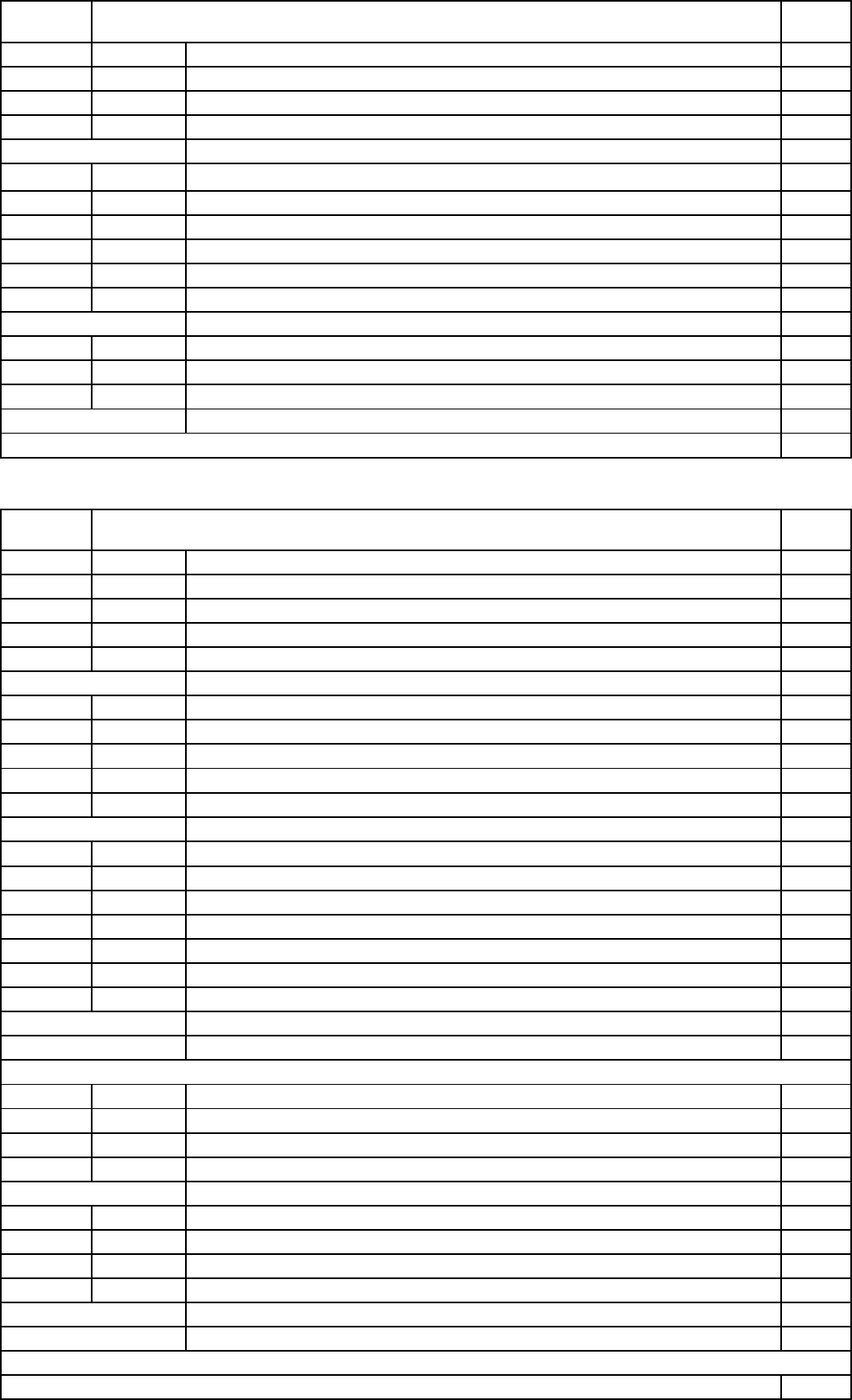
Semester
Credit
Hours
Fall NURS 6013 Advanced Health Assessment 2
NURS 6014 Advanced Health Assessment Lab 1
NURS 6030
Advanced Practice Nursing in Primary Care of the Adult 3
NURS 6505
Advanced Health Assessment Applications for the FNP 1
Semester Total 7
Spring NURS 6032 Advanced Practice Primary Care Nursing in Women’s & Gender-Related Health 1
NURS 6036
Advanced Practice Nursing in Primary Care of the Child and Adolescent 3
NURS 6510
Essential Procedures for the Family Nurse Practitioner
1
NURS 6521
The Context of Primary Care: FNP Domains and Core Comp for Practice
1
NURS 6532
Advanced Practice Nursing in Primary Care of the Older Adult 1
NURS 6555
Practicum in Primary Health Care of the Family
4
Semester Total 11
Summer NURS 6075 Professional Formation 4: Transition to Advanced Nursing Practice 1
NURS 6575
Clinical Decision Making for the FNP
1
NURS 6585
FNP Preceptorship 5
Semester Total 7
25
Semester
Credit
Hours
Summer 1 NURS 8216 Professionalism, Legal, Ethics
2
NURS 8226
Advanced Quality Improvement & Safety
2
NURS 8236
Advanced Evidence-Based Practice
2
NURS 8238
Advanced Informatics
1
NURS 8246
Advanced Population Health/Epi
2
Semester Total 9
Fall 1 NURS 6013 Advanced Health Assessment
2
NURS 6014 Advanced Health Assessment Lab
1
NURS 6505
Advanced Health Assessment Applications for the FNP
1
NURS 6030
Advanced Practice Nursing in Primary Care of the Adult 3
NURS 8101
Integrative Application of Evidence-Based Practice
1
Semester Total
8
Spring 1 NURS 6032 Advanced Practice Primary Care Nursing in Women’s & Gender-Related Health 1
NURS 6036
Advanced Practice Nursing in Primary Care of the Child and Adolescent 3
NURS 6510
Essential Procedures for the Family Nurse Practitioner
1
NURS 6521
The Context of Primary Care: FNP Domains and Core Comp for Practice 1
NURS 6532
Advanced Practice Nursing in Primary Care of the Older Adult 1
NURS 6555
Practicum in Primary Health Care of the Family
4
NURS 8102
Integrative Application of Evidence-Based Practice
2
Semester Total 13
Year 1 Total 30
Summer 2 NURS 6075 Professional Formation 4: Transition to Advanced Nursing Practice
1
NURS 6575
Clinical Decision Making for the FNP
1
NURS 6585
FNP Preceptorship
5
NURS 8103
Integrative Application of Evidence-Based Practice
1
Semester Total 8
Fall 2 TBD Clinical course (specialty or TBD)
2
NURS 8240 Economics and Finance
1
NURS 8248
Advanced Health Policy
2
NURS 8250
Advanced Leadership
2
Semester Total 7
Year 2 Total 15
45
FNP: MN + PMC Curriculum Plan (Note: Fall Start)
TOTAL HOURS
Course Number and Name
TOTAL HOURS
FNP: MN to DNP + PMC Curriculum Plan (Note: Summer Start)
Course Number and Name
130
VUSN MSN, POST-MASTER’S CERTIFICATE, and DNP Student Handbook 2023-2024

Semester
Credit
Hours
Fall 1 NURS 6013 Advanced Health Assessment 2
NURS 6014 Advanced Health Assessment Lab 1
NURS 6805
Advanced Health Assessment Applications for Nurse-Midwifery 1
NURS 6810
Gynecologic, Reproductive and Sexual Health for Nurse Midwifery 3
NURS 6811 Reproductive Anatomy and Physiology 2
NURS 6812 Evolution of Midwifery in America 2
Semester Total 11
Spring 1 NURS 6030 Advanced Practice Nursing in Primary Care of the Adult 3
NURS 6821
Antepartal Care for Nurse-Midwifery 3
NURS 6825
Practicum in Gynecologic, Antepartum, and Primary Care 3
Semester Total 9
Summer 1 NURS 6831 Skills for Nurse-Midwifery 1
NURS 6835 Practicum in Intrapartum, Postpartum and Newborn Nurse-Midwifery Care 4
NURS 6836 Intrapartum Care for Nurse-Midwifery 3
NURS 6838 Postpartum and Neonatal Care for Nurse-Midwifery 2
Semester Total
10
Fall 2 NURS 6841 Nurse-Midwifery Role Synthesis, Exploration, and Analysis 2
NURS 6895 Advanced Clinical Integration Experience for Nurse-Midwifery 5
Semester Total 7
37
Semester
Credit
Hours
Summer 1 NURS 8216 Professionalism, Legal, Ethics
2
NURS 8226 Advanced Quality Improvement & Safety
2
NURS 8236 Advanced Evidence-Based Practice
2
NURS 8238 Advanced Informatics
1
NURS 8246 Advanced Population Health/Epi
2
Semester Total 9
Fall 1 NURS 6013 Advanced Health Assessment
2
NURS 6014
Advanced Health Assessment Lab
1
NURS 6805 Advanced Health Assessment Applications for Nurse-Midwifery 1
NURS 6810 Gynecologic, Reproductive and Sexual Health for Nurse Midwifery 3
NURS 6811 Reproductive Anatomy and Physiology 2
NURS 6812 Evolution of Midwifery in America 2
NURS 8101 Integrative Application of Evidence-Based Practice
1
Semester Total
12
Spring 1 NURS 6030 Advanced Practice Nursing in Primary Care of the Adult 3
NURS 6821 Antepartal Care for Nurse-Midwifery 3
NURS 6825 Practicum in Gynecologic, Antepartum, and Primary Care 3
NURS 8102 Integrative Application of Evidence-Based Practice
2
Semester Total 11
Year 1 Total 32
Summer 2 NURS 6831 Skills for Nurse-Midwifery 1
NURS 6835 Practicum in Intrapartum, Postpartum and Newborn Nurse-Midwifery Care 4
NURS 6836 Intrapartum Care for Nurse-Midwifery 3
NURS 6838 Postpartum and Neonatal Care for Nurse-Midwifery 2
NURS 8103 Integrative Application of Evidence-Based Practice
1
Semester Total 11
Fall 2 NURS 6895 Advanced Clinical Integration Experience for Nurse-Midwifery 5
NURS 6841 Nurse-Midwifery Role Synthesis, Exploration, and Analysis 2
NURS 8240 Economics and Finance
1
NURS 8248
Advanced Health Policy
2
NURS 8250 Advanced Leadership
2
Semester Total 12
23
55
TOTAL HOURS
Course Number and Name
Year 2 Total
NM: MN + PMC Curriculum Plan (Note: Fall Start)
NM: MN to DNP + PMC Curriculum Plan (Note: Summer Start)
Course Number and Name
TOTAL HOURS
131
VUSN MSN, POST-MASTER’S CERTIFICATE, and DNP Student Handbook 2023-2024
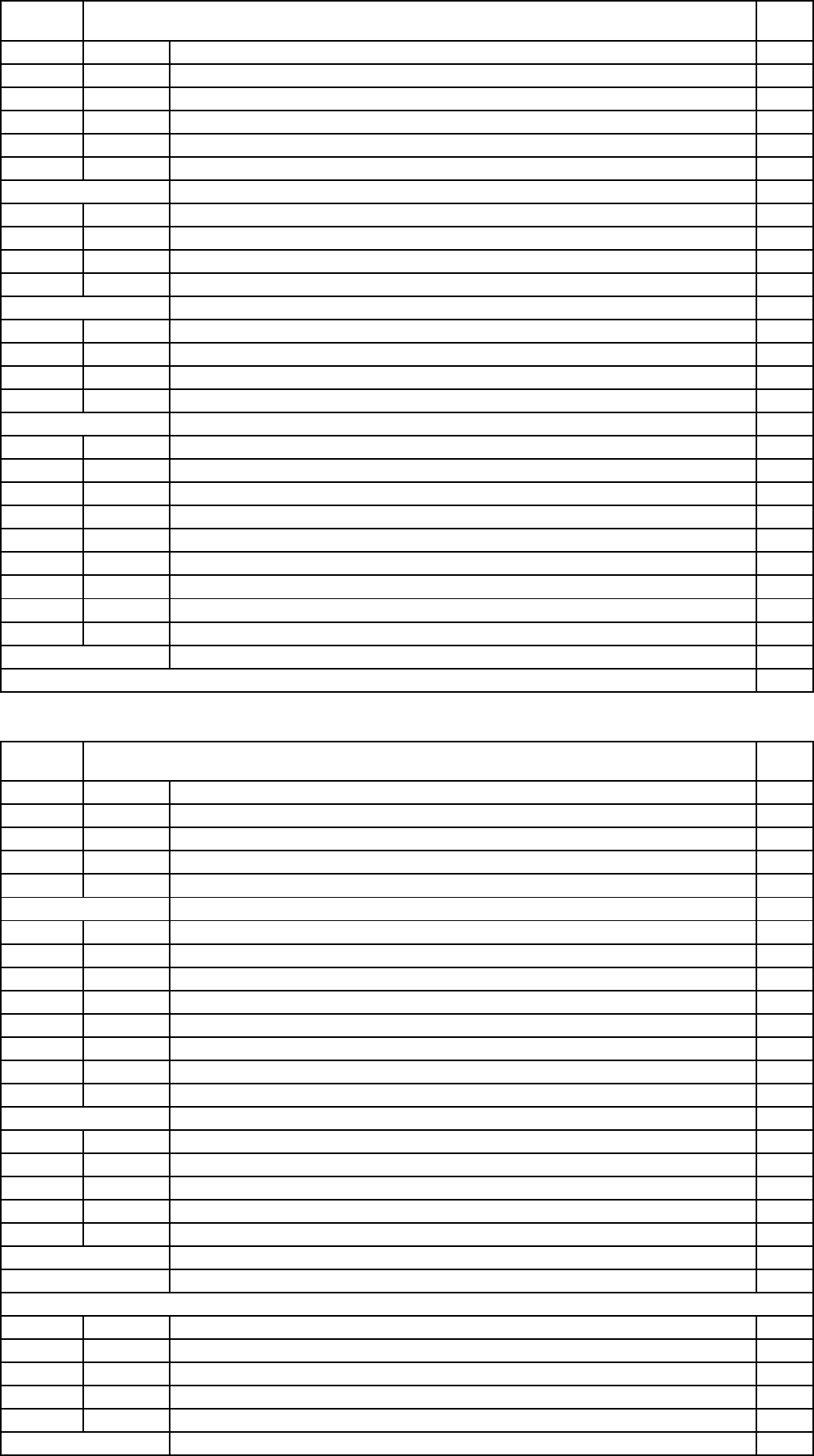
Semester
Credit
Hours
Fall 1 NURS 6013 Advanced Health Assessment 2
NURS 6014 Advanced Health Assessment Lab 1
NURS 6805 Advanced Health Assessment Applications for Nurse-Midwifery 1
NURS 6810 Gynecologic, Reproductive and Sexual Health for Nurse Midwifery 3
NURS 6811
Reproductive Anatomy and Physiology 2
NURS 6812 Evolution of Midwifery in America 2
Semester Total 11
Spring 1 NURS 6030 Advanced Practice Nursing in Primary Care of the Adult 3
NURS 6545 Practicum in Primary Health Care of the Adult 2
NURS 6821 Antepartal Care for Nurse-Midwifery 3
NURS 6815
Nurse-Midwifery Practiculum I 2
Semester Total 10
Summer 1 NURS 6831 Skills for Nurse-Midwifery 1
NURS 6835
Practicum in Intrapartum, Postpartum and Newborn Nurse-Midwifery Care 4
NURS 6836 Intrapartum Care for Nurse-Midwifery 3
NURS 6838 Postpartum and Neonatal Care for Nurse-Midwifery 2
Semester Total
10
Fall 2 NURS 6841 Nurse-Midwifery Role Synthesis, Exploration, and Analysis 2
NURS 6895 Advanced Clinical Integration Experience for Nurse-Midwifery 5
Semester Total
7
Spring 2 NURS 6036 Advanced Practice Nursing in Primary Care of the Child and Adolescent 3
NURS 6510 Essential Procedures for the Family Nurse Practitioner 1
NURS 6521
The Context of Primary Care: FNP Domains and Core Comp for Practice 1
NURS 6532 Advanced Practice Nursing in Primary Care of the Older Adult 1
NURS 6555 Practicum in Primary Health Care of the Family 2
NURS 6585 FNP Preceptorship 4
Semester Total 12
50
Semester
Credit
Hours
Summer 1 NURS 8216 Professionalism, Legal, Ethics 2
NURS 8226 Advanced Quality Improvement & Safety 2
NURS 8236 Advanced Evidence-Based Practice 2
NURS 8238 Advanced Informatics 1
NURS 8246 Advanced Population Health/Epi 2
Semester Total 9
Fall 1 NURS 6013 Advanced Health Assessment 2
NURS 6014 Advanced Health Assessment Lab 1
NURS 6805 Advanced Health Assessment Applications for Nurse-Midwifery 1
NURS 6810 Gynecologic, Reproductive and Sexual Health for Nurse Midwifery 3
NURS 6811 Reproductive Anatomy and Physiology 2
NURS 6812 Evolution of Midwifery in America 2
NURS 8240 Economics and Finance 1
NURS 8101 Integrative Application of Evidence-Based Practice 1
Semester Total 13
Spring 1 NURS 6030 Advanced Practice Nursing in Primary Care of the Adult 3
NURS 6545 Practicum in Primary Health Care of the Adult 2
NURS 6821 Antepartal Care for Nurse-Midwifery 3
NURS 6815 Nurse-Midwifery Practiculum I 2
NURS 8102 Integrative Application of Evidence-Based Practice 2
Semester Total 12
Year 1 Total 34
Summer 2 NURS 6831 Skills for Nurse-Midwifery 1
NURS 6835 Practicum in Intrapartum, Postpartum and Newborn Nurse-Midwifery Care 4
NURS 6836 Intrapartum Care for Nurse-Midwifery 3
NURS 6838 Postpartum and Neonatal Care for Nurse-Midwifery 2
NURS 8103 Integrative Application of Evidence-Based Practice 1
Semester Total 11
NM/FNP Dual: MN + PMC Curriculum (Note: Fall Start)
NM/FNP Dual: MN to DNP + PMC Curriculum Plan (Note: Summer Start)
Course Number and Name
Course Number and Name
TOTAL
132
VUSN MSN, POST-MASTER’S CERTIFICATE, and DNP Student Handbook 2023-2024
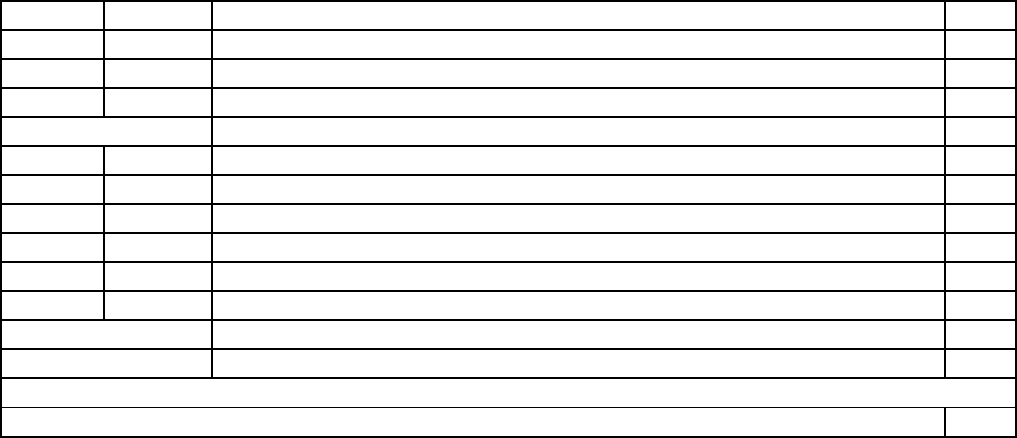
Fall 2 NURS 6895 Advanced Clinical Integration Experience for Nurse-Midwifery 5
NURS 6841 Nurse-Midwifery Role Synthesis, Exploration, and Analysis 2
NURS 8248 Advanced Health Policy 2
NURS 8250
Advanced Leadership 2
Semester Total 11
Spring 2 NURS 6036 Advanced Practice Nursing in Primary Care of the Child and Adolescent 3
NURS 6510
Essential Procedures for the Family Nurse Practitioner 1
NURS 6521 The Context of Primary Care: FNP Domains and Core Comp for Practice 1
NURS 6532 Advanced Practice Nursing in Primary Care of the Older Adult 1
NURS 6555
Practicum in Primary Health Care of the Family 2
NURS 6585 FNP Preceptorship 4
Semester Total 12
Year 2 Total
34
68
TOTAL HOURS
133
VUSN MSN, POST-MASTER’S CERTIFICATE, and DNP Student Handbook 2023-2024
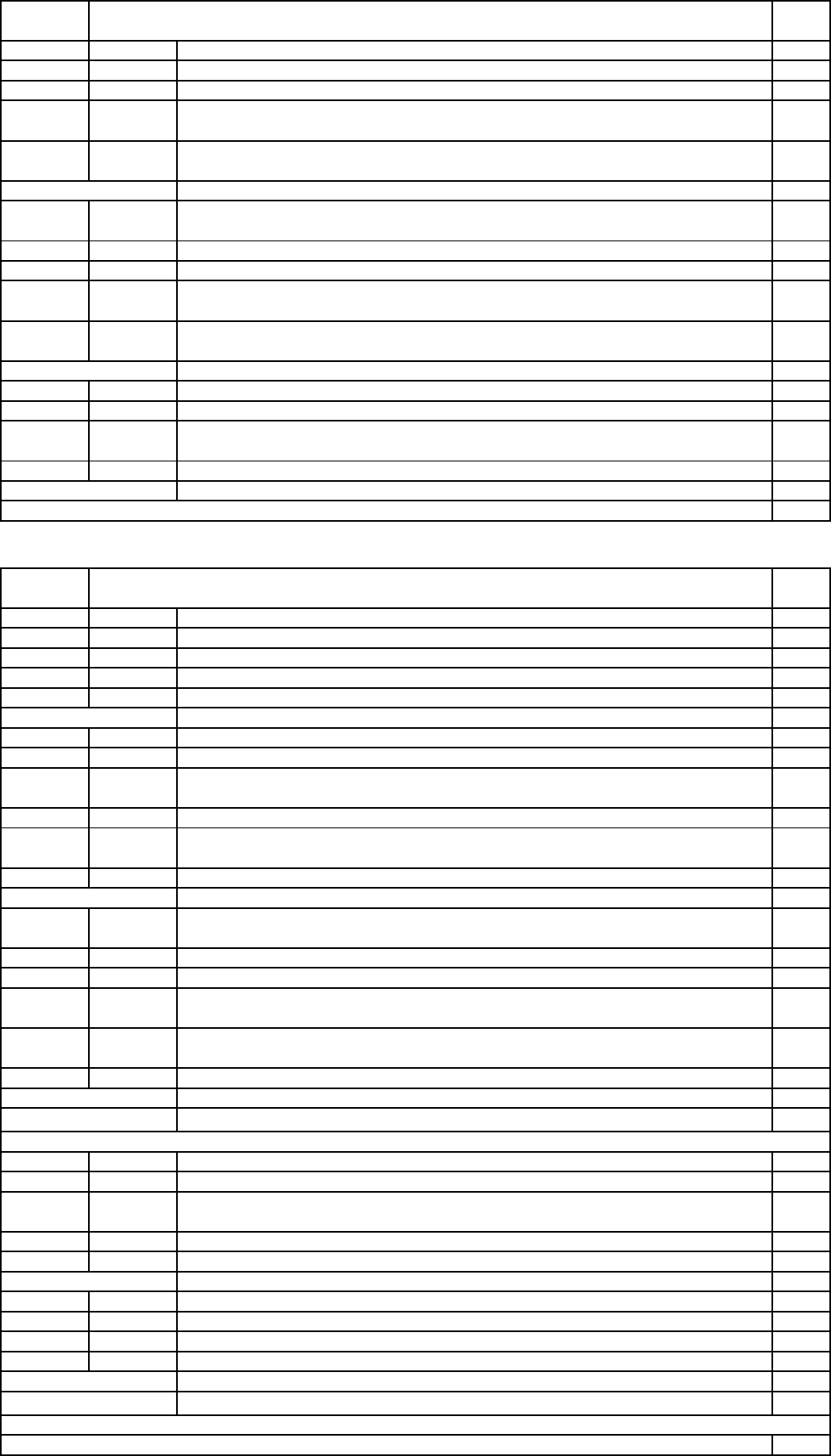
Semester
Credit
Hours
Fall NURS 6013 Advanced Health Assessment 2
NURS 6014 Advanced Health Assessment Lab 1
NURS 7212
Models and Theories of Psychiatric Mental Health Nursing 2
NURS 7214
Diagnostic Reasoning for the Psychiatric Mental Health Nurse Practitioner (Part I)
2
NURS 7205
Advanced Health Assessment Applications for the Psychiatric-Mental Health Nurse
Practitioner
1
Semester Total
8
Spring
NURS 7215
Theoretical Foundations and Practicum for Psychiatric-Mental Health Nursing Across the
Lifespan
1
NURS 7221 Neuroscience for Mental Health Practitioners 3
NURS 7222 Psychopharmacology 2
NURS 7224
Diagnostic Reasoning for the Psychiatric Mental Health Nurse Practitioner (Part II) 1
NURS 7225
Practicum in Psychiatric-Mental Health Nursing with Individuals, Groups and Families 3
Semester Total 10
Summer NURS 7231 Population-Based Mental Health Care Across the Lifespan 2
NURS 7232 Advanced Psychopharmacology 2
NURS 7294
Diagnostic Reasoning for the Psychiatric Mental Health Nurse Practitioner (Part III)
1
NURS 7295 Psychiatric-Mental Health Nurse Practitioner Preceptorship 3
Semester Total 8
26
Semester
Credit
Hours
Summer 1
NURS 8216
Professionalism, Legal, Ethics 2
NURS 8226
Advanced Quality Improvement & Safety 2
NURS 8236
Advanced Evidence-Based Practice 2
NURS 8238
Advanced Informatics 1
NURS 8246
Advanced Population Health/Epi 2
Semester Total 9
Fall 1
NURS 6013 Advanced Health Assessment 2
NURS 6014 Advanced Health Assessment Lab 1
NURS 7205
Advanced Health Assessment Applications for the Psychiatric-Mental Health Nurse
Practitioner
1
NURS 7212 Models and Theories of Psychiatric Mental Health Nursing 2
NURS 7214
Diagnostic Reasoning for the Psychiatric Mental Health Nurse Practitioner (Part I) 2
NURS 8101
Integrative Application of Evidence-Based Practice 1
Semester Total 9
Spring 1 NURS 7215
Theoretical Foundations and Practicum for Psychiatric-Mental Health Nursing Across the
Lifespan
1
NURS 7221 Neuroscience for Mental Health Practitioners 3
NURS 7222 Psychopharmacology 2
NURS 7224
Diagnostic Reasoning for the Psychiatric Mental Health Nurse Practitioner (Part II) 1
NURS 7225
Practicum in Psychiatric-Mental Health Nursing with Individuals, Groups and Families 3
NURS 8102
Integrative Application of Evidence-Based Practice 2
Semester Total 12
Year 1 Total 30
Summer 2 NURS 7231 Population-Based Mental Health Care Across the Lifespan 2
NURS 7232 Advanced Psychopharmacology 2
NURS 7294
Diagnostic Reasoning for the Psychiatric Mental Health Nurse Practitioner (Part III) 1
NURS 7295 Psychiatric-Mental Health Nurse Practitioner Preceptorship 3
NURS 8103
Integrative Application of Evidence-Based Practice 1
Semester Total 9
Fall 2
TBD
Clinical course (specialty or TBD) 2
NURS 8240 Economics and Finance 1
NURS 8248
Advanced Health Policy 2
NURS 8250
Advanced Leadership 2
Semester Total 7
Year 2 Total 16
46
PMHNP: MN + PMC Curriculum Plan (Note: Fall Start)
TOTAL HOURS
Course Number and Name
TOTAL HOURS
PMHNP: MN to DNP + PMC Curriculum Plan (Note: Summer Start)
Course Number and Name
134
VUSN MSN, POST-MASTER’S CERTIFICATE, and DNP Student Handbook 2023-2024
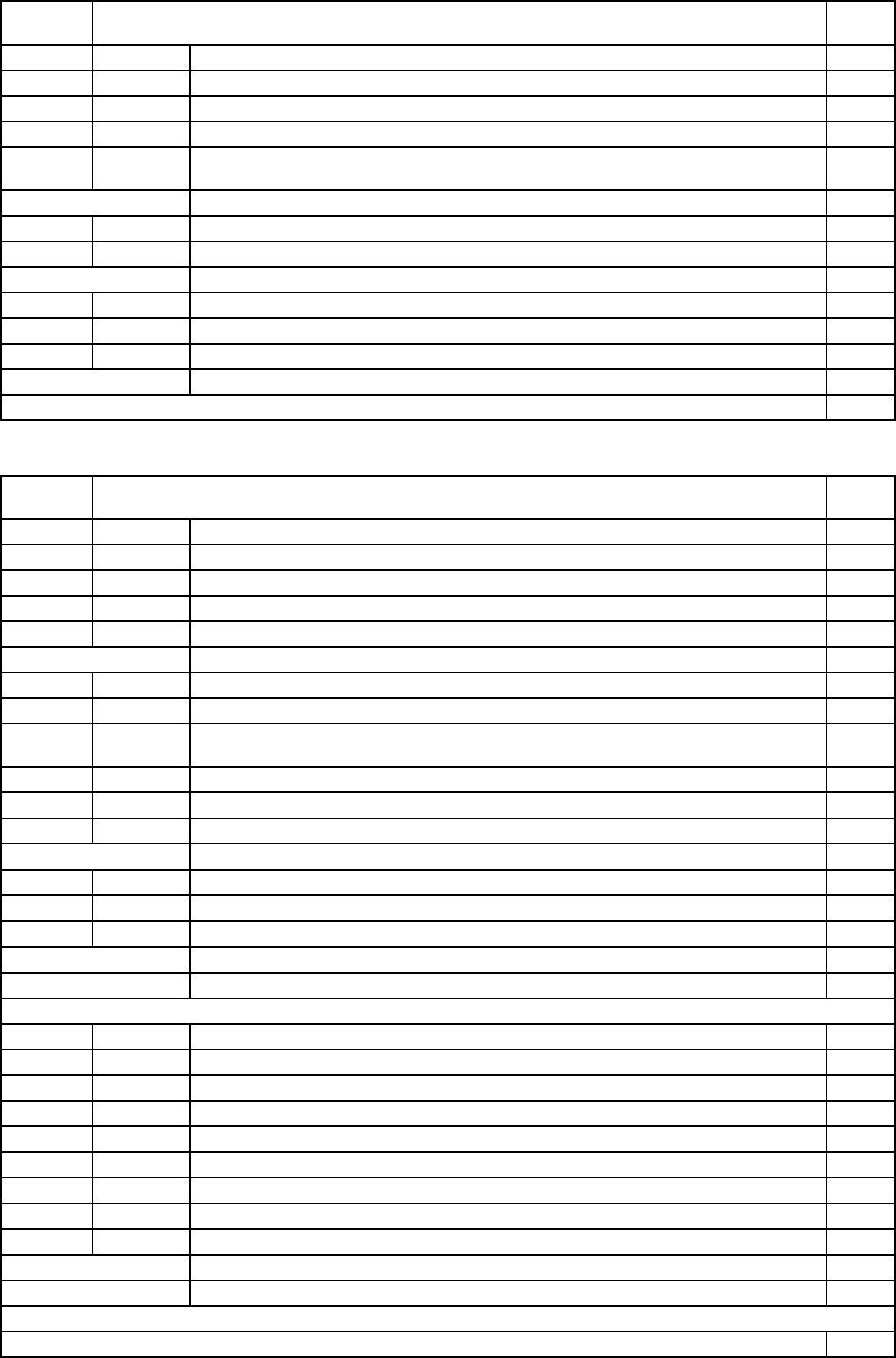
Semester
Credit
Hours
Fall NURS 6013 Advanced Health Assessment 2
NURS 6014 Advanced Health Assessment Lab 1
NURS 7011
Health Promotion of Behavior Development: Birth through Adolescence 3
NURS 7012
Advanced Practice Nursing in Pediatric Primary Care, Part I 3
NURS 7015
Advanced Health Assessment Applications for the Primary Care Pediatric Nurse
Practitioner
1
Semester Total 10
Spring NURS 7021 Advanced Practice Nursing in Pediatric Primary Care, Part II 3
NURS 7035
Practicum in Primary Health Care of Children 4
Semester Total 7
Summer NURS 6075 Professional Formation 4: Transition to Advanced Nursing Practice 1
NURS 7032
Current Issues in the Delivery of Advanced Pediatric Care 2
NURS 7085
Advanced Pediatric Primary Care Preceptorship 5
Semester Total 8
25
Semester
Credit
Hours
Summer 1 NURS 8216 Professionalism, Legal, Ethics 2
NURS 8226 Advanced Quality Improvement & Safety 2
NURS 8236
Advanced Evidence-Based Practice 2
NURS 8238 Advanced Informatics 1
NURS 8246 Advanced Population Health/Epi 2
Semester Total 9
Fall 1 NURS 6013 Advanced Health Assessment 2
NURS 6014 Advanced Health Assessment Lab 1
NURS 7015
Advanced Health Assessment Applications for the Primary Care Pediatric Nurse
Practitioner
1
NURS 7011
Health Promotion of Behavior Development: Birth through Adolescence 3
NURS 7012
Advanced Practice Nursing in Pediatric Primary Care, Part I
3
NURS 8101 Integrative Application of Evidence-Based Practice 1
Semester Total 11
Spring 1 NURS 7021 Advanced Practice Nursing in Pediatric Primary Care, Part II 3
NURS 7035
Practicum in Primary Health Care of Children 4
NURS 8102 Integrative Application of Evidence-Based Practice 2
Semester Total 9
Year 1 Total 29
Summer 2 NURS 6075 Professional Formation 4: Transition to Advanced Nursing Practice 1
NURS 7032
Current Issues in the Delivery of Advanced Pediatric Care 2
NURS 7085
Advanced Pediatric Primary Care Preceptorship 5
NURS 8103 Integrative Application of Evidence-Based Practice 1
Semester Total 9
Fall 2
TBD Clinical course (specialty or TBD) 2
NURS 8240 Economics and Finance 1
NURS 8248 Advanced Health Policy 2
NURS 8250 Advanced Leadership 2
Semester Total 7
Year 2 Total 16
45
TOTAL HOURS
TOTAL HOURS
PNP-PC: MN + PMC Curriculum Plan (Note: Fall Start)
PNP-PC: MN to DNP + PMC Curriculum Plan (Note: Summer Start)
Course Number and Name
Course Number and Name
135
VUSN MSN, POST-MASTER’S CERTIFICATE, and DNP Student Handbook 2023-2024
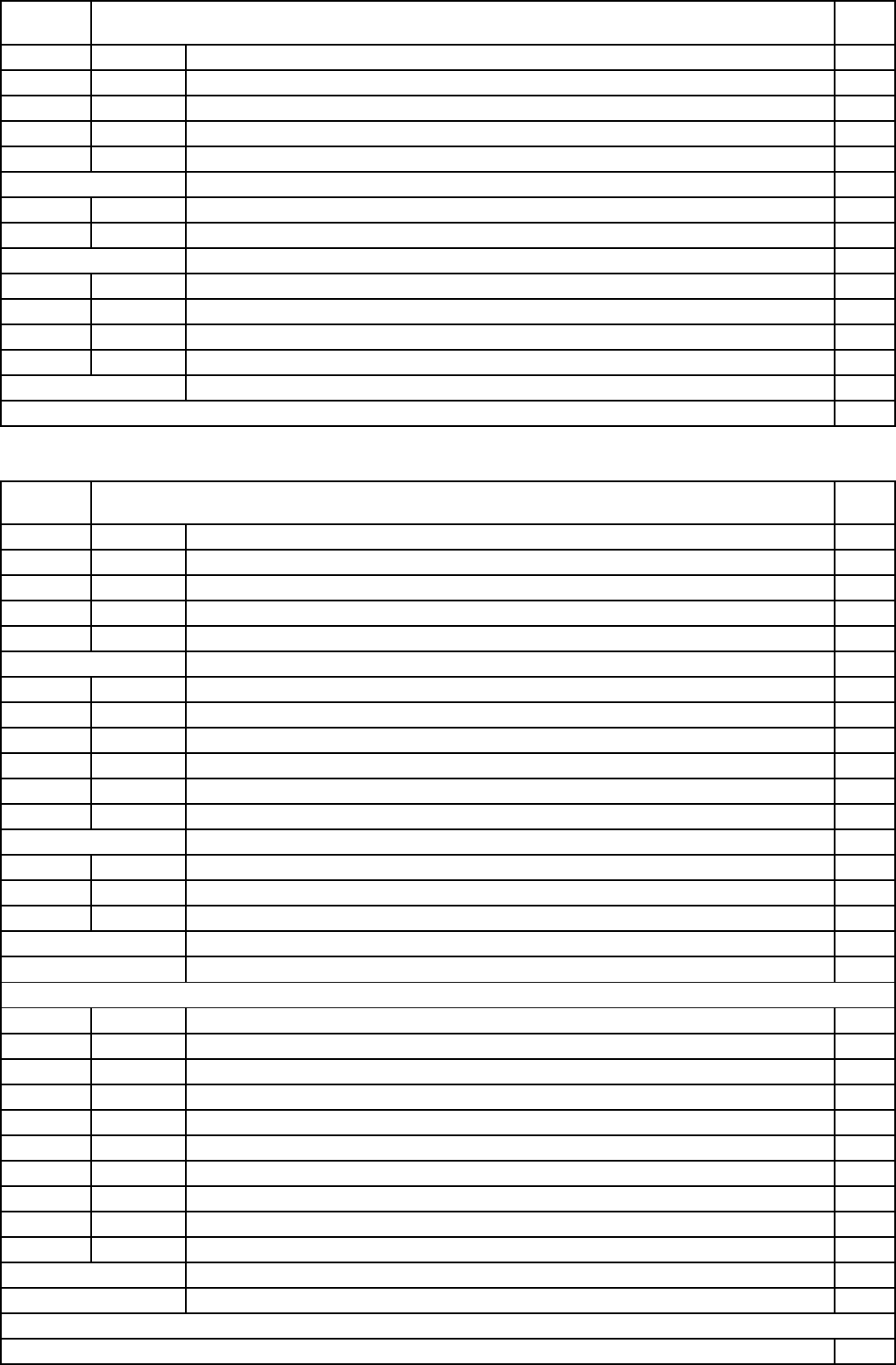
Semester
Credit
Hours
Fall NURS 6013 Advanced Health Assessment 2
NURS 6014 Advanced Health Assessment Lab 1
NURS 6034 Adult Gerontology Primary Care I 3
NURS 7305 Advanced Health Assessment Applications for the WHGRNP 1
NURS 7310
Women's & Gender-Related Health for Advanced Practice Nursing I 3
Semester Total 10
Spring NURS 7315 Practicum in Women's & Gender-Related Health 4
NURS 7320
Women's & Gender-Related Health for Advanced Practice Nursing II 3
Semester Total 7
Summer NURS 6075 Professional Formation 4: Transition to Advanced Nursing Practice 1
NURS 6031
Advanced Practice Nursing in Primary Care of the Adolescent 1
NURS 7330 Women's & Gender-Related Health Issues 1
NURS 7395 Preceptorship in Women's & Gender-Related Health 5
Semester Total
8
25
Semester
Credit
Hours
Summer 1
NURS 8216 Professionalism, Legal, Ethics
2
NURS 8226 Advanced Quality Improvement & Safety
2
NURS 8236 Advanced Evidence-Based Practice
2
NURS 8238 Advanced Informatics
1
NURS 8246 Advanced Population Health/Epi
2
Semester Total
9
Fall 1
NURS 6013 Advanced Health Assessment
2
NURS 6014 Advanced Health Assessment Lab
1
NURS 7305 Advanced Health Assessment Applications for the WHGRNP 1
NURS 6034 Adult Gerontology Primary Care I 3
NURS 7310 Women's & Gender-Related Health for Advanced Practice Nursing I 3
NURS 8101 Integrative Application of Evidence-Based Practice
1
Semester Total
11
Spring 1
NURS 7320 Women's & Gender-Related Health for Advanced Practice Nursing II 3
NURS 7315 Practicum in Women's & Gender-Related Health 4
NURS 8102 Integrative Application of Evidence-Based Practice
2
Semester Total
9
Year 1 Total
29
Summer 2
NURS 6075 Professional Formation 4: Transition to Advanced Nursing Practice
1
NURS 6031 Advanced Practice Nursing in Primary Care of the Adolescent 1
NURS 7330 Women's & Gender-Related Health Issues 1
NURS 7395 Preceptorship in Women's & Gender-Related Health 5
NURS 8103 Integrative Application of Evidence-Based Practice
1
Semester Total
9
Fall 2
TBD Clinical course (specialty or TBD)
2
NURS 8240 Economics and Finance
1
NURS 8248 Advanced Health Policy
2
NURS 8250 Advanced Leadership
2
Semester Total
7
Year 2 Total
16
45
TOTAL HOURS
TOTAL HOURS
WHGRNP: MN to DNP + PMC Curriculum Plan (Note: Summer Start)
Course Number and Name
WHGRNP: MN + PMC Curriculum Plan (Note: Fall Start)
Course Number and Name
136
VUSN MSN, POST-MASTER’S CERTIFICATE, and DNP Student Handbook 2023-2024

VUSN: Master of Science in Nursing (MSN) Program
ENTRY INTO MSN PROGRAM
Students enter the VUSN Master’s Degree program in one of the following categories:
MSN PreSpecialty
Students with an undergraduate or graduate degree in a field other than nursing may complete
the MSN program in six semesters of full-time study: three semesters of upper division
generalist PreSpecialty nursing courses to meet the AACN Baccalaureate Essentials (that do
not end in a BSN-equivalent degree but move to the specialist level of the MSN program) and
three semesters of the specialty master's component to meet the AACN Master’s Essentials.*
BSN to MSN
Students with a BSN degree can complete the MSN degree in three semesters of full-time study.
*They enter directly into the specialty master’s component of the MSN program. The MSN
degree is granted based on completion of a minimum of 36 credit hours.
*Some master’s specialties are longer than three semesters
TRANSITIONAL OBJECTIVES
On completion of the MSN PreSpecialty generalist courses, students will be able to:
• Synthesize knowledge from nursing, the humanities, biophysical and social sciences, and
current evidence to engage in professional nursing practice.
• Promote health and prevent illness in diverse patient populations through targeted
education in multiple settings across transitions of care.
• Provide safe, culturally responsive health care to individuals, families, communities, and
populations in diverse settings, through use of critical thinking, clinical reasoning, ethical
decision-making, and information management, both independently and in collaboration
with health care teams.
• Demonstrate leadership in professional nursing practice through commitment to reflective
practice, accountability for nursing actions, patient advocacy, and evidence-based
practice.
• Engage in improvement of the health care delivery system through inquiry and action into
socioeconomic, political, legal, and ethical issues affecting professional nursing practice.
137
VUSN MSN, POST-MASTER’S CERTIFICATE, and DNP Student Handbook 2023-2024

MSN PROGRAM GOALS
MSN Specialty Level program prepares students:
• For advanced practice roles including nurse-midwives, nurse practitioners, nurse
informaticists, and nurse leaders who have expertise and advanced knowledge in a
specialty area and can function in complex situations either independently and/or
collaboratively with health care teams;
• To evaluate and apply advanced knowledge by means of critical thinking, clinical
reasoning, ethical principles, and the use of current and emerging technologies in relation
to advanced nursing practice;
• To engage in quality improvement initiatives and the delivery of safe, culturally responsive,
high quality nursing care of individuals and populations using leadership skills;
• To evaluate and/or advocate for policies that improve the health of the public and the
profession of nursing incorporating ethical principles.
All students are expected to meet the above program goals whether they enter the MSN
program with a BSN, an ASN, or a bachelor’s degree other than nursing. Students who must
complete a PreSpecialty component of the program must also meet transitional objectives upon
completion of the PreSpecialty nursing courses.
Dual MSN/MTS, MSN/MDiv Programs
The Master of Science in Nursing/Master of Theological Studies (MSN/MTS) and Master of
Science in Nursing/Master of Divinity (MSN/MDiv) are dual degrees that provide the potential to
attract outstanding students to two schools and will benefit both schools, encouraging
interdisciplinary work and intra-school collaboration.
Post-Master’s Certificate
The purpose of the Post-Master’s Certificate (PMC) program is to provide, for nurses who
already hold a master’s degree in nursing, an educational route to specialization in an area other
than that obtained in their master’s program. The program is designed to strengthen or broaden
the clinical capabilities of master’s-prepared nurses who are planning a role expansion or role
change. Students who complete a post-master’s certificate are expected to master the same
specialty outcome criteria as students in a MSN advanced nursing practice specialty.
Post-master’s certificate students must successfully complete all didactic and clinical
requirements of the desired area of practice. To obtain a PMC in a nurse practitioner specialty,
students are required to complete a minimum of 500 supervised hours in direct patient care.
The program of study includes academic and clinical courses, and completion results in
awarding a certificate of academic achievement of post-master’s study. Students do not
complete a second MSN, but only the necessary courses to earn the PMC in the new specialty
area. Completion of the requirements for the PMC is posted on the student’s official Vanderbilt
University transcript. Students who complete a PMC are not awarded a Vanderbilt University
School of Nursing pin—the pin is presented only to students who complete the MSN.
138
VUSN MSN, POST-MASTER’S CERTIFICATE, and DNP Student Handbook 2023-2024

The Post-Mas
ter’s Certificate Nursing Program goals/objectives are to prepare:
• For advanced practice roles including nurse-midwives, nurse practitioners, nurse
informaticists, and nurse leaders who have expertise and advanced knowledge in a
specialty area and can function in complex situations either independently and/or
collaboratively with health care teams;
• To evaluate and apply advanced knowledge by means of critical thinking, clinical
reasoning, ethical principles, and the use of current and emerging technologies in relation
to advanced nursing practice.
Program of Studies for Post-Master's Certificates
Advanced Practice Nursing Clinical Specialties
The specialty director develops an individualized program of studies for a PMC student based
on an evaluation of the student’s prior academic work and a gap analysis of
courses/experiences needed to qualify for advanced practice certification in the student’s
selected specialty. The student’s program of study will contain didactic and clinical experiences
that will allow the student to master essential competencies and meet eligibility criteria for
testing for national certification in the new population focused area of practice. Each student’s
record contains documentation of credit granted for prior didactic and clinical experiences
through a gap analysis. The transcript for a PMC APRN graduate shows educational preparation
for the role and at least one (1) population focus. Completion of the APRN clinical core courses
(advanced physiology/pathophysiology, advanced health assessment, and advanced
pharmacology) is required. A student may receive credit for APRN clinical core courses that
were successfully completed as part of their original Master's degree if, following faculty review
of submitted course syllabi, those courses are deemed equivalent to APRN clinical core courses
required as part of their certificate program. Documentation of previous completion of
equivalent APRN clinical core courses or the need to complete the clinical core courses must be
listed on the gap analysis. No transfer credit is awarded; all required courses listed on the gap
analysis must be taken at VUSN. Twelve credit hours is the usual minimum number of course
credits required for a PMC; however, total hours required for the certificate depend upon the gap
analysis.
Nursing Info
rmatics and Nursing Education
There is a pre-determined PMC plan of study for each specialty. The program of study contains
specialty-specific didactic and experiential learning. Completion of APRN clinical core courses
is not required. No transfer credit is awarded; all required courses must be taken at VUSN.
Twelve credit hours is the minimum number of course credits required for a PMC.
Area of Specialty
Specialties
Specialty Director
Adult-Gerontology Acute Care Nurse Practitioner
Dr. Sharon Bryant
Adult-Gerontology Primary Care Nurse Practitioner
Dr. Leslie Hopkins
Emergency Nurse Practitioner
Dr. Jennifer Wilbeck
139
VUSN MSN, POST-MASTER’S CERTIFICATE, and DNP Student Handbook 2023-2024
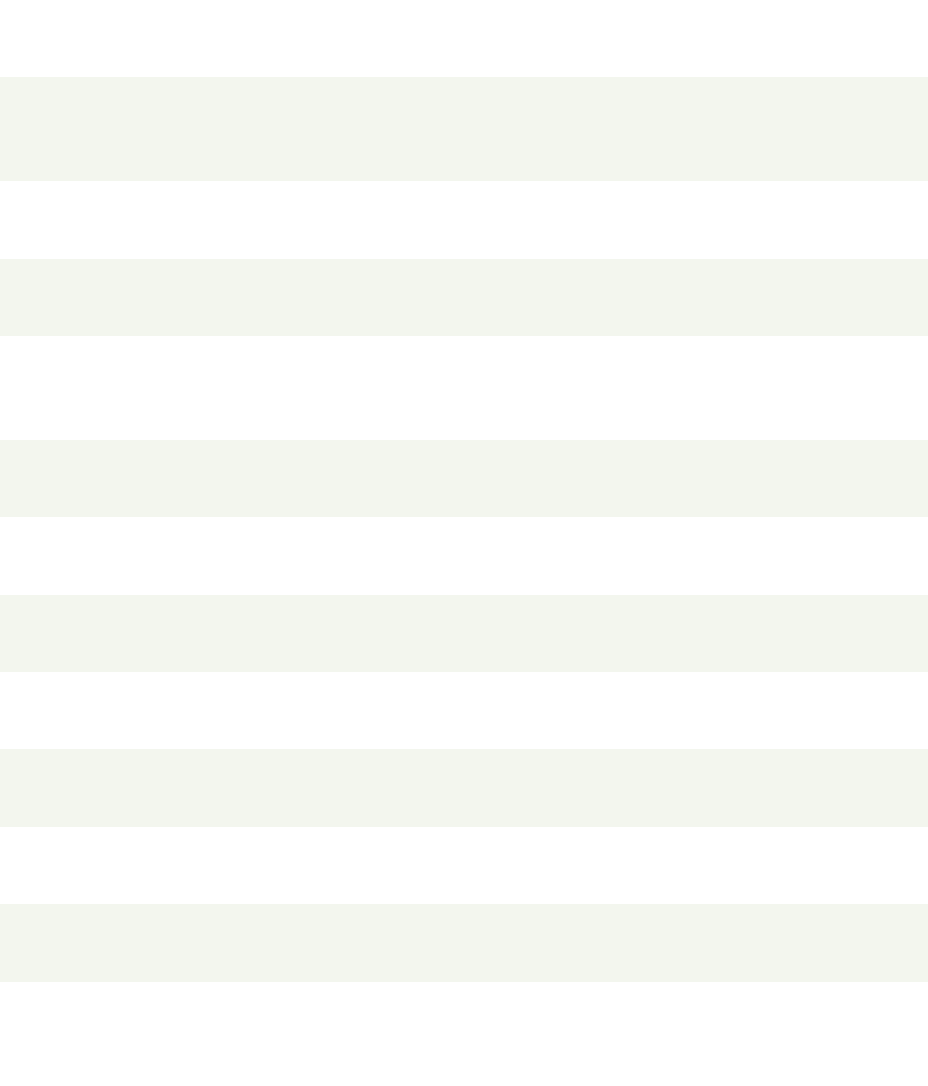
Family Nurse Practitioner
Dr. Julia Steed
Family/Emergency Practitioner
Dr. Jennifer Wilbeck &
Dr. Julia Steed
Neonatal Nurse Practitioner
Dr. Colleen Moss
Nurse-Midwifery
Dr. Kendra Faucett
Nurse-Midwifery/Family Nurse Practitioner – Dual Focus
Dr. Kendra Faucett
& Dr. Julia Steed
Nursing and Health Care Leadership
Dr. Debbie Arnow
Nursing Education
Dr. Betsy Kennedy
Nursing Informatics
Dr. Patty Sengstack
Pediatric Nurse Practitioner - Acute Care
Dr. Kim Steanson
Pediatric Nurse Practitioner - Primary Care
Dr. Brittany Nelson
Psychiatric Mental Health Nurse Practitioner (Lifespan)
Dr. Megan Simmons
Women’s Health/Gender-Related Nurse Practitioner
Dr. Ginny Moore
Women’s Health/Adult-Gerontology Primary Care Nurse
Practitioner – Dual Focus
Dr. Ginny Moore & Dr.
Leslie Hopkins
140
VUSN MSN, POST-MASTER’S CERTIFICATE, and DNP Student Handbook 2023-2024
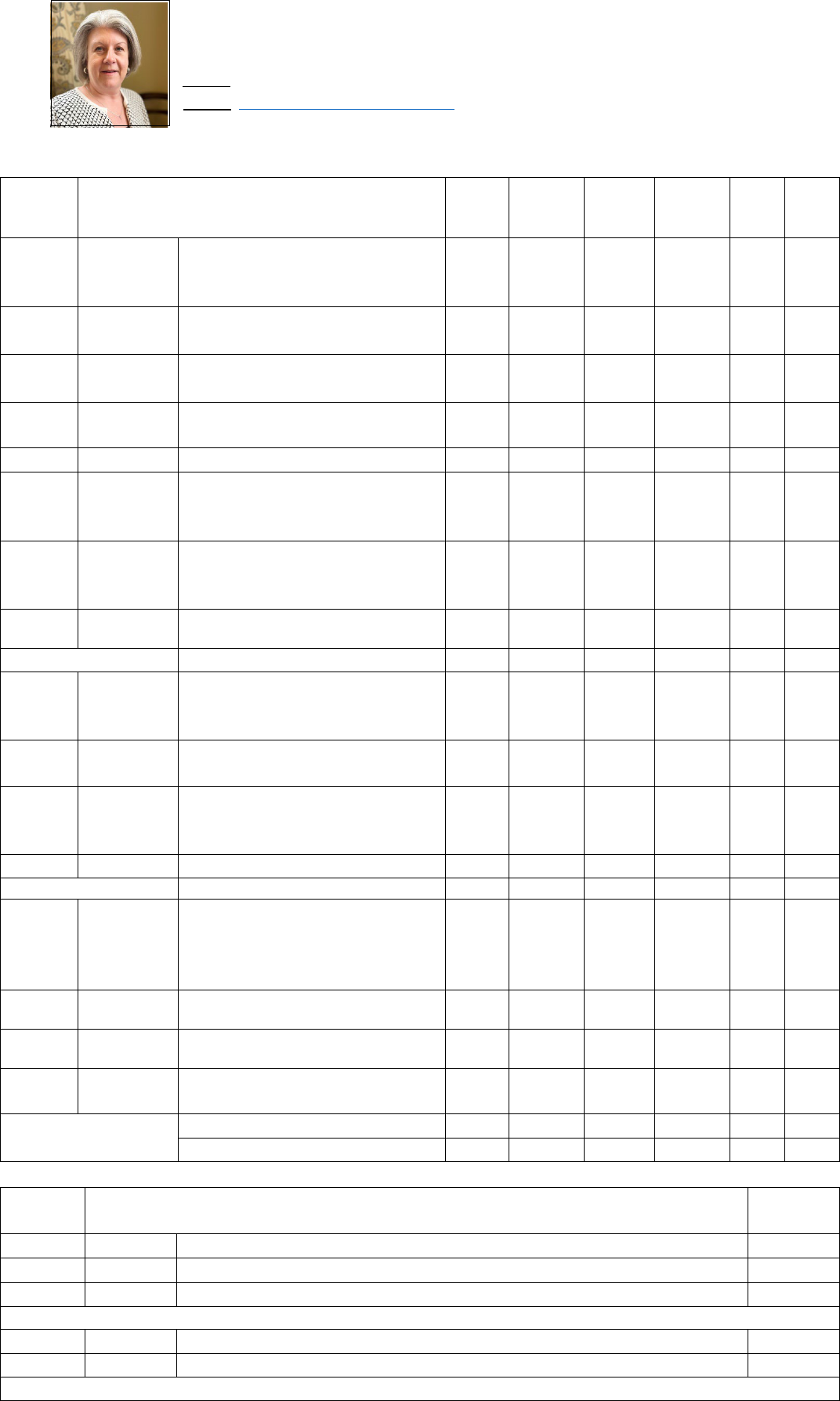
ADULT-GERONTOLOGY ACUTE CARE NURSE PRACTITIONER (AGACNP)
Sharon Bryant, DNP, ACNP-BC
Director, Adult-Gero Acute Care NP Specialty
309 Godchaux Hall
Phone: 615.936.5161
E-mail: sharon.bryant@vanderbilt.edu
Adult-Gerontol
ogy Acute Care Nurse Practitioner Curriculum Plan and Required Hours
Semester Course Number and Name
Credit
Hours
Didactic
Clock
Hours
Seminar
Clock
Hours
Clinical
Clock
Hours
Lab
Clock
Hours
Total
Clock
Hours
Fall
NURS 6045
Professional Formation I: Roles and
Contexts for Advanced Nursing
Practice
1
14
14
NURS 6013
Advanced Health Assessment
2
28
28
NURS 6014
Advanced Health Assessment Lab
1
28
28
NURS 6022
Advanced Physiology/Pathophysiology
4
56
56
NURS 6024
Advanced Pharmacology
3
42
42
NURS 6105
Advanced Clinical Reasoning for the
Adult- Gerontology ACNP
1
70
70
NURS 6110
Advanced Diagnostic and Therapeutic
Procedures in Acute and Critical Care
1
28
28
NURS 6114
Collaborative Management in Adult-
Gerontology Acute Care I
3
42
42
Semester Total
16
182
0
70
56
308
Spring
NURS 6055
Professional Formation II: Evidence
Based Change in Healthcare
Environments
3
42
42
NURS 6115
Adult-Gerontology Acute Care Nurse
Practitioner Practicum
4
280
280
NURS 6124
Collaborative Management in Adult-
Gerontology Acute Care II
3
42
42
Elective
Elective (2 hours required for degree)
2
28
28
Semester Total
12
112
0
280
0
392
Summer
NURS 6065
Professional Formation III: Leading
Collaborative Change: Improving
Delivery of Healthcare to Patients and
Populations
4
56
56
NURS 6075
Professional Formation IV: Transition
to Advanced Nursing Practice
1
14
14
NURS 6134
Collaborative Management in Adult-
Gerontology Acute Care III
3
42
42
NURS 6195
Adult-Gerontology ACNP Preceptorship
4
280
280
Semester Total
12
112
0
280
0
392
Program Total
40
406
0
630
56
1092
Adult-Gerontology Acute Care Nurse Practitioner 2-Year, Part-Time Curriculum Plan
Semester Course Number and Name
Credit
Hours
Fall 1
NURS 6013
Advanced Health Assessment
2
NURS 6022
Advanced Physiology/Pathophysiology
4
NURS 6045
Professional Formation I: Roles and Contexts for Advanced Nursing Practice
1
Spring 1
NURS 6055
Professional Formation II: Evidence Based Change in Healthcare Environments
3
Elective
Elective (2 hours required for degree)
2
Master of Science in Nursing (MSN) Program Curriculum Plans
141
VUSN MSN, POST-MASTER’S CERTIFICATE, and DNP Student Handbook 2023-2024
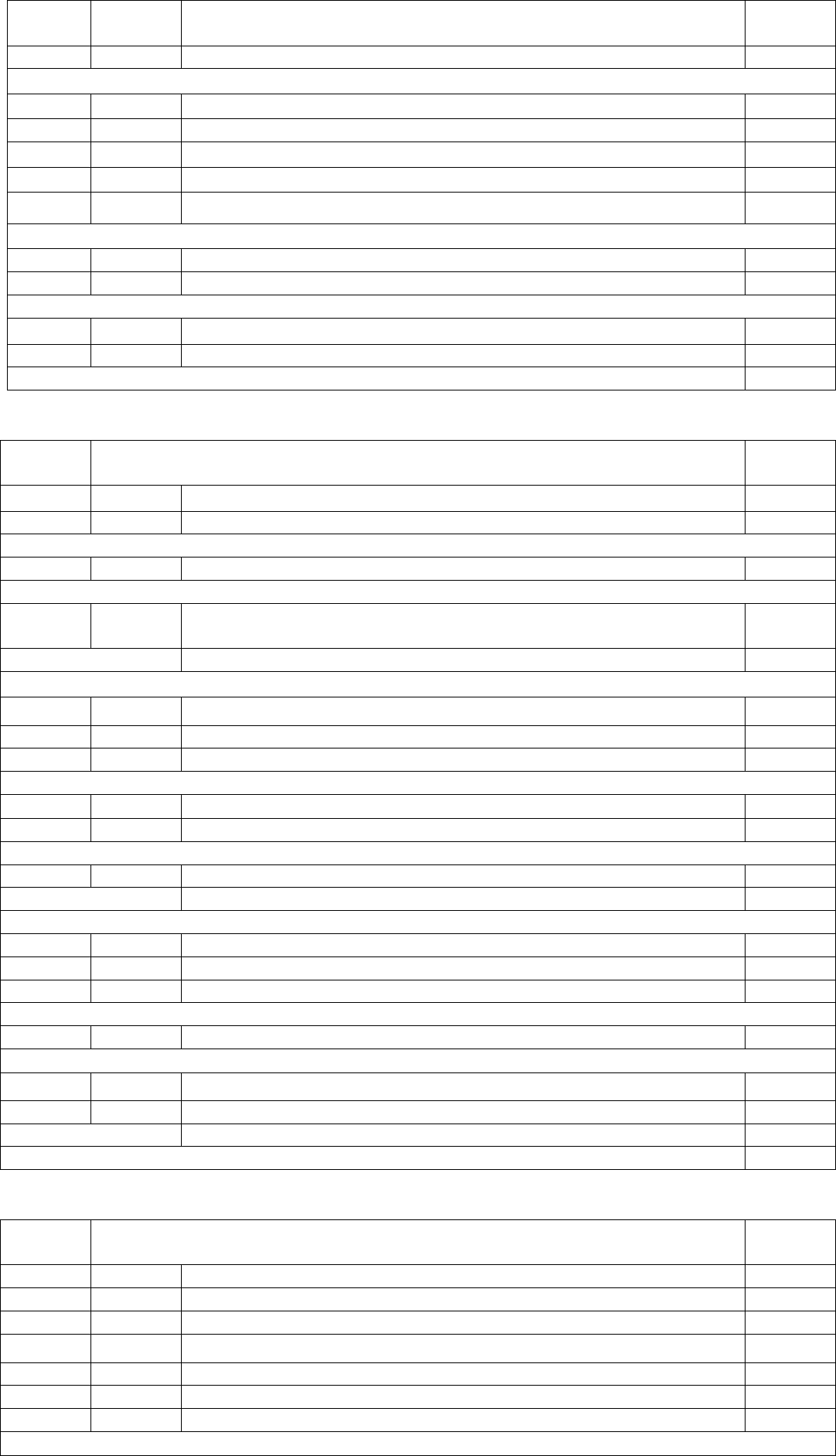
Summer 1
NURS 6065
Professional Formation III: Leading Collaborative Change: Improving Delivery of
Healthcare to Patients and Populations
4
NURS 6075
Professional Formation IV: Transition to Advanced Nursing Practice
1
Fall 2
NURS 6014
Advanced Health Assessment Lab
1
NURS 6024
Advanced Pharmacology
3
NURS 6105
Advanced Clinical Reasoning for the Adult-Gerontology ACNP
1
NURS 6110
Advanced Diagnostic and Therapeutic Procedures in Acute and Critical Care
1
NURS 6114
Collaborative Management in Adult-Gerontology Acute Care I
3
Spring 2
NURS 6115
Adult-Gerontology Acute Care Nurse Practitioner Practicum
4
NURS 6124
Collaborative Management in Adult-Gerontology Acute Care II
3
Summer 2
NURS 6134
Collaborative Management in Adult-Gerontology Acute Care III
3
NURS 6195
Adult-Gerontology Acute Care Nurse Practitioner Preceptorship
4
Total Hours
40
Adult-Gerontology Acute Care Nurse Practitioner 3-Year, Part-Time Curriculum Plan:
VUMC Employees Only
Semester Course Number and Name
Credit
Hours
Fall 1
NURS 6045
Professional Formation I: Roles and Contexts for Advanced Nursing Practice
1
NURS 6022
Advanced Physiology/Pathophysiology
4
Spring 1
NURS 6055
Professional Formation II: Evidence Based Change in Healthcare Environments
3
Summer 1
NURS 6065
Professional Formation III: Leading Collaborative Change: Improving Delivery of
Healthcare to Patients and Populations
4
Year 1 Total
12
Fall 2
NURS 6013
Advanced Health Assessment
2
NURS 6024
Advanced Pharmacology
3
NURS 6114
Collaborative Management in Adult-Gerontology Acute Care I
3
Spring 2
NURS 6124
Collaborative Management in Adult-Gerontology Acute Care II
3
Elective
Elective (2 hours required for degree)
2
Summer 2
NURS 6134
Collaborative Management in Adult-Gerontology Acute Care III
3
Year 2 Total
16
Fall 3
NURS 6014
Advanced Health Assessment Lab
1
NURS 6105
Advanced Clinical Reasoning for the Adult-Gerontology ACNP
1
NURS 6110
Advanced Diagnostic and Therapeutic Procedures in Acute and Critical Care
1
Spring 3
NURS 6115
Adult-Gerontology Acute Care Nurse Practitioner Practicum
4
Summer 3
NURS 6075
Professional Formation IV: Transition to Advanced Nursing Practice
1
NURS 6195
Adult-Gerontology Acute Care Nurse Practitioner Preceptorship
4
Year 3 Total
12
Total Hours
40
Adult-Gerontology Acute Care Nurse Practitioner Post Master’s Certificate: Sample
Full-Time Curriculum Plan **
Semester Course Number and Name
Credit
Hours
Fall
NURS 6013
Advanced Health Assessment
2
NURS 6014
Advanced Health Assessment Lab
1
NURS 6022
Advanced Physiology/Pathophysiology
4
NURS 6024
Advanced Pharmacology
3
NURS 6105
Advanced Clinical Reasoning for the Adult-Gerontology ACNP
1
NURS 6110
Advanced Diagnostic and Therapeutic Procedures in Acute and Critical Care
1
NURS 6114
Collaborative Management in Adult-Gerontology Acute Care I
3
142
VUSN MSN, POST-MASTER’S CERTIFICATE, and DNP Student Handbook 2023-2024
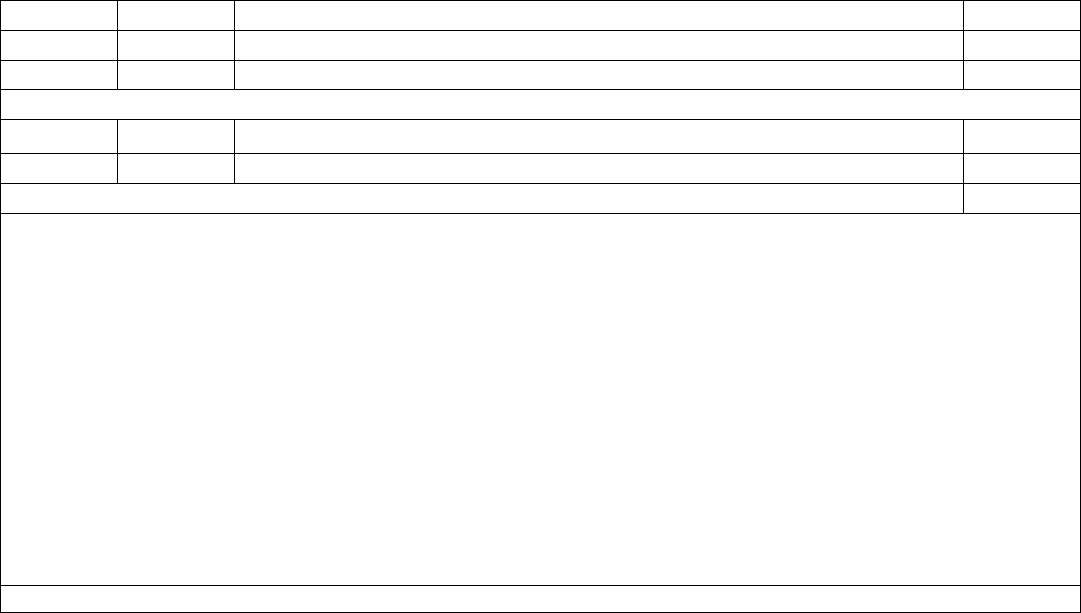
Spring
NURS 6115
Adult-Gerontology Acute Care Nurse Practitioner Practicum
4
NURS 6124
Collaborative Management in Adult-Gerontology Acute Care II
3
Elective
Elective (2 hours required for degree)
2
Summer
NURS 6134
Collaborative Management in Adult-Gerontology Acute Care III
3
NURS 6195
Adult-Gerontology Acute Care Nurse Practitioner Preceptorship
4
Total Hours
31
• Sample only. All admitted post-master’s students will have an individualized curriculum plan based on a gap analysis complete
by the Academic Director of the program. As part of the post-master’s certificate (PMC) application
https://apply.vanderbilt.edu/apply/, all applicants are required to provide syllabi for previous master’s level courses in advanced
health assessment, advanced pathophysiology and advanced pharmacology. Whether or not a PMC student needs to retake one
or all of these courses is determined based on the guidelines below:
a. APRN certified PMC applicants/students who have previously taken an equivalent Advanced Health Assessment, Advanced
Pathophysiology, and Advanced Pharmacology, and have maintained certification (reported on the application), will not be
required to repeat these courses. Course equivalency will be determined by syllabi review.
b. Non-APRN certified PMC applicants/students will be required to take VUSN Advanced Health Assessment, Advanced
Pathophysiology, and Advanced Pharmacology courses unless they satisfy requirements specified in item c.
c. If a non-APRN certified student has previously taken one or more of these three courses in the last 5 years (5 years or less at the
time of matriculation) the student must provide the syllabi to be reviewed for equivalency. If the course is determined to be
equivalent to the VUSN course, was taken within the last 5 years and the grade earned was a B- or higher, the course may be
waived. Note: Determination of equivalency does not mean that VUSN transfer credit has been awarded. Equivalent courses will
not appear on the VU transcript.
** Part-Time (2 Year) Program of Study is available.
143
VUSN MSN, POST-MASTER’S CERTIFICATE, and DNP Student Handbook 2023-2024
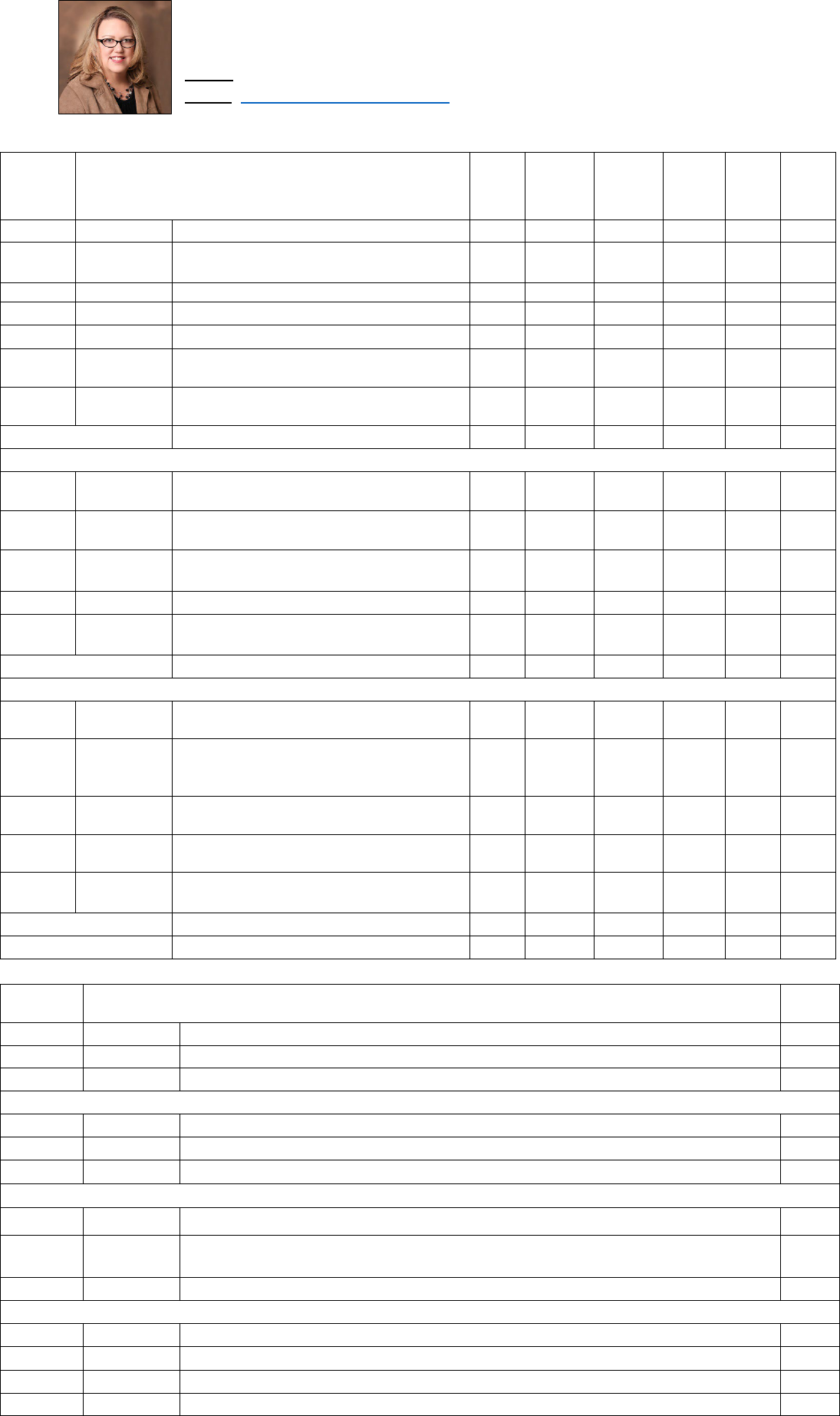
ADULT-GERONTOLOGY PRIMARY CARE NURSE PRACTITIONER (AGPCNP)
Leslie W. Hopkins, DNP, APRN, BC, FNP-BC, ANP-C
Director, Adult-Gerontology Primary Care NP Specialty
384 Frist Hall
Phone: 615.322.3029
E-mail: [email protected]
Adult-Gerontology Primary Care Nurse Practitioner Curriculum Plan and Required Hours
Semester Course Number and Name
Credit
Hours
Didactic
Clock
Hours
Seminar
Clock
Hours
Clinical
Clock
Hours
Lab
Clock
Hours
Total
Clock
Hours
Fall
NURS 6022
Advanced Pathophysiology
4
56
56
NURS 6013
Advanced Health Assessment and Clinical
Reasoning
2
28
28
NURS 6014
Advanced Health Assessment Lab
1
28
28
NURS 6024
Advanced Pharmacotherapeutics
3
42
42
NURS 6034
Adult-Gerontology Primary Care I
3
42
42
NURS 6045
Professional Formation I: Roles and Contexts
for Advanced Nursing Practice
1
14
14
NURS 6205
Advanced Health Assessment Apps. for
Adult-Gerontology Primary Care NP
1
28
28
Semester Total
15
182
0
0
56
238
Spring
NURS 6032
Advanced Practice Primary Care Nursing in
Women’s & Gender-Related Health
1
14
14
NURS 6055
Professional Formation II: Evidence Based
Change in Healthcare Environments
3
42
42
NURS 6215
Adult-Gerontology Primary Care Nurse
Practitioner Clinical I
4
280
280
NURS 6234
Adult-Gerontology Primary Care II
3
42
42
NURS 6236
Advanced Concepts in the Care of the Older
Adult
2
28
28
Semester Total
13
126
0
280
0
406
Summer
NURS 6031
Advanced Practice Nursing in Primary Care
of the Adolescent
1
14
14
NURS 6065
Professional Formation III: Leading
Collaborative Change: Improving Delivery of
Healthcare to Patients and Populations
4
56
56
NURS 6075
Professional Formation IV: Transition to
Advanced Nursing Practice
1
14
14
NURS 6231
Essential Procedures for the Primary Care
Provider
2
28
28
NURS 6295
Adult-Gerontology Primary Care Nurse
Practitioner Clinical II
4
280
280
Semester Total
12
112
0
280
0
392
Program Total
40
420
0
560
56
1036
Adult-Gerontology Primary Care Nurse Practitioner 2-Year, Part-Time Curriculum Plan
Semester Course Number and Name
Credit
Hours
Fall 1
NURS 6022
Advanced Pathophysiology
4
NURS 6013
Advanced Health Assessment and Clinical Reasoning
2
NURS 6045
Professional Formation I: Roles and Contexts for Advanced Nursing Practice
1
Spring 1
NURS 6032
Advanced Practice Primary Care Nursing in Women’s & Gender-Related Health
1
NURS 6055
Professional Formation II: Evidence Based Change in Healthcare Environments
3
NURS 6236
Advanced Concepts in the Care of the Older Adult
2
Summer 1
NURS 6031
Advanced Practice Nursing in Primary Care of the Adolescent
1
NURS 6065
Professional Formation III: Leading Collaborative Change: Improving Delivery of Healthcare to
Patients and Populations
4
NURS 6075
Professional Formation IV: Transition to Advanced Nursing Practice
1
Fall 2
NURS 6014
Advanced Health Assessment Lab
1
NURS 6024
Advanced Pharmacotherapeutics
3
NURS 6034
Adult-Gerontology Primary Care I
3
NURS 6205
Advanced Health Assessment Applications for Adult-Gerontology Primary Care NP
1
144
VUSN MSN, POST-MASTER’S CERTIFICATE, and DNP Student Handbook 2023-2024
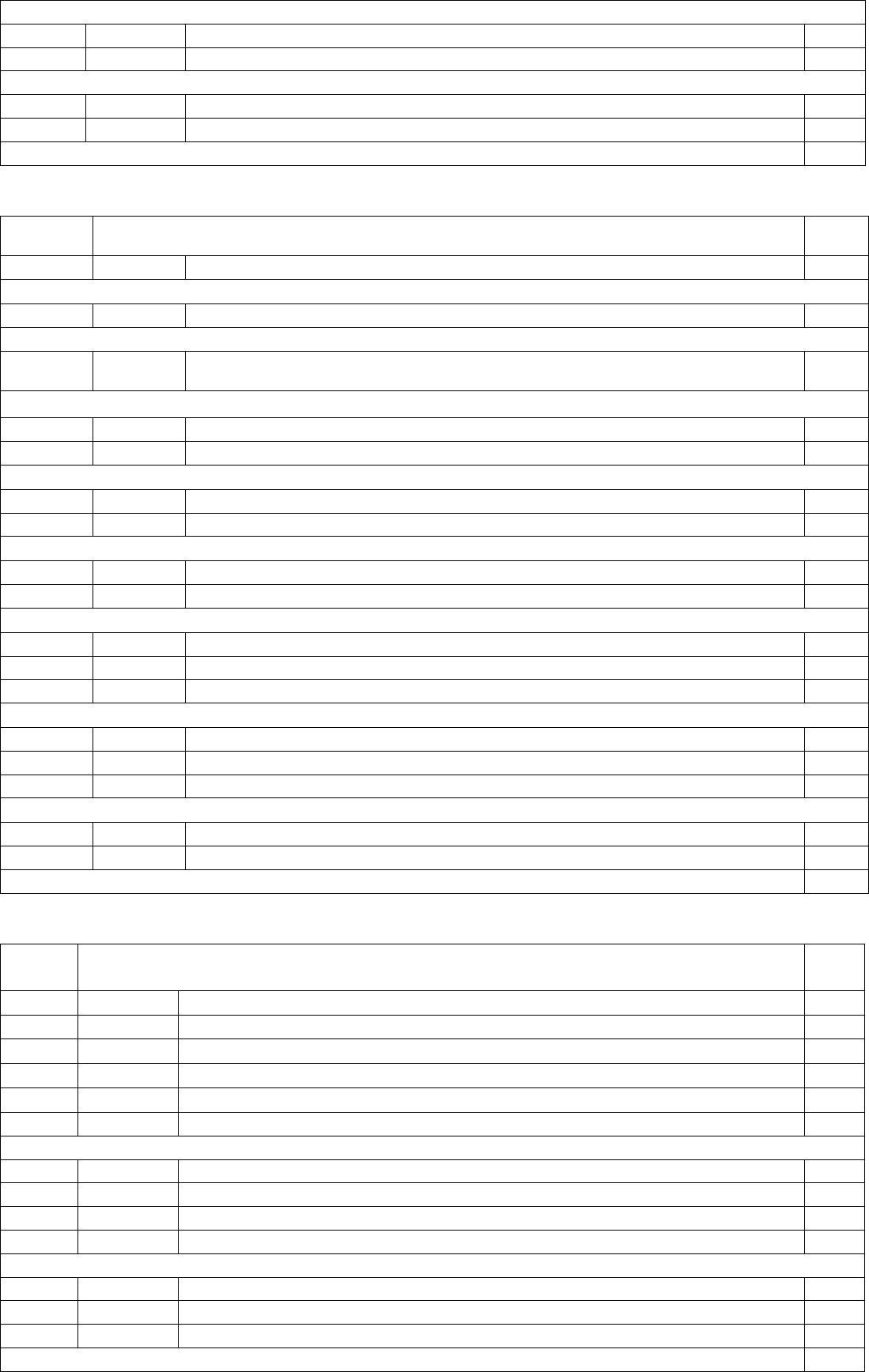
Spring 2
NURS 6215
Adult-Gerontology Primary Care Nurse Practitioner Clinical I
4
NURS 6234
Adult-Gerontology Primary Care II
3
Summer 2
NURS 6231
Essential Procedures for the Primary Care Provider
2
NURS 6295
Adult-Gerontology Primary Care Nurse Practitioner Clinical II
4
Total Hours
40
Adult-Gerontology Primary Care Nurse Practitioner 3-Year, Part-Time Curriculum Plan:
VUMC Employees Only
Semester Course Number and Name
Credit
Hours
Fall 1
NURS 6045
Professional Formation I: Roles and Contexts for Advanced Nursing Practice
1
Spring 1
NURS 6055
Professional Formation II: Evidence Based Change in Healthcare Environments
3
Summer 1
NURS 6065
Professional Formation III: Leading Collaborative Change: Improving Delivery of Healthcare to
Patients and Populations
4
Fall 2
NURS 6013
Advanced Health Assessment and Clinical Reasoning
2
NURS 6022
Advanced Pathophysiology
3
Spring 2
NURS 6024
Advanced Pharmacotherapeutics
4
NURS 6236
Advanced Concepts in the Care of the Older Adult
2
Summer 2
NURS 6031
Advanced Practice Nursing in Primary Care of the Adolescent
1
NURS 6231
Essential Procedures for the Primary Care Provider
2
Fall 3
NURS 6205
Advanced Health Assessment Applications for Adult-Gerontology Primary Care NP
1
NURS 6034
Adult-Gerontology Primary Care I
3
NURS 6014
Advanced Health Assessment Lab
1
Spring 3
NURS 6215
Adult-Gerontology Primary Care Nurse Practitioner Clinical I
4
NURS 6234
Adult-Gerontology Primary Care II
3
NURS 6032
Advanced Practice Primary Care Nursing in Women’s & Gender-Related Health
1
Summer 3
NURS 6295
Adult-Gerontology Primary Care Nurse Practitioner Clinical II
4
NURS 6075
Professional Formation IV: Transition to Advanced Nursing Practice
1
Total Hours
40
Adult-Gerontology Primary Care Nurse Practitioner Sample Curriculum Plan for Post
Master’s Certificate
Semester Course Number and Name
Credit
Hours
Fall
NURS 6022
Advanced Pathophysiology
4
NURS 6013
Advanced Health Assessment and Clinical Reasoning
2
NURS 6014
Advanced Health Assessment Lab
1
NURS 6024
Advanced Pharmacotherapeutics
3
NURS 6034
Adult-Gerontology Primary Care I
3
NURS 6205
Advanced Health Assessment Applications for Adult-Gerontology Primary Care NP
1
Spring
NURS 6032
Advanced Practice Primary Care Nursing in Women’s & Gender-Related Health
1
NURS 6215
Adult-Gerontology Primary Care Nurse Practitioner Clinical I
4
NURS 6234
Adult-Gerontology Primary Care II
3
NURS 6236
Advanced Concepts in the Care of the Older Adult
2
Summer
NURS 6031
Advanced Practice Nursing in Primary Care of the Adolescent
1
NURS 6231
Essential Procedures for the Primary Care Provider
2
NURS 6295
Adult-Gerontology Primary Care Nurse Practitioner Clinical II
4
Total Hours
31
145
VUSN MSN, POST-MASTER’S CERTIFICATE, and DNP Student Handbook 2023-2024

• Sample only. All admitted post-master’s students will have an individualized curriculum plan based on a gap analysis complete by
the Academic Director of the program. As part of the post-master’s certificate (PMC) application
https://apply.vanderbilt.edu/apply/, all applicants are required to provide syllabi for previous master’s level courses in advanced
health assessment, advanced pathophysiology and advanced pharmacology. Whether or not a PMC student needs to retake one or
all of these courses is determined based on the guidelines below:
a. APRN certified PMC applicants/students who have previously taken an equivalent Advanced Health Assessment, Advanced
Pathophysiology, and Advanced Pharmacology, and have maintained certification (reported on the application), will not be
required to repeat these courses. Course equivalency will be determined by syllabi review.
b. Non-APRN certified PMC applicants/students will be required to take VUSN Advanced Health Assessment, Advanced
Pathophysiology, and Advanced Pharmacology courses unless they satisfy requirements specified in item c.
c. If a non-APRN certified student has previously taken one or more of these three courses in the last 5 years (5 years or less at the
time of matriculation) the student must provide the syllabi to be reviewed for equivalency. If the course is determined to be
equivalent to the VUSN course, was taken within the last 5 years and the grade earned was a B- or higher, the course may be
waived. Note: Determination of equivalency does not mean that VUSN transfer credit has been awarded. Equivalent courses will
not appear on the VU transcript.
146
VUSN MSN, POST-MASTER’S CERTIFICATE, and DNP Student Handbook 2023-2024
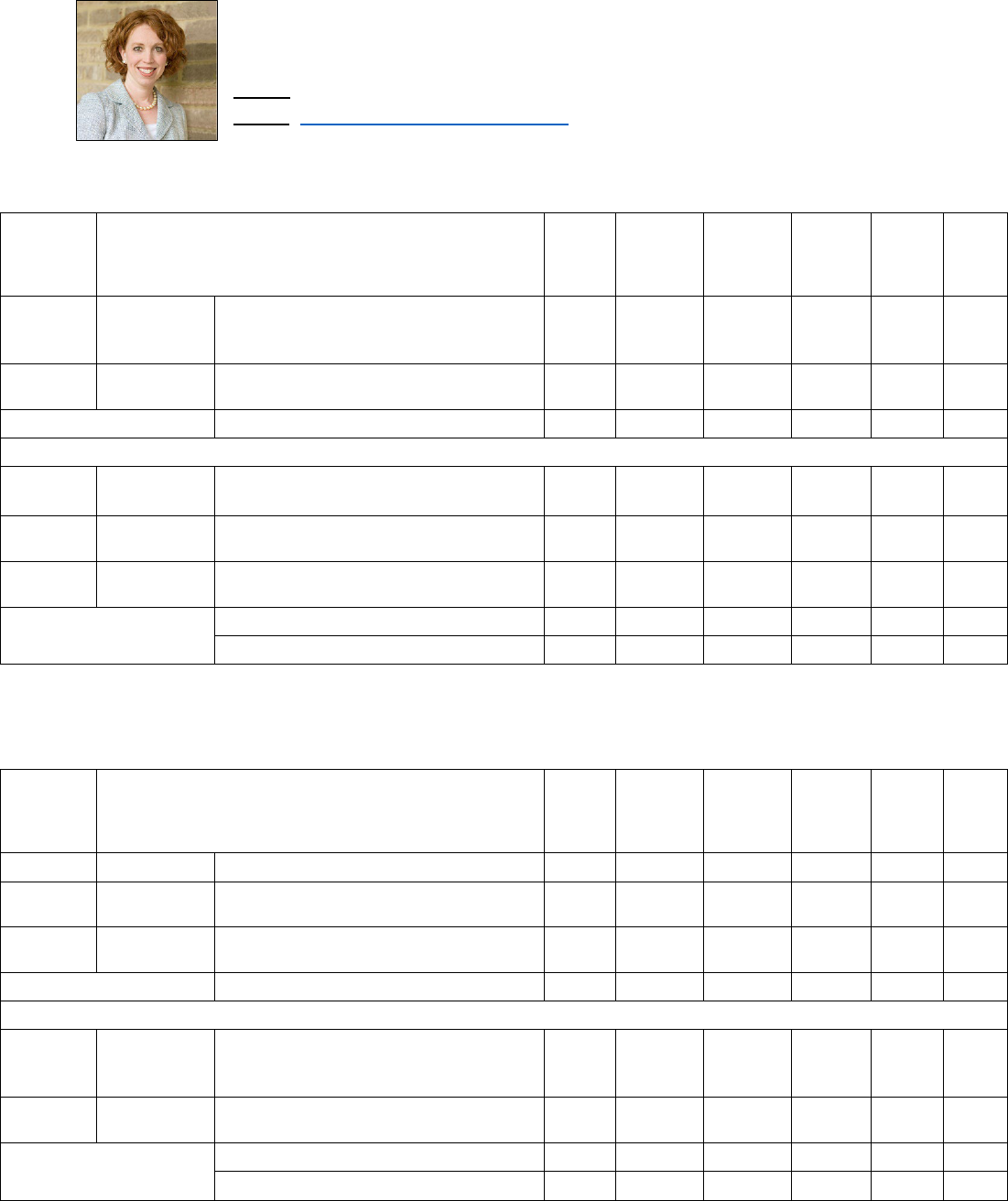
EMERGENCY NURSE PRACTITIONER
Jennifer Wilbeck, DNP, ACNP-BC, FNP-BC, ENP-C, FAANP, FAAN
Director, Emergency NP Specialty
307 Godchaux Hall
Phone: 615.322.4195
E-mail: jennifer.wilbeck@vanderbilt.edu
ENP Post Master’s Certificate Curriculum Plan (FNP certified entry), Fall 2023
Admission*
Semester Course Number and Name
Credit
Hours
Didactic
Clock
Hours
Seminar
Clock
Hours
Clinical
Clock
Hours
Lab
Clock
Hours
Total
Clock
Hours
Fall
NURS 6361
Pathophysiology and Collaborative
Management in Emergent and Critical
Care
3
42
42
NURS 6365
Trauma, Emergency and Critical Care
Clinical I
3
210
210
Semester Total
6
42
0
210
0
252
Spring
NURS 6143
Intro to Point of Care Ultrasound
2
21
14
35
NURS 6301
Concepts in Advanced Emergency
Nursing
3
28
14
42
NURS 6375
Trauma, Emergency and Critical Care
Clinical II
3
210
210
Semester Total
8
49
0
210
28
287
Program Total
14
91
0
420
28
539
*Fall 2023 admission will be the last 14-hour plan of study. All entries to this program spring 2024 forward will be 15 credit hours.
ENP Post Master’s Certificate Curriculum Plan (FNP certified entry), Spring 2024
Admission
Semester Course Number and Name
Credit
Hours
Didactic
Clock
Hours
Seminar
Clock
Hours
Clinical
Clock
Hours
Lab
Clock
Hours
Total
Clock
Hours
Spring
NURS 6143
Intro to Point of Care Ultrasound
2
21
14
35
NURS 6301
Concepts in Advanced Emergency
Nursing
3
28
14
42
NURS 6375
Trauma, Emergency and Critical Care
Clinical II
3
210
210
Semester Total
8
49
0
210
28
287
Fall
NURS 6361
Pathophysiology and Collaborative
Management in Emergent and Critical
Care
3
42
42
NURS 6365
Trauma, Emergency and Critical Care
Clinical I
4
280
280
Semester Total
7
42
0
280
0
322
Program Total
15
91
0
490
28
609
147
VUSN MSN, POST-MASTER’S CERTIFICATE, and DNP Student Handbook 2023-2024
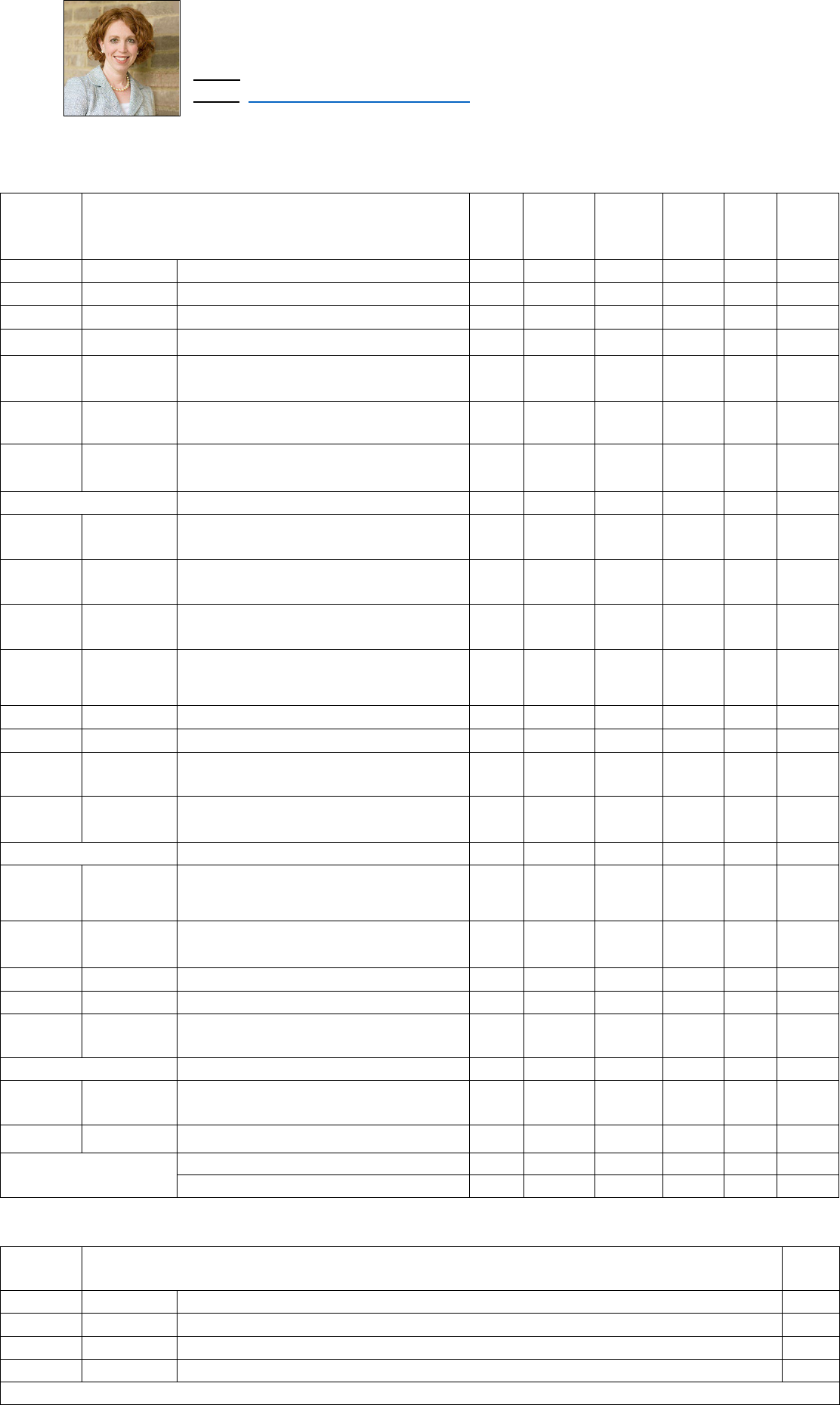
EMERGENCY NURSE PRACTITIONER (FNP/ENP Dual Focus)
Jennifer Wilbeck, DNP, ACNP-BC, FNP-BC, ENP-C, FAANP, FAAN
Director, Emergency NP Specialty
307 Godchaux Hall
Phone: 615.322.4195
E-mail: jennifer.wilbeck@vanderbilt.edu
Family / Emergency Nurse Practitioner Curriculum Plan and Required Hours, Full-time
Plan of Study for Direct Entry
Semester Course Number and Name
Credit
Hours
Didactic
Clock
Hours
Seminar
Clock
Hours
Clinical
Clock
Hours
Lab
Clock
Hours
Total
Clock
Hours
Fall 1
NURS 6022
Advanced Physiology/Pathophysiology
4
56
56
NURS 6013
Advanced Health Assessment
2
28
28
NURS 6014
Advanced Health Assessment Lab
1
28
28
NURS 6024
Advanced Pharmacology
3
42
42
NURS 6030
Advanced Practice Nursing in Primary Care
of the Adult
3
42
42
NURS 6045
Professional Formation I: Roles and Contexts
for Advanced Nursing Practice
1
14
14
NURS 6305
Advanced Health Assessment Applications
for the Emergency Nurse Practitioner
1
70
70
Semester Total
15
182
0
70
28
280
Spring 1
NURS 6032
Advanced Practice Primary Care Nursing in
Women’s & Gender-Related Health
1
14
14
NURS 6036
Advanced Practice Nursing in Primary Care
of the Child and Adolescent
3
42
42
NURS 6055
Professional Formation II: Evidence Based
Change in Healthcare Environments
3
42
42
NURS 6310
Essential Diagnostic and Therapeutic
Procedures in Primary, Urgent & Emergency
Care
1
28
28
NURS 6301
Concepts in Advanced Emergency Nursing
3
28
14
42
NURS 6355
Practicum in Primary and Urgent Care
3
210
210
NURS 6521
The Context of Primary Care: FNP Domains
and Core Comp for Practice
1
14
14
NURS 6532
Advanced Practice Nursing in Primary Care
of the Older Adult
1
14
14
Semester Total
16
154
0
210
42
406
Summer 1
NURS 6065
Professional Formation III: Leading
Collaborative Change: Improving Delivery of
Healthcare to Patients and Populations
4
56
56
NURS 6075
Professional Formation IV: Transition to
Advanced Nursing Practice
1
14
14
NURS 6143
Intro to Point of Care Ultrasound
2
21
14
35
NURS 6395
Practicum in Emergency Care II
1
70
70
NURS 6595
Family Nurse Practitioner Preceptorship for
Dual Specialty
5
210
210
Semester Total
13
91
0
280
14
385
Fall 2
NURS6361
Pathophysiology and Collaborative
Management in Emergent and Critical Care
3
42
42
NURS 6365
Trauma, Emergency & Critical Care Clinical I
4
280
280
Semester Total
7
42
0
280
0
322
Program Total
51
469
0
840
84
1393
Family / Emergency Nurse Practitioner Curriculum Plan, Part-Time Plan of Study for
Direct Entry
Semester Course Number and Name
Credit
Hours
Fall 1
NURS 6022
Advanced Physiology/Pathophysiology
4
NURS 6013
Advanced Health Assessment
2
NURS 6014
Advanced Health Assessment Lab
1
NURS 6045
Professional Formation I: Roles and Contexts for Advanced Nursing Practice
1
148
VUSN MSN, POST-MASTER’S CERTIFICATE, and DNP Student Handbook 2023-2024

Spring 1
NURS 6032
Advanced Practice Primary Care Nursing in Women’s & Gender-Related Health
1
NURS 6055
Professional Formation II: Evidence Based Change in Healthcare Environments
3
NURS 6521
Context of Primary Care: FNP Domains and Competencies for Practice
1
NURS 6532
Advanced Practice Nursing in Primary Care of the Older Adult
1
NURS 6310
Essential Diagnostic and Therapeutic Procedures in Primary, Urgent & Emergency Care
1
Summer 1
NURS 6065
Professional Formation III: Leading Collaborative Change: Improving Delivery of Healthcare to
Patients and Populations
4
NURS 6075
Professional Formation IV: Transition to Advanced Nursing Practice
1
NURS 6143
Introduction to Point of Care Ultrasound
2
Fall 2
NURS 6024
Advanced Pharmacology
3
NURS 6030
Advanced Practice Nursing in Primary Care of the Adult
3
NURS 6305
Advanced Health Assessment Application for Emergency Nurse Practitioner
1
NURS 6595
Family Nurse Practitioner Preceptorship for Dual Specialty
5
Spring 2
NURS 6036
Advanced Practice Nursing in Primary Care of the Child and Adolescent
3
NURS 6301
Concepts in Advanced Emergency Nursing
3
NURS 6355
Practicum in Primary and Urgent Care
3
Summer 2
NURS 6361
Pathophysiology and Collaborative Management in Emergent and Critical Care
3
NURS 6365
Trauma, Emergency and Critical Care Clinical I
4
NURS 6395
Practicum in Emergency Care II
1
Total Hours
51
149
VUSN MSN, POST-MASTER’S CERTIFICATE, and DNP Student Handbook 2023-2024
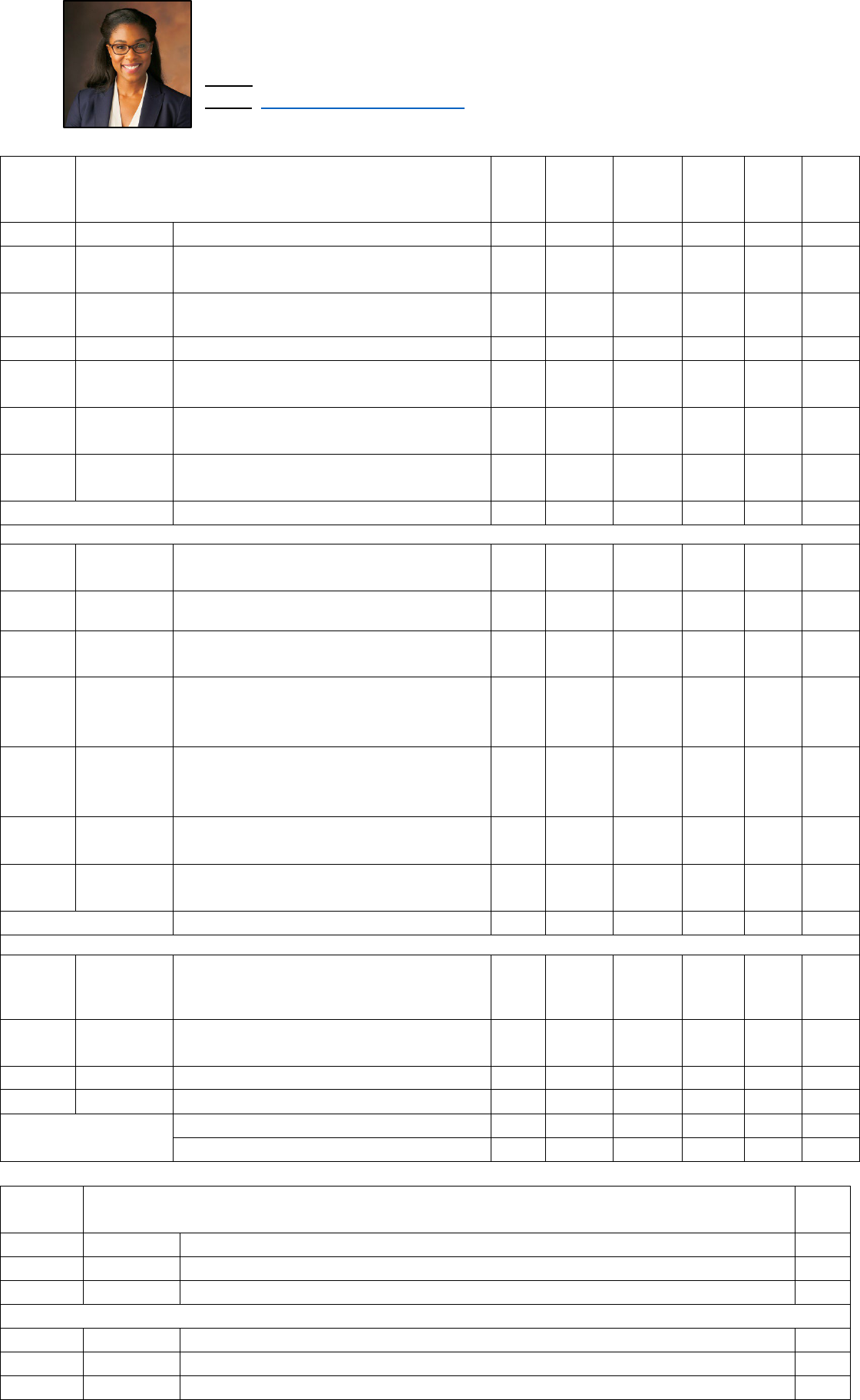
FAMILY NURSE PRACTITIONER (FNP)
Julia Steed, PhD, RN, FNP-BC
Director, Family NP Specialty
358 Frist Hall
Phone: 615.343.3288
E-mail: julia.m.steed@vanderbilt.edu
Family Nurse Practitioner Curriculum Plan and Required Hours
Semester Course Number and Name
Credit
Hours
Didactic
Clock
Hours
Seminar
Clock
Hours
Clinical
Clock
Hours
Lab
Clock
Hours
Total
Clock
Hours
Fall
NURS 6022
Advanced Physiology/Pathophysiology
4
56
56
NURS 6013
Advanced Health Assessment
2
28
28
NURS 6014
Advanced Health Assessment Lab
1
28
28
NURS 6024
Advanced Pharmacology
3
42
42
NURS 6030
Advanced Practice Nursing In Primary Care of
the Adult
3
42
42
NURS 6045
Professional Formation I: Roles and Contexts for
Advanced Nursing Practice
1
14
14
NURS 6505
Advanced Health Assessment Applications for
the FNP
1
70
70
Semester Total
15
182
0
70
28
280
Spring
NURS 6032
Advanced Practice Primary Care Nursing in
Women’s & Gender-Related Health
1
14
14
NURS 6036
Advanced Practice Nursing in Primary Care of
the Child and Adolescent
3
42
42
NURS 6055
Professional Formation II: Evidence Based
Change in Healthcare Environments
3
42
42
NURS 6521
The Context of Primary Care: FNP Domains &
Core Competencies for Practice
1
14
14
NURS 6510
Essential Procedures for the Family Nurse
Practitioner
1
28
28
NURS 6532
Advanced Practice Nursing in Primary Care of
the Older Adult
1
14
14
NURS 6555
Practicum in Primary Health Care of the Family
4
280
280
Semester Total
14
126
0
280
28
434
Summer
NURS 6065
Professional Formation III: Leading
Collaborative Change: Improving Delivery of
Healthcare to Patients and Populations
4
56
56
NURS 6075
Professional Formation IV: Transition to
Advanced Nursing Practice
1
14
14
NURS 6575
Clinical Decision Making for the FNP
1
28
28
NURS 6585
FNP Preceptorship
5
280
280
Semester Total
11
70
0
280
28
378
Program Total
40
378
0
630
84
1092
Family Nurse Practitioner 2-Year, Part-Time Curriculum Plan
Semester Course Number and Name
Credit
Hours
Fall 1
NURS 6022
Advanced Physiology/Pathophysiology
4
NURS 6013
Advanced Health Assessment
2
NURS 6045
Professional Formation I: Roles and Contexts for Advanced Nursing Practice
1
Spring 1
NURS 6055
Professional Formation II: Evidence Based Change in Healthcare Environments
3
NURS 6521
The Context of Primary Care: FNP Domains & Core Competencies for Practice
1
NURS 6510
Essential Procedures for the Family Nurse Practitioner
1
150
VUSN MSN, POST-MASTER’S CERTIFICATE, and DNP Student Handbook 2023-2024

NURS 6032
Advanced Practice Primary Care Nursing in Women’s & Gender-Related Health
1
Elective (optional)
Summer 1
NURS 6065
Professional Formation III: Leading Collaborative Change: Improving Delivery of Healthcare to
Patients and Populations
4
NURS 6075
Professional Formation IV: Transition to Advanced Nursing Practice
1
Fall 2
NURS 6014
Advanced Health Assessment Lab
1
NURS 6024
Advanced Pharmacology
3
NURS 6030
Advanced Practice Nursing In Primary Care of the Adult
3
NURS 6505
Advanced Health Assessment Applications for the FNP
1
Spring 2
NURS 6036
Advanced Practice Nursing in Primary Care of the Child and Adolescent
3
NURS 6532
Advanced Practice Nursing in Primary Care of the Older Adult
1
NURS 6555
Practicum in Primary Health Care of the Family
4
Summer 2
NURS 6575
Clinical Decision Making for the Family Nurse Practitioner
1
NURS 6585
Family Nurse Practitioner Preceptorship
5
Total Hours
40
Family Nurse Practitioner 3-Year, Part-Time Curriculum Plan: VUMC Employees Only
Semester Course Number and Name
Credit
Hours
Fall 1
NURS 6022
Advanced Physiology/Pathophysiology
4
NURS 6045
Professional Formation I: Roles and Contexts for Advanced Nursing Practice
1
Spring 1
NURS 6055
Professional Formation II: Evidence Based Change in Healthcare Environments
3
Summer 1
NURS 6065
Professional Formation III: Leading Collaborative Change: Improving Delivery of Healthcare to
Patients and Populations
4
Fall 2
NURS 6013
Advanced Health Assessment
2
Spring 2
NURS 6032
Advanced Practice Primary Care Nursing in Women’s & Gender-Related Health
1
NURS 6521
The Context of Primary Care: FNP Domains & Core Competencies for Practice
1
NURS 6510
Essential Procedures for the Family Nurse Practitioner
1
NURS 6532
Advanced Practice Nursing in Primary Care of the Older Adult
1
Summer 2
NURS 6075
Professional Formation IV: Transition to Advanced Nursing Practice
1
Fall 3
NURS 6014
Advanced Health Assessment Lab
1
NURS 6024
Advanced Pharmacology
3
NURS 6030
Advanced Practice Nursing In Primary Care of the Adult
3
NURS 6505
Advanced Health Assessment Applications for the FNP
1
Spring 3
NURS 6036
Advanced Practice Nursing in Primary Care of the Child and Adolescent
3
NURS 6555
Practicum in Primary Health Care of the Family
4
Summer 3
NURS 6575
Clinical Decision Making for the Family Nurse Practitioner
1
NURS 6585
Family Nurse Practitioner Preceptorship
5
Total Hours
40
Family Nurse Practitioner Sample Curriculum Plan for Post Master’s Certificate
Semester Course Number and Name
Credit
Hours
Fall
NURS 6022
Advanced Physiology/Pathophysiology
4
NURS 6013
Advanced Health Assessment
2
NURS 6014
Advanced Health Assessment Lab
1
NURS 6024
Advanced Pharmacology
3
NURS 6030
Advanced Practice Nursing In Primary Care of the Adult
3
NURS 6505
Advanced Health Assessment Applications for the FNP
1
Spring
NURS 6032
Advanced Practice Primary Care Nursing in Women’s & Gender-Related Health
1
151
VUSN MSN, POST-MASTER’S CERTIFICATE, and DNP Student Handbook 2023-2024

NURS 6036
Advanced Practice Nursing in Primary Care of the Child and Adolescent
3
NURS 6521
The Context of Primary Care: FNP Domains & Core Competencies for Practice
1
NURS 6510
Essential Procedures for the Family Nurse Practitioner
1
NURS 6532
Advanced Practice Nursing in Primary Care of the Older Adult
1
NURS 6555
Practicum in Primary Health Care of the Family
4
Summer
NURS 6565
Practicum in Primary Health Care of the Family
1
NURS 6575
Clinical Decision Making for the Family Nurse Practitioner
1
NURS 6585
Family Nurse Practitioner Preceptorship
5
Total Hours
32
• Sample only. All admitted post-master’s students will have an individualized curriculum plan based on a gap analysis complete by
the Academic Director of the program. As part of the post-master’s certificate (PMC) application https://apply.vanderbilt.edu/apply/,
all applicants are required to provide syllabi for previous master’s level courses in advanced health assessment, advanced
pathophysiology and advanced pharmacology. Whether or not a PMC student needs to retake one or all of these courses is
determined based on the guidelines below:
a. APRN certified PMC applicants/students who have previously taken an equivalent Advanced Health Assessment, Advanced
Pathophysiology, and Advanced Pharmacology, and have maintained certification (reported on the application), will not be required
to repeat these courses. Course equivalency will be determined by syllabi review.
b. Non-APRN certified PMC applicants/students will be required to take VUSN Advanced Health Assessment, Advanced
Pathophysiology, and Advanced Pharmacology courses unless they satisfy requirements specified in item c.
c. If a non-APRN certified student has previously taken one or more of these three courses in the last 5 years (5 years or less at the
time of matriculation) the student must provide the syllabi to be reviewed for equivalency. If the course is determined to be
equivalent to the VUSN course, was taken within the last 5 years and the grade earned was a B- or higher, the course may be waived.
Note: Determination of equivalency does not mean that VUSN transfer credit has been awarded. Equivalent courses will not appear
on the VU transcript.
152
VUSN MSN, POST-MASTER’S CERTIFICATE, and DNP Student Handbook 2023-2024
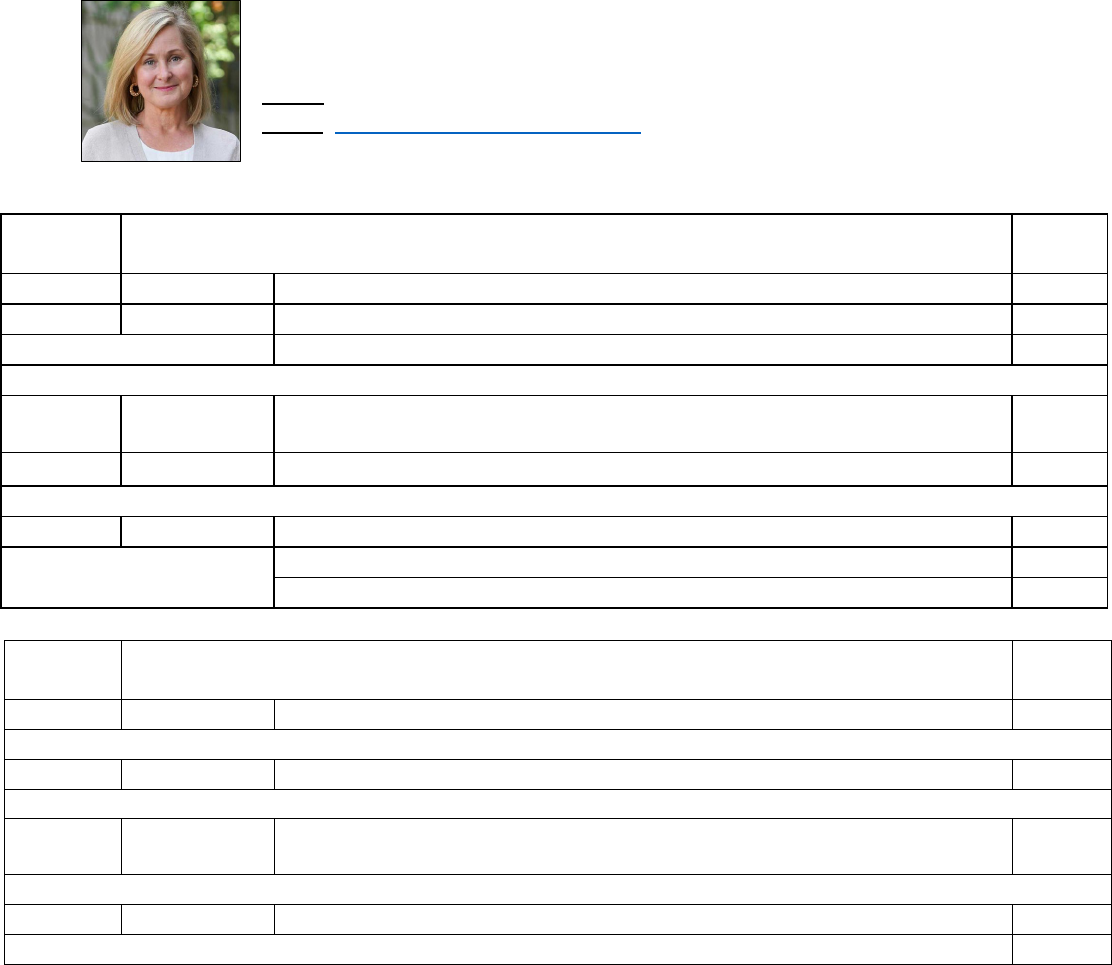
NURSE EDUCATOR (NE)
Betsy Kennedy, PhD, RN, CNE
Director, Nursing Educator Specialty
274 School of Nursing
Phone: 615.936.0447
E-mail: [email protected]
Nurse Educator Post Master's Certificate Sample Curriculum Plan (3 semester)
Semester Course Number and Name
Credit
Hours
Spring
NURS 8066
Curriculum Strategies for Health Professions Education
3
NURS 8067
Educational Evaluation for Learning in the Health Professions
3
Semester Total
6
Summer
NURS 8068 OR
N8078
N8068 Online Methodologies OR
N8078 Innovations in Clinical and Simulation Education
3
Semester Total
3
Fall
NURSE 8079
Mentored Teaching and Role Synthesis
3
Semester Total
3
Program Total
12
Nurse Educator Post Master's Certificate Sample Curriculum Plan (4 semester)
Semester Course Number and Name
Credit
Hours
Fall 1
NURS 8066
Curriculum Strategies for Health Professions Education
3
Spring 1
NURS 8067
Educational Evaluation for Learning in the Health Professions
3
Summer 1
NURSE 8068 OR
N8078
Elective (choose 1) N8068 Online Methodologies for Nursing Education OR
N8078 Innovations for Teaching in Clinical and Simulated Settings
3
Fall 2
NURS 8079
Mentored Teaching and Role Synthesis
3
Total Hours
12
153
VUSN MSN, POST-MASTER’S CERTIFICATE, and DNP Student Handbook 2023-2024
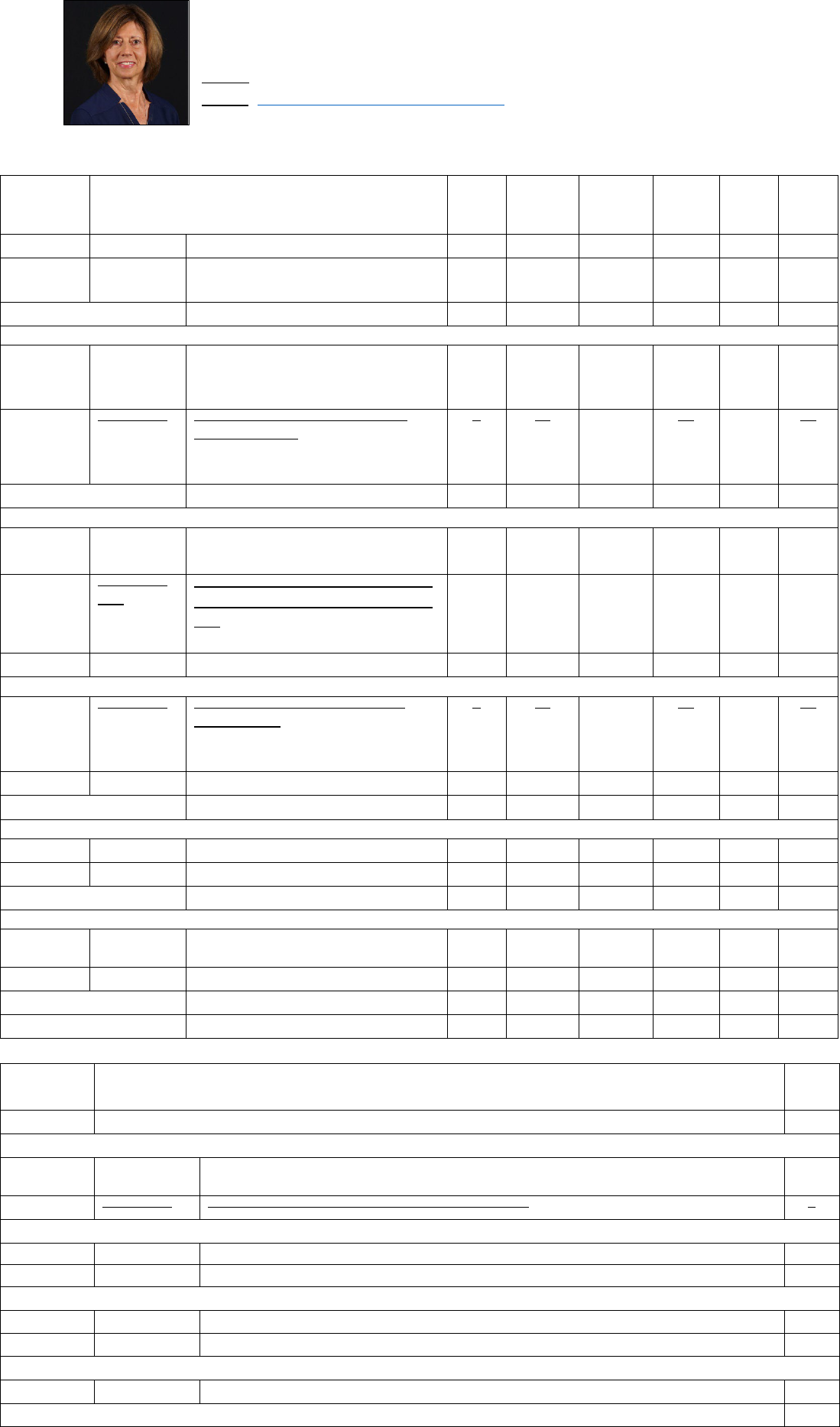
NURSING INFORMATICS (NI)
Patricia Sengstack, DNP, RN-BC, FAAN, FACMI
Director, Nursing Informatics Specialty
260 Frist Hall
Phone: 615.343.4930
E-mail: patricia.r.sengstac[email protected]
*Curriculum Plan Amended on September 21, 2023
Nursing Informatics Specialty Curriculum Plan and Required Hours (2-Year, Part Time)
Semester Course Number and Name
Credit
Hours
Didactic
Clock
Hours
Seminar
Clock
Hours
Clinical
Clock
Hours
Lab
Clock
Hours
Total
Clock
Hours
Fall 1
NURS 6411
Foundations of Leadership
3
42
42
NURS 6710
NI Professional Formation I -
Fundamentals of Nursing Informatics
3
42
42
Semester Total
6
84
0
0
0
84
Spring 1
NURS 6720
NI Professional Formation II - Theories,
Frameworks and Models Supporting
Informatics Practice
3
42
42
NURS 6732
NURS 6025
Designing, Planning and Managing
Scalable Projects *(Moved to fall 2)
Applied Quality Improvement and
Patient Safety *(Moved from fall 2)
3
3
28
28
70
70
98
98
Semester Total
6
70
0
70
0
140
Summer 1
NURS 6723
Nursing Informatics and the
Information System Lifecycle
3
42
42
NURS 6724
*OR
NURS 6410
Designing, Planning, and Managing
Informatics Training and Education
*OR *(This course has been retired)
Design Thinking and Innovation Health
3
28
70
98
Semester Total
6
70
0
70
0
140
Fall 2
NURS 6025
NURS 6732
Applied Quality Improvement and
Patient Safety*(Moved to spring 1)
Designing, Planning and Managing
Scalable Projects *(Moved from spring 1)
3
3
28
28
70
70
98
98
NURS 6727
Data to Information I
3
42
42
Semester Total
6
70
0
70
0
140
Spring 2
NURS 6715
Nursing Informatics Practicum I
3
14
140
154
NURS 6728
Data to Information II
3
28
70
98
Semester Total
6
42
0
210
0
252
Summer 2
NURS 6730
NI Professional Formation 3: Advanced
Concepts of Informatics
3
42
42
NURS 6795
Nursing Informatics Practicum II
3
14
140
154
Semester Total
6
56
0
140
0
196
Program Total
36
392
0
560
0
952
MSN in Nursing Informatics Post Master’s Certificate Option
Semester Course Number and Name
Credit
Hours
Fall 1
No courses
Spring 1
NURS 6720
NI Professional Formation II - Theories, Frameworks and Models Supporting Informatics
Practice
3
NURS 6732
Designing, Planning and Managing Scalable Projects *(Moved to fall 2)
3
Summer 1
NURS 6723
Nursing Informatics and the Information System Lifecycle
3
NURS 6730
NI Professional Formation 3: Advanced Concepts of Informatics
3
Fall 2
NURS 6727
Data to Information I
3
NURS 6732
Designing, Planning and Managing Scalable Projects *(Moved from spring 1)
3
Spring 2
NURS 6728
Data to Information II
3
Total Hours
18
154
VUSN MSN, POST-MASTER’S CERTIFICATE, and DNP Student Handbook 2023-2024
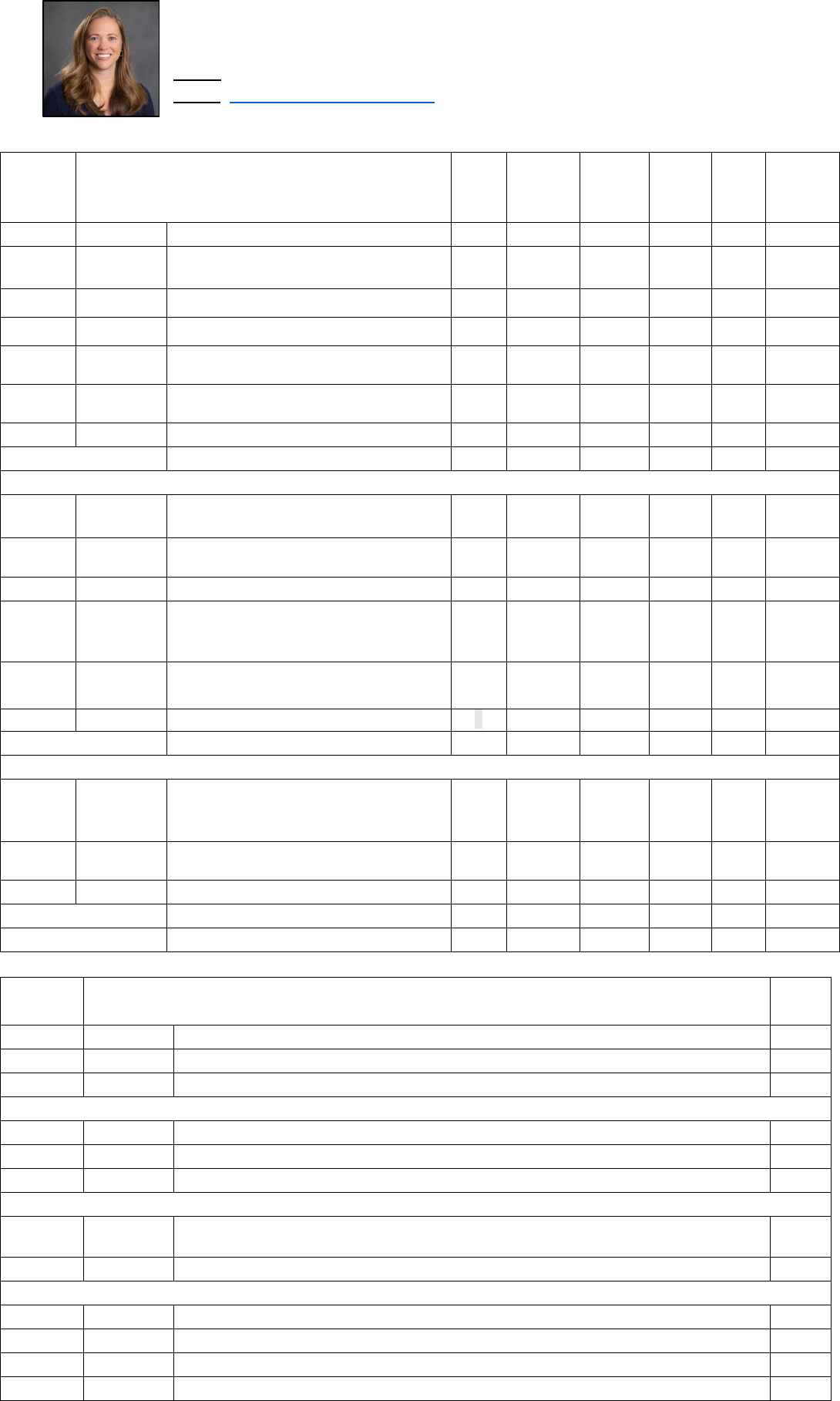
NEONATAL NURSE PRACTITIONER (NNP)
Director, Neonatal NP Specialty
Colleen Reilly Moss, DNP, APRN, NNP-BC
374 Frist Hall
Phone: 615.343.1086
E-mail: [email protected]
Neonatal Nurse Practitioner Curriculum Plan and Required Hours
Semester Course Number and Name
Credit
Hours
Didactic
Clock
Hours
Seminar
Clock
Hours
Clinical
Clock
Hours
Lab
Clock
Hours
Total
Clock
Hours
Fall
NURS 6022
Advanced Physiology/Pathophysiology
4
56
56
NURS 6045
Professional Formation I: Roles and
Contexts for Advanced Nursing Practice
1
14
14
NURS 6013
Advanced Health Assessment
2
28
28
NURS 6014
Advanced Health Assessment Lab
1
28
28
NURS 6604
Advanced Neonatal Physical & Gestational
Assessment
1
14
14
NURS 6625
Advanced Neonatal Assessment
Application
1
70
70
NURS 6616
Advanced Clinical Reasoning for the NNP I
4
56
56
Semester Total
14
168
0
70
28
266
Spring
NURS 6055
Professional Formation II: Evidence Based
Change in Healthcare Environments
3
42
42
NURS 6024
Advanced Pharmacology
3
42
42
NURS 6615
Neonatal Practicum
3
210
210
NURS 6620
Essential Components of Neonatal
Intensive Care Nursing and Introduction to
Advanced Practice Neonatal Nursing Skills
2
14
28
42
NURS 6621
Advanced Neonatal
Pharmacotherapeutics Seminar
1
14
14
NURS 6618
Advanced Clinical Reasoning for the NNP II
4
56
56
Semester Total
16
168
0
210
28
406
Summer
NURS 6065
Professional Formation III: Leading
Collaborative Change: Improving Delivery
of Healthcare to Patients and Populations
4
56
56
NURS 6075
Professional Formations IV: Transition to
Advanced Practice Nursing
1
14
14
NURS 6695
Neonatal Preceptorship
6
420
420
Semester Total
11
70
0
420
0
490
Program Total
41
406
0
700
56
1162
Neonatal Nurse Practitioner 2-Year, Part-Time Curriculum Plan
Semester Course Number and Name
Credit
Hours
Fall 1
NURS 6022
Advanced Physiology/Pathophysiology
4
NURS 6045
Professional Formation I: Roles and Contexts for Advanced Nursing Practice
1
NURS 6013
Advanced Health Assessment
2
Spring 1
NURS 6055
Professional Formation II: Evidence Based Change in Healthcare Environments
3
NURS 6024
Advanced Pharmacology
3
NURS 6621
Advanced Neonatal Pharmacotherapeutics Seminar
1
Summer 1
NURS 6065
Professional Formation III: Leading Collaborative Change: Improving Delivery of Healthcare
to Patients and Populations
4
NURS 6075
Professional Formations IV: Transition to Advanced Practice Nursing
1
Fall 2
NURS 6014
Advanced Health Assessment Lab
1
NURS 6604
Advanced Neonatal Physical & Gestational Assessment
1
NURS 6625
Advanced Neonatal Assessment Application
1
NURS 6616
Advanced Clinical Reasoning for the NNP I
4
155
VUSN MSN, POST-MASTER’S CERTIFICATE, and DNP Student Handbook 2023-2024
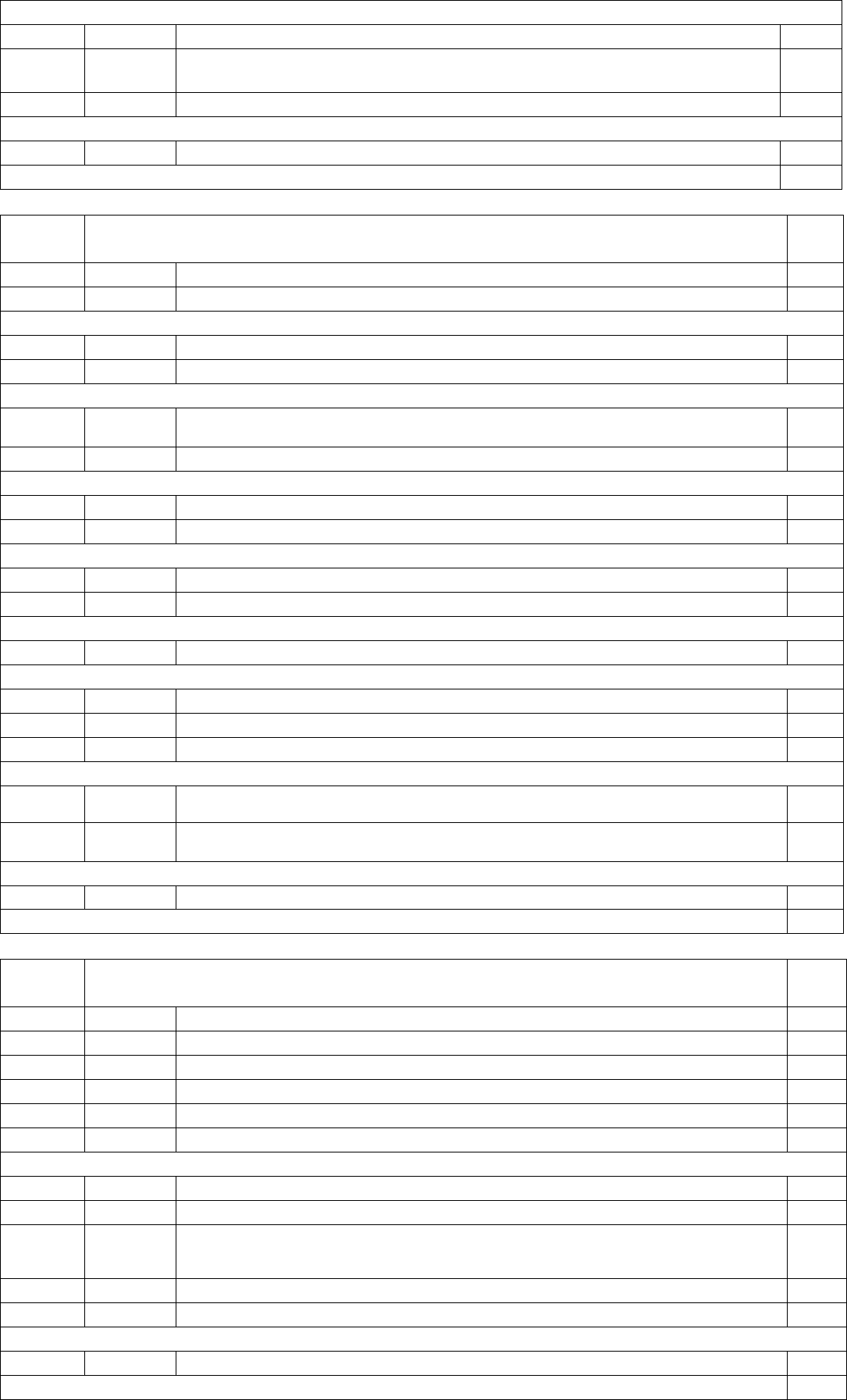
Spring 2
NURS 6615
Neonatal Practicum
3
NURS 6620
Essential Components of Neonatal Intensive Care Nursing and Intro to Advanced Practice
Neonatal Nursing Skills
2
NURS 6618
Advanced Clinical Reasoning for the NNP II
4
Summer 2
NURS 6695
Neonatal Preceptorship
6
Total Hours
41
Neonatal Nurse Practitioner 3-Year, Part-Time Curriculum Plan: VUMC Employees Only
Semester Course Number and Name
Credit
Hours
Fall 1
NURS 6022
Advanced Physiology/Pathophysiology
4
NURS 6045
Professional Formation I: Roles and Contexts for Advanced Nursing Practice
1
Spring 1
NURS 6055
Professional Formation II: Evidence Based Change in Healthcare Environments
3
NURS 6024
Advanced Pharmacology
3
Summer 1
NURS 6065
Professional Formation III: Leading Collaborative Change: Improving Delivery of Healthcare to
Patients and Populations
4
NURS 6075
NURS Professional Formations IV: Transition to Advanced Practice Nursing
1
Fall 2
NURS 6013
Advanced Health Assessment
2
NURS 6616
Advanced Clinical Reasoning for the NNP I
4
Spring 2
NURS 6618
Advanced Clinical Reasoning for the NNP II
4
NURS 6621
Advanced Neonatal Pharmacotherapeutics Seminar
1
Summer 2
No courses
Fall 3
NURS 6014
Advanced Health Assessment Lab
1
NURS 6604
Advanced Neonatal Physical & Gestational Assessment
1
NURS 6625
Advanced Neonatal Assessment Application
1
Spring 3
NURS 6615
Neonatal Practicum
3
NURS 6620
Essential Components of Neonatal Intensive Care Nursing and Intro to Advanced Practice
Neonatal Nursing Skills
2
Summer 3
NURS 6695
Neonatal Preceptorship
6
Total Hours
41
Neonatal Nurse Practitioner Sample Curriculum Plan for Post Master’s Certificate
Semester Course Number and Name
Credit
Hours
Fall
NURS 6022
Advanced Physiology/Pathophysiology
4
NURS 6013
Advanced Health Assessment
2
NURS 6014
Advanced Health Assessment Lab
1
NURS 6604
Advanced Neonatal Physical & Gestational Assessment
1
NURS 6625
Advanced Neonatal Assessment Application
1
NURS 6616
Advanced Clinical Reasoning for the NNP I
4
Spring
NURS 6615
Neonatal Practicum
3
NURS 6024
Advanced Pharmacology
3
NURS 6620
Essential Components of Neonatal Intensive Care Nursing and Intro to Advanced Practice
Neonatal Nursing Skills
2
NURS 6621
Advanced Neonatal Pharmacotherapeutics
1
NURS 6618
Advanced Clinical Reasoning for the NNP II
4
Summer
NURS 6695
Neonatal Preceptorship
6
Total Hours
32
156
VUSN MSN, POST-MASTER’S CERTIFICATE, and DNP Student Handbook 2023-2024

Sample only. All admitted post-master's students will have an individualized curriculum plan based on a gap analysis complete by
the Academic Director of the program. As part of the post-master's certificate (PMC) application
https://apply.vanderbilt.edu/apply/, all applicants are required to provide syllabi for previous master's level courses in Advanced
Pathophysiology. All post-master’s students are required to take the neonatal specific health assessment and pharmacology
courses. Whether or not a PMC student needs to retake the Advanced Pathophysiology course is determined based on the
guidelines below:
a. APRN certified PMC applicants/students who have previously taken an equivalent Advanced Pathophysiology course, and have
maintained certification (reported on the application), will not be required to repeat this course. Course equivalency will be
determined by syllabi review.
b. Non-APRN certified PMC applicants/students will be required to take VUSN Advanced Neonatal Health Assessment, Advanced
Pathophysiology, and Advanced Neonatal Pharmacology courses unless they satisfy requirements specified in item c.
c. If a non-APRN certified student has previously taken an Advanced Pathophysiology course in the last 5 years (5 years or less at
the time of matriculation) the student must provide the syllabi to be reviewed for equivalency. If the course is determined to be
equivalent to the VUSN course, was taken within the last 5 years and the grade earned was a B- or higher, the course may be
waived. Note: Determination of equivalency does not mean that VUSN transfer credit has been awarded. Equivalent courses will
not appear on the VU transcript.
157
VUSN MSN, POST-MASTER’S CERTIFICATE, and DNP Student Handbook 2023-2024
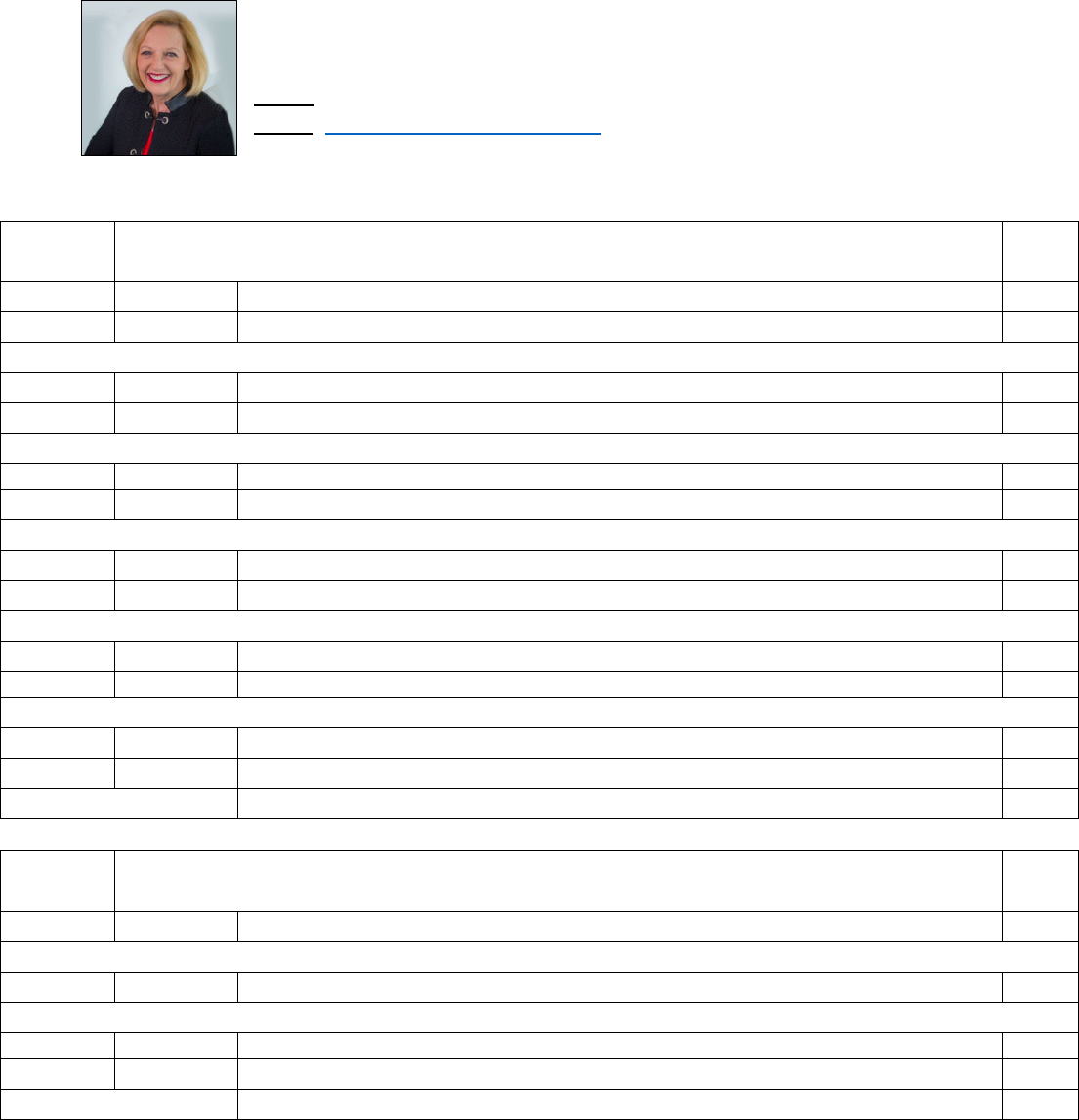
NURSING AND HEALTH CARE LEADERSHIP (NHCL)
Debra Arnow, DNP, RN, NEA-BC
Director, Nursing and Health Care Leadership Specialty
220 Godchaux Hall
Phone: 615.343.4056
E-mail: debra.a.arnow@vanderbilt.edu
Nursing and Health Care Leadership
Semester Course Number and Name
Credit
Hours
Fall 1
NURS 6411
Foundations of Leadership
3
NURS 6710
Fundamentals of Nursing Informatics – Nursing Informatics Professional Formation I
3
Spring 1
NURS 6025
Applied Quality Improvement and Patient Safety
3
NURS 6055
Professional Formation II: Application of Evidence in Healthcare Environments
3
Summer 1
NURS 6041
Principles of Health Care Finance
3
NURS 6410
Design Thinking and Innovation Health
3
Fall 2
NURS 6417
Advanced Leadership and Human Capital
3
NURS 6414
Organizational Behavior in Complex Health Care Systems
3
Spring 2
NURS 6408
Strategic Planning
2
NURS 6485
Management and Leadership, Practicum I
3
Summer 2
NURS 6404
Contemporary Issues in Society and Health
2
NURS 6495
Organizational and Systems Leadership, Practicum II
4
Total Hours
35
Post Master’s Certificate in Nursing and Health Care Leadership
Semester Course Number and Name
Credit
Hours
Fall
NURS 6411
Foundations of Leadership
3
Spring
NURS 6025
Applied Quality Improvement and Patient Safety
3
Summer
NURS 6041
Principles of Health Care Finance
3
NURS 6410
Design Thinking and Innovation Health
3
Total Hours
12
158
VUSN MSN, POST-MASTER’S CERTIFICATE, and DNP Student Handbook 2023-2024
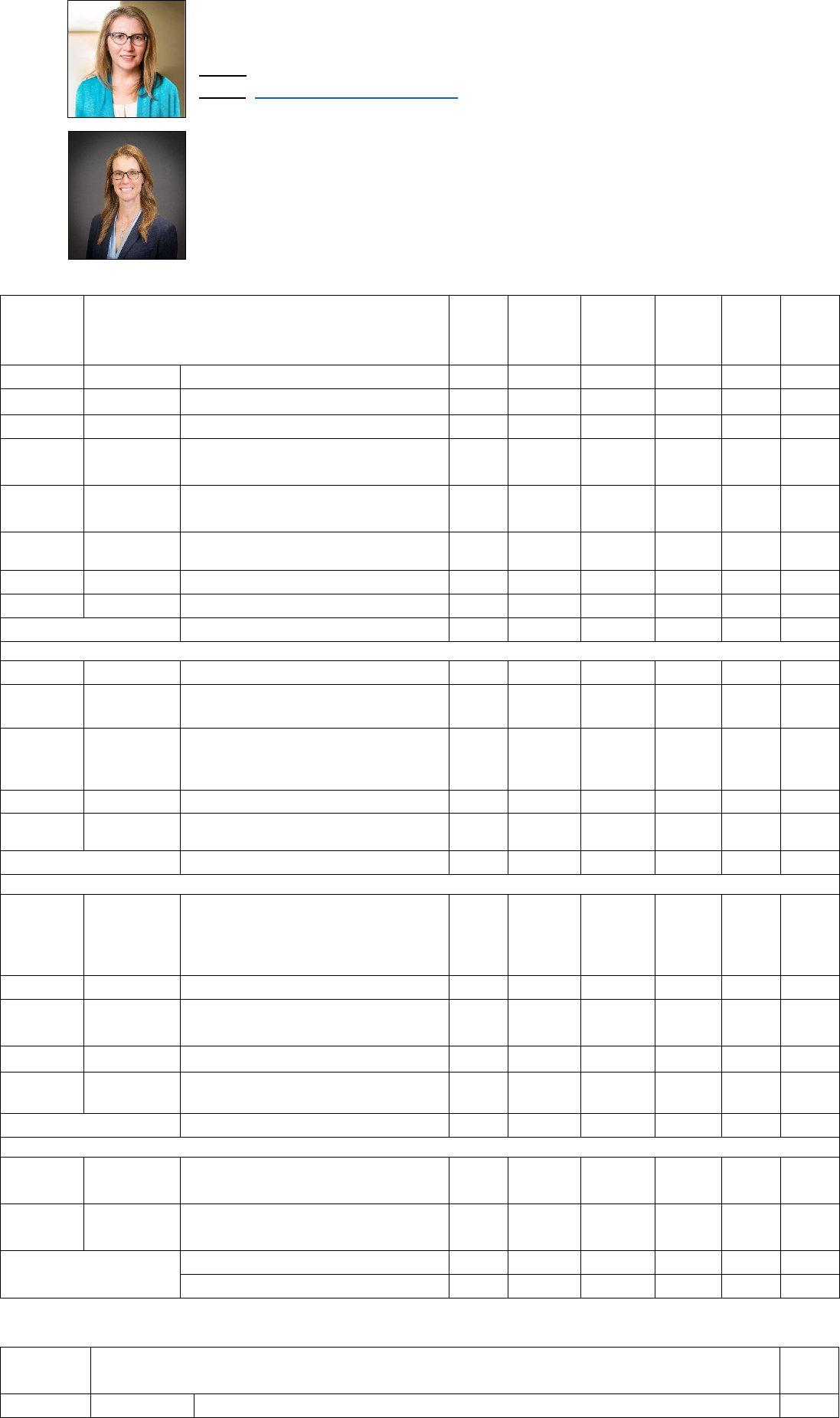
NURSE-MIDWIFERY (NM)
Julia Phillippi, PhD, CNM, FACNM, FAAN
Director, Nurse-Midwifery Specialty
286 School of Nursing
Phone: 615.343.2683
E-mail: [email protected]
Until September 30, 2023
Kendra Faucett, DNP, CNM, APRN, CNE, FACNM
Director, Nurse-Midwifery Specialty
Effective October 1, 2023
Nurse-Midwifery Specialty Curriculum Plan and Required Hours
Semester Course Number and Name
Credit
Hours
Didactic
Clock
Hours
Seminar
Clock
Hours
Clinical
Clock
Hours
Lab
Clock
Hours
Total
Clock
Hours
Fall 1
NURS 6022
Advanced Physiology/Pathophysiology
4
56
56
NURS 6013
Advanced Health Assessment
2
28
28
NURS 6014
Advanced Health Assessment Lab
1
28
28
NURS 6045
Professional Formation I: Roles and
Contexts for Advanced Nursing Practice
1
14
14
NURS 6805
Advanced Health Assessment
Applications for Nurse-Midwifery
1
35
14
49
NURS 6810
Gynecologic, Reproductive and Sexual
Health for Nurse Midwifery
3
42
42
NURS 6811
Reproductive Anatomy and Physiology
2
28
28
NURS 6812
Evolution of Midwifery in America
2
28
28
Semester Total
16
196
0
35
42
273
Spring 1
NURS 6024
Advanced Pharmacology
3
42
42
NURS 6030
Advanced Practice Nursing In Primary
Care of the Adult
3
42
42
NURS 6055
Professional Formation II: Evidence
Based Change in Healthcare
Environments
3
42
42
NURS 6821
Antepartal Care for Nurse-Midwifery
3
42
42
NURS 6825
Practicum in Gynecologic, Antepartum,
and Primary Care
3
210
210
Semester Total
15
168
0
210
0
378
Summer 1
NURS 6065
Professional Formation III: Leading
Collaborative Change: Improving
Delivery of Healthcare to Patients and
Populations
4
56
56
NURS 6831
Skills for Nurse-Midwifery
1
28
28
NURS 6835
Practicum in Intrapartum, Postpartum
and Newborn Nurse-Midwifery Care
4
280
280
NURS 6836
Intrapartum Care for Nurse-Midwifery
3
42
42
NURS 6838
Postpartum and Neonatal Care for
Nurse-Midwifery
2
28
28
Semester Total
14
126
0
280
28
434
Fall 2
NURS 6841
Nurse-Midwifery Role Synthesis,
Exploration, and Analysis
2
28
28
NURS 6895
Advanced Clinical Integration
Experience for Nurse-Midwifery
5
350
350
Semester Total
7
28
0
350
0
378
Program Total
52
518
0
875
70
1463
Nurse-Midwifery Part-Time Curriculum Plan
Semester Course Number and Name
Credit
Hours
Fall 1
NURS 6022
Advanced Physiology/Pathophysiology
4
159
VUSN MSN, POST-MASTER’S CERTIFICATE, and DNP Student Handbook 2023-2024
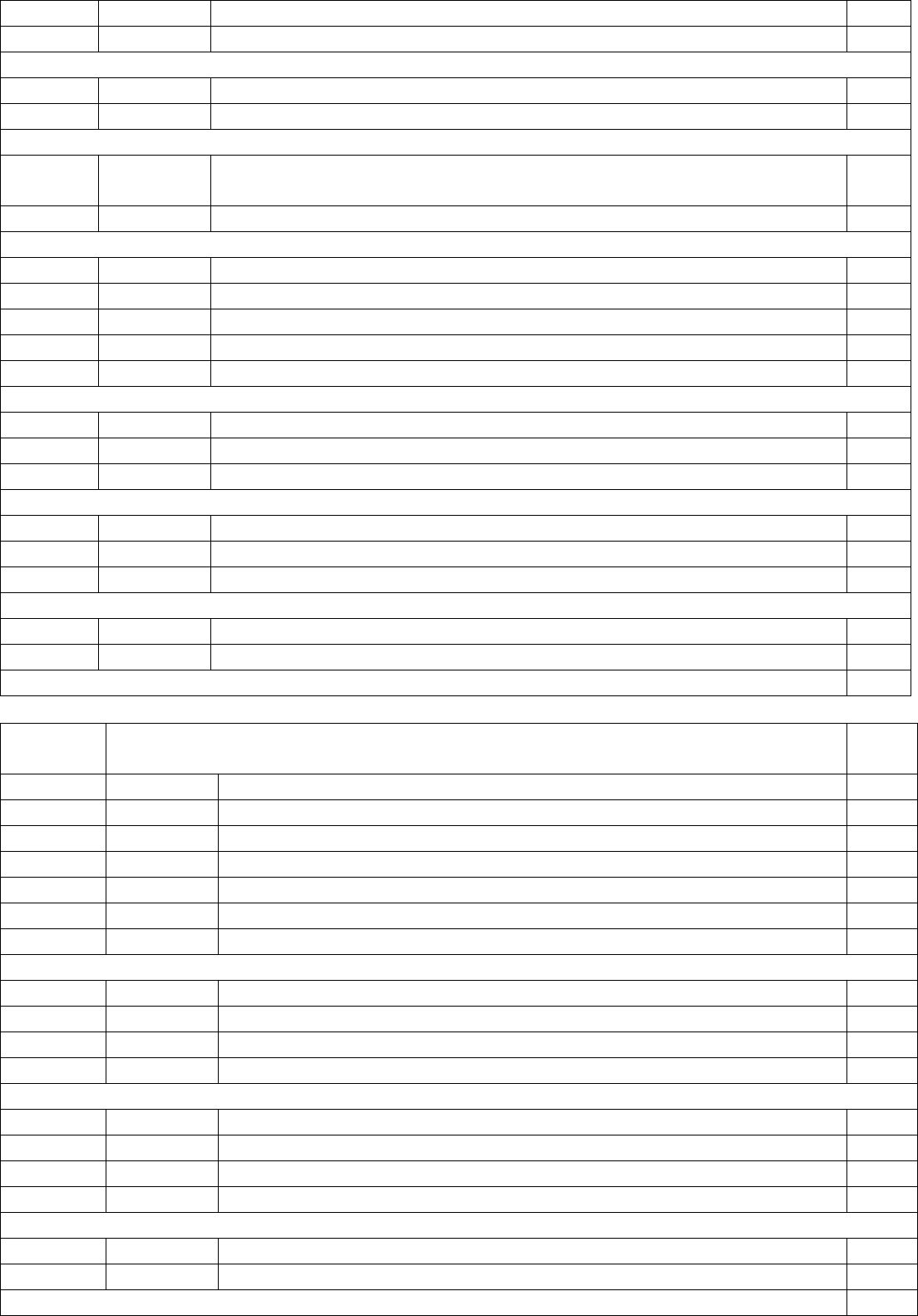
NURS 6045
Professional Formation I: Roles and Contexts for Advanced Nursing Practice
1
NURS 6811
Reproductive Anatomy and Physiology
2
Spring 1
NURS 6024
Advanced Pharmacology
3
NURS 6055
Professional Formation II: Evidence Based Change in Healthcare Environments
3
Summer 1
NURS 6065
Professional Formation III: Leading Collaborative Change: Improving Delivery of Healthcare
to Patients and Populations
4
NURS 6838
Postpartum and Neonatal Care for Nurse-Midwifery
2
Fall 2
NURS 6013
Advanced Health Assessment
2
NURS 6014
Advanced Health Assessment Lab
1
NURS 6805
Advanced Health Assessment Applications for Nurse-Midwifery
1
NURS 6810
Gynecologic, Reproductive and Sexual Health for Nurse Midwifery
3
NURS 6812
Evolution of Midwifery in America
2
Spring 2
NURS 6030
Advanced Practice Nursing in Primary Care of the Adult
3
NURS 6821
Antepartal Care for Nurse-Midwifery
3
NURS 6825
Practicum in Gynecologic, Antepartum, and Primary Care
3
Summer 2
NURS 6831
Skills for Nurse-Midwifery
1
NURS 6835
Practicum in Intrapartum, Postpartum and Newborn Nurse-Midwifery Care
4
NURS 6836
Intrapartum Care for Nurse-Midwifery
3
Fall 3
NURS 6841
NMW Role Synthesis, Exploration, and Analysis
2
NURS 6895
Advanced Clinical Integration Experience for Nurse-Midwifery
5
Total Hours
52
Nurse-Midwifery Sample Curriculum Plan for Post Master’s Certificate
Semester Course Number and Name
Credit
Hours
Fall 1
NURS 6022
Advanced Physiology/Pathophysiology
4
NURS 6013
Advanced Health Assessment
2
NURS 6014
Advanced Health Assessment Lab
1
NURS 6805
Advanced Health Assessment Applications for Nurse-Midwifery
1
NURS 6811
Reproductive Anatomy and Physiology
2
NURS 6810
Gynecologic, Reproductive and Sexual Health for Nurse Midwifery
3
NURS 6812
Evolution of Midwifery in America
2
Spring 1
NURS 6024
Advanced Pharmacology
3
NURS 6030
Advanced Practice Nursing in Primary Care of the Adult
3
NURS 6821
Antepartal Care for Nurse-Midwifery
3
NURS 6825
Practicum in Gynecologic, Antepartum, and Primary Care
3
Summer 1
NURS 6831
Skills for Nurse-Midwifery
1
NURS 6835
Practicum in Intrapartum, Postpartum and Newborn Nurse-Midwifery Care
4
NURS 6836
Intrapartum Care for Nurse-Midwifery
3
NURS 6838
Postpartum and Neonatal Care for Nurse-Midwifery
2
Fall 2
NURS 6841
NMW Role Synthesis, Exploration, and Analysis
2
NURS 6895
Advanced Clinical Integration Experience for Nurse-Midwifery
5
Total Hours
44
160
VUSN MSN, POST-MASTER’S CERTIFICATE, and DNP Student Handbook 2023-2024

• Sample only. All admitted post-master’s students will have an individualized curriculum plan based on a gap analysis complete by
the Academic Director of the program. As part of the post-master’s certificate (PMC) application
https://apply.vanderbilt.edu/apply/, all applicants are required to provide syllabi for previous master’s level courses in advanced
health assessment, advanced pathophysiology and advanced pharmacology. Whether or not a PMC student needs to retake one or
all of these courses is determined based on the guidelines below:
a. APRN certified PMC applicants/students who have previously taken an equivalent Advanced Health Assessment, Advanced
Pathophysiology, and Advanced Pharmacology, and have maintained certification (reported on the application), will not be required
to repeat these courses. Course equivalency will be determined by syllabi review.
b. Non-APRN certified PMC applicants/students will be required to take VUSN Advanced Health Assessment, Advanced
Pathophysiology, and Advanced Pharmacology courses unless they satisfy requirements specified in item c.
c. If a non-APRN certified student has previously taken one or more of these three courses in the last 5 years (5 years or less at the
time of matriculation) the student must provide the syllabi to be reviewed for equivalency. If the course is determined to be
equivalent to the VUSN course, was taken within the last 5 years and the grade earned was a B- or higher, the course may be
waived. Note: Determination of equivalency does not mean that VUSN transfer credit has been awarded. Equivalent courses will not
appear on the VU transcript.
161
VUSN MSN, POST-MASTER’S CERTIFICATE, and DNP Student Handbook 2023-2024
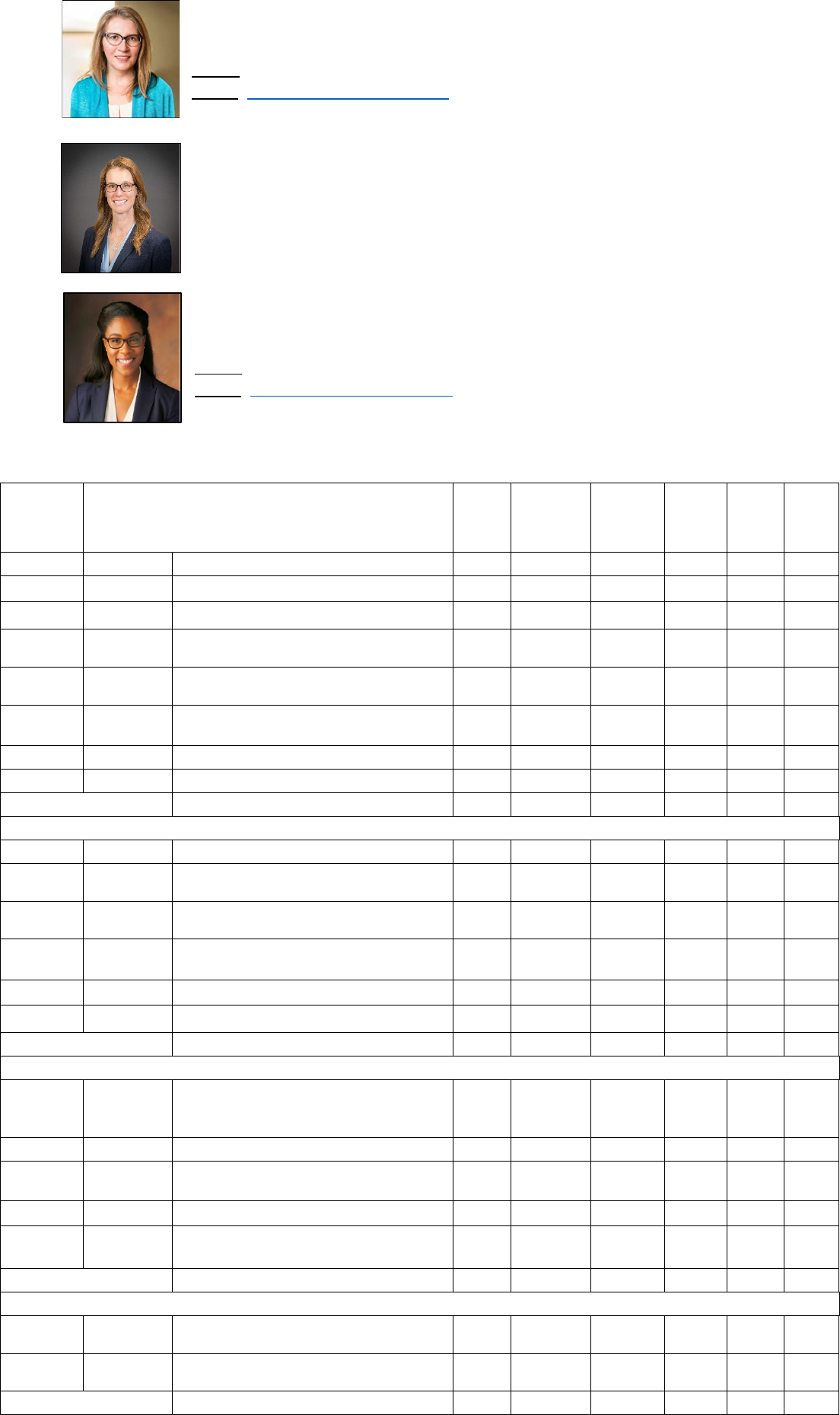
NURSE-MIDWIFERY/FAMILY NURSE PRACTITIONER DUAL FOCUS (NM/FNP)
Julia Phillippi, PhD, CNM, FACNM, FAAN
Director, Nurse-Midwifery Specialty
286 School of Nursing
Phone: 615.343.2683
E-mail: [email protected]
Until September 30, 2023
Kendra Faucett, DNP, CNM, APRN, CNE, FACNM
Director, Nurse-Midwifery Specialty
Effective October 1, 2023
Julia Steed, PhD, RN, FNP-BC
Director, Family NP Specialty
358 Frist Hall
Phone: 615.343.3288
E-mail: [email protected]
Nurse-Midwifery/Family Nurse Practitioner Specialty Curriculum Plan and Required
Hours
Semester Course Number and Name
Credit
Hours
Didactic
Clock
Hours
Seminar
Clock
Hours
Clinical
Clock
Hours
Lab
Clock
Hours
Total
Clock
Hours
Fall 1
NURS 6022
Advanced Physiology/Pathophysiology
4
56
56
NURS 6013
Advanced Health Assessment
2
28
28
NURS 6014
Advanced Health Assessment Lab
1
28
28
NURS 6045
Professional Formation I: Roles and
Contexts for Advanced Nursing Practice
1
14
14
NURS 6805
Advanced Health Assessment Applications
for Nurse-Midwifery
1
35
14
49
NURS 6810
Gynecologic, Reproductive and Sexual
Health for Nurse Midwifery
3
42
42
NURS 6811
Reproductive Anatomy and Physiology
2
28
28
NURS 6812
Evolution of Midwifery in America
2
28
28
Semester Total
16
196
0
35
42
273
Spring 1
NURS 6024
Advanced Pharmacology
3
42
42
NURS 6030
Advanced Practice Nursing In Primary Care
of the Adult
3
42
42
NURS 6055
Professional Formation II: Evidence Based
Change in Healthcare Environments
3
42
42
NURS 6545
Practicum in Primary Health Care of the
Adult
2
140
140
NURS 6815
Nurse-Midwifery Practicum I
2
140
140
NURS 6821
Antepartal Care for Nurse-Midwifery
3
42
42
Semester Total
16
168
0
280
0
448
Summer 1
NURS 6065
Professional Formation III: Leading
Collaborative Change: Improving Delivery
of Healthcare to Patients and Populations
4
56
56
NURS 6831
Skills for Nurse-Midwifery
1
28
28
NURS 6835
Practicum in Intrapartum, Postpartum and
Newborn Nurse-Midwifery Care
4
280
280
NURS 6836
Intrapartum Care for Nurse-Midwifery
3
42
42
NURS 6838
Postpartum and Neonatal Care for Nurse-
Midwifery
2
28
28
Semester Total
14
126
0
280
28
434
Fall 2
NURS 6841
Nurse-Midwifery Role Synthesis,
Exploration, and Analysis
2
28
28
NURS 6895
Advanced Clinical Integration Experience
for Nurse-Midwifery
5
350
350
Semester Total
7
28
0
350
0
378
162
VUSN MSN, POST-MASTER’S CERTIFICATE, and DNP Student Handbook 2023-2024
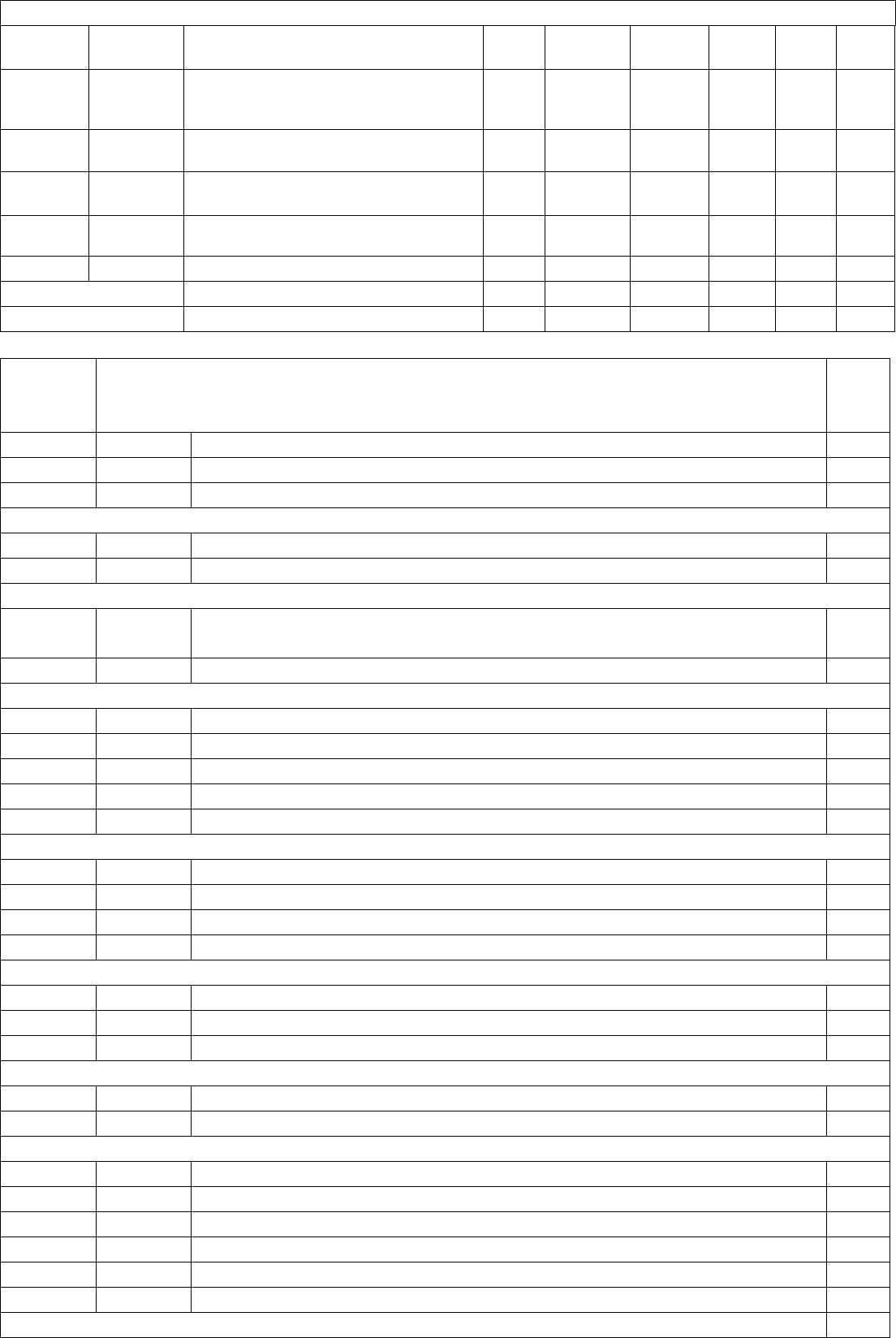
Spring 2
NURS 6036
Advanced Practice Nursing in Primary Care
of the Child and Adolescent
3
42
42
NURS 6521
The Context of Primary Care: FNP
Domains & Core Competencies for
Practice
1
14
14
NURS 6510
Essential Procedures for the Family Nurse
Practitioner
1
28
28
NURS 6532
Advanced Practice Nursing in Primary Care
of the Older Adult
1
14
14
NURS 6555
Practicum in Primary Health Care of the
Family
2
140
140
NURS 6585
Family Nurse Practitioner Preceptorship
4
280
280
Semester Total
12
70
0
420
28
518
Program Total
65
588
0
1365
98
2051
Nurse-Midwifery/Family Nurse Practitioner Part-Time Curriculum Plan
Semester Course Number and Name
Credit
Hours
Fall 1
NURS 6022
Advanced Physiology/Pathophysiology
4
NURS 6045
Professional Formation I: Roles and Contexts for Advanced Nursing Practice
1
NURS 6811
Reproductive Anatomy and Physiology
2
Spring 1
NURS 6024
Advanced Pharmacology
3
NURS 6055
Professional Formation II: Evidence Based Change in Healthcare Environments
3
Summer 1
NURS 6065
Professional Formation III: Leading Collaborative Change: Improving Delivery of Healthcare to
Patients and Populations
4
NURS 6838
Postpartum and Neonatal Care for Nurse-Midwifery
2
Fall 2
NURS 6013
Advanced Health Assessment
2
NURS 6014
Advanced Health Assessment Lab
1
NURS 6805
Advanced Health Assessment Applications for Nurse-Midwifery
1
NURS 6810
Gynecologic, Reproductive and Sexual Health for Nurse Midwifery
3
NURS 6812
Evolution of Midwifery in America
2
Spring 2
NURS 6030
Advanced Practice Nursing in Primary Care of the Adult
3
NURS 6545
Practicum in Primary Health Care of the Adult
2
NURS 6815
Nurse-Midwifery Practicum I
2
NURS 6821
Antepartal Care for Nurse-Midwifery
3
Summer 2
NURS 6831
Skills for Nurse-Midwifery
1
NURS 6835
Practicum in Intrapartum, Postpartum and Newborn Nurse-Midwifery Care
4
NURS 6836
Intrapartum Care for Nurse-Midwifery
3
Fall 3
NURS 6841
Nurse-Midwifery Role Synthesis, Exploration, and Analysis
2
NURS 6895
Advanced Clinical Integration Experience for Nurse-Midwifery
5
Spring 3
NURS 6036
Advanced Practice Nursing in Primary Care of the Child and Adolescent
3
NURS 6521
The Context of Primary Care: FNP Domains & Core Competencies for Practice
1
NURS 6510
Essential Procedures for the Family Nurse Practitioner
1
NURS 6532
Advanced Practice Nursing in the Primary Care of the Older Adult
1
NURS 6555
Practicum in Primary Health Care of Family
2
NURS 6585
Family Nurse Practitioner Preceptorship
4
Total Hours
65
163
VUSN MSN, POST-MASTER’S CERTIFICATE, and DNP Student Handbook 2023-2024
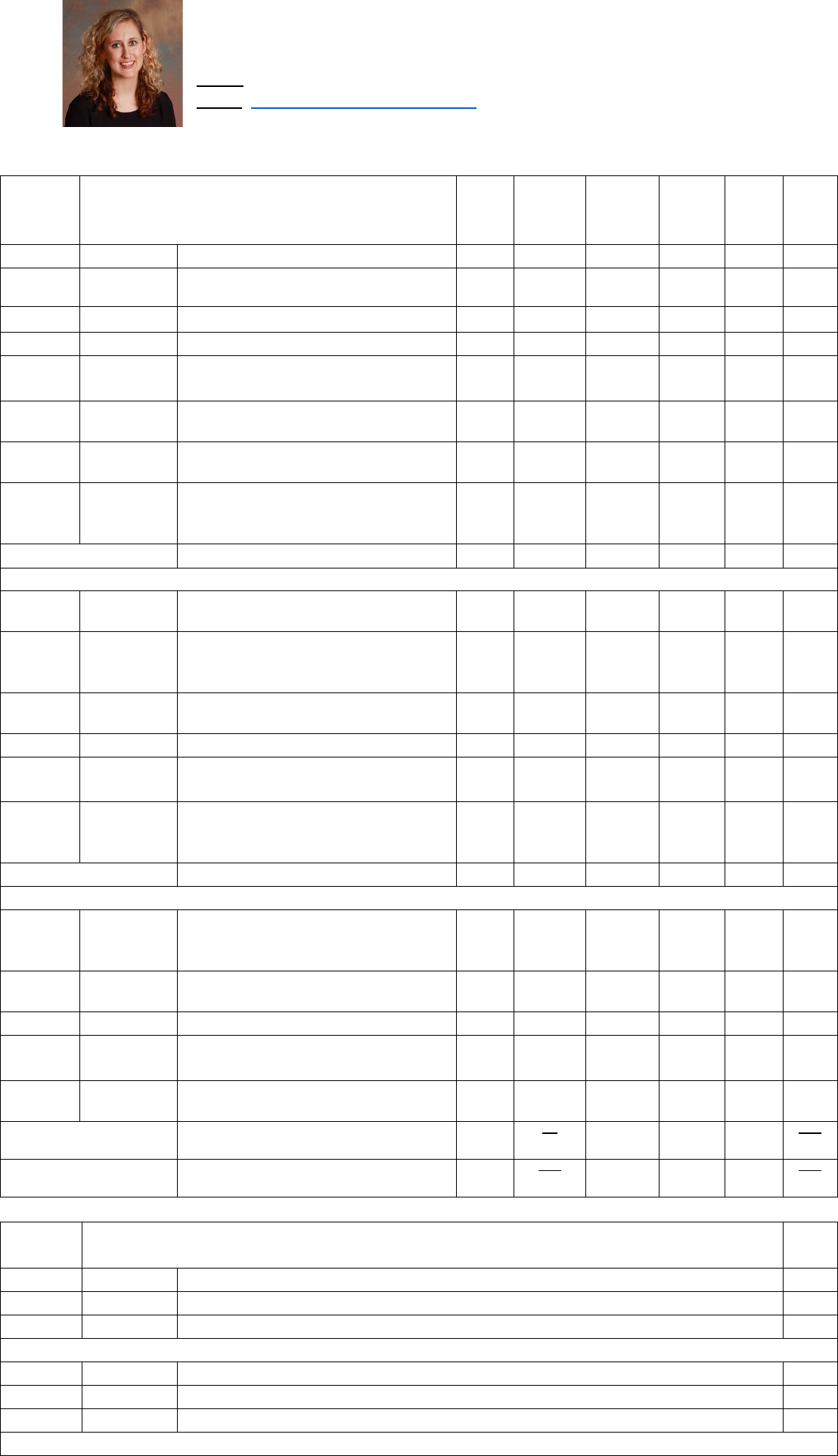
PSYCHIATRIC-MENTAL HEALTH NURSE PRACTITIONER (Lifespan) (PMHNP)
Megan Simmons, DNP, PMHNP-BC
Director, Psychiatric Mental Health NP (Lifespan) Specialty
210 Godchaux Hall
Phone: 615.875.8373
E-mail: megan.simmons@vanderbilt.edu
Amendment (August 28, 2023): NURS 7232 revised to include didactic clock hours.
Psychiatric-Mental Health Nurse Practitioner (Lifespan) Curriculum Plan and Required Hours
Semester Course Number and Name
Credit
Hours
Didactic
Clock
Hours
Seminar
Clock
Hours
Clinical
Clock
Hours
Lab
Clock
Hours
Total
Clock
Hours
Fall
NURS 6022
Advanced Physiology/Pathophysiology
4
56
56
NURS 6013
Advanced Health Assessment
2
28
28
NURS 6014
Advanced Health Assessment Lab
1
28
28
NURS 6024
Advanced Pharmacology
3
42
42
NURS 6045
Professional Formation I: Roles and
Contexts for Advanced Nursing Practice
1
14
14
NURS 7212
Models and Theories of Psychiatric Mental
Health Nursing
2
28
28
NURS 7214
Diagnostic Reasoning for the Psychiatric
Mental Health Nurse Practitioner (Part I)
2
28
28
NURS 7215
Theoretical Foundations and Practicum for
Psychiatric-Mental Health Nursing Across
the Lifespan
1
70
70
Semester Total
16
196
0
70
28
294
Spring
NURS 6055
Professional Formation II: Evidence Based
Change in Healthcare Environments
3
42
42
NURS 7205
Advanced Health Assessment Applications
for the Psychiatric-Mental Health Nurse
Practitioner
1
70
70
NURS 7221
Neuroscience for Mental Health
Practitioners
3
42
42
NURS 7222
Psychopharmacology
2
28
28
NURS 7224
Diagnostic Reasoning for the Psychiatric
Mental Health Nurse Practitioner (Part II)
1
14
14
NURS 7225
Practicum in Psychiatric-Mental Health
Nursing with Individuals, Groups and
Families
3
210
210
Semester Total
13
126
0
280
0
406
Summer
NURS 6065
Professional Formation III: Leading
Collaborative Change: Improving Delivery
of Healthcare to Patients and Populations
4
42
42
NURS 7231
Population-Based Mental Health Care
Across the Lifespan
2
28
28
NURS 7232
Advanced Psychopharmacology
2
28
28
NURS 7294
Diagnostic Reasoning for the Psychiatric
Mental Health Nurse Practitioner (Part III)
1
14
14
NURS 7295
Psychiatric-Mental Health Nurse
Practitioner Preceptorship
3
210
210
Semester Total
12
84
112
0
210
0
294
322
Program Total
41
406
434
0
560
28
994
1,022
Psychiatric-Mental Health Nurse Practitioner (Lifespan) 2-Year, Part-Time Curriculum Plan
Semester Course Number and Name
Credit
Hours
Fall 1
NURS 6022
Advanced Physiology/Pathophysiology
4
NURS 6024
Advanced Pharmacology
3
NURS 6045
Professional Formation I: Roles and Contexts for Advanced Nursing Practice
1
Spring 1
NURS 6055
Professional Formation II: Evidence Based Change in Healthcare Environments
3
NURS 7221
Neuroscience for Mental Health Practitioners
3
NURS 7222
Psychopharmacology
2
164
VUSN MSN, POST-MASTER’S CERTIFICATE, and DNP Student Handbook 2023-2024

Summer 1
NURS 6065
Professional Formation III: Leading Collaborative Change: Improving Delivery of Healthcare to
Patients and Populations
4
NURS 7232
Advanced Psychopharmacology
2
Fall 2
NURS 6013
Advanced Health Assessment
2
NURS 6014
Advanced Health Assessment Lab
1
NURS 7212
Models and Theories of Psychiatric Mental Health Nursing
2
NURS 7214
Diagnostic Reasoning for the Psychiatric Mental Health Nurse Practitioner (Part I)
2
NURS 7215
Theoretical Foundations and Practicum for Psychiatric-Mental Health Nursing Across the
Lifespan
1
Spring 2
NURS 7205
Advanced Health Assessment Applications for the Psychiatric-Mental Health Nurse Practitioner
1
NURS 7224
Diagnostic Reasoning for the Psychiatric Mental Health Nurse Practitioner (Part II)
1
NURS 7225
Practicum in Psychiatric-Mental Health Nursing with Individuals, Groups and Families
3
Summer 2
NURS 7231
Population-Based Mental Health Care Across the Lifespan
2
NURS 7294
Diagnostic Reasoning for the Psychiatric Mental Health Nurse Practitioner (Part III)
1
NURS 7295
Psychiatric-Mental Health Nurse Practitioner Preceptorship
3
Total Hours
41
MSN in Psychiatric-Mental Health Nurse Practitioner (Lifespan) Post Master’s Certificate Option
Semester Course Number and Name
Credit
Hours
Fall
NURS 6022
Advanced Physiology/Pathophysiology
4
NURS 6013
Advanced Health Assessment
2
NURS 6014
Advanced Health Assessment Lab
1
NURS 6024
Advanced Pharmacology
3
NURS 7212
Models and Theories of Psychiatric Mental Health Nursing
2
NURS 7214
Diagnostic Reasoning for the Psychiatric Mental Health Nurse Practitioner (Part I)
2
NURS 7215
Theoretical Foundations and Practicum for Psychiatric-Mental Health Nursing Across the
Lifespan
1
Spring
NURS 7205
Advanced Health Assessment Applications for the Psychiatric-Mental Health Nurse Practitioner
1
NURS 7221
Neuroscience for Mental Health Practitioners
3
NURS 7222
Psychopharmacology
2
NURS 7224
Diagnostic Reasoning for the Psychiatric Mental Health Nurse Practitioner (Part II)
1
NURS 7225
Practicum in Psychiatric-Mental Health Nursing with Individuals, Groups and Families
3
Summer
NURS 7231
Population-Based Mental Health Care Across the Lifespan
2
NURS 7232
Advanced Psychopharmacology
2
NURS 7294
Diagnostic Reasoning for the Psychiatric Mental Health Nurse Practitioner (Part III)
1
NURS 7295
Psychiatric-Mental Health Nurse Practitioner Preceptorship
3
Total Hours
33
• Sample only. All admitted post-master’s students will have an individualized curriculum plan based on a gap analysis complete by
the Academic Director of the program. As part of the post-master’s certificate (PMC) application https://apply.vanderbilt.edu/apply/,
all applicants are required to provide syllabi for previous master’s level courses in advanced health assessment, advanced
pathophysiology and advanced pharmacology. Whether or not a PMC student needs to retake one or all of these courses is
determined based on the guidelines below:
a. APRN certified PMC applicants/students who have previously taken an equivalent Advanced Health Assessment, Advanced
Pathophysiology, and Advanced Pharmacology, and have maintained certification (reported on the application), will not be required
to repeat these courses. Course equivalency will be determined by syllabi review.
b. Non-APRN certified PMC applicants/students will be required to take VUSN Advanced Health Assessment, Advanced
Pathophysiology, and Advanced Pharmacology courses unless they satisfy requirements specified in item c.
c. If a non-APRN certified student has previously taken one or more of these three courses in the last 5 years (5 years or less at the
time of matriculation) the student must provide the syllabi to be reviewed for equivalency. If the course is determined to be
equivalent to the VUSN course, was taken within the last 5 years and the grade earned was a B- or higher, the course may be waived.
Note: Determination of equivalency does not mean that VUSN transfer credit has been awarded. Equivalent courses will not appear
on the VU transcript.
MSN in Psychiatric-Mental Health Nurse Practitioner with Nurse Foundation* Post Master’s
Certificate Option
Semester Course Number and Name
Credit
Hours
Fall
NURS 7212
Models and Theories of Psychiatric Mental Health Nursing
2
NURS 7214
Diagnostic Reasoning for the Psychiatric Mental Health Nurse Practitioner (Part I)
2
NURS 7215
Theoretical Foundations and Practicum for Psychiatric-Mental Health Nursing Across the
Lifespan
1
165
VUSN MSN, POST-MASTER’S CERTIFICATE, and DNP Student Handbook 2023-2024
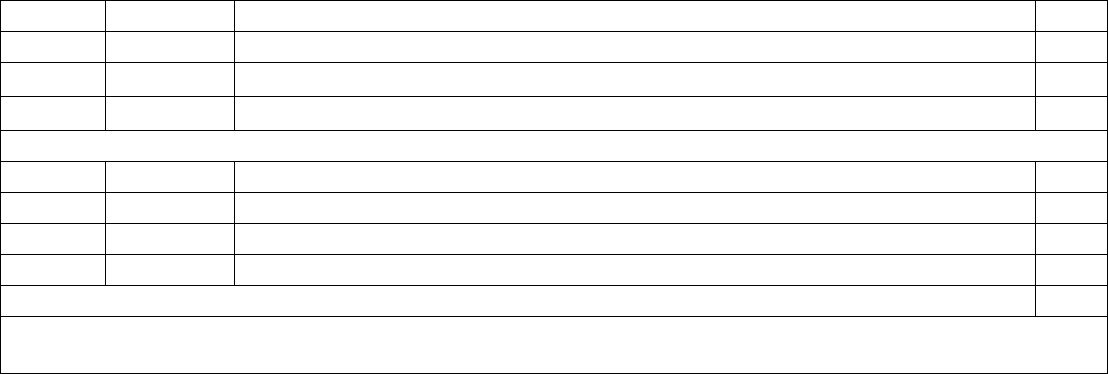
Spring
NURS 7221
Neuroscience for Mental Health Practitioners
3
NURS 7222
Psychopharmacology
2
NURS 7224
Diagnostic Reasoning for the Psychiatric Mental Health Nurse Practitioner (Part II)
1
NURS 7225
Practicum in Psychiatric-Mental Health Nursing with Individuals, Groups and Families
3
Summer
NURS 7231
Population-Based Mental Health Care Across the Lifespan
2
NURS 7232
Advanced Psychopharmacology
2
NURS 7294
Diagnostic Reasoning for the Psychiatric Mental Health Nurse Practitioner (Part III)
1
NURS 7295
Psychiatric-Mental Health Nurse Practitioner Preceptorship
3
Total Hours
22
*Course of Studies individualized based on portfolio review and Gap Analysis. Sample for applicants with Nurse Practitioner
background but no psychiatric-mental health course work.
166
VUSN MSN, POST-MASTER’S CERTIFICATE, and DNP Student Handbook 2023-2024
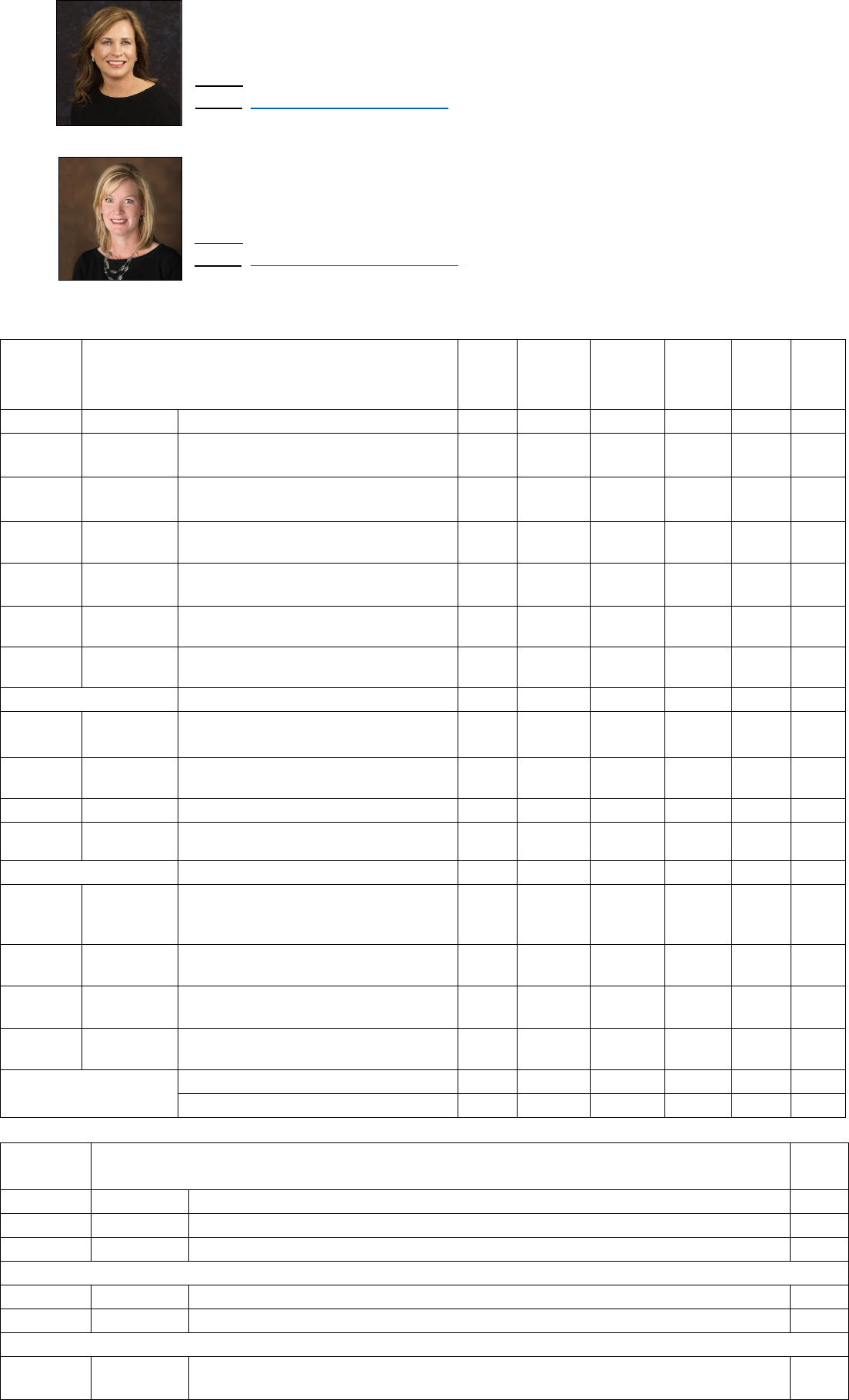
PEDIATRIC NURSE PRACTITIONER - ACUTE CARE (PNP-AC)
Misty Evans, DNP, APRN, CPNP-AC
Interim Director, Pediatric NP-Acute Care Specialty
306 Godchaux Hall
Phone: 615.343.2370
E-mail: misty.evans@vanderbilt.edu
Until December 31, 2023
Kim Steanson, DNP, APRN, CPNP-PC/AC
Director, Pediatric NP-Acute Care Specialty
308 Godchaux Hall
Phone: 615.875.8750
E-mail: kim.steanson@vanderbilt.edu
Effective January 1, 2024
Pediatric Nurse Practitioners – Acute Care Specialty Curriculum Plan and Required Hours
Semester Course Number and Name
Credit
Hours
Didactic
Clock
Hours
Seminar
Clock
Hours
Clinical
Clock
Hours
Lab
Clock
Hours
Total
Clock
Hours
Fall
NURS 6022
Advanced Physiology/Pathophysiology
4
56
56
NURS 6045
Professional Formation I: Roles and
Contexts for Advanced Nursing Practice
1
14
14
NURS 7011
Health Promotion of Behavior
Development: Birth through Adolescence
3
28
28
56
NURS 7012
Advanced Practice Nursing in Pediatric
Primary Care I
3
42
42
NURS 6013
Advanced Health Assessment
2
28
28
NURS 6014
Advanced Health Assessment Lab
1
28
28
NUR 7055
Clinical Applications for the Pediatric
Acute Care Nurse Practitioner
1
70
70
Semester Total
15
168
28
70
286
294
Spring
NURS 6055
Professional Formation II: Evidence Based
Change in Healthcare Environments
3
42
42
NURS 7022
Advanced Practice Nursing in Pediatric
Acute Care I
3
28
28
56
NURS 6024
Advanced Pharmacology
3
42
42
NURS 7045
Advanced Practice Nursing Pediatric
Acute Care Practicum I
4
280
280
Semester Total
13
112
28
280
0
420
Summer
NURS 6065
Professional Formation III: Leading
Collaborative Change: Improving Delivery
of Healthcare to Patients and Populations
4
56
56
NURS 6075
Professional Formation IV: Transition to
Advanced Nursing Practice
1
14
14
NURS 7031
Advanced Practice Nursing Pediatric
Acute Care II
3
28
28
56
NURS 7095
Advanced Practice Nursing Pediatric
Acute Care Practicum 11
4
280
280
Semester Total
12
98
28
280
0
406
Program Total
40
420
84
630
56
1120
Pediatric Nurse Practitioner - Acute Care Specialty Track 2-Year, Part-Time Curriculum Plan
Semester Course Number and Name
Credit
Hours
Fall 1
NURS 6022
Advanced Physiology/Pathophysiology
4
NURS 6045
Professional Formation I: Roles and Contexts for Advanced Nursing Practice
1
NURS 7011
Health Promotion of Behavior Development: Birth through Adolescence
3
Spring 1
NURS 6055
Professional Formation II: Evidence Based Change in Healthcare Environments
3
NURS 6024
Advanced Pharmacology
3
Summer 1
NURS 6065
Professional Formation III: Leading Collaborative Change: Improving Delivery of Healthcare to
Patients and Populations
4
167
VUSN MSN, POST-MASTER’S CERTIFICATE, and DNP Student Handbook 2023-2024
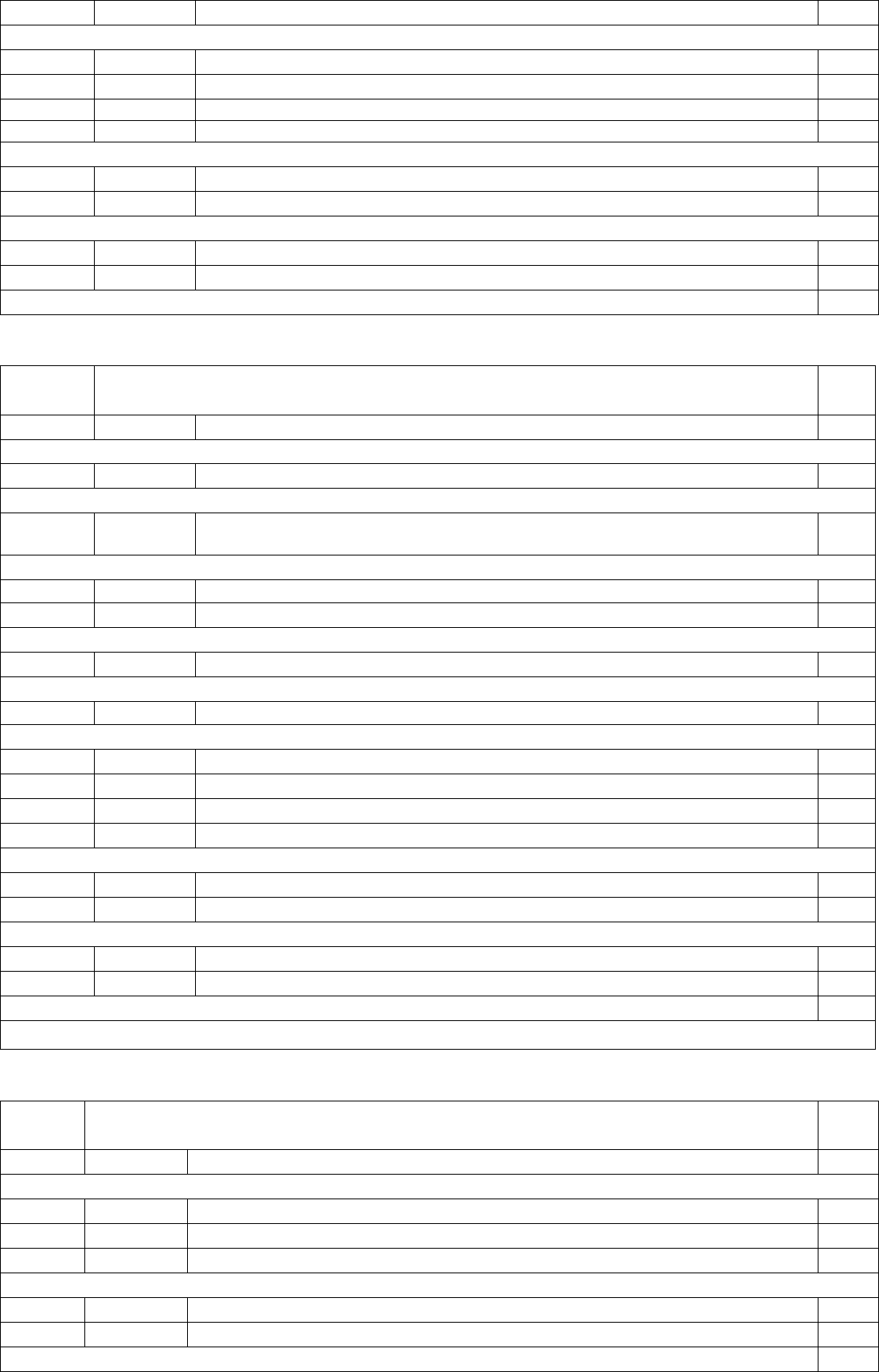
NURS 6075
Professional Formation IV: Transition to Advanced Nursing Practice
1
Fall 2
NURS 7012
Advanced Practice Nursing in Pediatric Primary Care I
3
NURS 6013
Advanced Health Assessment
2
NURS 6014
Advanced Health Assessment Lab
1
NURS 7055
Clinical Applications for the Pediatric Acute Care Nurse Practitioner
1
Spring 2
NURS 7022
Advanced Practice Nursing in Pediatric Acute Care I
3
NURS 7045
Advanced Practice Nursing in Pediatric Acute Care Practicum I
4
Summer 2
NURS 7031
Advanced Practice Nursing in Pediatric Acute Care II
3
NURS 7095
Advanced Pediatric Acute Care Practicum II
4
Total Hours
40
Pediatric Nurse Practitioner - Acute Care Specialty Track 3-Year, Part-Time Curriculum Plan:
VUMC Employees Only
Semester Course Number and Name
Credit
Hours
Fall 1
NURS 6045
Professional Formation I: Roles and Contexts for Advanced Nursing Practice
1
Spring 1
NURS 6055
Professional Formation II: Evidence Based Change in Healthcare Environments
3
Summer 1
NURS 6065
Professional Formation III: Leading Collaborative Change: Improving Delivery of Healthcare to
Patients and Populations
4
Fall 2
NURS 6022
Advanced Physiology/Pathophysiology
4
NURS 7011
Health Promotion of Behavior Development: Birth through Adolescence
3
Spring 2
NURS 6024
Advanced Pharmacology
3
Summer 2
NURS 6075
Professional Formation IV: Transition to Advanced Nursing Practice
1
Fall 3
NURS 7012
Advanced Practice Nursing in Pediatric Primary Care, Part I
3
NURS 6013
Advanced Health Assessment
2
NURS 6014
Advanced Health Assessment Lab
1
NURS 7055
Clinical Applications for the Pediatric Acute Care Nurse Practitioner
1
Spring 3
NURS 7022
Advanced Practice Nursing in Pediatric Acute Care - I
3
NURS 7045
Advanced Practice Nursing in Pediatric Acute Care Practicum - I
4
Summer 3
NURS 7031
Advanced Practice Nursing in Pediatric Acute Care - II
3
NURS 7095
Advanced Practice Nursing in Pediatric Acute Care Practicum - II
4
Total Hours
40
For specific information regarding this program, please contact the PNP-Acute Care Specialty Director
Primary Care PNP’s adding Pediatric Acute Care *
Post Master’s Certificate Curriculum Plan
Semester Course Number and Name
Credit
Hours
Fall
NURS 7055
Clinical Applications for the Pediatric Acute Care Nurse Practitioner
1
Spring
NURS 7022
Advanced Practice Nursing in Pediatric Acute Care I
3
NURS 7045
Advanced Practice Nursing in Pediatric Acute Care Practicum I
4
Summer
NURS 7031
Advanced Practice Nursing in Pediatric Acute Care II
3
NURS 7095
Advanced Practice Nursing in Pediatric Acute Care Practicum II
4
Total Hours
15
168
VUSN MSN, POST-MASTER’S CERTIFICATE, and DNP Student Handbook 2023-2024
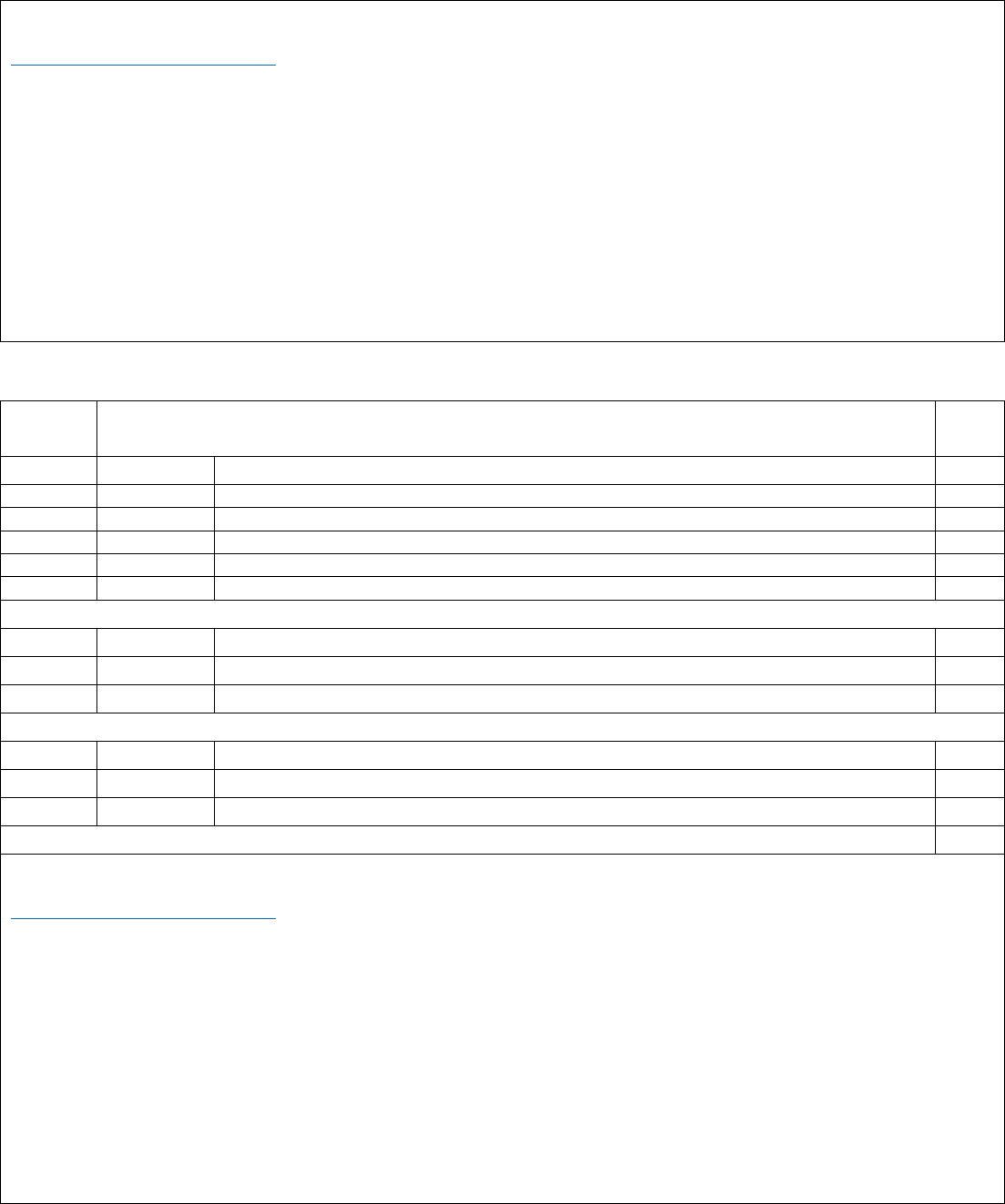
• Sample only. All admitted post-master’s students will have an individualized curriculum plan based on a gap analysis complete by
the Academic Director of the program. As part of the post-master’s certificate (PMC) application
https://apply.vanderbilt.edu/apply/, all applicants are required to provide syllabi for previous master’s level courses in advanced
health assessment, advanced pathophysiology and advanced pharmacology. Whether or not a PMC student needs to retake one or
all of these courses is determined based on the guidelines below:
a. APRN certified PMC applicants/students who have previously taken an equivalent Advanced Health Assessment, Advanced
Pathophysiology, and Advanced Pharmacology, and have maintained certification (reported on the application), will not be required
to repeat these courses. Course equivalency will be determined by syllabi review.
b. Non-APRN certified PMC applicants/students will be required to take VUSN Advanced Health Assessment, Advanced
Pathophysiology, and Advanced Pharmacology courses unless they satisfy requirements specified in item c.
c. If a non-APRN certified student has previously taken one or more of these three courses in the last 5 years (5 years or less at the
time of matriculation) the student must provide the syllabi to be reviewed for equivalency. If the course is determined to be
equivalent to the VUSN course, was taken within the last 5 years and the grade earned was a B- or higher, the course may be waived.
Note: Determination of equivalency does not mean that VUSN transfer credit has been awarded. Equivalent courses will not appear
on the VU transcript.
Non-PNP’s adding Pediatric Acute Care *
Post Master’s Certificate Curriculum Plan
Semester Course Number and Name
Credit
Hours
Fall
NURS 6022
Advanced Physiology/Pathophysiology
4
NURS 7011
Health Promotion of Behavior Development: Birth through Adolescence
3
NURS 7012
Advanced Practice Nursing in Pediatric Primary Care – Part I
3
NURS 6013
Advanced Health Assessment
2
NURS 6014
Advanced Health Assessment Lab
1
NURS 7055
Clinical Applications for the Pediatric Acute Care Nurse Practitioner
1
Spring
NURS 7022
Advanced Practice Nursing in Pediatric Acute Care I
3
NURS 6024
Advanced Pharmacology
3
NURS 7045
Advanced Practice Nursing in Pediatric Acute Care Practicum I
4
Summer
NURS 7031
Advanced Practice Nursing in Pediatric Acute Care II
3
NURS 7095
Advanced Practice Nursing in Pediatric Acute Care Practicum II
4
Total Hours
31
• Sample only. All admitted post-master’s students will have an individualized curriculum plan based on a gap analysis complete by
the Academic Director of the program. As part of the post-master’s certificate (PMC) application
https://apply.vanderbilt.edu/apply/, all applicants are required to provide syllabi for previous master’s level courses in advanced
health assessment, advanced pathophysiology and advanced pharmacology. Whether or not a PMC student needs to retake one or
all of these courses is determined based on the guidelines below:
a. APRN certified PMC applicants/students who have previously taken an equivalent Advanced Health Assessment, Advanced
Pathophysiology, and Advanced Pharmacology, and have maintained certification (reported on the application), will not be required
to repeat these courses. Course equivalency will be determined by syllabi review.
b. Non-APRN certified PMC applicants/students will be required to take VUSN Advanced Health Assessment, Advanced
Pathophysiology, and Advanced Pharmacology courses unless they satisfy requirements specified in item c.
c. If a non-APRN certified student has previously taken one or more of these three courses in the last 5 years (5 years or less at the
time of matriculation) the student must provide the syllabi to be reviewed for equivalency. If the course is determined to be
equivalent to the VUSN course, was taken within the last 5 years and the grade earned was a B- or higher, the course may be waived.
Note: Determination of equivalency does not mean that VUSN transfer credit has been awarded. Equivalent courses will not appear
on the VU transcript.
169
VUSN MSN, POST-MASTER’S CERTIFICATE, and DNP Student Handbook 2023-2024
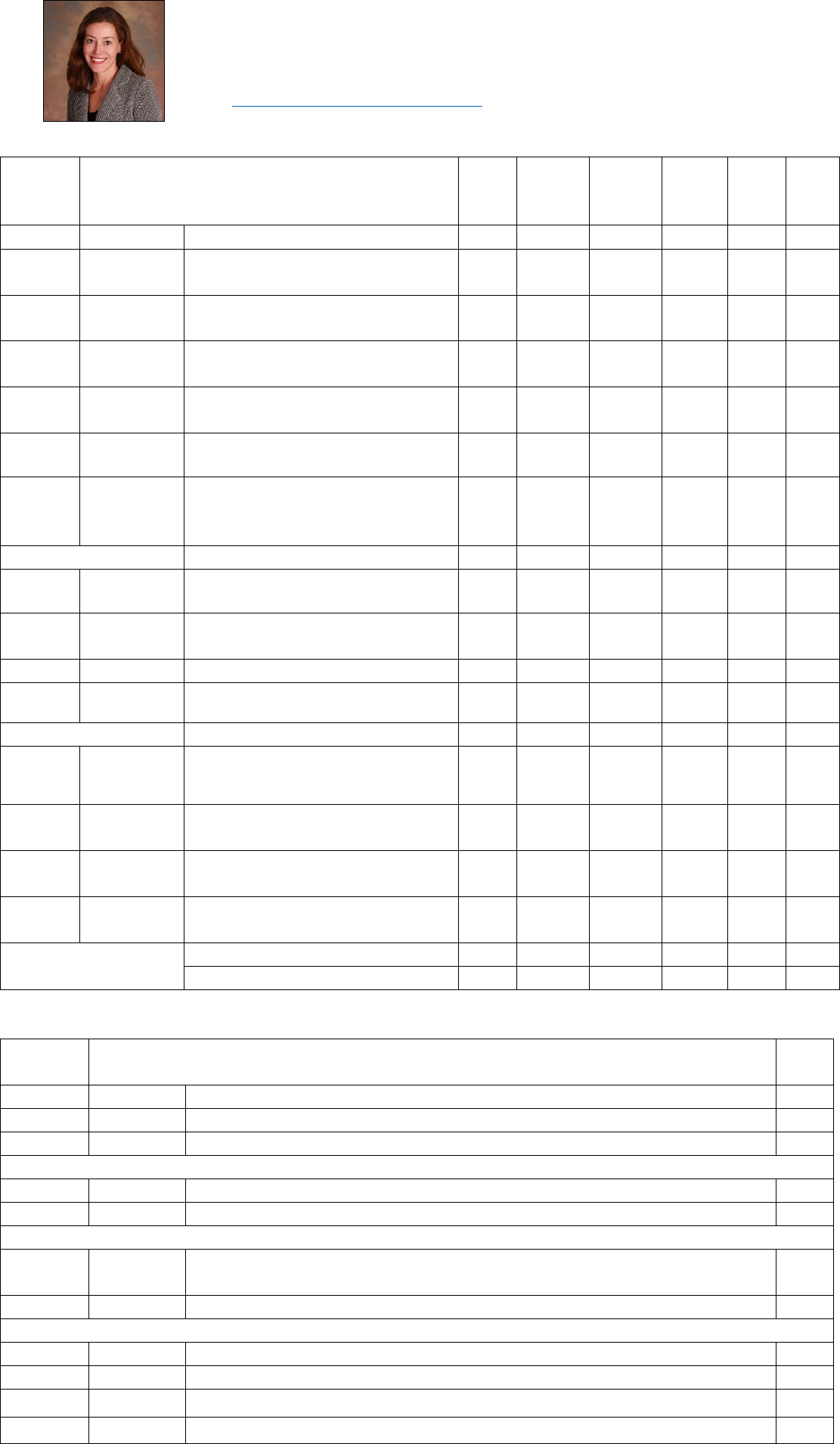
PEDIACTRIC NURSE PRACTITIONER - PRIMARY CARE (PNPPC)
Director, Pediatric NP-Primary Care Specialty, Brittany Nelson, DNP, CPNP-PC
303 Godchaux Hall
Phone: 615-322-8267
E-mail: [email protected]
Pediatric Nurse Practitioners - Primary Care Specialty Curriculum Plan and Required Hours
Semester Course Number and Name
Credit
Hours
Didactic
Clock
Hours
Seminar
Clock
Hours
Clinical
Clock
Hours
Lab
Clock
Hours
Total
Clock
Hours
Fall
NURS 6022
Advanced Physiology/Pathophysiology
4
56
56
NURS 6045
Professional Formation I: Roles and
Contexts for Advanced Nursing Practice
1
14
14
NURS 7011
Health Promotion of Behavior
Development: Birth through Adolescence
3
28
28
56
NURS 7012
Advanced Practice Nursing in Pediatric
Primary Care, Part I
3
42
42
NURS 6013
Advanced Health Assessment
2
28
28
NURS6014
Advanced Health Assessment Lab
1
28
28
NURS 7015
Advanced Health Assessment
Applications for the Primary Care
Pediatric Nurse Practitioner
1
70
70
Semester Total
15
168
28
70
28
294
Spring
NURS 6055
Professional Formation II: Evidence Based
Change in Healthcare Environments
3
42
42
NURS 7021
Advanced Practice Nursing in Pediatric
Primary Care, Part II
3
42
42
NURS 6024
Advanced Pharmacology
3
42
42
NURS 7035
Practicum in Primary Health Care of
Children
4
280
280
Semester Total
13
126
0
280
0
406
Summer
NURS 6065
Professional Formation III: Leading
Collaborative Change: Improving Delivery
of Healthcare to Patients and Populations
4
56
56
NURS 6075
Professional Formation IV: Transition to
Advanced Nursing Practice
1
14
14
NURS 7032
Current Issues in the Delivery of
Advanced Pediatric Care
2
21
14
56
NURS 7085
Advanced Pediatric Primary Care
Preceptorship
5
350
350
Semester Total
12
91
14
350
0
476
Program Total
40
385
42
700
28
1176
Pediatric Nurse Practitioners - Primary Care Specialty Track 2-Year, Part-Time Curriculum
Plan
Semester Course Number and Name
Credit
Hours
Fall 1
NURS 6022
Advanced Physiology/Pathophysiology
4
NURS 6045
Professional Formation I: Roles and Contexts for Advanced Nursing Practice
1
NURS 7011
Health Promotion of Behavior Development: Birth through Adolescence
3
Spring 1
NURS 6055
Professional Formation II: Evidence Based Change in Healthcare Environments
3
NURS 6024
Advanced Pharmacology
3
Summer 1
NURS 6065
Professional Formation III: Leading Collaborative Change: Improving Delivery of Healthcare to
Patients and Populations
4
NURS 7032
Current Issues in the Delivery of Advanced Pediatric Care
2
Fall 2
NURS 7012
Advanced Practice Nursing in Pediatric Primary Care, Part I
3
NURS 6013
Advanced Health Assessment
2
NURS 6014
Advanced Health Assessment Lab
1
NURS 7015
Advanced Health Assessment Applications for the Primary Care Pediatric Nurse Practitioner
1
170
VUSN MSN, POST-MASTER’S CERTIFICATE, and DNP Student Handbook 2023-2024

Spring 2
NURS 7021
Advanced Practice Nursing in Pediatric Primary Care, Part II
3
NURS 7035
Practicum in Acute Health Care of Children
4
Summer 2
NURS 6075
Professional Formation IV: Transition to Advanced Nursing Practice
1
NURS 7085
Advanced Pediatric Primary Care Preceptorship
5
Total Hours
40
Pediatric Nurse Practitioner - Primary Care Specialty Track 3-Year, Part-Time Curriculum
Plan: VUMC Employees Only
Semester Course Number and Name
Credit
Hours
Fall 1
NURS 6045
Professional Formation I: Roles and Contexts for Advanced Nursing Practice
1
Spring 1
NURS 6055
Professional Formation II: Evidence Based Change in Healthcare Environments
3
Summer 1
NURS 6065
Professional Formation III: Leading Collaborative Change: Improving Delivery of Healthcare to
Patients and Populations
4
Fall 2
NURS 6022
Advanced Physiology/Pathophysiology
4
NURS 7011
Health Promotion of Behavior Development: Birth through Adolescence
3
Spring 2
NURS 6024
Advanced Pharmacology
3
Summer 2
NURS 7032
Current Issues in Delivery of Advanced Pediatric Care
2
Fall 3
NURS 7012
Advanced Practice Nursing in Pediatric Primary Care, Part I
3
NURS 6013
Advanced Health Assessment
2
NURS 6014
Advanced Health Assessment Lab
1
NURS 7015
Advanced Health Assessment Applications for the Primary Care Pediatric Nurse Practitioner
1
Spring 3
NURS 7021
Advanced Practice Nursing in Pediatric Primary Care, Part II
3
NURS 7035
Practicum in Primary Health Care of Children
4
Summer 3
NURS 6075
Professional Formation IV: Transition to Advanced Nursing Practice
1
NURS 7085
Advanced Pediatric Primary Care Preceptorship
5
Total Hours
40
For specific information regarding this program, please contact the PNP-Primary Care Specialty Coordinator.
Pediatric Nurse Practitioners adding Primary* Post Master’s Certificate Curriculum Plan
Semester Course Number and Name
Credit
Hours
Fall
NURS 6022
Advanced Physiology/Pathophysiology
4
NURS 7011
Health Promotion of Behavior Development: Birth through Adolescence
3
NURS 7012
Advanced Practice Nursing in Pediatric Primary Care, Part I
3
NURS 6013
Advanced Health Assessment
2
NURS 6014
Advanced Health Assessment Lab
1
NURS 7015
Advanced Health Assessment Applications for the Primary Care Pediatric Nurse Practitioner
1
Spring
NURS 7021
Advanced Practice Nursing in Pediatric Primary Care, Part II
3
NURS 6024
Advanced Pharmacology
3
NURS 7035
Practicum in Acute Health Care of Children
4
Summer
NURS 7032
Current Issues in the Delivery of Advanced Pediatric Care
3
NURS 7085
Advanced Pediatric Primary Care Preceptorship
5
Total Hours
32
• Sample only. All admitted post-master’s students will have an individualized curriculum plan based on a gap analysis complete by
the Academic Director of the program. As part of the post-master’s certificate (PMC) application
https://apply.vanderbilt.edu/apply/, all applicants are required to provide syllabi for previous master’s level courses in advanced
health assessment, advanced pathophysiology and advanced pharmacology. Whether or not a PMC student needs to retake one or
all of these courses is determined based on the guidelines below:
a. APRN certified PMC applicants/students who have previously taken an equivalent Advanced Health Assessment, Advanced
Pathophysiology, and Advanced Pharmacology, and have maintained certification (reported on the application), will not be required
171
VUSN MSN, POST-MASTER’S CERTIFICATE, and DNP Student Handbook 2023-2024

to repeat these courses. Course equivalency will be determined by syllabi review.
b. Non-APRN certified PMC applicants/students will be required to take VUSN Advanced Health Assessment, Advanced
Pathophysiology, and Advanced Pharmacology courses unless they satisfy requirements specified in item c.
c. If a non-APRN certified student has previously taken one or more of these three courses in the last 5 years (5 years or less at the
time of matriculation) the student must provide the syllabi to be reviewed for equivalency. If the course is determined to be
equivalent to the VUSN course, was taken within the last 5 years and the grade earned was a B- or higher, the course may be waived.
Note: Determination of equivalency does not mean that VUSN transfer credit has been awarded. Equivalent courses will not appear
on the VU transcript.
172
VUSN MSN, POST-MASTER’S CERTIFICATE, and DNP Student Handbook 2023-2024
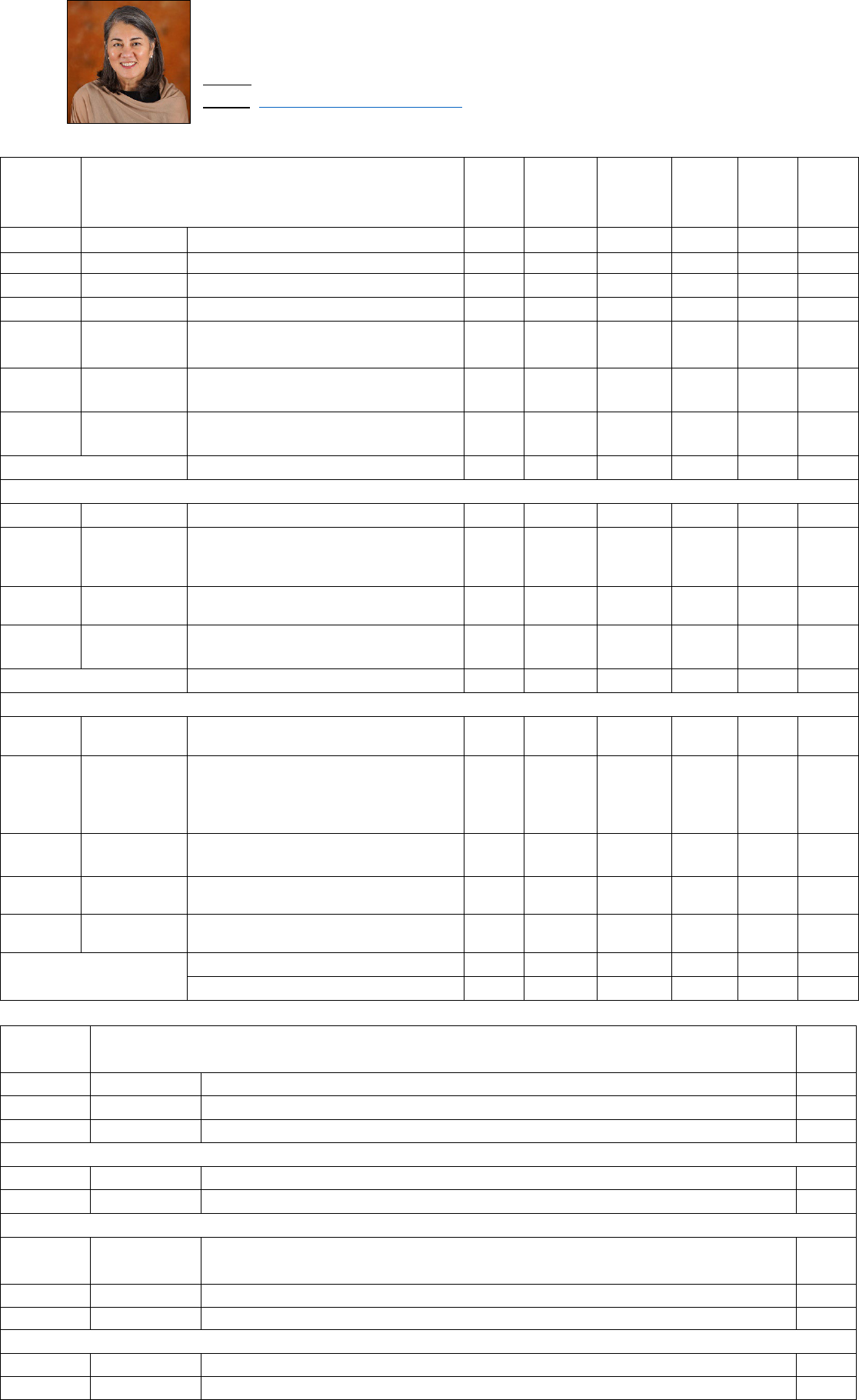
WOMEN’S HEALTH GENDER-RELATED NURSE PRACTITIONER (WHGRNP)
Ginny Moore, DNP, WHNP-BC
Director, Women's Health Gender-Related NP Specialty
603-B Godchaux Hall
Phone: 615.875.4005
E-mail: ginny.moore@vanderbilt.edu
Women’s Health Gender-Related Nurse Practitioner Curriculum Plan and Required Hours
Semester Course Number and Name
Credit
Hours
Didactic
Clock
Hours
Seminar
Clock
Hours
Clinical
Clock
Hours
Lab
Clock
Hours
Total
Clock
Hours
Fall
NURS 6013
Advanced Health Assessment
2
28
28
NURS 6014
Advanced Health Assessment Lab
1
28
28
NURS 6024
Advanced Pharmacology
3
42
42
NURS 6034
Adult-Gerontology Primary Care I
3
42
42
NURS 6045
Professional Formation I: Roles and
Contexts for Advanced Nursing Practice
1
14
14
NURS 7305
Advanced Health Assessment
Applications for the WHGRNP
1
28
28
NURS 7310
Women's & Gender-Related Health for
Advanced Practice Nursing I
3
42
42
Semester Total
14
168
0
0
56
224
Spring
NURS 6022
Advanced Physiology/Pathophysiology
4
56
56
NURS 6055
Professional Formation II: Evidence
Based Change in Healthcare
Environments
3
42
42
NURS 7315
Practicum in Women's & Gender-Related
Health
4
280
280
NURS 7320
Women's & Gender-Related Health for
Advanced Practice Nursing II
3
42
42
Semester Total
14
140
0
280
0
420
Summer
NURS 6031
Advanced Practice Nursing in Primary
Care of the Adolescent
1
14
14
NURS 6065
Professional Formation III: Leading
Collaborative Change: Improving Delivery
of Healthcare to Patients and
Populations
4
56
56
NURS 6075
Professional Formation IV: Transition to
Advanced Nursing Practice
1
14
14
NURS 7330
Women's & Gender-Related Health
Issues
1
14
14
NURS 7395
Preceptorship in Women's & Gender-
Related Health
5
350
350
Semester Total
12
98
0
350
0
448
Program Total
40
406
0
630
56
1092
Women’s Health Gender-Related Nurse Practitioner 2-Year, Part-Time Curriculum Plan
Semester Course Number and Name
Credit
Hours
Fall 1
NURS 6013
Advanced Health Assessment
2
NURS 6024
Advanced Pharmacology
3
NURS 6045
Professional Formation I: Roles and Contexts for Advanced Nursing Practice
1
Spring 1
NURS 6022
Advanced Physiology/Pathophysiology
4
NURS 6055
Professional Formation II: Evidence Based Change in Healthcare Environments
3
Summer 1
NURS 6065
Professional Formation III: Leading Collaborative Change: Improving Delivery of Healthcare
to Patients and Populations
4
NURS 6075
Professional Formation IV: Transition to Advanced Nursing Practice
1
NURS 7330
Women's & Gender-Related Health Issues
1
Fall 2
NURS 6014
Advanced Health Assessment Lab
1
NURS 6034
Adult-Gerontology Primary Care I
3
173
VUSN MSN, POST-MASTER’S CERTIFICATE, and DNP Student Handbook 2023-2024
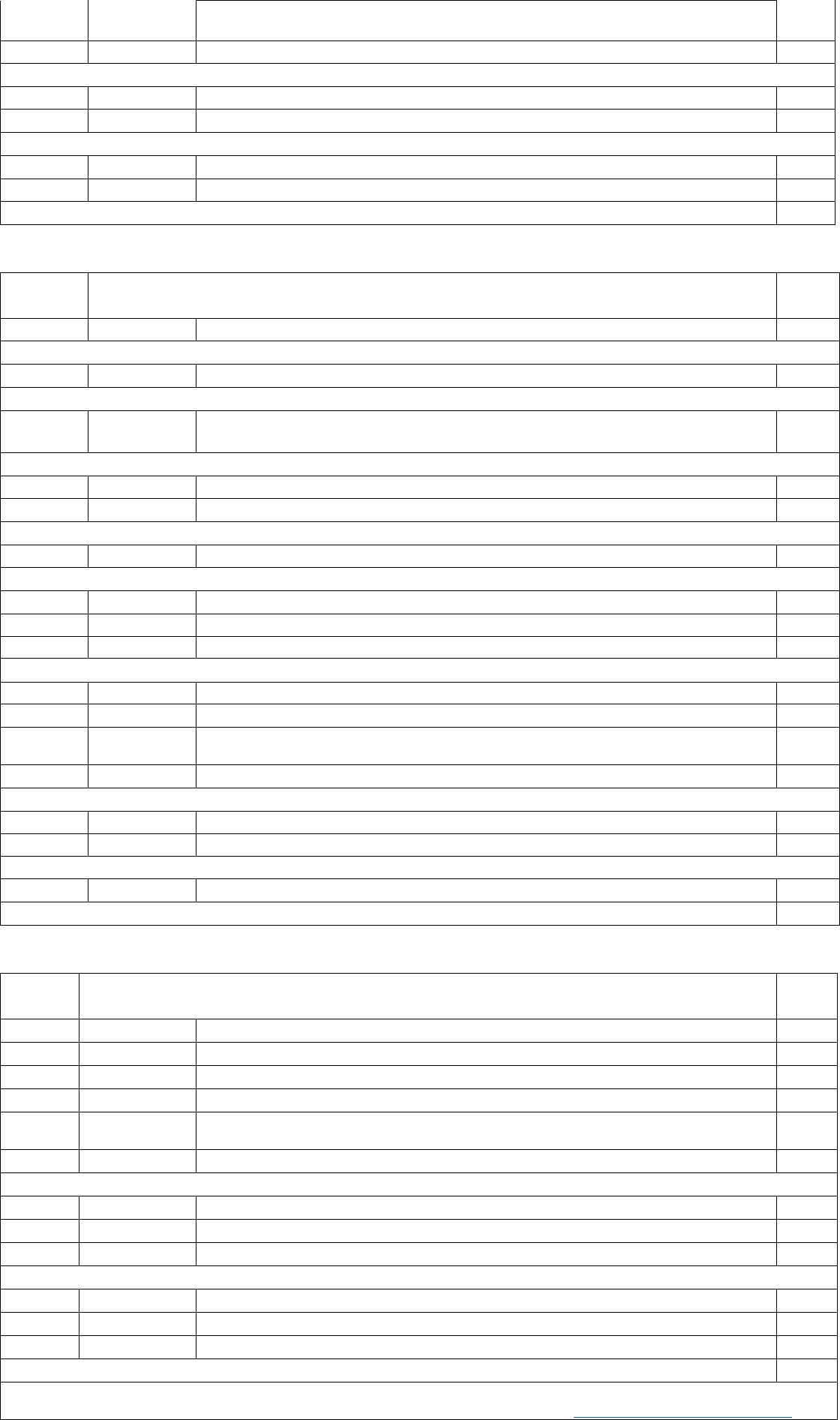
NURS 7305
Advanced Health Assessment Applications for the Women's Health/Gender-Related Nurse
Practitioner
1
NURS 7310
Women's & Gender-Related Health for Advanced Practice Nursing I
3
Spring 2
NURS 7315
Practicum in Women's & Gender-Related Health
4
NURS 7320
Women's & Gender-Related Health for Advanced Practice Nursing II
3
Summer 2
NURS 6031
Advanced Practice Nursing in the Primary Care of the Adolescent
1
NURS 7395
Preceptorship in Women's & Gender-Related Health
5
Total Hours
40
Women’s Health Gender-Related Nurse Practitioner 3-Year, Part-Time Curriculum Plan:
VUMC Employees Only
Semester Course Number and Name
Credit
Hours
Fall 1
NURS 6045
Professional Formation I: Roles and Contexts for Advanced Nursing Practice
1
Spring 1
NURS 6055
Professional Formation II: Evidence Based Change in Healthcare Environments
3
Summer 1
NURS 6065
Professional Formation III: Leading Collaborative Change: Improving Delivery of Healthcare
to Patients and Populations
4
Fall 2
NURS 6013
Advanced Health Assessment
2
NURS 6024
Advanced Pharmacology
3
Spring 2
NURS 6022
Advanced Physiology/Pathophysiology
4
Summer 2
NURS 6031
Advanced Practice Nursing in the Primary Care of the Adolescent
1
NURS 6075
Professional Formation IV: Transition to Advanced Nursing Practice
1
NURS 7330
Women's & Gender-Related Health Issues
1
Fall 3
NURS 6014
Advanced Health Assessment Lab
1
NURS 6034
Adult-Gerontology Primary Care I
3
NURS 7305
Advanced Health Assessment Applications for the Women's Health/Gender-Related Nurse
Practitioner
1
NURS 7310
Women's & Gender-Related Health for Advanced Practice Nursing I
3
Spring 3
NURS 7315
Practicum in Women's & Gender-Related Health
4
NURS 7320
Women's & Gender-Related Health for Advanced Practice Nursing II
3
Summer 3
NURS 7395
Preceptorship in Women's & Gender-Related Health
5
Total Hours
40
Women’s Health Gender-Related Nurse Practitioner Sample Curriculum Plan for Post
Master’s Certificate
Semester Course Number and Name
Credit
Hours
Fall
NURS 6013
Advanced Health Assessment
2
NURS 6014
Advanced Health Assessment Lab
1
NURS 6024
Advanced Pharmacology
3
NURS 6034
Adult-Gerontology Primary Care I
3
NURS 7305
Advanced Health Assessment Applications for the Women's Health/Gender-Related Nurse
Practitioner
1
NURS 7310
Women's & Gender-Related Health for Advanced Practice Nursing I
3
Spring
NURS 6022
Advanced Physiology/Pathophysiology
4
NURS 7315
Practicum in Women's & Gender-Related Health
4
NURS 7320
Women's & Gender-Related Health for Advanced Practice Nursing II
3
Summer
NURS 6031
Advanced Practice Nursing in the Primary Care of the Adolescent
1
NURS 7330
Women's & Gender-Related Health Issues
1
NURS 7395
Preceptorship in Women's & Gender-Related Health
5
Total Hours
31
• Sample only. All admitted post-master’s students will have an individualized curriculum plan based on a gap analysis complete by the
Academic Director of the program. As part of the post-master’s certificate (PMC) application https://apply.vanderbilt.edu/apply/, all
174
VUSN MSN, POST-MASTER’S CERTIFICATE, and DNP Student Handbook 2023-2024

applicants are required to provide syllabi for previous master’s level courses in advanced health assessment, advanced
pathophysiology and advanced pharmacology. Whether or not a PMC student needs to retake one or all of these courses is
determined based on the guidelines below:
a. APRN certified PMC applicants/students who have previously taken an equivalent Advanced Health Assessment, Advanced
Pathophysiology, and Advanced Pharmacology, and have maintained certification (reported on the application), will not be required to
repeat these courses. Course equivalency will be determined by syllabi review.
b. Non-APRN certified PMC applicants/students will be required to take VUSN Advanced Health Assessment, Advanced
Pathophysiology, and Advanced Pharmacology courses unless they satisfy requirements specified in item c.
c. If a non-APRN certified student has previously taken one or more of these three courses in the last 5 years (5 years or less at the
time of matriculation) the student must provide the syllabi to be reviewed for equivalency. If the course is determined to be
equivalent to the VUSN course, was taken within the last 5 years and the grade earned was a B- or higher, the course may be waived.
Note: Determination of equivalency does not mean that VUSN transfer credit has been awarded. Equivalent courses will not appear
on the VU transcript.
175
VUSN MSN, POST-MASTER’S CERTIFICATE, and DNP Student Handbook 2023-2024
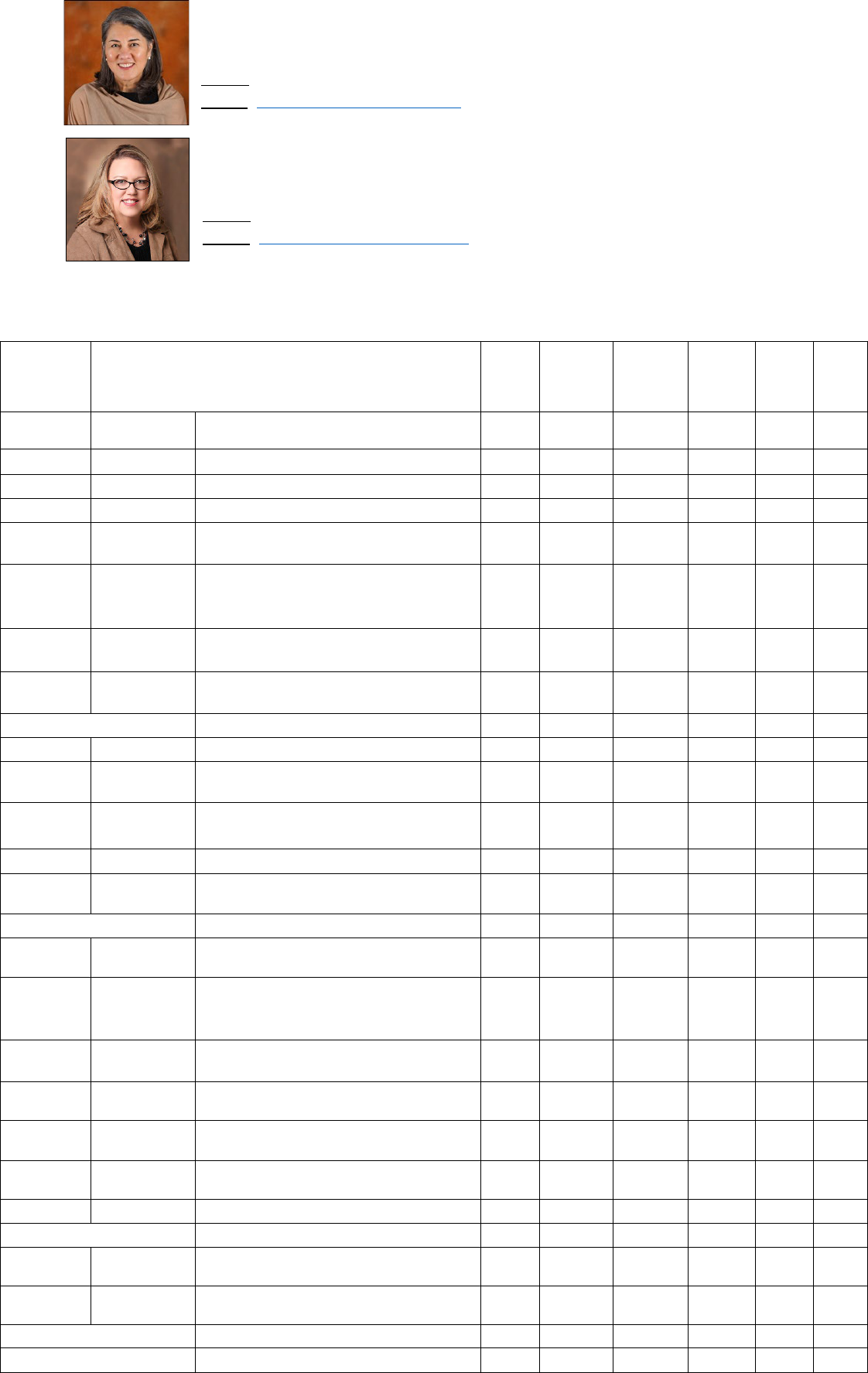
WOMEN'S HEALTH GENDER-RELATED NURSE PRACTITIONER/ADULT GERONTOLOGY
PRIMARY CARE NURSE PRACTITIONER (WHGRNP/AGPCNP)
Ginny Moore, DNP, WHNP-BC
Director, Women's Health Gender-Related NP Specialty
603-B Godchaux Hall
Phone: 615.875.4005
E-mail: ginny.moore@vanderbilt.edu
Leslie W. Hopkins, DNP, APRN, BC, FNP-BC, ANP-C
Director, Adult-Gerontology Primary Care NP Specialty
384 Frist Hall
Phone: 615.322.3029
E-mail: leslie.hopkins@vanderbilt.edu
Women’s Health Gender-Related Nurse Practitioner/Adult-Gerontology Primary Care Nurse
Practitioner Curriculum Plan and Required Hours
Semester Course Number and Name
Credit
Hours
Didactic
Clock
Hours
Seminar
Clock
Hours
Clinical
Clock
Hours
Lab
Clock
Hours
Total
Clock
Hours
Fall 1
NURS 6013
Advanced Health Assessment
2
28
28
NURS 6014
Advanced Health Assessment Lab
1
28
28
NURS 6024
Advanced Pharmacology
3
42
42
NURS 6034
Adult-Gerontology Primary Care I
3
42
42
NURS 6045
Professional Formation I: Roles and
Contexts for Advanced Nursing Practice
1
14
14
NURS 6205
Advanced Health Assessment Applications
for the Adult-Gerontology Primary Care
Nurse Practitioner
1
28
28
NURS 7305
Advanced Health Assessment Applications
for the WHGRNP
1
28
28
NURS 7310
Women's & Gender-Related Health for
Advanced Practice Nursing I
3
42
42
Semester Total
15
168
0
0
84
252
Spring 1
NURS 6022
Advanced Physiology/Pathophysiology
4
56
56
NURS 6055
Professional Formation II: Evidence Based
Change in Healthcare Environments
3
42
42
NURS 6215
Adult-Gerontology Primary Care Nurse
Practitioner Clinical I
4
280
280
NURS 6234
Adult-Gerontology Primary Care II
3
42
42
NURS 7320
Women's & Gender-Related Health for
Advanced Practice Nursing II
3
42
42
Semester Total
17
182
0
280
0
462
Summer 1
NURS 6031
Advanced Practice Nursing in the Primary
Care of the Adolescent
1
14
14
NURS 6065
Professional Formation III: Leading
Collaborative Change: Improving Delivery
of Healthcare to Patients and Populations
4
56
56
NURS 6075
Professional Formation IV: Transition to
Advanced Nursing Practice
1
14
14
NURS 6231
Essential Procedures for the Primary Care
Provider
2
28
28
NURS 6236
Advanced Concepts in Care of the Older
Adult
2
28
28
NURS 7315
Practicum in Women's & Gender-Related
Health
4
280
280
NURS 7330
Women's & Gender-Related Health Issues
1
14
14
Semester Total
15
154
0
280
0
434
Fall 2
NURS 6295
Adult-Gerontology Primary Care Nurse
Practitioner Clinical II
4
280
280
NURS 7395
Preceptorship in Women's & Gender-
Related Health
5
350
350
Semester Total
9
308
0
630
0
630
Program Total
56
812
0
1190
84
1778
176
VUSN MSN, POST-MASTER’S CERTIFICATE, and DNP Student Handbook 2023-2024
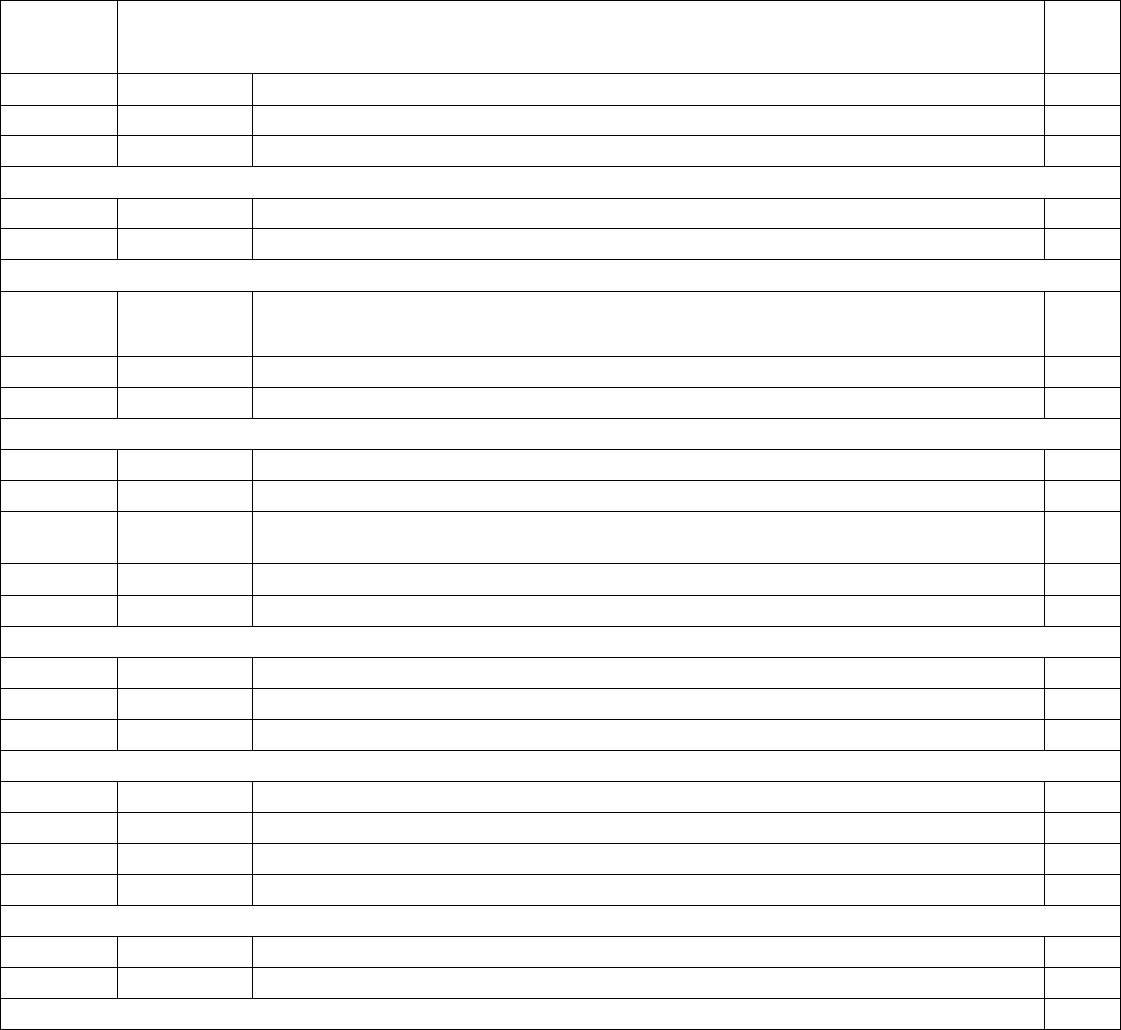
Women’s Health Gender-Related Nurse Practitioner/Adult-Gerontology Primary Care Nurse
Practitioner Part-Time Curriculum Plan and Required Hours
Semester Course Number and Name
Credit
Hours
Fall 1
NURS 6022
Advanced Physiology/Pathophysiology
4
NURS 6013
Advanced Health Assessment
2
NURS 6045
Professional Formation I: Roles and Contexts for Advanced Nursing Practice
1
Spring1
NURS 6024
Advanced Pharmacology
3
NURS 6055
Professional Formation II: Evidence Based Change in Healthcare Environments
3
Summer 1
NURS 6065
Professional Formation III: Leading Collaborative Change: Improving Delivery of Healthcare to
Patients and Populations
4
NURS 6075
Professional Formation IV: Transition to Advanced Nursing Practice
1
NURS 7330
Women's & Gender-Related Health Issues
1
Fall 2
NURS 6014
Advanced Health Assessment Lab
1
NURS 6034
Adult-Gerontology Primary Care I
3
NURS 6205
Advanced Health Assessment Applications for the Adult-Gerontology Primary Care Nurse
Practitioner
1
NURS 7305
Advanced Health Assessment Applications for the WHGRNP
1
NURS 7310
Women's & Gender-Related Health for Advanced Practice Nursing
3
Spring 2
NURS 6215
Adult-Gerontology Primary Care Nurse Practitioner Clinical I
4
NURS 6234
Adult-Gerontology Primary Care II
3
NURS 7320
Women's & Gender-Related Health for Advanced Practice Nursing II
3
Summer 2
NURS 6031
Advanced Practice Nursing in the Primary Care of the Adolescent
1
NURS 6231
Essential Procedures for the Primary Care Provider
2
NURS 6236
Advanced Concepts in Care of the Older Adult
2
NURS 7315
Practicum in Women's & Gender-Related Health
4
Fall 3
NURS 6295
Adult-Gerontology Primary Care Nurse Practitioner Clinical II
4
NURS 7395
Preceptorship in Women's & Gender-Related Health
5
Total Hours
56
177
VUSN MSN, POST-MASTER’S CERTIFICATE, and DNP Student Handbook 2023-2024
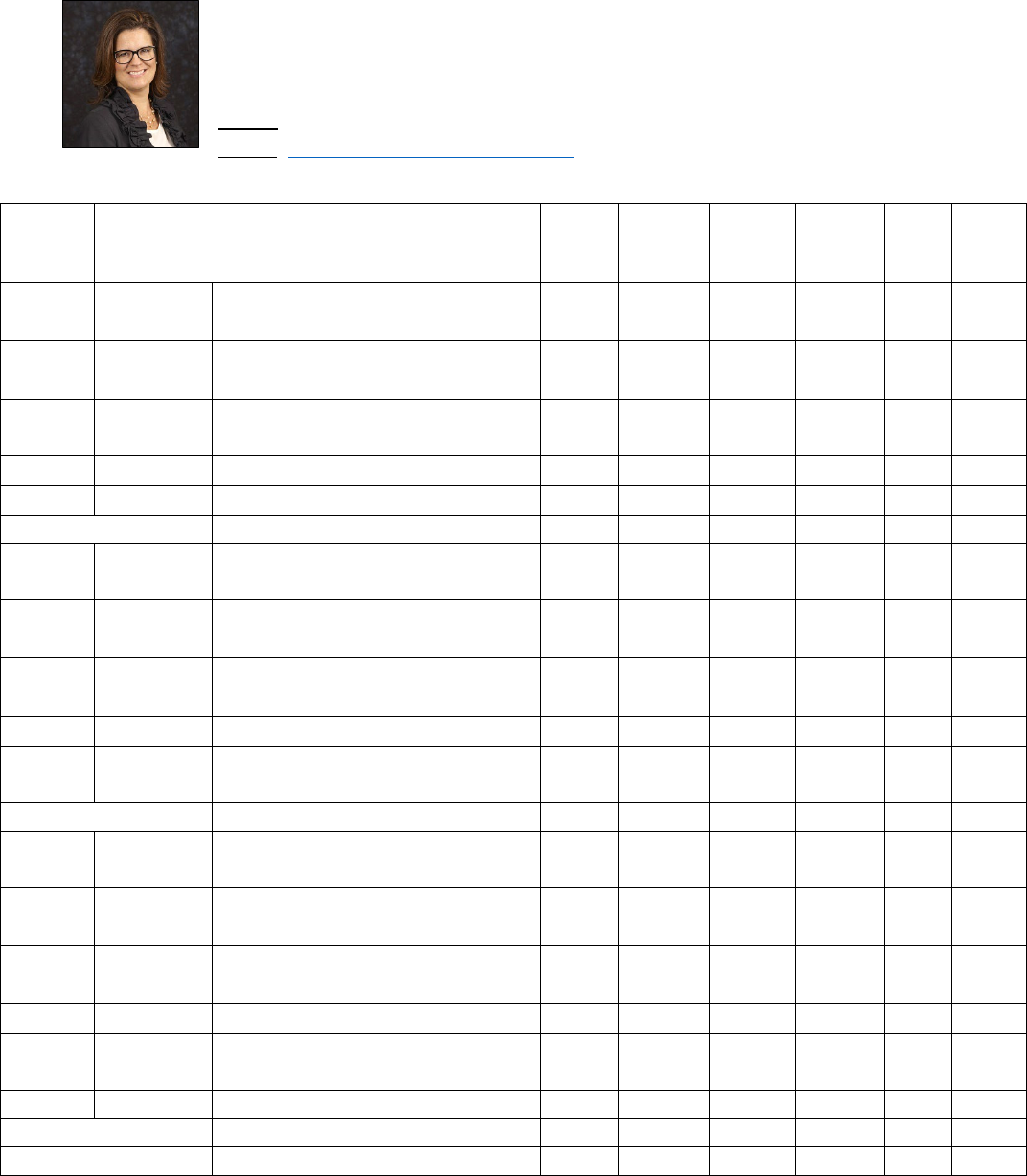
PRESPECIALTY LEVEL
Mary A. Jessee, PhD, RN
Assistant Dean for Academics, Generalist Nursing Practice
Director, PreSpecialty Level
544 School of Nursing
Phone: 615.343.1629
E-mail: mary.a.jessee@vanderbilt.edu
PreSpecialty Component Curriculum Plan and Required Hours
Semester Course Number and Name
Credit
Hours
Didactic
Clock
Hours
Seminar
Clock
Hours
Clinical
Clock
Hours
Lab
Clock
Hours
Total
Clock
Hours
Fall
NURS 5101
Legal and Ethical Accountability in
Professional Nursing Practice
2
15
30
45
NURS 5103
Human Experience of Health and
Illness Across the Lifespan I
4
56
0
56
NURS 5105
Enhancement of Community and
Population Health I
3
24
24
40
88
NURS 5106
Pharmacology for Nursing Care I
2
28
0
28
NURS 5115
Fundamentals of Clinical Practice
5
14
140
60
214
Semester Total
16
137
44
180
60
431
Spring
NURS 5201
Inquiry & Evidence in Professional
Nursing Practice
2
14
28
42
NURS 5203
Human Experience of Health and
Illness Across the Lifespan II
5
56
28
84
NURS 5205
Enhancement of Community and
Population Health II
3
21
14
70
105
NURS 5206
Pharmacology for Nursing Care II
2
21
14
35
NURS 5215
Integration of Theoretical & Clinical
Aspects of Nursing I
3
240
240
Semester Total
15
112
84
310
0
506
Summer
NURS 5301
Leadership and Management in
Professional Nursing Practice
2
14
28
42
NURS 5303
Human Experience of Health and
Illness Across the Lifespan III
4
49
14
63
NURS 5305
Enhancement of Community and
Population Health III
2
14
70
84
NURS 5306
Pharmacology for Nursing Care III
1
7
14
21
NURS 5315
Integration of Theoretical & Clinical
Aspects of Nursing II
1
80
80
NURS 5325
Capstone Clinical Practicum
2
140
140
Semester Total
12
84
56
290
0
430
Program Total
43
333
184
780
60
1367
178
VUSN MSN, POST-MASTER’S CERTIFICATE, and DNP Student Handbook 2023-2024
